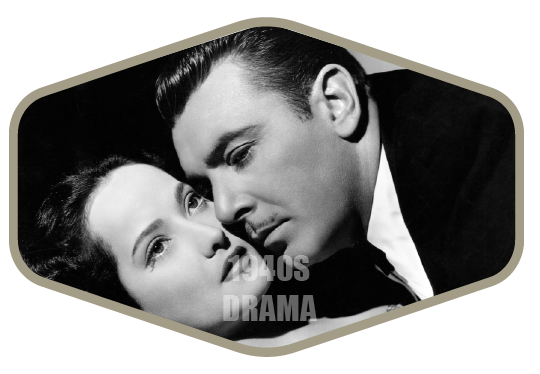Against the backdrop of World War II, Hollywood was busy cranking out scores of training and morale-boosting films. Among the popular feature-length, dramatic war, films included Mrs. Miniver (1942), Casablanca (1942), Desperate Journey (1942), Edge of Darkness (1943), and Thirty Seconds Over Tokyo (1944).
But war films were just one of several sub-genres being made during the 1940s - there were an abundance of tear-jerkers, melodramas and romance films certain to summon the tears and the tissue box. These films included: Brief Encounter (1945), Journey For Margaret (1942), Letter From An Unknown Woman (1948), Waterloo Bridge (1940), Always in My Heart (1942), and Back Street (1941) and the perennial holiday favorite, It's a Wonderful Life (1946).
On the lighter side, included amongst these more somber films were the morale -boosting, star-studded extravaganzas; Thank Your Lucky Stars (1943), Stage Door Canteen (1943) and Hollywood Canteen (1944). These fun films feature loads of celebrity cameos, musical numbers and simple but fun storylines.
Although several A-list stars were enlisted in the service during the 40's, there were still plenty of stars in the making and actors from prior decades who peaked in the 40's. While not by any means a complete list, these actors who thrived in this era included: Joan Fontaine, Cary Grant, Robert Mitchum, Katharine Hepburn, Rosalind Russell, Errol Flynn, Claude Rains, Tyrone Power, Linda Darnell, Robert Taylor, Van Johnson, Ginger Rogers, Ann Sheridan, Greer Garson, Rita Hayworth, Hedy Lamarr, Dorothy Lamour, Veronica Lake, Ida Lupino, Lana Turner, Alan Ladd, Gene Tierney, Lauren Bacall, Linda Darnell and Glenn Ford.
DRAMA FILMS OF THE 1940s
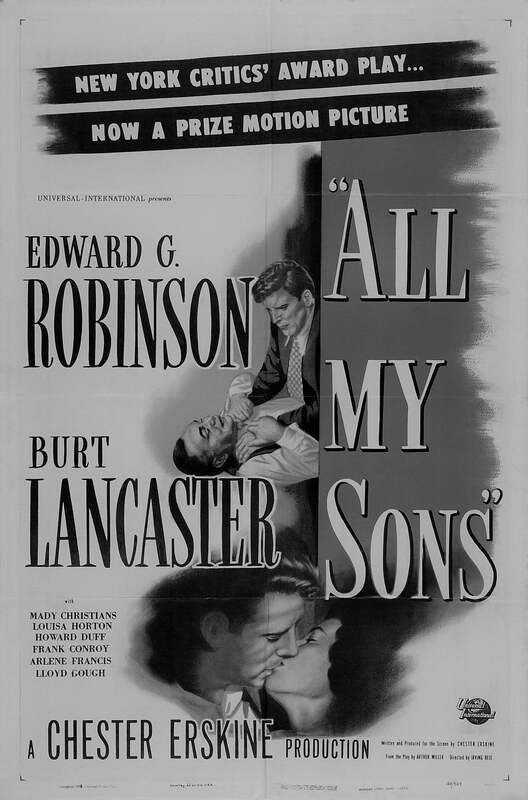 ALL MY SONS (1948)
ALL MY SONS (1948) (93 Min.) Genre: 1940 DRAMA, Transfer Quality: B
Based on the play by Arthur Miller, All My Sons is a drama of man's duty to man that retains a potent impact. Edward G. Robinson plays a manufacturer of parts for World War II airplanes who lives a full, satisfied life in a small town. But his idyll is shattered by the arrival of the fiancée of the manufacturer's oldest son, who is missing in action. The younger son begins to fall in love with the girl, but her own brother is against the relationship because, he claims, the manufacturer and his partner delivered defective parts to the war effort. The younger son (Burt Lancaster) investigates, even going as far as visit his father's former partner in jail, and discovers the awful truth — that his father's corrupt actions were responsible for both the partner's incarceration and the deaths of 21 U.S. pilots. The tale ends with a bitter and tragic confrontation that drives home the message that we are all our brother's keepers, and we cannot push aside that responsibility for personal gain. Thoughtful and intense performances by Robinson and Lancaster bring humanity and life to this powerful theme.
Starring: Edward G. Robinson, Burt Lancaster, Mady Christians, Howard Duff | Directed by: Irving G. Reis
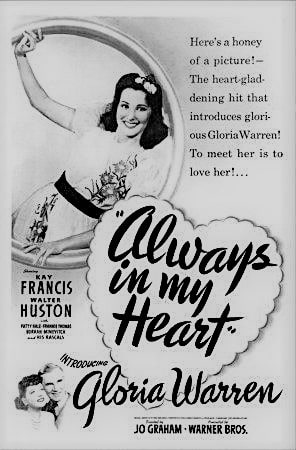 ALWAYS IN MY HEART (1942)
ALWAYS IN MY HEART (1942) (93 Min.) Genre: 1940 DRAMA, Transfer Quality: A
A real four-hanky picture, Always in My Heart was loosely adapted from the stage play by Dorothy Bennett and Irving White. Walter Huston is a tower of strength as MacKenzie Scott, a brilliant musician falsely convicted of murder and sentenced to Life. While Scott languishes in prison, his long-suffering ex-wife Marjorie (Kay Francis) raises their two children to adulthood. Out of respect for Scott, whom she still loves, Marjorie never reveals to the kids that their father is in jail, insisting instead that Scott has long since died. Enter Philip Ames (Sidney Blackmer), who falls in love with Marjorie and lavish expensive gifts on the children. It must needs be that Scott is proven innocent and pardoned, whereupon he journeys home to visit his grown daughter Victoria (Gloria Warren), now a promising singer. At first hesitant to reveal his identity, Scott is finally urged to do so by Marjorie, who has never really given up hope that her family will one day be reunited. In the midst of all these soap-operaish intrigues, some welcome comedy relief is provided by Borrah Minevitch and his Harmonica Rascals. — Hal Erickson
Starring: Kay Francis, Walter Huston, Gloria Warren, Frankie Thomas | Directed by: Jo Graham
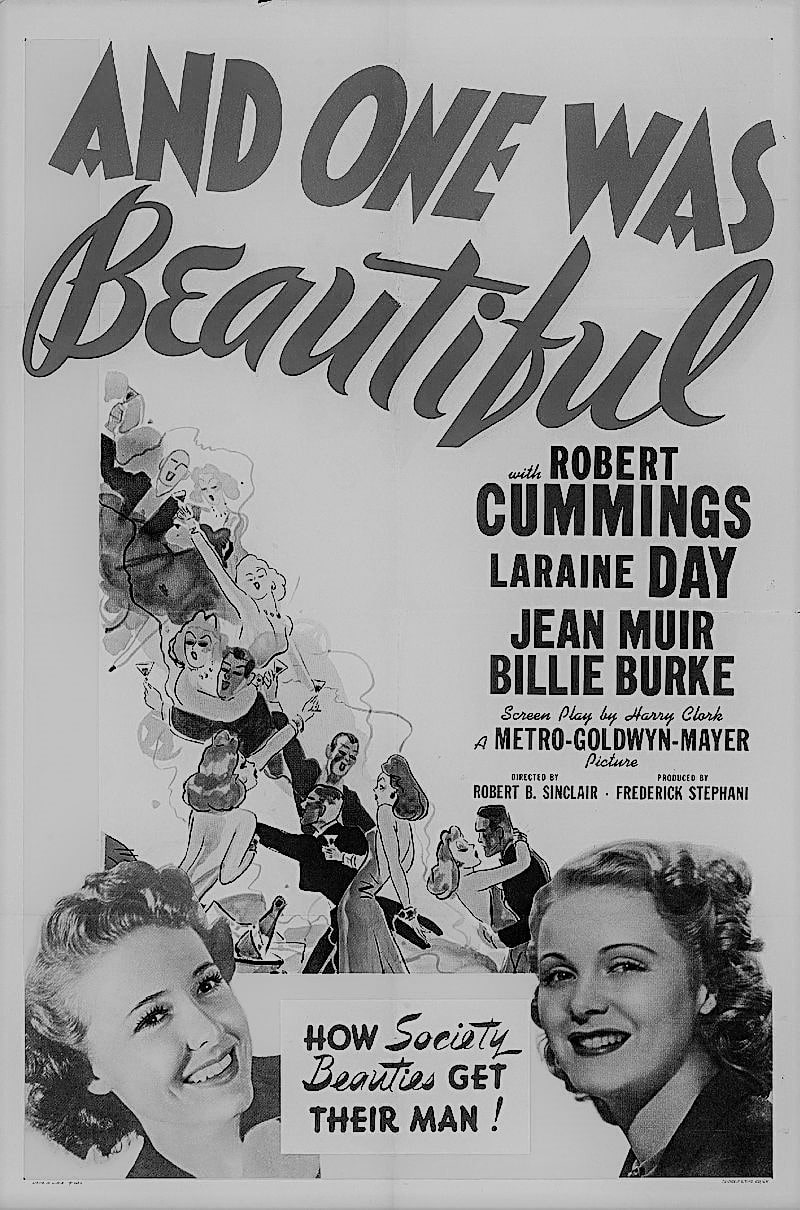 AND ONE WAS BEAUTIFUL (1940)
AND ONE WAS BEAUTIFUL (1940) (68 Min.) Genre: 1940 DRAMA, Transfer Quality: B
Social-climbing Helen (Jean Muir) sends her less-pretentious younger sister Kate (Laraine Day) to a party in her stead, and there Kate strikes up a friendship with wealthy playboy Ridley Crane (Robert Cummings), but later, he clearly prefers Helen. One night he gets drunk, so Helen drives him home, but she accidentally kills a bicyclist then allows the crime to be pinned on Ridley. Kate learns who really was driving, but she cannot convince Helen to reveal the truth, and Ridley is sentenced to prison.
Starring: Robert Cummings, Laraine Day, Jean Muir, Billie Burke | Directed by: Robert Sinclair
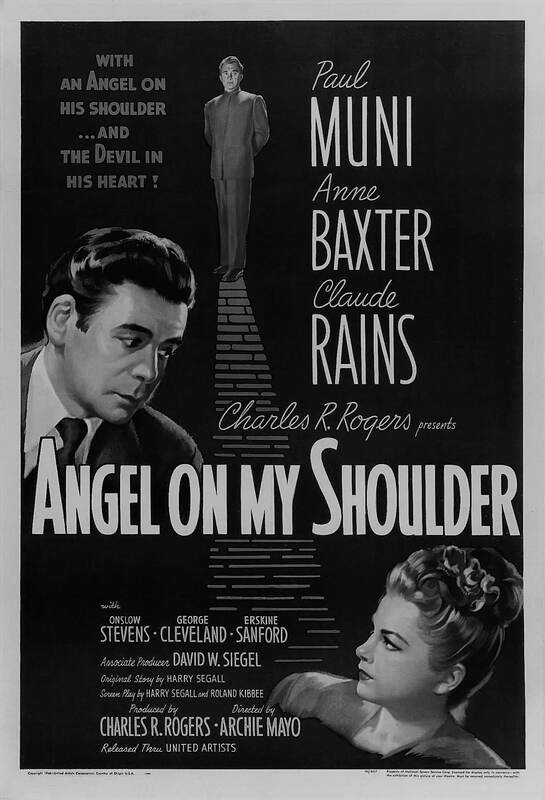 ANGEL ON MY SHOULDER (1946)
ANGEL ON MY SHOULDER (1946) (101 Min.) Genre: 1940 DRAMA, Transfer Quality: A
In this comedy, Paul Muni plays a recently murdered gangster who finds himself roasting in Hell. Muni can't believe that he's in for All Eternity and keeps trying to "bust out," which brings him to the attention of the Head Man (Claude Rains), who calls himself Nick. Nick strikes a bargain with Muni: There's a troublesome honest judge on Earth who's been shipping too many souls to Hell; if Muni will take over the judge's body and begin performing bad deeds, Nick will set him free. Muni readily agrees, eager to settle the score with the ex-partner (Hardie Albright) who bumped him off. Once he "becomes" the judge, however, Muni discovers that he is utterly incapable of performing any misdeeds—and when he falls in love with the judge's fiancee (Anne Baxter), Muni becomes determined to wriggle out of his agreement. Angel on My Shoulder is based on a story by Harry Segall, whose previous play Heaven Can Wait was filmed as Here Comes Mr. Jordan, also with Claude Rains. — Hal Erickson
Starring: Paul Muni, Anne Baxter, Claude Rains, Onslow Stevens | Directed by: Archie Mayo
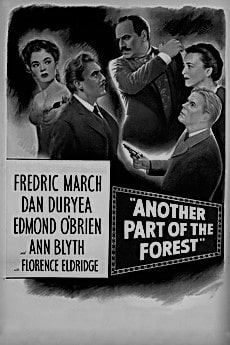 ANOTHER PART OF THE FOREST (1948)
ANOTHER PART OF THE FOREST (1948) (106 Min.) Genre: 1940 DRAMA, Transfer Quality: B
Another Part Of The Forest begins some twenty years before the events of Lillian Hellman's play and movie The Little Foxes and shows how that film's Hubbard family became the ruthless, greedy lot they were. It's fifteen years after the Civil War, and the Hubbards dominate their small Southern town financially, if not socially; The patriarch of the family (Fredric March) sold salt for $8 a pound to the Confederate Army at a time when they needed it most. Edmond O'Brien and Dan Duryea play his sons, the former as mean as his father, the latter and younger one a weakling. When the elder child finds out that his father was responsible for the death of Southern troops during the war, he threatens to expose the truth unless the family fortune is placed in his hands. In the end, only Hubbard's wife (Florence Eldridge) stands by her husband during his inevitable fall, and she banishes her own children from their house. Brilliant acting by all, especially March, Duryea, and O'Brien, plus a sharp script, make this unrelentingly grim melodrama fascinating to watch.
Starring: Fredric March, Dan Duryea, Edmond O'Brien, Ann Blyth | Directed by: Michael Gordon
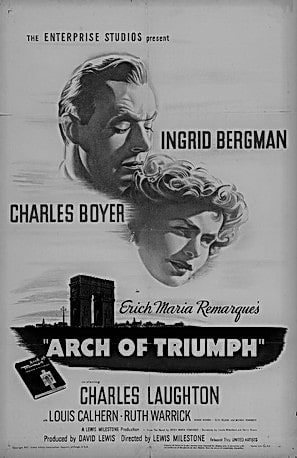 ARCH OF TRIUMPH (1948)
ARCH OF TRIUMPH (1948) (120 Min.) Genre: 1940 DRAMA, Transfer Quality: B
Based on the novel by Erich Maria Remarque, Arch of Triumph is a complicated war romance directed by Lewis Milestone. Dr. Ravic (Charles Boyer) is a refugee physician practicing medicine illegally in Paris under a false name. He saves Joan Madou (Ingrid Bergman) from committing suicide after the sudden death of her lover. He gets her a job singing at the nightclub where his only friend, Boris Morosov (Louis Calhern), is the doorman. Joan falls in love with Ravic, but he is deported and she finds herself the mistress of wealthy Alex (Stephan Bekassy). Meanwhile, Ravic seeks revenge against a Nazi officer (Charles Laughton) and war is declared between France and Germany.
Starring: Charles Boyer, Ingrid Bergman, Stephen Bekassy, Charles Laughton | Directed by: Lewis Milestone
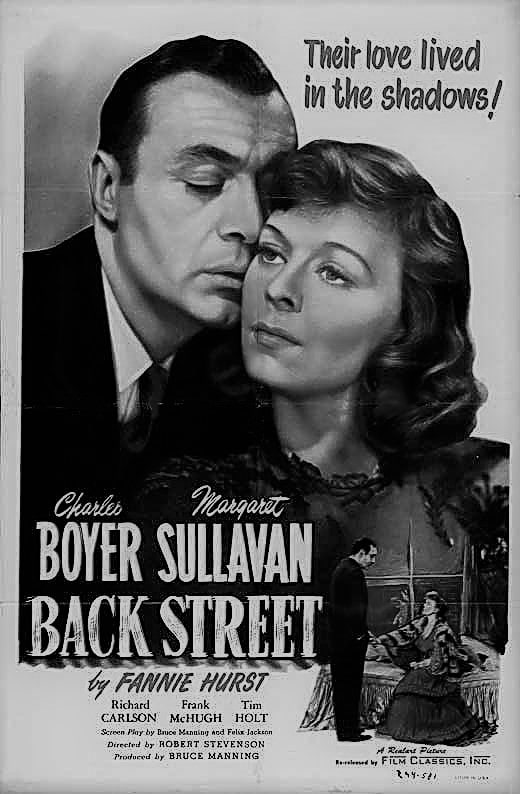 BACK STREET (1941)
BACK STREET (1941) (89 Min.) Genre: 1940 DRAMA, Transfer Quality: A
Charles Boyer and Margaret Sullavan star in this adaptation of Fannie Hurst's tearjerking novel about a woman who chooses to stand beside a man who cannot marry her. Rae (Margaret Sullavan) is a woman from Ohio who meets a dashing gentleman from out of town, Walter (Charles Boyer). They soon fall for each other, but he's due to leave town shortly. As he's about to leave, he calls her from the ship with a question: there's a minister on board who can marry them. Will she join him? As she dashes to the docks, she meets an old flame, and the delay causes her to miss the boat. Five years later, Rae is in New York City and unexpectedly runs into Walter; assuming that she left him behind intentionally, he married another woman. When he realizes that she still loves him, they begin an affair. Rae is content to live her life as "the other woman" until Walter travels to Europe and neglects to call her when he returns; convinced that their romance is over, Rae goes back to Ohio and agrees to marry Curt (Richard Carlson), who loved her long ago. When Walter discovers that Rae has gone back home, he races to Ohio to reclaim her hand. This was the second film version of Back Street, following a 1932 adaptation starring Irene Dunne and John Boles and preceding a 1961 remake with Susan Hayward and John Gavin. — Mark Deming
Starring: Charles Boyer, Margaret Sullivan, Richard Carlson, Frank McHugh | Directed by: Robert Stevenson
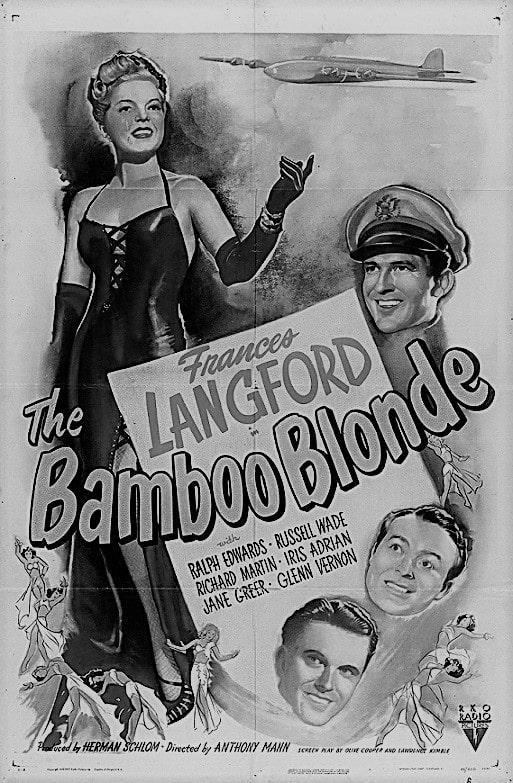 BAMBOO BLONDE, THE (1946)
BAMBOO BLONDE, THE (1946) (68 Min.) Genre: 1940 DRAMA, Transfer Quality: B
In this WW II romance, a small-time nightclub singer who works in a little Manhattan nightclub has a one-night stand with a handsome fly-boy. The next day, the B-29 pilot is sent to the Pacific and once there, his crew mischievously paints the picture of the singer upon his plane with the words "The Bamboo Blonde" beneath it. The pilot takes off to become one of the most fearsome fighters of the war, earning himself considerable renown back home. Ever the entrepreneur, the nightclub owner sees a chance to make big bucks off of the singer. He succeeds and she becomes famous. Later the pilot returns, but though he wants to be with his Bamboo Blonde he cannot for he is engaged to another — at least for the moment.
Starring: Frances Langford, Ralph Edwards, Russell Wade, Jane Greer | Directed by: Anthony Mann
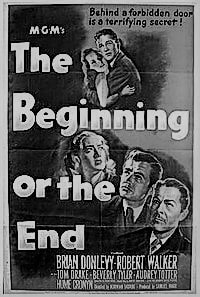 BEGINNING OR THE END, THE (1947)
BEGINNING OR THE END, THE (1947) (112 Min.) Genre: 1940 DRAMA, Transfer Quality: A
Filmed not long after the actual events, The Beginning or the End is a sober, intelligent account of the development and deployment of the Atom Bomb. Step by step, the film details the progress of The Manhattan Project, from its inception in the early stages of the war through the dawn of the Atomic Age over the city of Hiroshima on August 6, 1945. Brian Donlevy stars as Brigadier General Leslie Groves, assigned by President Roosevelt (Godfrey Tearle) to act as military supervisor of the top-secret project at Oak Ridge, Tennessee. After a grueling trial-and-error period, the first atomic bomb is tested before an assemblage of scientists and military personnel-even though there's the disturbing possibility that the explosion may cause a chain reaction that will wipe out all mankind. Woven into the proceedings is an unnecessary but innocuous romance between idealistic young scientist Matt Cochran (Tom Drake) and his new bride Anne (Beverly Tyler), who cannot understand why she and her husband are forced to live in isolation with scores of other scientists and their families because Matt, like his associates, has been sworn to total secrecy. Though the Cochrans are fictional, many real-life participants in the Manhattan Project are depicted herein, including J. Robert Oppenheimer (played by Hume Cronyn), Enrico Fermi (Joseph Calleia), Albert Einstein (Ludwig Stossel) and Col. Paul Tibbetts (Barry Nelson), pilot of the bomb-bearing Enola Gay. Refreshingly free of propagandizing, Beginning or the End would make an excellent companion feature to Fat Man and Little Boy (1990), a highly politicized retelling of the same events. — Hal Erickson
Starring: Brian Donlevy, Warner Anderson, Art Baker, Robert Walker, Audrey Totter | Directed by: Norman Taurog
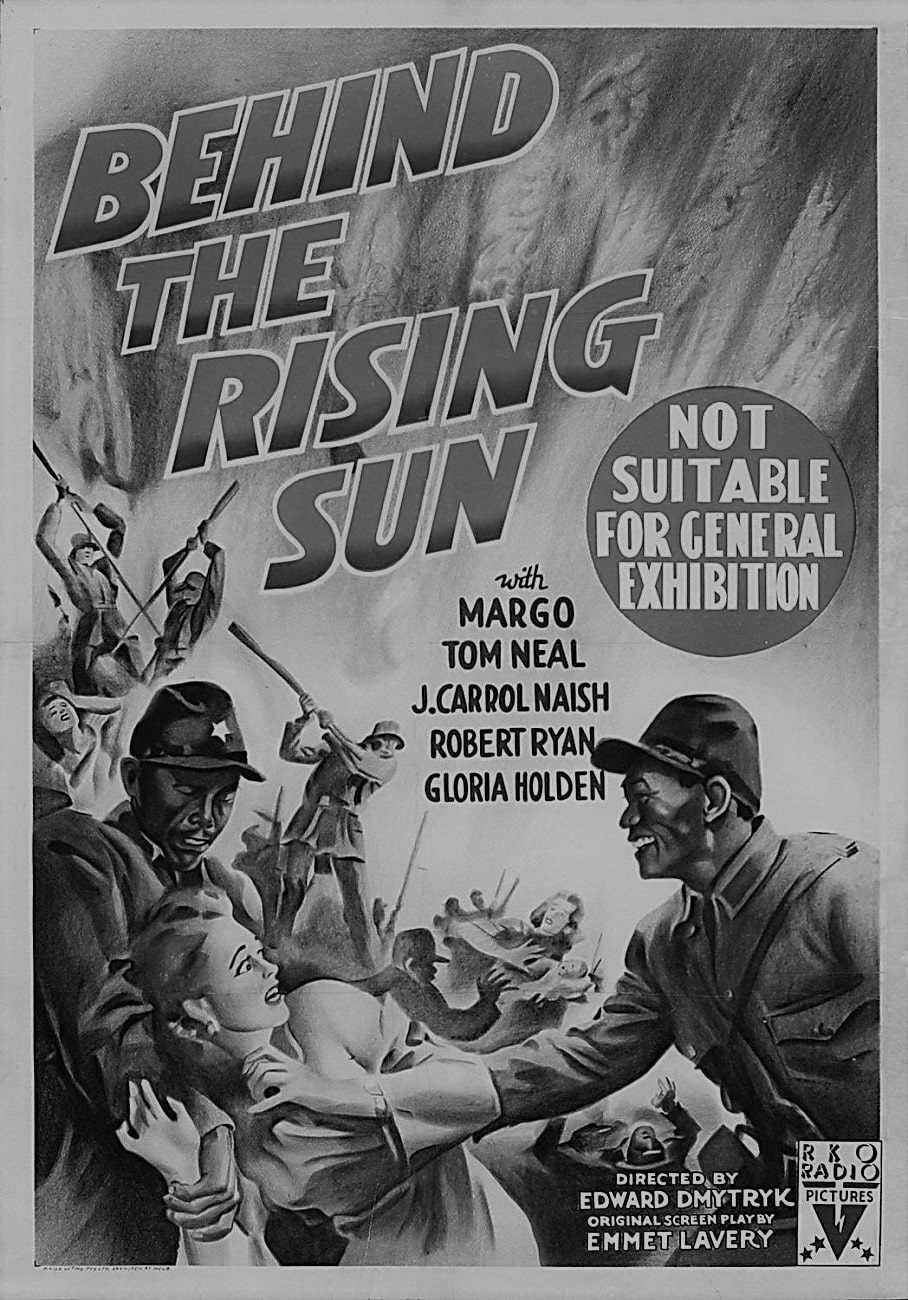 BEHIND THE RISING SUN (1943)
BEHIND THE RISING SUN (1943) (88 Min.) Genre: 1940 DRAMA, Transfer Quality: B
Behind the Rising Sun is a rarity: a WW2 film with a handful of sympathetic Japanese characters. His eyes slanted by the RKO makeup department, Tom Neal plays Taro, the Americanized son of a Japanese diplomat (J. Carroll Naish). During the Sino-Japanese war, Taro's father insists that the boy leave the US and join the Japanese army. Indoctrinated in the "Banzai" mentality of the empirical government, Taro is transformed into an enemy of the West, going so far as to betray his best friend ly inebriated millionaire.
Starring: Margo, Tom Neal, J. Carrol Naish, Robert Ryan | Directed by: Edward Dmytryk
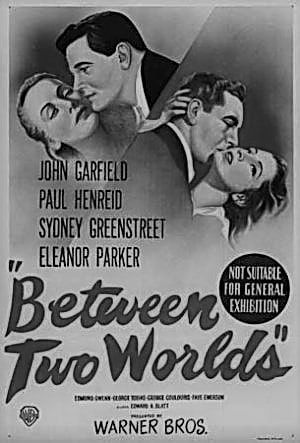 BETWEEN TWO WORLDS (1944)
BETWEEN TWO WORLDS (1944) (112 Min.) Genre: 1940 DRAMA, Transfer Quality: A
In this remake of Outward Bound, which updated the story to include topical refences to the war still raging in Europe, Henry (Paul Henreid) and Ann (Eleanor Parker) are a couple from Austria hoping to escape Nazi bombings. They are en route to a ship leaving Europe when an explosion throws them from their car and leaves many passersby dead. Despondent and unable to meet the ship, the couple return to their apartment and decide to commit suicide by turning on the gas. They awake to find themselves on a ship shrouded in fog and carrying many passengers, among them Tom Prior (John Garfield), a wisecracking reporter who was also a witness to the earlier bombing. Henry and Ann discover that the ship is actually Limbo, a waiting station between Heaven and Hell, where Mr. Thompson (Sydney Greenstreet) will determine their final destination for eternity. — Mark Deming
Starring: John Garfield, Edmund Gwenn, Paul Henreid, Sydney Greenstreet, Faye Emerson, Eleanor Parker, George Coulouris | Directed by: Edward Blatt
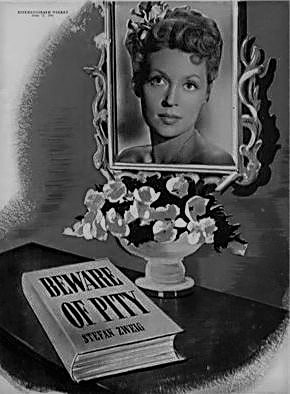 BEWARE OF PITY (1946)
BEWARE OF PITY (1946) (105 Min.) Genre: 1940 DRAMA, Transfer Quality: B
Based on a novel by Stefan Zweig, this is the story of a baroness who believes she has found love with an officer but discovers that his marriage proposal was not made for love but because of her physical handicap and his pity for her.
Starring: Lilli Palmer, Albert Lieven, Cedric Hardwicke, Gladys Cooper | Directed by: Maurice Elvey
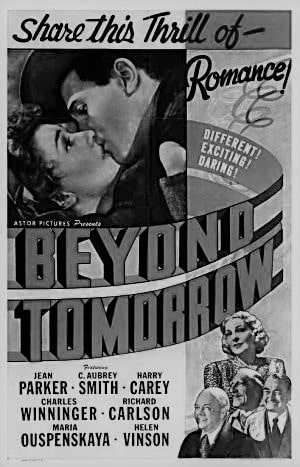 BEYOND TOMORROW (1940)
BEYOND TOMORROW (1940) (84 Min.) Genre: 1940 DRAMA, Transfer Quality: A
Harry Carey Sr., C. Aubrey Smith and Charles Winninger play three wealthy bachelors who have spent their lives wrapped up in themselves. Left all alone on Christmas eve, the elderly trio invite a couple of strangers to dinner: misplaced cowpoke Richard Carlson and pretty, but aimless, Jean Parker. Hoping that they've accomplished a bit of matchmaking, the three old duffers board a plane and head off to an important business meeting. The plane crashes, killing all three men. They return to their mansion as ghosts, only to discover that Carlson is making the same mistake they made: he's allowing his drive for success to override his affection for Parker. Feeling as though they won't be welcome in Heaven until they rectify this situation, Carey, Smith, and Winninger stick around to set things right. — Hal Erickson
Starring: Harry Carey, C. Aubrey Smith, Charles Winninger, Alex Melesh | Directed by: Edward Sutherland
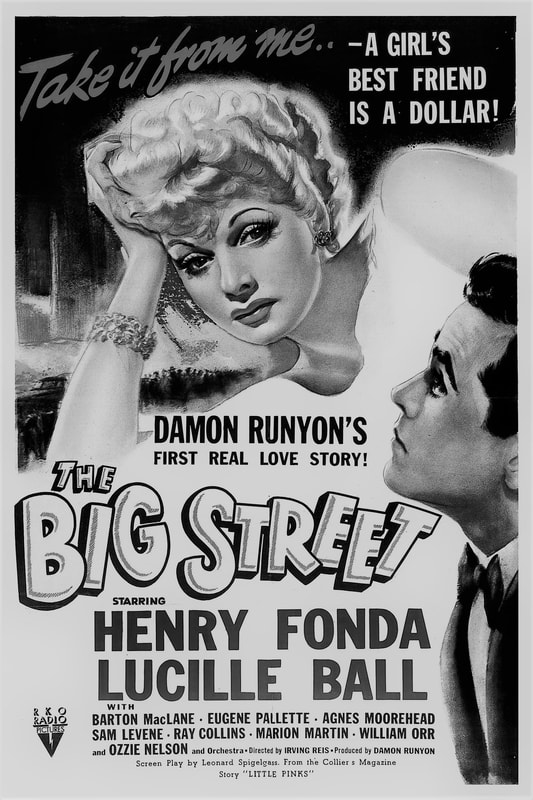 BIG STREET, THE (1942)
BIG STREET, THE (1942) (88 Min.) Genre: 1940 DRAMA, Transfer Quality: A
Damon Runyon produced this treacly adaption of his own "Collier's" magazine story "Little Pinks", about a timid busboy (Fonda) who devotes himself to a self-centered nightclub singer (Ball). Odd (and oddly watchable) with very unconventional roles for both Fonda and Ball.
Starring: Henry Fonda, Lucille Ball, Agnes Moorehead, Barton MacLane, Marion Martin | Directed by: Irving Reis
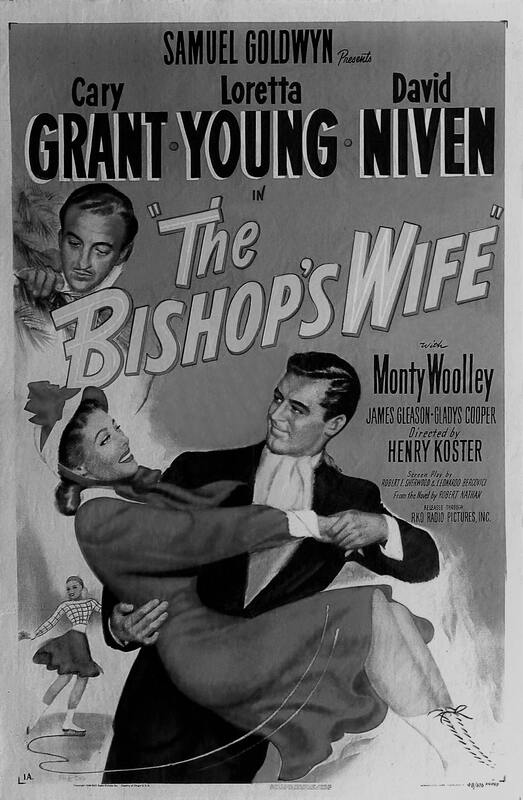 BISHOP'S WIFE, THE (1947)
BISHOP'S WIFE, THE (1947) (109 Min.) Genre: 1940 DRAMA, Transfer Quality: A
When Episcopalian bishop Henry Brougham (David Niven) prays for divine guidance in his efforts to raise the necessary funds for a new cathedral, his prayers are answered in the form of a handsome, personable guardian angel named Dudley (Cary Grant). Establishing himself as a Yuletide guest in the Brougham home, Dudley arouses the ire of Henry, who, unaware that his visitor is from Up Above, assumes that Dudley has designs on the bishop's wife Julia (Loretta Young). Eventually, the lives of both Henry and Julia are agreeably altered by the presence of the affable angel: He regains the "common touch" he'd almost lost, while she realizes anew how much she truly loves her husband. Adapted by Robert E. Sherwood and Robert Bercovicci from a novel by Robert Nathan, The Bishop's Wife was remade in 1996 as The Preacher's Wife, with Denzel Washington, Whitney Houston and Courtney B. Vance. — Hal Erickson
Starring: Cary Grant, Loretta Young, David Niven, Monty Woolley | Directed by: Henry Koster
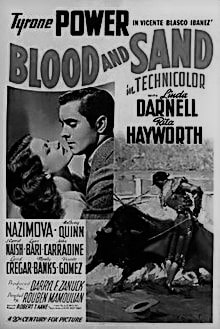 BLOOD AND SAND (1941)
BLOOD AND SAND (1941) (123 Min.) Genre: 1940 DRAMA, Transfer Quality: A
Based on the novel by Vincente Blasco Ibanez, Blood and Sand is the beautifully rendered story of the rise and fall of a young, cocksure Spanish bullfighter, played by Tyrone Power. Working his way slowly up the ladder to success, Power achieves fame when he is praised to skies by fatuous, fickle critic Laird Cregar. A country boy at heart, Power finds himself way over his head with sophisticates, and is soon torn between his pious and faithful wife Linda Darnell and sexy, mercenary Rita Hayworth. It is Darnell, however, who comforts Power after his final, fatal goring in the bull ring. The film's best scenes depict the curious combination of horror and fascination with which bullfighting aficionados treat this most barbaric of "sports." Blood and Sand was previously filmed in 1922 with Rudolph Valentino; a Valentino contemporary, Alla Nazimova, plays Power's mother in the remakes. Portions of this film turned up as stock footage in the 1945 Laurel and Hardy comedy The Bullfighters. — Hal Erickson
Starring: Tyrone Power, Linda Darnell, Rita Hayworth, Alla Nazimova, J. Carrol Naish | Directed by: Rouben Mamoulian
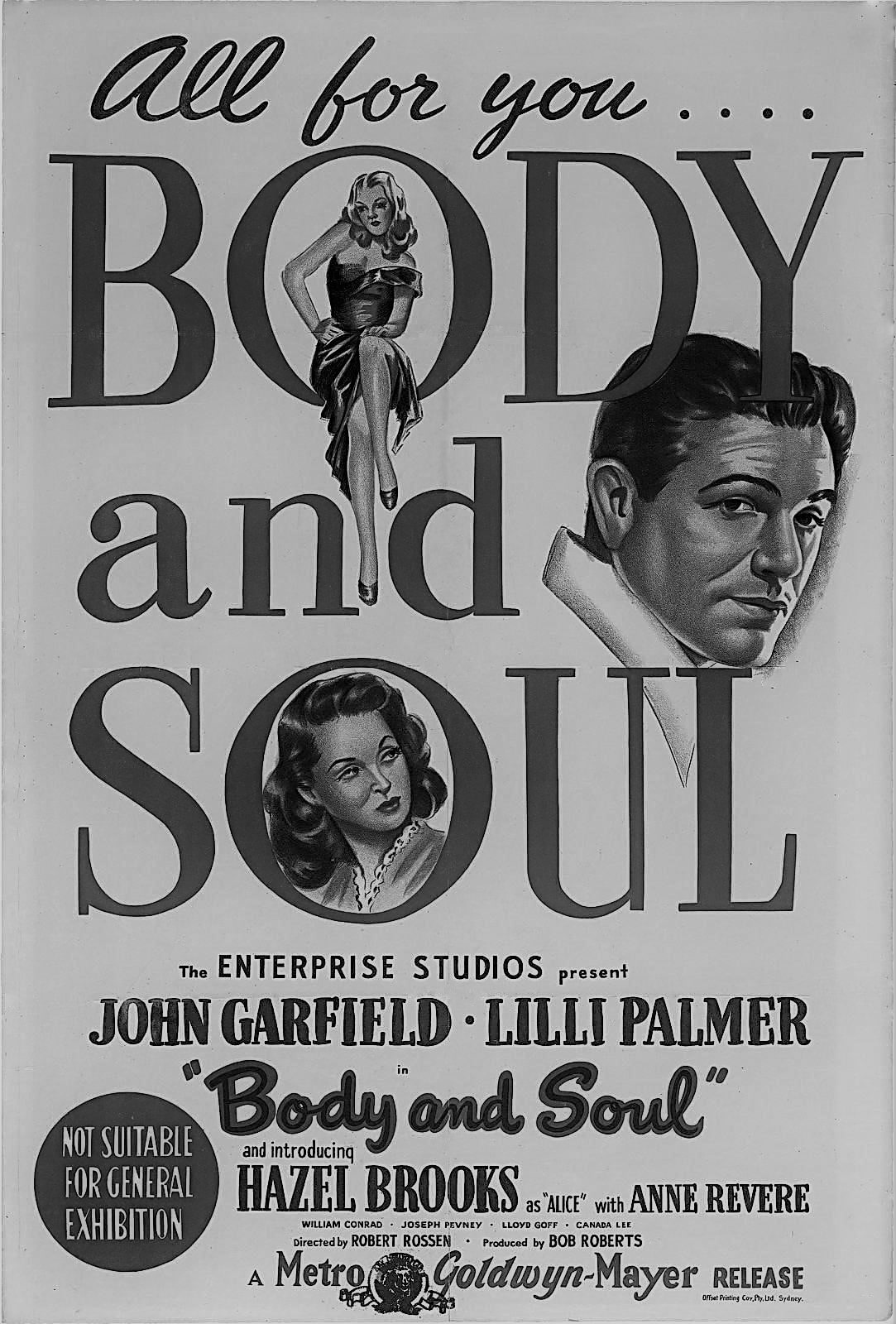 BODY AND SOUL (1947)
BODY AND SOUL (1947) (104 Min.) Genre: 1940 DRAMA, Transfer Quality: A
A guy from the slums battles his way to the top of the fight racket, only to learn that the crooked way isn't necessarily the best. Hard-hitting melodrama, crisp and rugged, with some excellent prize-fight sequences. Palmer is near-perfect; Garfield gives his best performance. *** The boxing drama Body and Soul benefits from a riveting screenplay by Abraham Polonsky, intense editing from Francis D. Lyon and Robert Parrish, and innovative cinematography by the legendary James Wong Howe. Tying all of these elements together is director Robert Rossen, who coaxes a superb performance from John Garfield as the troubled boxer Charlie Davis. Rossen would explore similar themes of redemption in sports and gambling in 1960's The Hustler. Howe's tight shot composition would influence similar classics over the years, most notably Martin Scorsese's Raging Bull; the similarly influential work of Lyon and Parrish would garner the team an Oscar. — Richard Gilliam
Starring: John Garfield, Lilli Palmer, James Burke, Anne Revere | Directed by: Robert Rossen
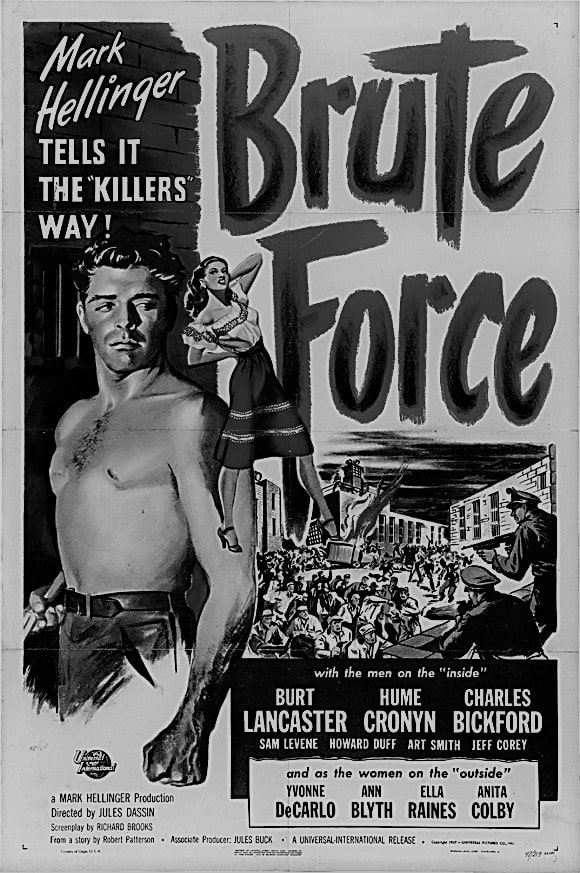 BRUTE FORCE (1947)
BRUTE FORCE (1947) (98 Min.) Genre: 1940 DRAMA, Transfer Quality: A
Burt Lancaster had one of his first starring roles in this hard-hitting prison drama. Capt. Munsey (Hume Cronyn) is a cruel, corrupt prison guard who has his own less-than-ethical ways of dealing with inmates, enough so that Joe Collins (Lancaster) — the toughest inmate in the cell block — has decided to break out. Collins tries to persuade Gallagher (Charles Bickford), the unofficial leader of the inmates and editor of the prison newspaper, to join him, but Gallagher thinks Collins' plan won't work. However, Collins does have the support of his cellmates, most of whom, like himself, wandered into a life of crime thanks to love and good intentions. Tom Lister (Whit Bissell) was an accountant who altered the books so he could buy his wife a mink coat. Soldier (Howard Duff) fell in love with an Italian girl during World War II and took the rap for her when she murdered her father. Collins pulled a bank job to raise money to pay for an operation that could possibly get his girl out of a wheelchair. And Spencer (John Hoyt) made the mistake of getting involved with a female con artist. After Munsey drives Tom to suicide and prevents Gallagher from obtaining parole, Gallagher joins up with Collins and his men in the escape attempt. Director Jules Dassin would next direct the influential noir drama The Naked City; six years later, he would move to Europe after political blacklisting prevented him from continuing to work in the United States. — Mark Deming
Starring: Burt Lancaster, Hume Cronyn, Charles Bickford, Yvonne De Carlo, Ann Blyth | Directed by: Jules Dassin
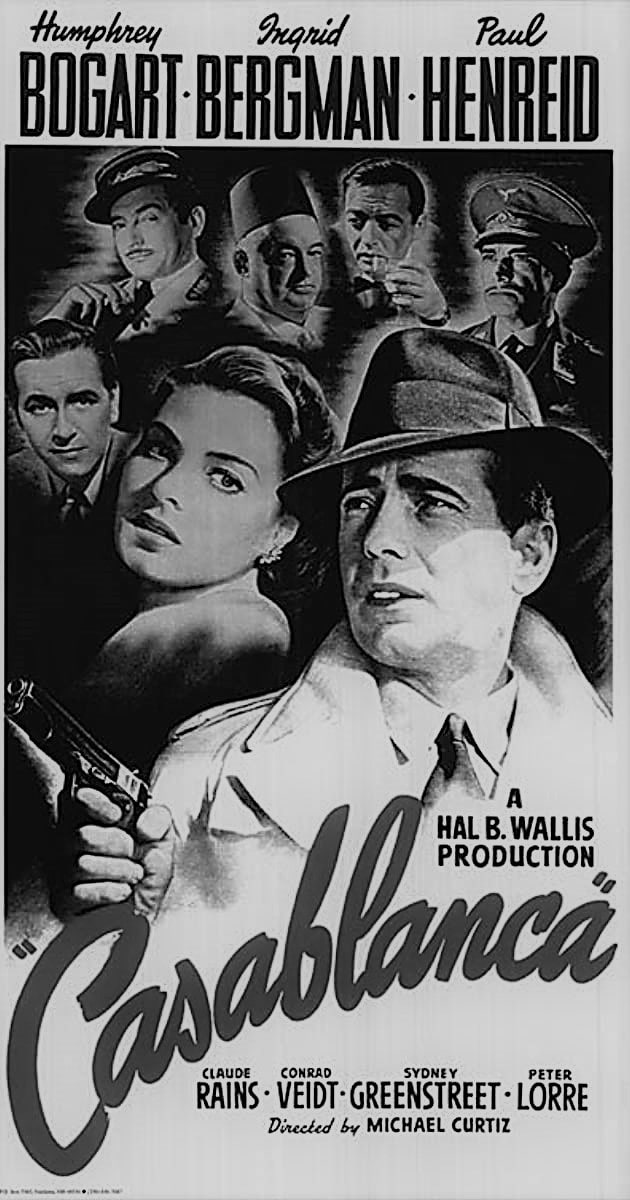 CASABLANCA (1942)
CASABLANCA (1942) (103 Min.) Genre: 1940 DRAMA, Transfer Quality: A
One of the most beloved American films, this captivating wartime adventure of romance and intrigue from director Michael Curtiz defies standard categorization. Simply put, it is the story of Rick Blaine (Humphrey Bogart), a world-weary ex-freedom fighter who runs a nightclub in Casablanca during the early part of WWII. Despite pressure from the local authorities, notably the crafty Capt. Renault (Claude Rains), Rick's café has become a haven for refugees looking to purchase illicit letters of transit which will allow them to escape to America. One day, to Rick's great surprise, he is approached by the famed rebel Victor Laszlo (Paul Henreid) and his wife Ilsa (Ingrid Bergman), Rick's true love who deserted him when the Nazis invaded Paris. She still wants Victor to escape to America, but now that she's renewed her love for Rick, she wants to stay behind in Casablanca. "You must do the thinking for both of us", she says to Rick. He does, and his plan brings the story to its satisfyingly logical, if not entirely happy, conclusion. — Robert Firsching
Starring: Humphrey Bogart, Ingrid Bergman, Paul Henreid, Claude Rains | Directed by: Michael Curtiz
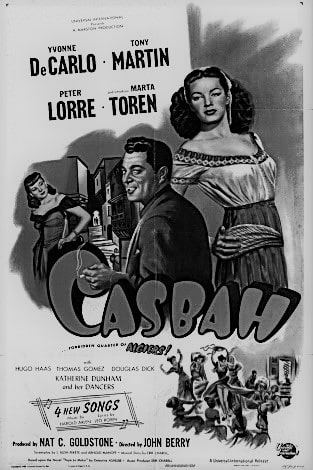 CASBAH (1948)
CASBAH (1948) (94 Min.) Genre: 1940 DRAMA, Transfer Quality: A
Casbah is a musical remake of the 1938 film Algiers, which was itself a remake of the French film Pepe Le Moko. Tony Martin stars in the old Jean Gabin/Charles Boyer role as Pepe Le Moko, a master thief who lives in the Casbah section of Algiers. A French police inspector (Peter Lorre) would love to capture Pepe, but realizes that as long as the thief remains in the Casbah he is protected by his vast network of criminals. When Pepe falls in love with a beautiful tourist (Marta Toren), he schemes for the first time to leave his little "empire". Betrayed by a former lover (Yvonne De Carlo), Pepe is shot down by the police as he emerges from his sanctuary. Casbah lacks the atmosphere of the earlier non-musical versions of the story, but Tony Martin is reasonably convincing as Pepe Le Moko, even when bursting into song. — Hal Erickson
Starring: Yvonne de Carlo, Tony Martin, Peter Lorre, Märta Torén | Directed by: John Berry
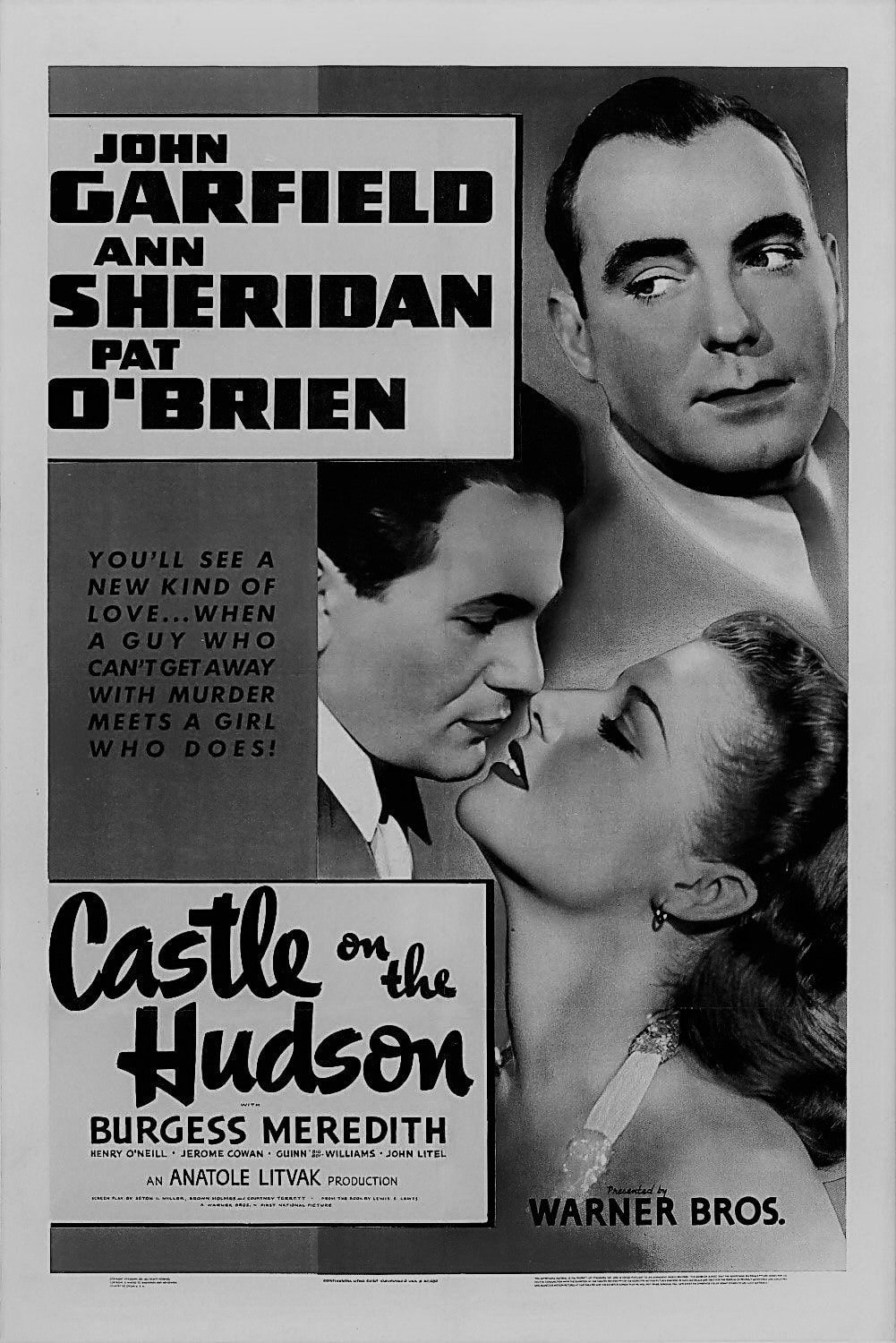 CASTLE ON THE HUDSON (1940)
CASTLE ON THE HUDSON (1940) (77 Min.) Genre: 1940 DRAMA, Transfer Quality: A
In this remake of the classic prison story 20,000 Years in Sing-Sing, John Garfield plays Tommy Gordon, a jewel thief who has been sent up the river for a minimum of 25 years. Tommy isn't especially worried about prison, as he's convinced his well-connected friends will help him get out before long. But Tommy learns the hard way his friends aren't as helpful as he imagined, and he regrets causing so much trouble for reform-minded warden Walter Long (Pat O'Brien), who he comes to regard as a friend and ally. Tommy's girlfriend, Kay Manners (Ann Sheridan), is desperate to get him out of prison and enlists the help of shifty lawyer Ed Crowley (Jerome Cowan); however, when Crowley tries to extract a payment from Kay that has nothing to do with money, she puts up a fight and ends up seriously hurt. Long shows his sympathetic side by granting Tommy a pass to visit Kay, but when he arrives at her home, he discovers Crowley has also arrived to see her. A scuffle ensues, and Kay shoots Crowley. Rather than see her go to jail, Tommy takes the blame, but soon goes on the lam, betraying Long's trust. — Mark Deming
Starring: John Garfield, Ann Sheridan, Pat O'Brien, Burgess Meredith | Directed by: Anatole Litvak
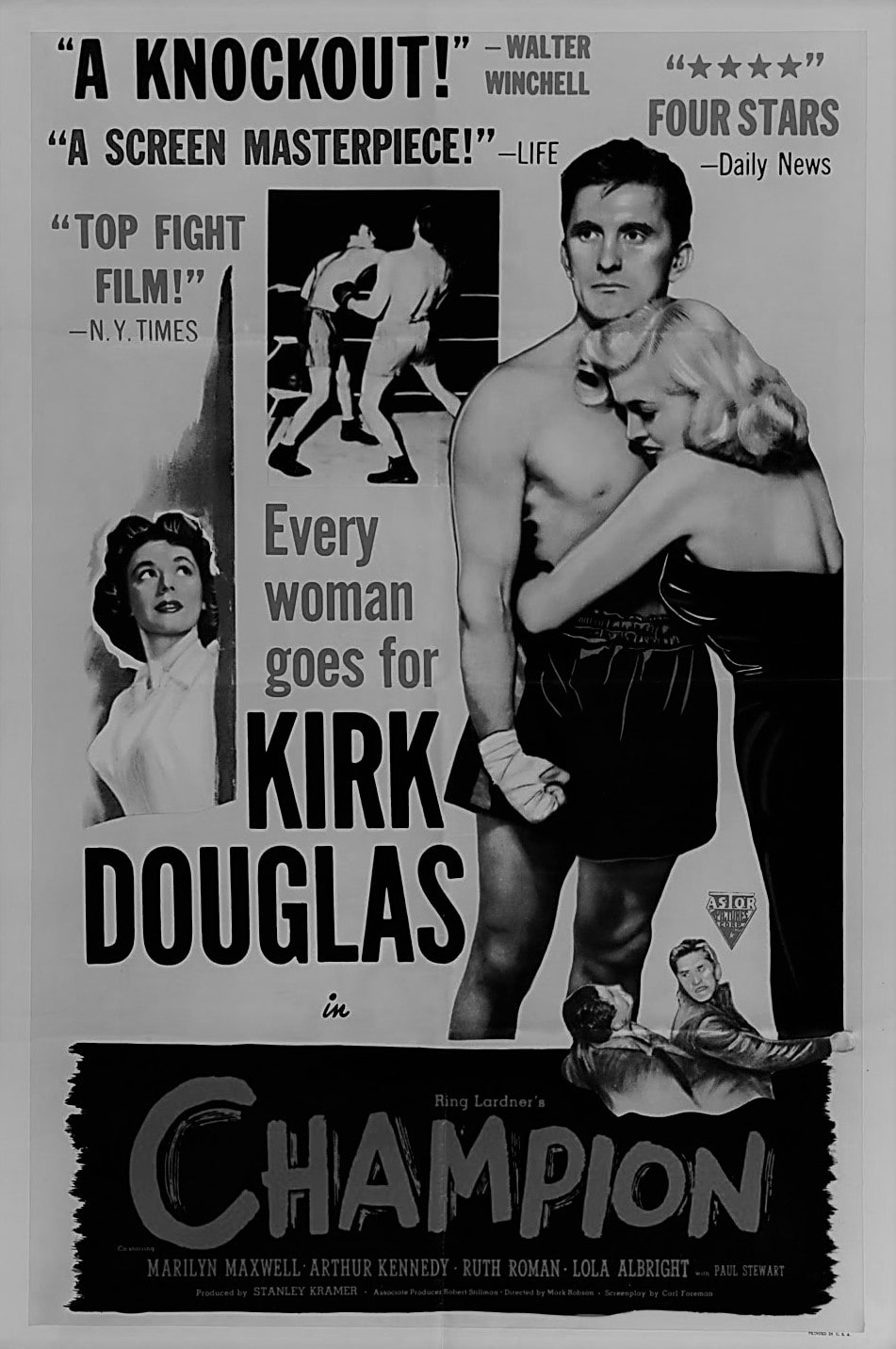 CHAMPION (1949)
CHAMPION (1949) (99 Min.) Genre: 1940 DRAMA, Transfer Quality: A
Mark Robson's Champion was one of three boxing movies that caught the public's interest in the late '40s. Nastier in tone than Body and Soul (1947) or The Set-Up (1949), Champion is perhaps the harshest example of the genre, a descent into a moral abyss in which its hero — Kirk Douglas at his brashest and most intense — leads the charge and never looks back at what he's given up. In contrast to John Garfield's Charley Davis in Body and Soul, who sells his soul for success but redeems his honor in the end, and Robert Ryan's Stoker Thompson in The Set-Up, who is a victim plain and simple, Douglas' Midge Kelly is the architect of his own destruction. The movie raised some unpleasant truths about human nature, and Douglas was so compelling in a vile and irredeemable role that he almost single-handedly changed the rules for the roles that could be played by Hollywood leading men and in which the public would accept them. (Billy Wilder and Fred MacMurray had already made progress in this direction with Double Indemnity in 1944, but most leading men were still unwilling to take that kind of risk.) Had Douglas, pegged as one of Hollywood's comers, not taken the role near the outset of his career and run with it to an Oscar nomination and box-office success, we might never have seen financing for such movies as A Streetcar Named Desire, The Wild One, On the Waterfront, The Naked Jungle, The Harder They Fall, The Man With the Golden Arm, or other groundbreaking antihero vehicles of the 1950s, which were Hollywood's most daring films of a decade often regarded as bland. Ironically, Champion received more Oscar nominations than any other boxing film made up to that time (and until Raging Bull), in every major category except Best Director, which was telling about Robson's career — he was a workmanlike director capable of occasional inspiration, but his best films featured the close involvement of a producer, Val Lewton early on and Stanley Kramer (who, with Douglas, reaped the lion's share of career benefits from this film) on Champion. — Bruce Eder
Starring: Kirk Douglas, Marilyn Maxwell, Arthur Kennedy, Lola Albright | Directed by: Mark Robson
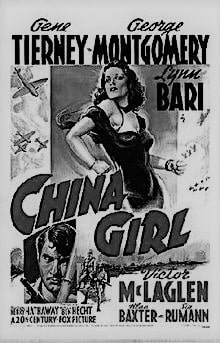 CHINA GIRL (1942)
CHINA GIRL (1942) (95 Min.) Genre: 1940 DRAMA, Transfer Quality: A
China Girl charts the exploits of two-fisted newsreel photographer Johnny Williams (George Montgomery), stationed in Burma and China in the early stage of WW II. Captured by the Japanese, he escapes from a concentration camp with the aid of beautiful, enigmatic "China Girl" Miss Young (Gene Tierney). The two arduously make their way back to friendly lines so that Johnny can deliver the vital military information he's managed to glean from his captors. Though it probably wasn't supposed to happen this way, Lynn Bari steals the film from official star Gene Tierney. China Girl was scripted by Ben Hecht with his usual blend of sentiment and cynicism. — Hal Erickson
Starring: Gene Tierney, George Montgomery, Lynn Bari, Victor McLaglen | Directed by: Henry Hathaway
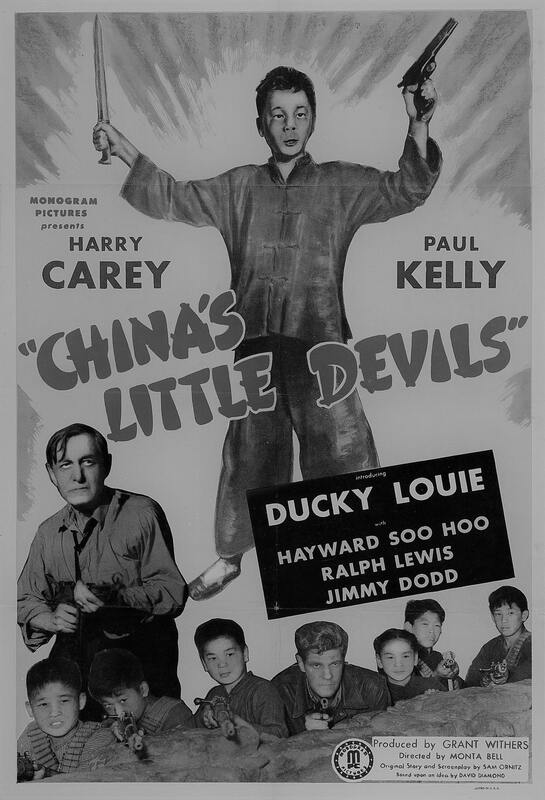 CHINA'S LITTLE DEVILS (1945)
CHINA'S LITTLE DEVILS (1945) (74 Min.) Genre: 1940 DRAMA, Transfer Quality: B
In this propaganda film, a courageous group of Chinese children risk their lives to assist downed American pilots escape the ruthless Japanese oppressors.
Starring: Paul Kelly, H.T. Tsiang, Gloria Ann Chew, Ralph Lewis | Directed by: Monta Bell
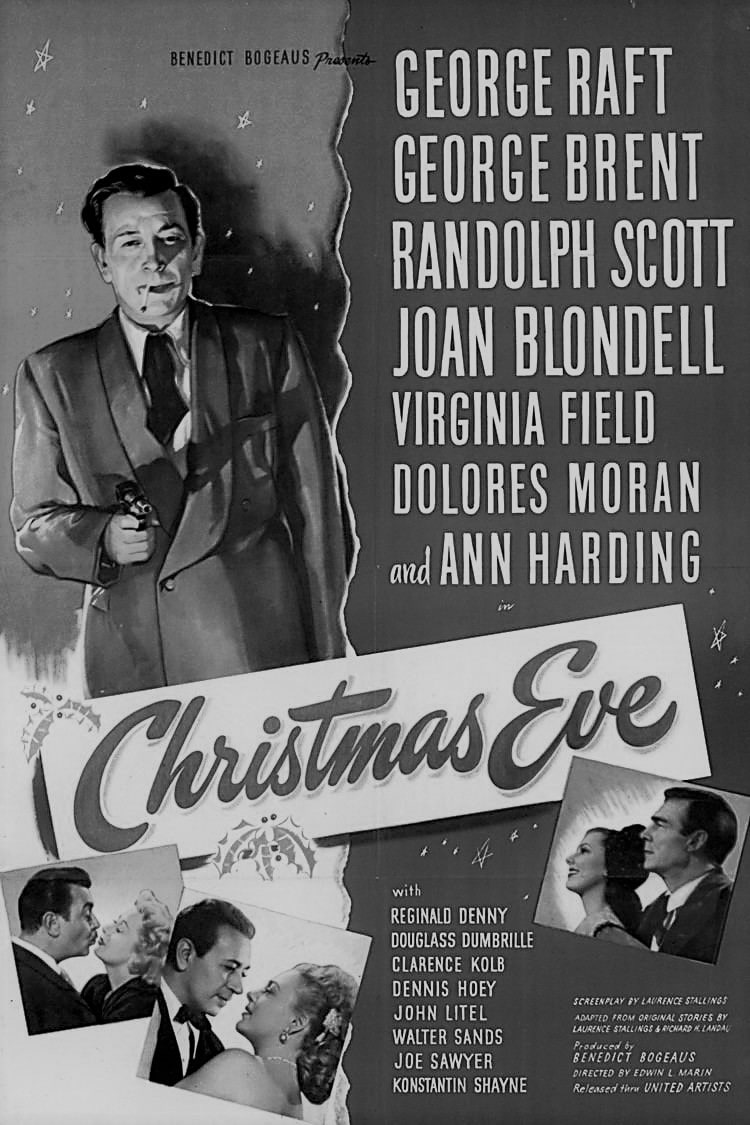 CHRISTMAS EVE (1947)
CHRISTMAS EVE (1947) (90 Min.) Genre: 1940 DRAMA, Transfer Quality: B
This episodic holiday film centers around a rich spinster aunt whose greedy nephew is attempting legal action to take her estate. Before he makes a final decision, a caring judge tells the spinster that she can rally together the three foster children she raised to help her keep the estate, he will delay the nephew's action. Now she must find her three grown boys who have gone in wildly different directions. One is a boozy cowboy involved in a baby racket, another is a deadbeat deeply indebted to the nephew, and the other is a successful owner of a South American cafe on the lam for a con-job he didn't commit. She endures and adventurous journey, but the three do manage to come together on Christmas Eve, save the estate, and give the conniving nephew his due. — Sandra Brennan
Starring: George Raft, George Brent, Randolph Scott, Joan Blondell, Ann Harding, John Litel, Douglas Dumbrille | Directed by: Edwin L. Marin
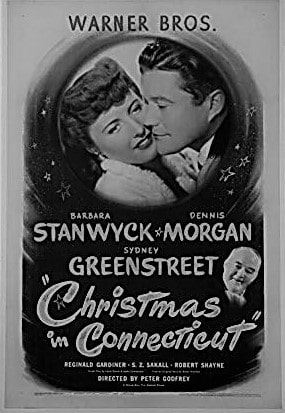 CHRISTMAS IN CONNECTICUT (1945)
CHRISTMAS IN CONNECTICUT (1945) (102 Min.) Genre: 1940 DRAMA, Transfer Quality: A
War hero Dennis Morgan becomes the object of a publicity stunt staged by magazine publisher Sidney Greenstreet. The corpulent print mogul announces that Morgan has won a Christmas dinner, to be prepared by the magazine's housekeeping expert Barbara Stanwyck in her own Connecticut home. The catch: Not only does Stanwyck not have a home in Connecticut, but she's never been in a kitchen in her life! She also doesn't have a husband (as her articles claim), so Stanwyck's erstwhile beau Reginald Gardiner is pressed into service as the hubby. As for the cooking, that will be handled by master chef S. Z. "Cuddles" Sakall. This solves everything, right? No way, Jose. Long dismissed as a lesser film farce, Christmas in Connecticut has its own irresistible charm, and has in recent years become a perennial Christmas-eve TV attraction. Pay absolutely no attention to the 1992 TV remake, starring Dyan Cannon and directed by Arnold Schwarzenegger. — Hal Erickson
Starring: Barbara Stanwick, Dennis Morgan, Sydney Greenstreet, Reginald Gardiner | Directed by: Peter Godfrey
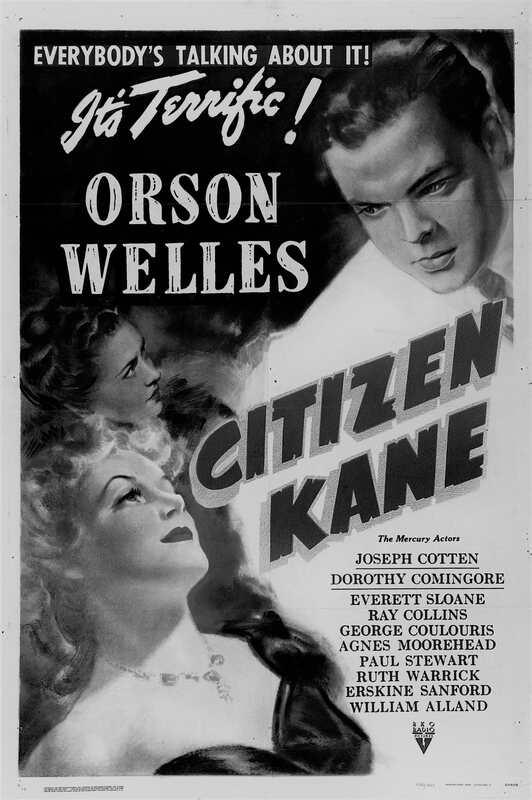 CITIZEN KANE (1941)
CITIZEN KANE (1941) (119 Min.) Genre: 1940 DRAMA, Transfer Quality: A
Orson Welles first feature film — which he directed, produced, and co-wrote, as well as playing the title role — proved to be his most important and influential work, a ground-breaking drama loosely based on the life of William Randolph Hearst which is frequently cited as the finest American film ever made. Aging newspaper magnate Charles Foster Kane (Orson Welles) dies in his sprawling Florida estate after uttering a single, enigmatic final word — "Rosebud" — and newsreel producer Rawlston (Phil Van Zandt) sends reporter Jerry Thompson (William Alland) out with the assignment of uncovering the meaning behind the great man's dying thought. As Thompson interviews Kane's friends, family, and associates, we learn the facts of Kane's eventful and ultimately tragic life: his abandonment by his parents (Agnes Moorehead and Harry Shannon) after he becomes the heir to a fortune in gold; his angry conflicts with his guardian, master financier Walter Parks Thatcher (George Coulouris); his impulsive decision that "it would be fun to run a newspaper" with the help of school chum Jedediah Leland (Joseph Cotten) and loyal assistant Mr. Bernstein (Everett Sloane); his rise from scandal sheet publisher to the owner of America's largest and most influential newspaper chain; his marriage to socially prominent Emily Norton (Ruth Warrick), whose uncle is the President of the United States; Kane's ambitious bid for public office, which is dashed along with his marriage when his opponent, corrupt political boss Jim Gettys (Ray Collins), reveals that Kane is having an affair with aspiring vocalist Susan Alexander (Dorothy Comingore); Kane's vain attempts to promote second wife Alexander as an opera star; and his final, self-imposed exile to a massive and never-completed pleasure palace called Xanadu. While Citizen Kane was a film full of distinguished debuts — along with Welles, it was the first feature for Joseph Cotten, Everett Sloane, Ray Collins, Agnes Moorehead, and Ruth Warrick — the only Academy Award it received was for Best Original Screenplay, for which Welles shared credit with veteran screenwriter Herman Mankiewicz. — Mark Deming
Starring: Orson Wells, Joseph Cotton, Everett Sloane, Dorothy Comingore, George Coulouris, Alan Ladd | Directed by: Orson Welles
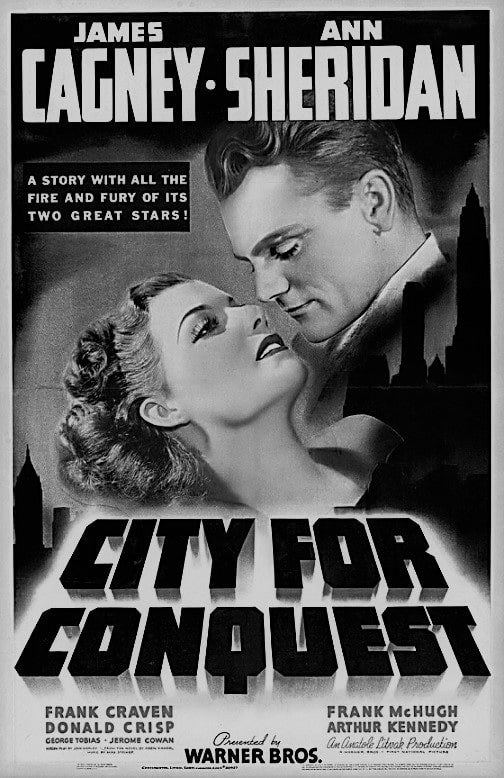 CITY FOR CONQUEST (1940)
CITY FOR CONQUEST (1940) (101 Min.) Genre: 1940 DRAMA, Transfer Quality: A
This filmization of Aben Kandel's novel City for Conquest stars James Cagney as a truck driver-turned-boxer. As Cagney rises to the top in the ring, his ex-girlfriend Ann Sheridan forms a dance act with Anthony Quinn. Blinded during a fight by acid-tinged boxing gloves, Cagney tries to exact revenge on the gangster who arranged the "accident," but is wounded in the melee. Now physically handicapped as well as visually challenged, Cagney becomes the manager of a New York newsstand through the kindness of his former manager Donald Crisp. Cagney uses his earnings to finance the musical education of his violinist brother Arthur Kennedy. Years later, a jilted Sheridan is reunited with Cagney at his newsstand, as both of them listen to the radio debut of Kennedy's first symphony. Upon its reissue in 1948, the film then ends abruptly (as do several preceding scenes) in order to fit a 98 minute running time; the original 1940 release ran 106 minutes. — Hal Erickson
Starring: James Cagney, Ann Sheridan, Frank Craven, Arthur Kennedy, Frank McHugh | Directed by: Anatole Litvak
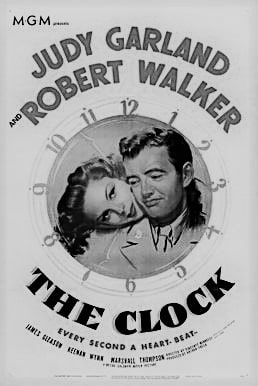 CLOCK, THE (1945)
CLOCK, THE (1945) (90 Min.) Genre: 1940 DRAMA, Transfer Quality: A
The Clock was designed by MGM as a "small" picture—though characteristically, it was a bigger production than most "A" efforts from any other studio. Paul Gallico's simple story involves a girl (Judy Garland) and a GI (Robert Walker), who meet under the huge clock at New York's Pennsylvania Station. Over the next 48 hours, the girl and the soldier fall in love, make the acquaintance of such lovable gotham types as cabbie James Gleason and inebriate Keenan Wynn, and decide to get married before the GI is shipped out again. The enormous Pennsylvania Station set, combined with some unusually convincing back projection (MGM was hitherto notorious for the worst back projection in the business) has convinced even lifelong New Yorkers that The Clock was actually lensed in Manhattan rather than Hollywood. Director Vincente Minnelli injected further visual dynamism in The Clock by seldom repeating the same camera angle twice. — Hal Erickson
Starring: Robert Walker, Judy Garland, James Gleason, Keenan Wynn | Directed by: Vincente Minnelli
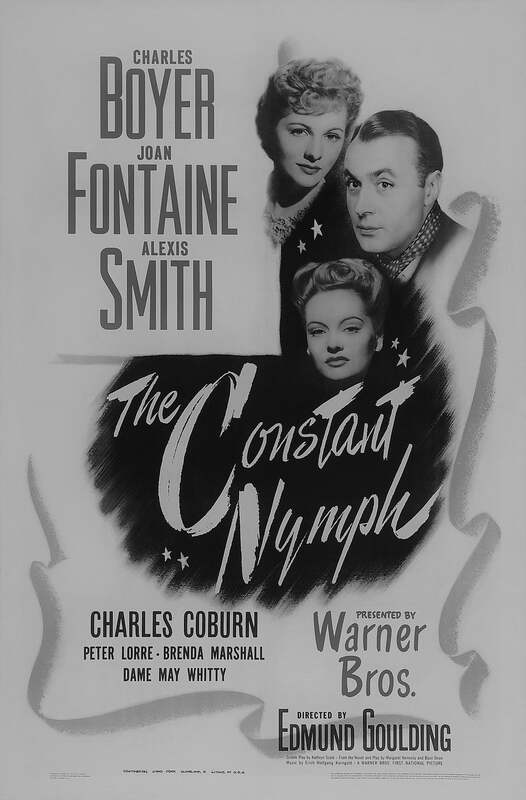 CONSTANT NYMPH, THE (1943)
CONSTANT NYMPH, THE (1943) (112 Min.) Genre: 1940 DRAMA, Transfer Quality: C
Warner Bros.' The Constant Nymph was the third filmization of Margaret Dean's 1924 novel; the first two were filmed in Britain in 1928 and 1933 by producer Michael Balcon. The plot was substantially the same in all three versions: A self-centered European musician (Charles Boyer) is idolized by a young Belgian girl (Joan Fontaine) with a serious heart condition. Though he is fond of the girl, the composer opts for a wealthy marriage to her socialite cousin (Alexis Smith)—and lives to regret the move. Peter Lorre, taking a respite from villainous roles, is quite effective as a philosophical family friend. Composer Erich Wolfgang Korngold's six-minute symphonic tone poem for Constant Nymph was given class-A treatment in a specially recorded RCA Victor orchestration in 1972.
Starring: Charles Boyer, Joan Fontaine, Alexis Smith, Brenda Marshall, Peter Lorre | Directed by: Edmund Goulding
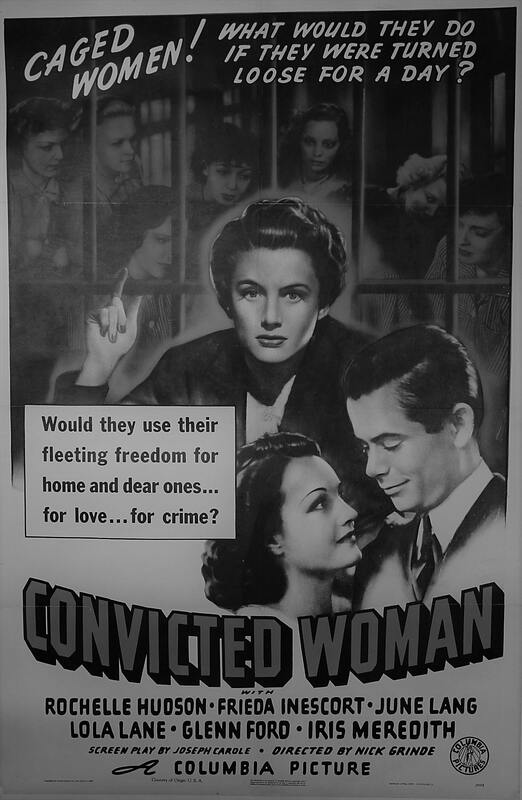 CONVICTED WOMAN (1940)
CONVICTED WOMAN (1940) (65 Min.) Genre: 1940 DRAMA, Transfer Quality: B
Convicted Woman was Columbia's annual "all girl" B picture, allowing studio executives to decide which of their female contractees would be retained and which would be dropped. Rochelle Hudson plays Betty Andrews, a jobless girl who through a series of unfortunate setbacks ends up in a girl's reformatory. Her fellow inmates include three-time-loser Hazel (Lola Lane), the nasty Duchess (June Lang), and such Columbia "regulars" as Iris Meredith, Lorna Gray, Mary Field, Beatrice Blinn, Dorothy Appleby, and hefty June Gittleson (aka June Bryde). Reporter Jim Brent (Glenn Ford) tries to secure a release for Betty, all the while exposing corruption among the prison officials. Also concerned with Betty's welfare is lady lawyer Mary Ellis (Freda Inescourt), who has some of the best scenes in the picture.
Starring: Rochelle Hudson, Glenn Ford, Lola Lane, Lorna Gray | Directed by: Nick Grinde
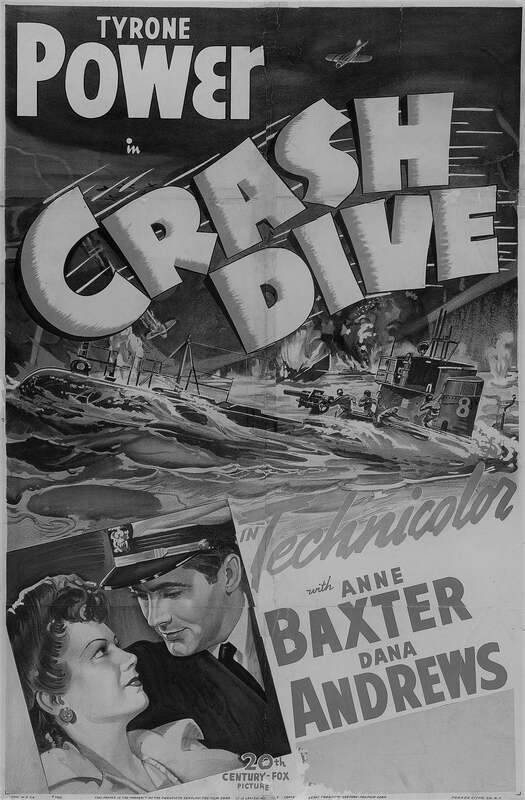 CRASH DIVE (1943)
CRASH DIVE (1943) (105 Min.) Genre: 1940 DRAMA, Transfer Quality: A
Tyrone Power made his last screen appearance before a three-year stretch in the Marines in this World War II drama. Lt. Ward Stewart (Tyrone Power) has served with distinction as the commander of a PT boat, so his uncle, Adm. Bob Stewart (Minor Watson), gives him a new and more challenging assignment aboard a submarine. Before shipping out, Ward enjoys a night on the town, where he meets and romances a pretty schoolteacher, Jean Hewlett (Anne Baxter). However, when Ward reports for duty, he discovers he'll be serving under Lt. Cmdr. Dewey Connors (Dana Andrews), who happens to be Jean's boyfriend. On leave and on land, Ward and Dewey are soon caught up in a romantic rivalry, while on duty and under the water they must work together to ferret out Nazi U-boats. Crash Dive received an Academy Award nomination for the special effects work in the film's battle sequences. — Mark Deming
Starring: Tyrone Power, Anne Baxter, Dana Andrews, James Gleason | Directed by: Archie Mayo
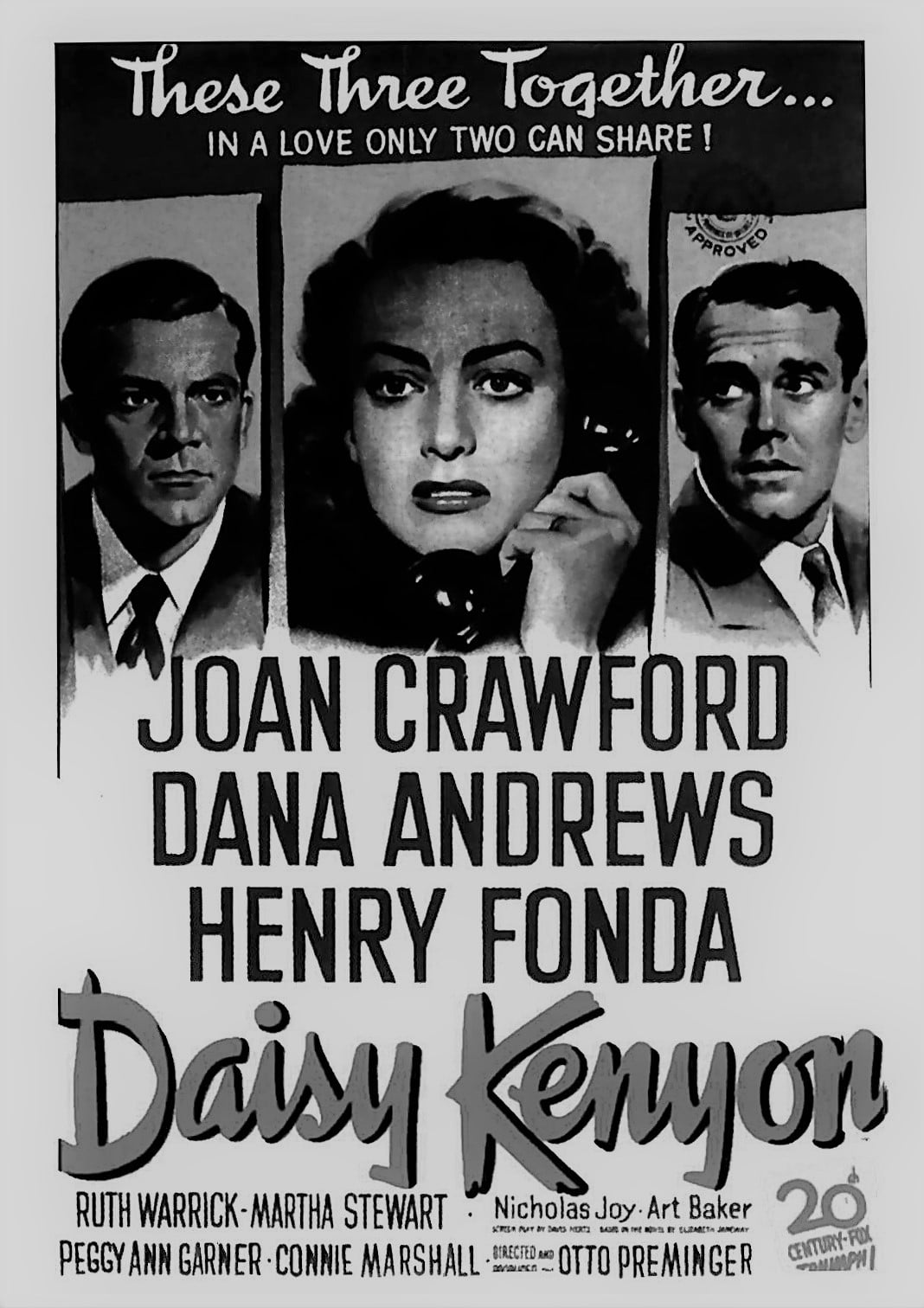 DAISY KENYON (1947)
DAISY KENYON (1947) (99 Min.) Genre: 1940 DRAMA, Transfer Quality: A
Daisy Kenyon stars Joan Crawford as the eponymous heroine, a Manhattan commercial artist. Daisy is torn between two men: a handsome, married attorney (Dana Andrews) and an unmarried Henry Fonda. Deciding to do the "right thing", Daisy marries Fonda, but carries a torch for the dashing Andrews. When the lawyer divorces his wife, he calls upon Daisy and tries to win her back. She is very nearly won over, but her husband isn't about to give up so easily. Both men argue over Daisy, who is so distraught by the experience that she nearly has a fatal automobile accident. In the end, Daisy realizes that she truly loves Fonda, and gives Andrews his walking papers. Daisy Kenyon is given a contemporary slant with a subplot about child abuse (in a Joan Crawford film!); and, in one scene set at New York's Stork Club, several celebrities (Walter Winchell, Leonard Lyons, John Garfield) make unbilled cameo appearances. — Hal Erickson
Starring: Joan Crawford, Dana Andrews, Henry Fonda, Ruth Warrick | Directed by: Otto Preminger
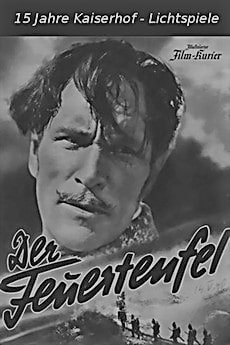 DER FEUERTEUFEL (1940)
DER FEUERTEUFEL (1940) (90 Min.) Genre: 1940 DRAMA, Transfer Quality: B
This historical drama features a woodcutter from Kaernten has to battle the French army, and the animosity of his fellow soldiers. This takes place during the Franco-Prussian War, and is only available in German.
Starring: Maria Holzmeister, Berti Schultes, Luis Trenker, I. Inni | Directed by: Luis Trenker
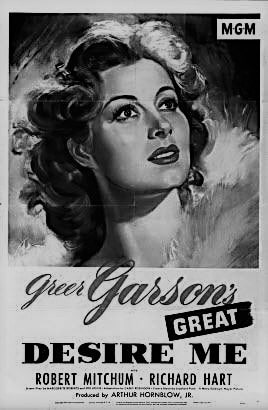 DESIRE ME (1947)
DESIRE ME (1947) (91 Min.) Genre: 1940 DRAMA, Transfer Quality: A
Marise Aubert (Greer Garson) has begun seeing a psychiatrist to treat her overwhelming guilt. It seems that Marise was married to Paul (Robert Mitchum), who was sent overseas in World War II. She loved Paul deeply and remained faithful to him. She then receives tragic news that Paul died in action, and months later is visited by Jean Renaud (Richard Hart), one of Paul's friends from the Army. Jean tells Marise that he and Paul were captured by enemy troops, and Paul died in the midst of a heroic attempt to escape. Marise senses that Jean is as lonely and heartbroken as she is, and she allows him to stay at her house. They fall in love, but the situation becomes complicated when a letter arrives from Paul. Jean hides it from Marise, hoping that she will not discover that her husband is still alive. He tries to convince her to sell her home and move away from her troubling memories, but before the sale can go through, Paul appears at the doorstep. While Paul can forgive Marise for betraying him, she is unable to forgive herself. Desire Me was released without a director's credit; the bulk of the principal photography was supervised by George Cukor, but by all accounts it was a troubled shoot, and eventually Mervyn LeRoy] and Jack Conway both worked to finish the picture. Garson nearly drowned while filming one scene, and Mitchum claimed that Cukor put Garson through 125 takes of another scene before she could say the word "No" to his satisfaction. — Mark Deming
Starring: Greer Garson, Robert Mitchum, Richard Hart, George Zucco | Directed by: George Cukor, Mervyn LeRoy
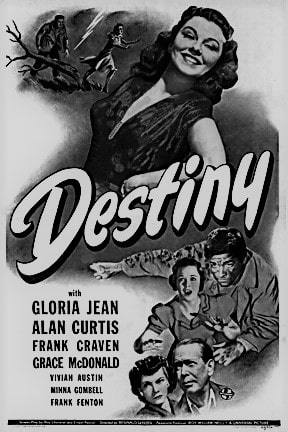 DESTINY (1944)
DESTINY (1944) (65 Min.) Genre: 1940 DRAMA, Transfer Quality: B
When director Julien Duvivier's episodic, all-star drama Flesh and Fantasy proved a bit too long in previews, Universal decided to remove the film's opening segment, which dealt with the foredoomed romance between an escaped criminal and a blind girl. Because this segment was too good to waste, the studio hired screenwriter Roy Chanslor to come up with additional material and Reginald LeBorg to direct a few new scenes, so that the episode could be released as a separate feature film. The result was the 65-minute Destiny, a curious melange of the sublime and the banal. The Duvivier-directed footage stars Alan Curtis as fugitive-from-justice Cliff Banks, who hides from the authorities in the farmhouse owned by kindly Clem Broderick (Frank Craven). Clem's daughter Jane (Gloria Jean), blind from birth, "sees" only the good in the outwardly unsavory Cliff, so it isn't surprising that the two fall in love. This tender little episode was supposed to have ended tragically, but Universal insisted upon a few "framing" scenes, directed by LeBorg, wherein Cliff is shown to be innocent of the crimes for which he has been imprisoned, and which allowed Cliff and Jane a happy denouement The stylistic schism between the "old" and "new" scenes is glaringly obvious; still, what's left of the original Duvivier footage is terrific, with Alan Curtis and Gloria Jean offering the finest performances of their screen careers.
Starring: Gloria Jean, Alan Curtis, Frank Craven, Grace McDonald | Directed by: Julien Duvivier, Reginald Le Borg
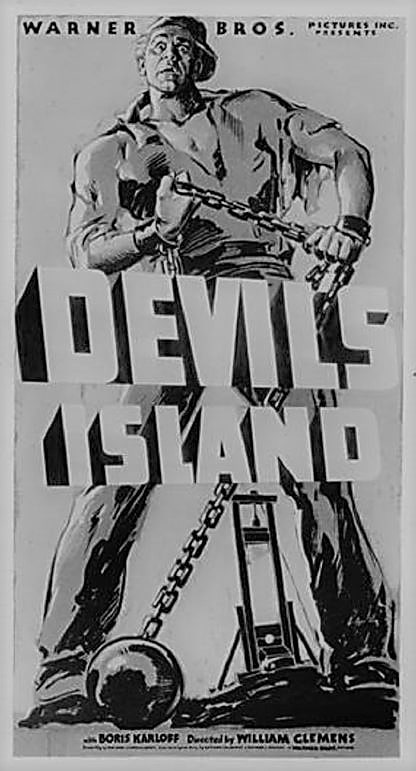 DEVIL'S ISLAND (1940)
DEVIL'S ISLAND (1940) (62 Min.) Genre: 1940 DRAMA, Transfer Quality: A
Veteran movie heavy Boris Karloff plays a sympathetic role in Devil's Island. Karloff portrays a humanitarian physician, arrested for treating the wounds of a treasonous fugitive. Sent to the Devil's Island penal colony, Dr. Karloff runs afoul of sadistic commandant James Stephenson, who seems obsessed by the guillotine (an execution sequence is one of the film's longest scenes). Stephenson's wife Nedda Harrigan, fed up with her husband's cruelties, aids Karloff in turning the tables on the commandant. Participating in an escape, Karloff makes his way to freedom and clears his name. Devil's Island runs a scant 60 minutes, due to editing demands made by the French consulate in Washington, who felt that the film was detrimental to Franco-American relations. — Hal Erickson
Starring: Boris Karloff, Nedda Harrigan, James Stephenson, Adia Kuznetzoff | Directed by: William B. Clemens
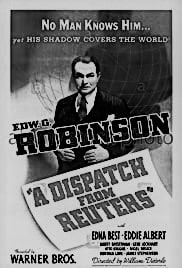 DISPATCH FROM REUTERS, A (1940)
DISPATCH FROM REUTERS, A (1940) (89 Min.) Genre: 1940 DRAMA, Transfer Quality: A
As part of his new contract with Warner Bros., Edward G. Robinson agreed to appear in the gangster comedy Brother Orchid on the condition that the studio permit him to play the leading role in the lavish biopic A Dispatch from Reuters. Robinson is cast as Baron Paul Julius Reiter, who in 1833 inaugurates a "pigeon post" messenger service which is soon rendered obsolete by the invention of the telegraph. Eventually adapting to the new communications process, Reuters is able to extends his links to the major capitals of Europe, achieving success by scooping his competition with a transcription of a speech by Louis Napoleon. By 1858, Reuters has expanded his operation to the English-speaking countries, seriously over-extending himself financially. Ultimately, Reuters is rescued from bankruptcy in 1865 when he broadcasts on a worldwide basis the news of President Lincoln's assassination-even before the American ambassador in England has been informed of the tragedy. Throughout the highs and lows of his career, Reuters is encouraged by his loyal and loving wife Ida (Edna Best), who continually reminds him that he is a communicator and not a grandstander. Though not as entertaining and satisfying as Robinson's previous biographical film Dr. Ehrlich's Magic Bullet, A Dispatch from Reuters' benefits immeasurably from the almost terrifying expertise of the Warners production staff and its stellar supporting cast (Eddie Albert, Gene Lockhart, Nigel Bruce, Otto Kruger et. al.) — Hal Erickson
Starring: Edward G. Robinson, Edna Best, Eddie Albert, Albert Basserman, Gene Lockhart | Directed by: William Dieterle
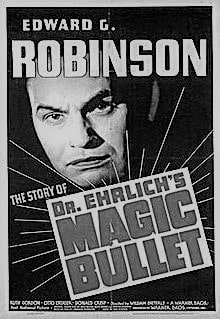 DOCTOR EHRLICH'S MAGIC BULLET (1940)
DOCTOR EHRLICH'S MAGIC BULLET (1940) (103 Min.) Genre: 1940 DRAMA, Transfer Quality: A
Edward G. Robinson portrays real-life German medical researcher Paul Erlich, the man who discovered and perfected "Formula 606", the cure for syphilis. The world at large would prefer to treat the disease as though it does not exist, so Erlich spends most of his life underfunded and frustrated. A no-nonsense dowager (Maria Ouspenskaya) has faith in Erlich, however, and thus provides the necessary funds to develop Formula 606. Once the serum is released to the public, Erlich's reputation is threatened when a handful of syphilitics die, ostensibly as a result of the "cure". Brought up on criminal charges, Erlich is exonerated by his old colleague Dr. Von Behring (Paul Lukas). Considered daring in its time for its exploration of a "taboo" subject, Dr. Erlich's Magic Bullet holds up as one of Warner Bros.' most solid biopics, with a convincing performance from a nearly unrecognizable Edward G. Robinson. — Hal Erickson
Starring: Edward G. Robinson, Ruth Gordon, Otto Kruger, Donald Crisp, Maria Ouspenskaya | Directed by: William Dieterle
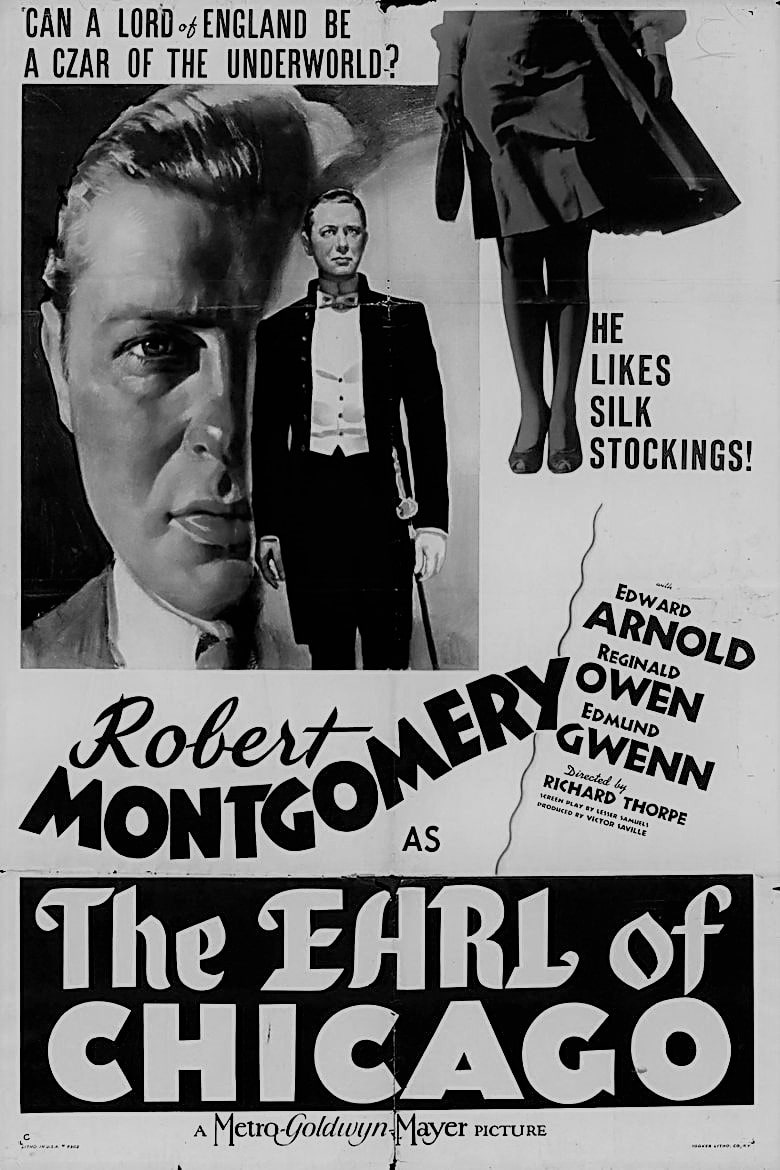 EARL OF CHICAGO, THE (1940)
EARL OF CHICAGO, THE (1940) (85 Min.) Genre: 1940 DRAMA, Transfer Quality: A
The schizophrenic screenplay of The Earl of Chicago is rendered even more bizarre by the uneven performance by Robert Montgomery. He plays Silky Kilmont, a Runyonesque American gangster who inherits a British title (Earl of Gorley) and mansion. Taking charge of his new estate, Silky has an amusing time trying to acclimate himself to the customs of the "landed gentry". Things take a sinister turn when Silky discovers that his trusted attorney Doc Ramsey (Edward Arnold) is actually a bigger crook than he is. In a rage, Silky murders Ramsey, then goes into what appears to be a catatonic shock, refusing to defend himself at his murder trial. Blood finally tells at the climax when Silky Kilmont, aka the Earl of Gorley, meets his fate with a dignity and decorum worthy of his aristocratic forebears. The queasy atmosphere of the film is heightened by its utter lack of romance; outside of character actress Norma Varden, there are barely any women in the film at all. — Hal Erickson
Starring: Robert Montgomery, Edward Arnold, Reginald Owen, Edmund Gwenn | Directed by: Richard Thorpe
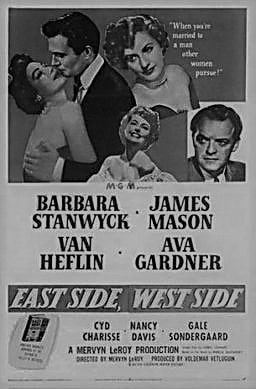 EAST SIDE, WEST SIDE (1949)
EAST SIDE, WEST SIDE (1949) (110 Min.) Genre: 1940 DRAMA, Transfer Quality: A
Director Mervyn Leroy lends a burnished MGM gloss to this sordid tale of infidelity among rich New York East Siders. Barbara Stanwyck stars as Jessie Bourne, a charming society woman whose finds out that her husband Brandon (James Mason) is guiltily indulging in an illicit affair with the earthy Isobel Lorrison (Ava Gardner). Jessie bears her husband's indiscretion with a gallant dignity, and when Isabelle is killed, Jesse realizes that she doesn't care for Brandon anyway. Van Heflin is also on hand as ex-cop Mark Dwyer, who admires Jessie's stoic dignity. — Paul Brenner
Starring: Barbara Stanwyck, James Mason, Van Heflin, Ava Gardner, Gale Sondergaard | Directed by: Mervyn LeRoy
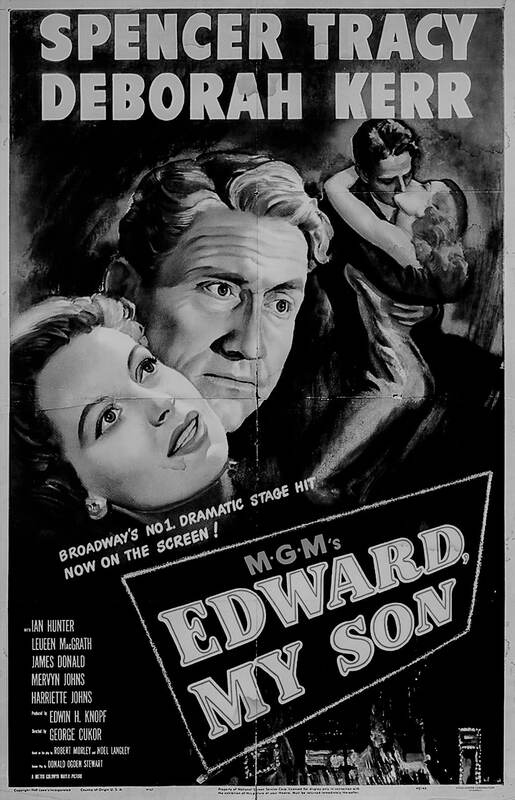 EDWARD, MY SON (1949)
EDWARD, MY SON (1949) (112 Min.) Genre: 1940 DRAMA, Transfer Quality: A
Businessman Spencer Tracy is devoted beyond all reason to his son Edward. Tracy lies, cheats, steals, commits arson, and drives two people to suicide in order to smooth Edward's path in life. The boy repays this loyalty by becoming an ungrateful wastrel, who fathers a child out of wedlock and ends up killing himself. After serving a prison sentence for his crimes, Tracy tries to pick up the pieces of his shattered life by searching for Edward's child. Based on the play by Robert Morley and Noel Langley, Edward My Son unsuccessfully retains the play's devices of never showing Edward and of having Spencer Tracy speak directly to the audience. — Hal Erickson
Starring: Spencer Tracy, Deborah Kerr, Ian Hunter, James Donald | Directed by: George Cukor
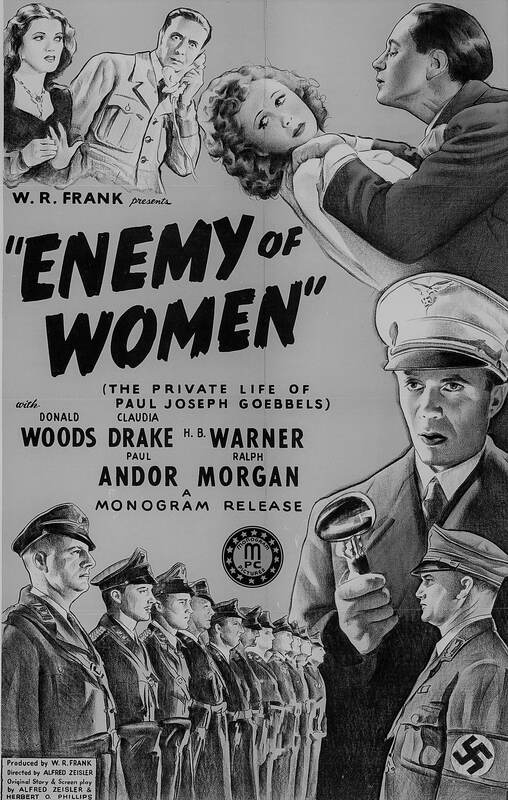 ENEMY OF WOMEN (1944)
ENEMY OF WOMEN (1944) (90 Min.) Genre: 1940 DRAMA, Transfer Quality: B
Though the filmmakers claimed they were writing a biography of Nazi minister Dr. Joseph Goebbels, this film is actually highly fictionalized and filled with patriotic propaganda. The story attempts to explain Goebbels' madness, blaming it on a love affair gone awry when he was a young aspiring playwright. The love in question was a young actress who spurns him. Goebbels cannot bear the rejection and swears that he will spend his life getting revenge upon her and those around her.
Starring: Claudia Drake, Wolfgang Zilzer, Donald Woods, H.B. Warner, Sigrid Gurie, Ralph Morgan, Gloria Stuart | Directed by: Alfred Zeisler
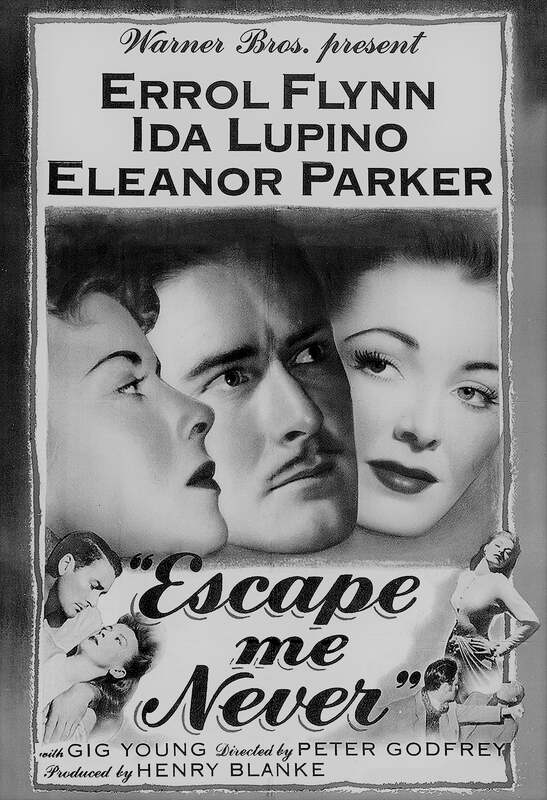 ESCAPE ME NEVER (1947)
ESCAPE ME NEVER (1947) (104 Min.) Genre: 1940 DRAMA, Transfer Quality: A
Based on a play and novel by Margaret Kennedy, Escape Me Never is a remake of the same-named 1935 British film. Largely set in Italy, the story concerns the relationship between poverty-stricken musician Sebastian Dunbrok (Errol Flynn) and unwed mother Gemma Smith (Ida Lupino). Suspecting that her fiancé, Caryl (Gig Young), Sebastian's brother, is the father of Gemma's child, young heiress Fennella McLean (Eleanor Parker) retreats to the Italian Alps. Attempting to straighten out the situation, Sebastian finds himself falling in love with Fennella. For his brother's sake, Sebastian breaks off the relationship and marries Gemma, but while awaiting the birth of her child, he writes a heartfelt ballet score dedicated to Fennella. However, when Gemma's baby dies, the conscience-stricken Sebastian changes the dedication to his wife, whom he has learned to genuinely love. The main redeeming feature of this treacly soap opera is the stirring musical score by Erich Wolfgang Korngold. — Hal Erickson
Starring: Errol Flynn, Albert Basserman, Ida Lupino, Eleanor Parker | Directed by: Peter Godfrey
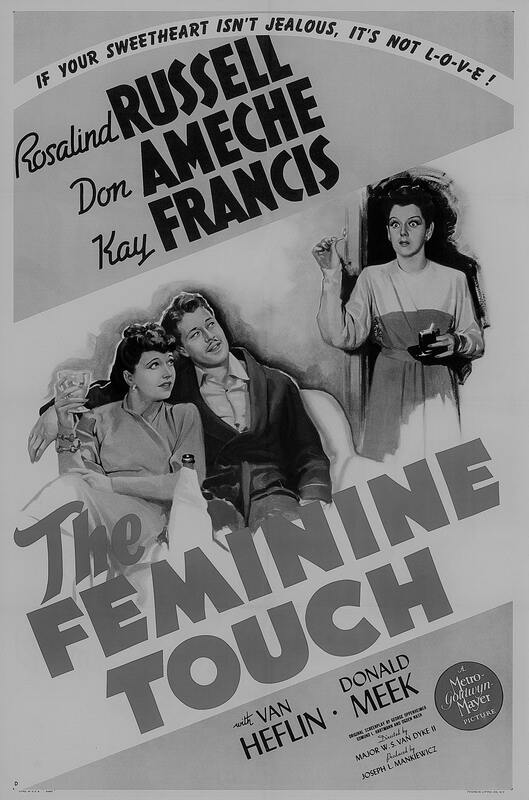 FEMININE TOUCH, THE (1941)
FEMININE TOUCH, THE (1941) (98 Min.) Genre: 1940 DRAMA, Transfer Quality: A
An expert cast of farceurs goes through its customary paces in MGM's The Feminine Touch. Don Ameche plays college professor-turned-author John Hathaway, who hits upon a potential best-seller with his book on marital jealousy. He heads to New York with his lovely wife Julie (Rosalind Russell), there to commisserate with publisher Elliot Morgan (Van Heflin), whose job it is to "popularize" Hathaway's scholarly tome. Instead, Morgan falls head over heels in love with Julie, forcing John to consult his own book as a balm to his own jealousy. Meanwhile, Morgan's sweetheart Nellie Woods (Kay Francis) tries to take drastic measures to win back her beau, leading Julie to conclude that Nellie is making a play for John! And that's the name of the tune for the remainder of the film's 97 minute. — Hal Erickson
Starring: Rosalind Russell, Don Ameche, Kay Francis, Van Heflin | Directed by: W.S. Van Dyke
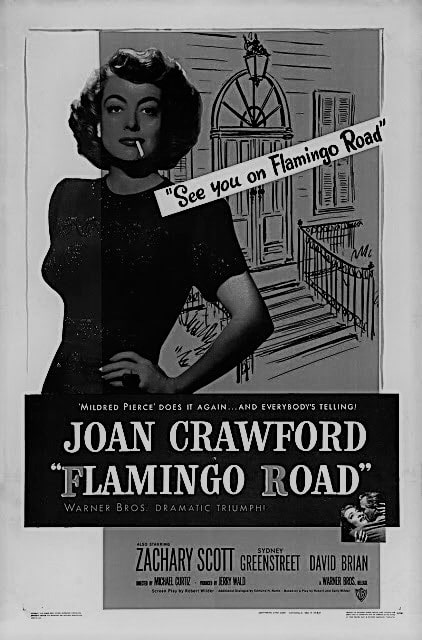 FLAMINGO ROAD (1949)
FLAMINGO ROAD (1949) (94 Min.) Genre: 1940 DRAMA, Transfer Quality: A
The fourth of Joan Crawford's Warner Bros. vehicles, Flamingo Road doesn't hold up as well as her earlier Mildred Pierce or Humoresque, but there's plenty to please the eye and ear. Sideshow kootch-dancer Lane Bellamy (Crawford), stranded in a backwater town, gets a job as a waitress. Lane begins falling in love with Fielding Carlisle (Zachary Scott), the political protégé of the town's big-daddy sheriff Titus Semple (Sidney Greenstreet). Semple regards Lane as a gold-digging troublemaker, and does his best to break up the romance, framing her on a trumped-up morals charges and having her shipped off to prison. Once out of the "joint," Lane returns to town, seeking revenge against both Semple and Carlisle. She charms political hack Dan Reynolds (David Brian) into marriage, then transforms Reynolds into a "reform candidate" bent on destroying the corrupt Semple machine. Faced with political ruin, Lane's ex-beau Carlisle commits suicide, a fact that Semple uses as a weapon against Reynolds. A showdown is inevitable—but the story is far from over! Flamingo Road later served as the basis for a weekly TV series; both the film and the series were based on a play by Robert and Sally Wilder. — Hal Erickson
Starring: Joan Crawford, Zachary Scott, Sydney Greenstreet, David Brian | Directed by: Michael Curtiz
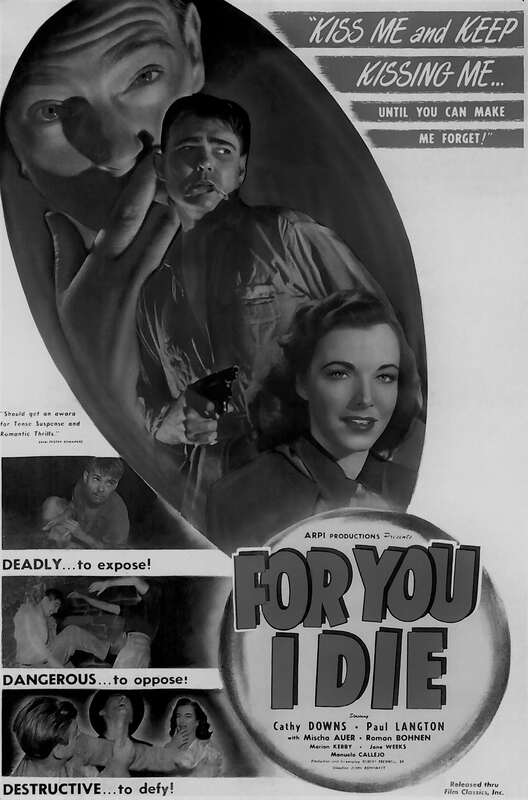 FOR YOU I DIE (1947)
FOR YOU I DIE (1947) (76 Min.) Genre: 1940 DRAMA, Transfer Quality: B
For You I Die was one of several atmospheric melodramas released by the short-lived firm of Film Classics. Escaping from the law, convict Johnny Coulter (Paul Langton) seeks refuge in a remote tourist camp. Here he falls in love with Hope Novak (Cathy Downs), who is instrumental in his ultimate decision to turn honest. In "Grand Hotel" fashion, the main story is fleshed out by a stunning variety of supporting characters, including the misanthropic Alec Shaw (Mischa Auer), the trashy Georgie (Jane Weeks) and the philosophical Smitty (Roman Bohnen). Though stereotypes abound in For You I Die, the film is strangely compelling nonetheless.
Starring: Cathy Downs, Paul Langton, Mischa Auer, Jane Weeks | Directed by: John Reinhardt
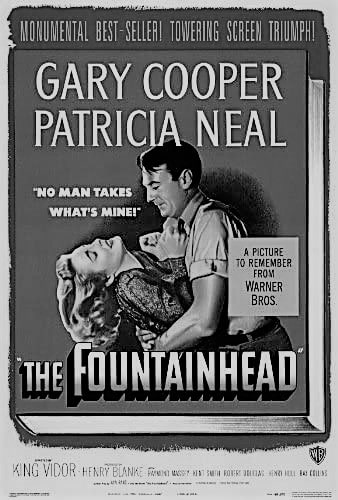 FOUNTAINHEAD, THE (1949)
FOUNTAINHEAD, THE (1949) (114 Min.) Genre: 1940 DRAMA, Transfer Quality: A
The hero of Ayn Rand's The Fountainhead is Howard Roark (Gary Cooper), a fiercely independent architect obviously patterned after Frank Lloyd Wright. Rather than compromise his ideals, Roark takes menial work as a quarryman to finance his projects. He falls in love with heiress Dominique (Patricia Neal), but ends the relationship when he has the opportunity to construct buildings according to his own wishes. Dominique marries a newspaper tycoon (Raymond Massey) who at first conducts a vitriolic campaign against the "radical" Roark, but eventually becomes his strongest supporter. Upon being given a public-housing contract on the proviso that his plans not be changed in any way, Roark is aghast to learn that his designs will be radically altered. Roark sneaks into the unfinished structure at night, makes certain no one else is around, and dynamites the project into oblivion. At his trial, Roark acts as his own defense, delivering an eloquent paean to individuality. He is acquitted, while the newspaper tycoon, upset that he could offer Roark no help during the trial, kills himself. This clears the way for a final clinch between Roark and Dominique on the skeleton of his latest building project. Ayn Rand's celebration of Objectivism didn't translate very well to film, with Gary Cooper coming off more selfish and petulant than anything else. The Fountainhead's saving graces are the solid direction by King Vidor, the rhapsodic musical score by Max Steiner, and the symbolism inherent in Cooper's manipulation of his power drill when he first lays eyes on Patricia Neal! — Hal Erickson
Starring: Gary Cooper, Patricia Neal, Raymond Massey, Kent Smith | Directed by: King Vidor
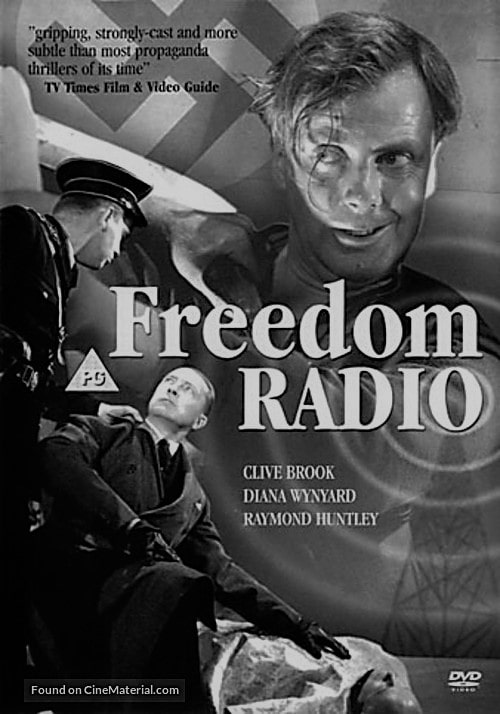 FREEDOM RADIO (1941)
FREEDOM RADIO (1941) (83 Min.) Genre: 1940 DRAMA, Transfer Quality: B
In this WW II propaganda film, a German doctor, highly praised by his Nazi employers, finds it increasingly difficult to support the oppressive, increasingly brutal movement. At first he does nothing as his friends are persecuted and his wife becomes increasingly enamored with the party's misguided philosophies. Eventually he enlists the aide of an engineer and creates a secret radio station where he broadcasts condemnations of Hitler and prays for a "better" Germany to arise out of the ashes of his ruined country.
Starring: Clive Brook, Diana Wynyard, Raymond Huntley, Derek Farr | Directed by: Anthony Asquith
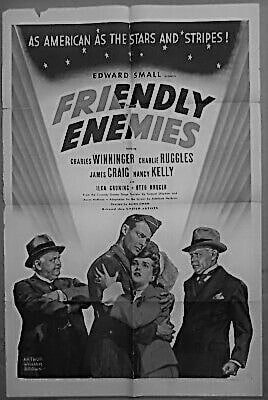 FRIENDLY ENEMIES (1942)
FRIENDLY ENEMIES (1942) (95 Min.) Genre: 1940 DRAMA, Transfer Quality: B
In this remake of the 1925 silent film, the breakup of a lifelong friendship between two German millionaires is chronicled. The trouble begins as WW II erupts. One of the men becomes sympathetic to the U.S. while the other becomes a Nazi sympathizer. They spend most of the film arguing about political philosophy. The trouble really starts when the Nazi millionaire is tricked into paying for German sabotage operations. One of the vehicles he inadvertently destroys carries his own son.
Starring: Charles Winninger, Charlie Ruggles, Nancy Kelly, Otto Kruger | Directed by: Allan Dwan
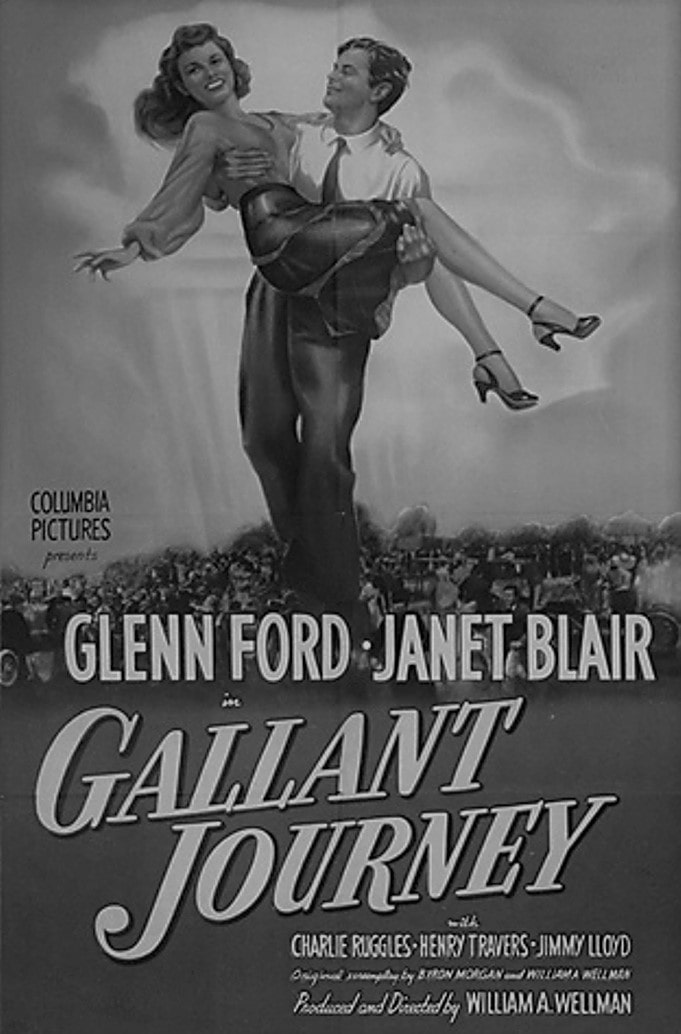 GALLANT JOURNEY (1946)
GALLANT JOURNEY (1946) (85 Min.) Genre: 1940 DRAMA, Transfer Quality: B
Producer/director William A. Wellman also co-scripted this biopic devoted to John J. Montgomery (Glenn Ford), the unsung 19th-century innovator of glider design. Montgomery's invention of a gold separator proves lucrative, but he pours its profits into financing his legal battles over patent infringement. The gliders created by Montgomery attract attention but no money, and he begins a relationship with Regina Cleary (Janet Blair), which helps sustain him. But when Montgomery becomes afflicted with vertigo and can no longer fly, he sickens and dies.
Starring: Glenn Ford, Janet Blair, Charlie Ruggles, Tommy Cook | Directed by: William Wellman
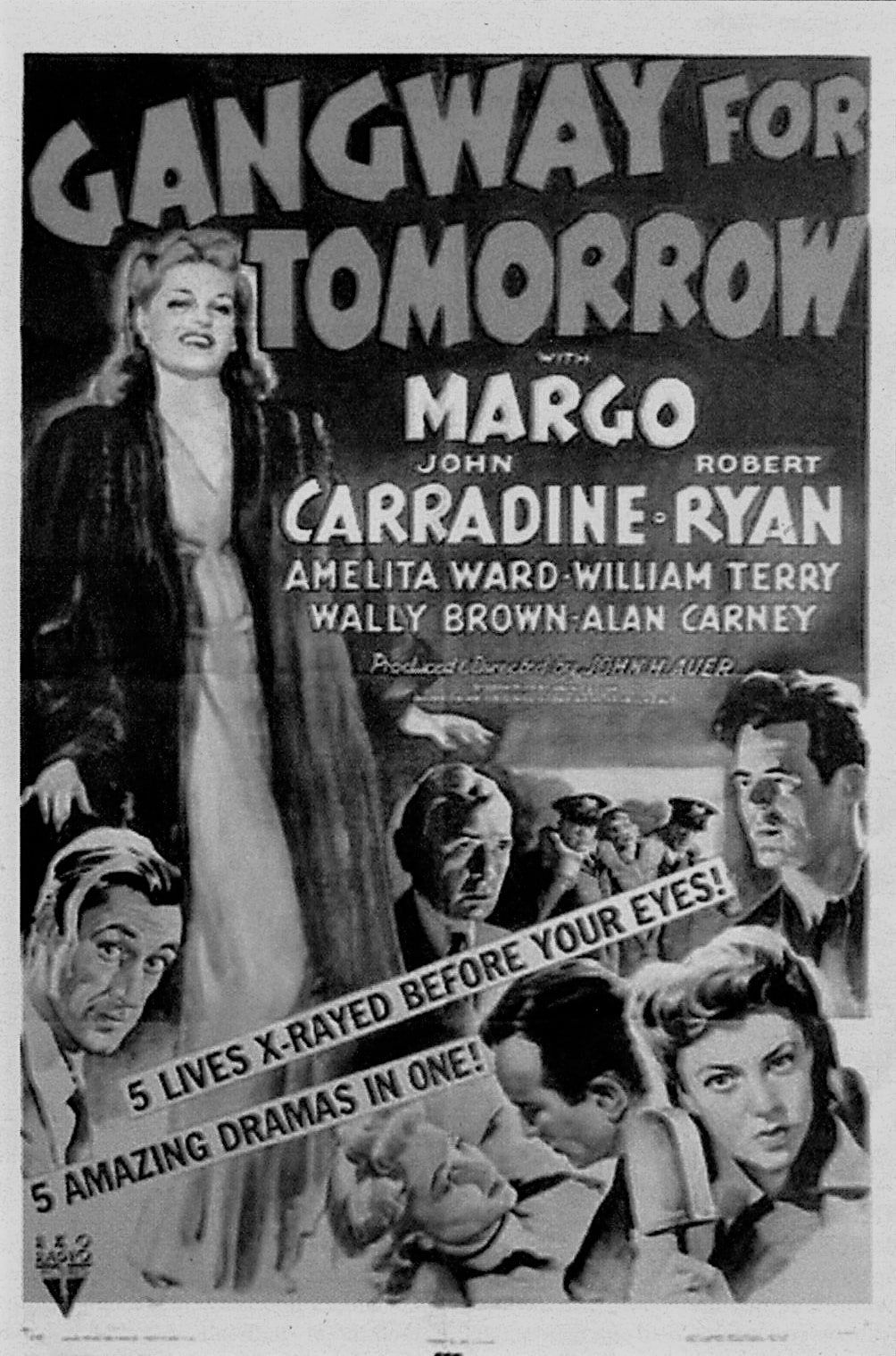 GANGWAY FOR TOMORROW (1943)
GANGWAY FOR TOMORROW (1943) (69 Min.) Genre: 1940 DRAMA, Transfer Quality: A
In this drama, set at a WW II munitions plant, the lives of five workers are chronicled. Their stories are told via flashback. Though they all ride together to work everyday, and they think they know each other very well, the stories they tell show them otherwise. The group of workers is made up of: a fighter for the French underground who came to America to help her countrymen back home; a race-car driver who, while racing, sustained serious injuries that rendered him unfit for military service; a disillusioned "Miss America"; a prison warden who was ordered to execute his own brother; and a hobo who decided to do something to help his country.
Starring: Margo, John Carradine, Robert Ryan, Amelita Ward | Directed by: John H. Auer
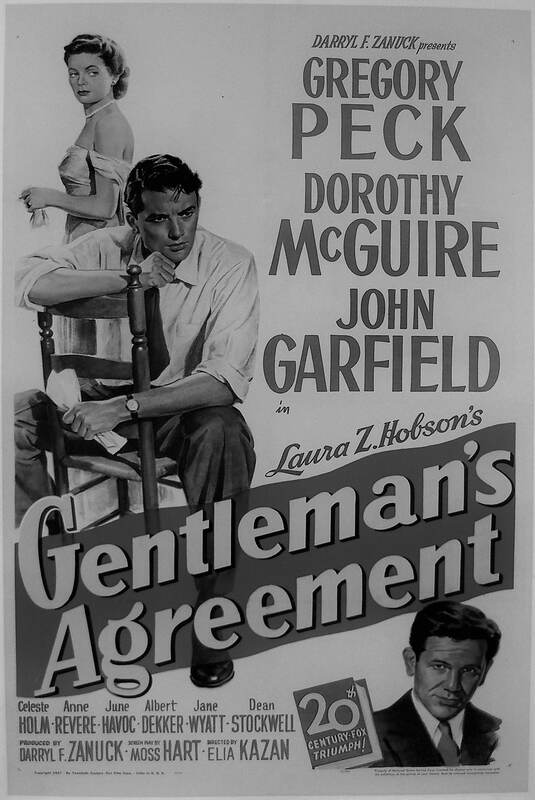 GENTLEMAN'S AGREEMENT (1947)
GENTLEMAN'S AGREEMENT (1947) (68 Min.) Genre: 1940 DRAMA, Transfer Quality: A
Adapted by Moss Hart from the novel by Laura Z. Hobson, this film stars Gregory Peck as recently widowed journalist Phil Green. With a growing son (Dean Stockwell) to support, Green is receptive to the invitation of magazine publisher John Minify (Albert Dekker) to write a series of hard-hitting articles on the scourge of anti-Semitism. In order to glean his information first hand, Green decides to pose as a Jew. As the weeks go by, Green experiences all manner of prejudice, the most insidious being the subtle, "gentleman's agreement" form of bigotry wherein anti-Jewish sentiments are merely taken for granted. Green's pose takes a toll on his budding romance with Minify's niece Kathy (Dorothy McGuire), who comes to realize by her own example that even those who insist that they harbor no anti-Semitic feelings are also capable of prejudice. Watching from the sidelines is Green's lifelong Jewish friend Dave (John Garfield, in what may be his best performance), who despite his inherent rage over the iniquities of racism has learned to be philosophical about the failings of his fellow man-but not to the extent that he's willing to give up the fight against blind hatred. Though warned by several Jewish film moguls that to produce the film would merely "make trouble," 20th Century-Fox chieftan Daryl F. Zanuck (who was not himself Jewish) saw the project through to its conclusion. The wisdom of Zanuck's decision was proven when Gentleman's Agreement not only made a fortune for Fox, but also won three Academy Awards, including Best Picture, Best Director (Elia Kazan) and Best Supporting Actress (Celeste Holm). — Hal Erickson
Starring: Gregory Peck, Dorothy McGuire, John Garfield, Celeste Holm | Directed by: Elia Kazan
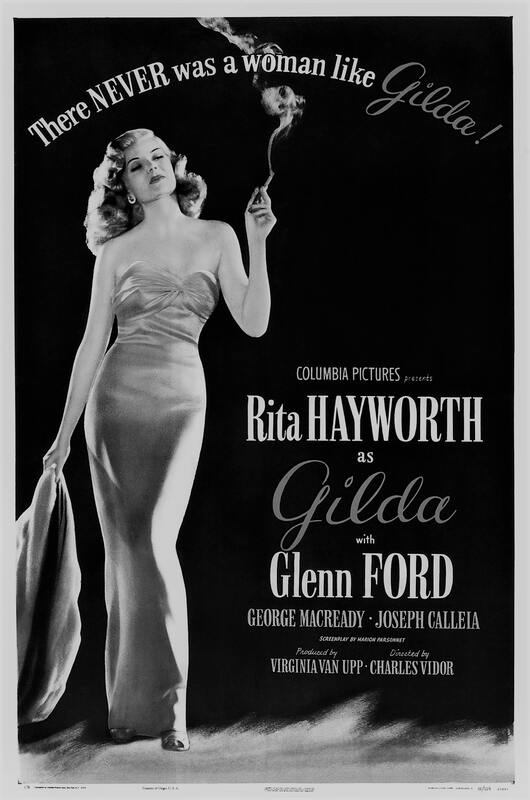 GILDA (1946)
GILDA (1946) (110 Min.) Genre: 1940 DRAMA, Transfer Quality: A
Columbia's lush and lavish film noir Gilda offers one of the strangest romantic triangles in any 1940s film. Played by Rita Hayworth in her considerable prime, Gilda is the sexy wife of mysterious, crippled casino owner George Macready. She is also the former love of gambler Glenn Ford, who takes a job as a croupier in Macready's Buenos Aires casino. Realizing that there is some sort of sexual tension between Hayworth and Ford, Macready goes out of his way to throw the two of them together by ordering Ford to act as Hayworth's bodyguard. One has the feeling throughout that Macready lusts after both Hayworth and Ford, all the while manipulating their downfall. In the film's most famous sequence, Hayworth defies both Ford and Macready by performing an overheated rendition of "Put the Blame on Mame" in front of the panting male casino customers. Ford continues to resists Hayworth's charms, but Macready, sensing that their affair has resumed, leaves in a fit of rage and is presumably killed in an airplane crash. Hayworth and Ford marry, but theirs in an abusive relationship due to Ford's inability to trust Hayworth and her supposed alley-cat behavior. At a crucial moment, Macready, who is not dead after all, returns to kill both Hayworth and Ford. But since Macready is not only a cuckold but a Nazi collaborator, it isn't hard to figure who's really going to end up sprawled on the floor. Perhaps a little too pretty and well-lit to totally succeed as melodrama, Gilda is nonetheless a superb showcase for Rita Hayworth—as well as a marvelous example of how a clever scriptwriter (Marion Parsonnet) could suggest all sorts of sexual aberrations while still remaining within the boundaries of the Production Code. — Hal Erickson
Starring: Rita Hayworth, Glenn Ford, George Macready, Joseph Calleia | Directed by: Charles Vidor
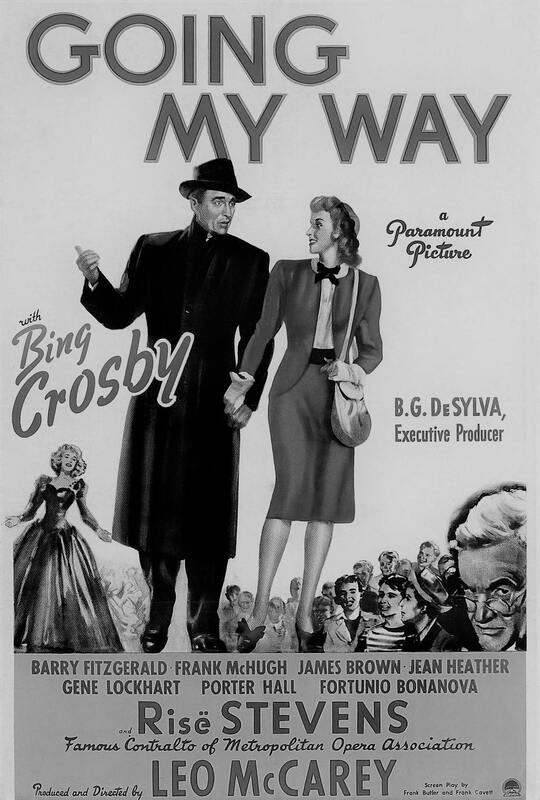 GOING MY WAY (1944)
GOING MY WAY (1944) (126 Min.) Genre: 1940 DRAMA, Transfer Quality: A
It took some doing to persuade the staunchly Catholic Bing Crosby to play a happy-go-lucky priest in Going My Way; luckily he acquiesced, winning an Academy Award in the process. Crosby is cast as Father Chuck O'Malley, newly arrived at rundown, heavily in debt St. Dominic's Church. Father Fitzgibbon (Barry Fitzgerald), the cranky, set-in-his-ways curate of St. Dominic's, is none too pleased with O'Malley's breezy, "modernistic" methods. Fitzgibbon is content to adhere to the policies he has followed for nearly 45 years. Without overtly challenging Fitzgibbon's authority (he likes the old buzzard, and the feeling is mutual), O'Malley sets about to win the confidence of the local street toughs, organizing the boys into an angelic church choir. He also forestalls the plans of St. Dominic's mortgage holder Ted Haines (Gene Lockhart) to evict Fitzgibbons by arranging a fundraising choir tour, to be headlined by O'Malley's childhood friend, opera star Genevieve Linden (Rise Stevens). When he's not coming to the rescue of St. Dominic's, O'Malley is smoothing the path of romance for Haines' son (James Brown) and orphaned Carol James (Jean Heather), and arranging for a reunion between Fitzgibbons and his nonagenarian Irish mother. There is sentiment by the bucketful in Going My Way, but director Leo McCarey sagaciously tempers the treacle with moments of genuine hilarity and several delightful (and seemingly spontaneous) musical interludes. In addition to Crosby, Oscars went to Barry Fitzgerald, Leo McCarey, screenwriters Frank Butler and Frank Cavett, and Burke and Van Heusen's song hit "Swingin' On a Star." Bing Crosby repeated his father O'Malley characterization in McCarey's 1945 sequel The Bells of St. Mary's. — Hal Erickson
Starring: Bing Crosby, Rise Stevens, Barry Fitzgerald, Gene Lockhart | Directed by: Leo McCarey
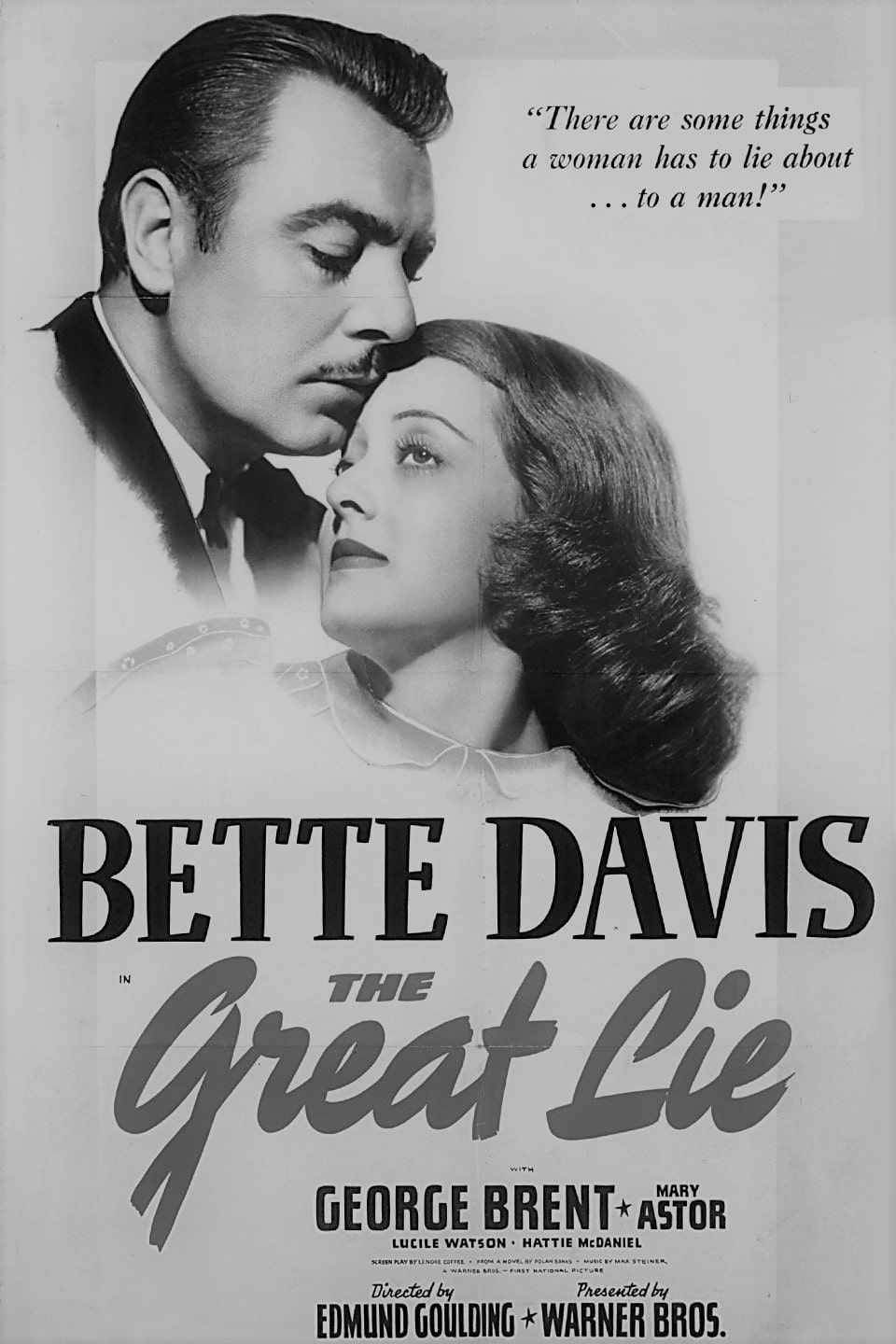 GREAT LIE, THE (1941)
GREAT LIE, THE (1941) (102 Min.) Genre: 1940 DRAMA, Transfer Quality: A
Mary has a child by George, who is Bette's husband, and Bette raises the child as her own, which is the great lie. Very talky, never compelling but soap opera fans may like it. Astor won a supporting actor Oscar.
Starring: Bette Davis, George Brent, Mary Astor, Lucile Watson | Directed by: Edmund Goulding
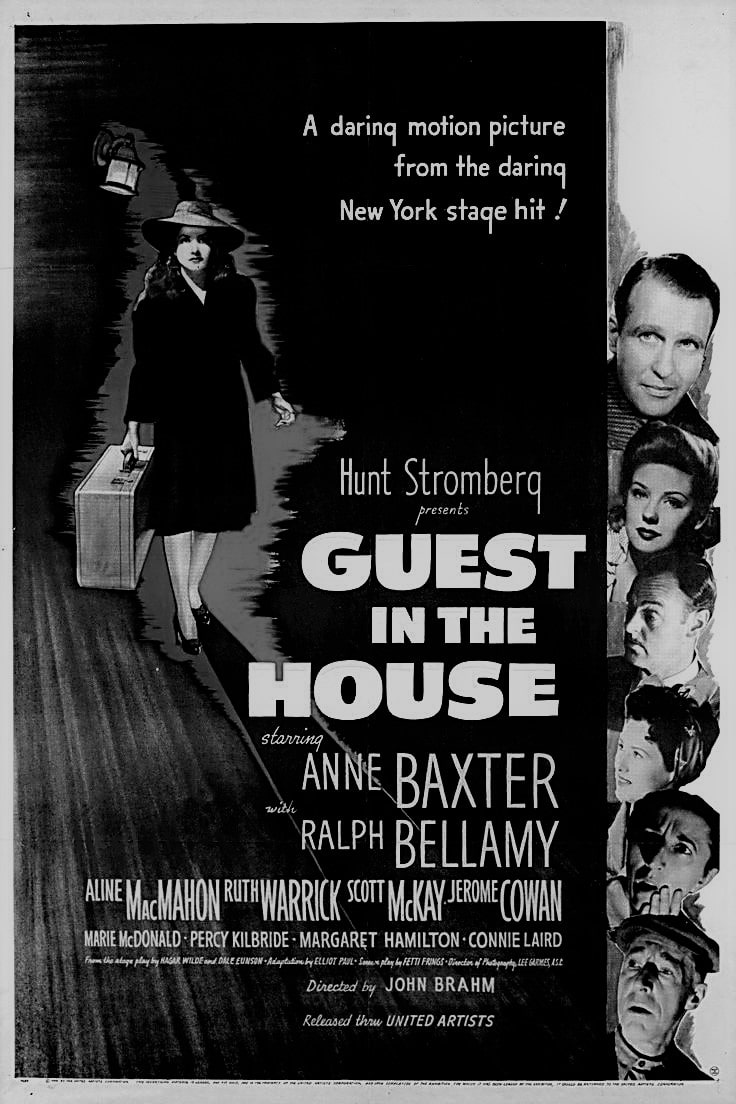 GUEST IN THE HOUSE (1945)
GUEST IN THE HOUSE (1945) (121 Min.) Genre: 1940 DRAMA, Transfer Quality: B
A Guest in the House is an involving psychological melodrama, well directed and acted, concerning a young woman's obsessive love. Evelyn (Anne Baxter), an emotionally vulnerable and unstable woman, stays at the home of her doctor Dan Proctor (Scott McKay). There she meets and falls in love with his brother, Douglas (Ralph Bellamy), who is happily married to Ann (Ruth Warrick). Evelyn then sets forth to break up the happy marriage and win the love of Douglas -- with tragic results. A Guest in the House directed by John Brahm, aided by Andre De Toth and Lewis Milestone, who are uncredited, is a sensitive, well-acted melodrama. Baxter gives a fine performance as the unstable young woman, who cannot overcome her obsessions. The fine musical score, composed by Werner Janssen, was nominated for an Academy Award.
Starring: Anne Baxter, Ralph Bellamy, Aline MacMahon, Ruth Warrick, Margaret Hamilton | Directed by: John Brahm
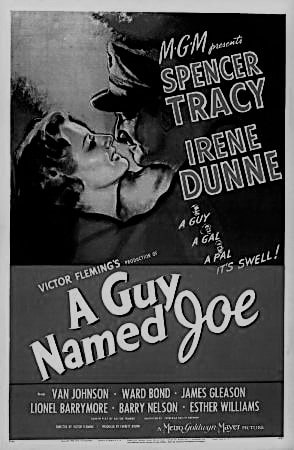 GUY NAMED JOE, A (1943)
GUY NAMED JOE, A (1943) (120 Min.) Genre: 1940 DRAMA, Transfer Quality: A
Given the tenor of the times-1943, that is-it was perhaps necessary for MGM to produce a film like A Guy Named Joe, wherein death in combat is softened and prettified within a fantasy framework. Spencer Tracy plays WW2 pilot Pete Sandidge, a reckless sort who is killed during a reconnaisance mission. His soul ascends to "pilot's heaven", where he is jovially greeted by The General (Lionel Barrymore), a military man's approximation of God. The General assigns Pete to act as guardian angel for a group of training pilots back on earth. One of these is handsome young Ted Randall (Van Johnson), who through a series of improbable plot complications ends up falling in love with Pete's girlfriend Dorinda Durston (Irene Dunne). There are many effective moments in A Guy Named Joe, and not a few silly ones, notably the scene in which Pete's spirit enables Dorinda to fly a plane to safety. In addition, all the makeup men and lighting technicians in the world cannot completely hide the fact that Irene Dunne is nearly twenty years older than Van Johnson. Still, A Guy Named Joe served its morale-boosting purpose back in 1943, and that's all anyone could ask for. The film was remade by Steven Spielberg in 1989 as Always. — Hal Erickson
Starring: Spencer Tracy, Irene Dunne, Van Johnson, Ward Bond, James Gleason, Lionel Barrymore | Directed by: Victor Fleming
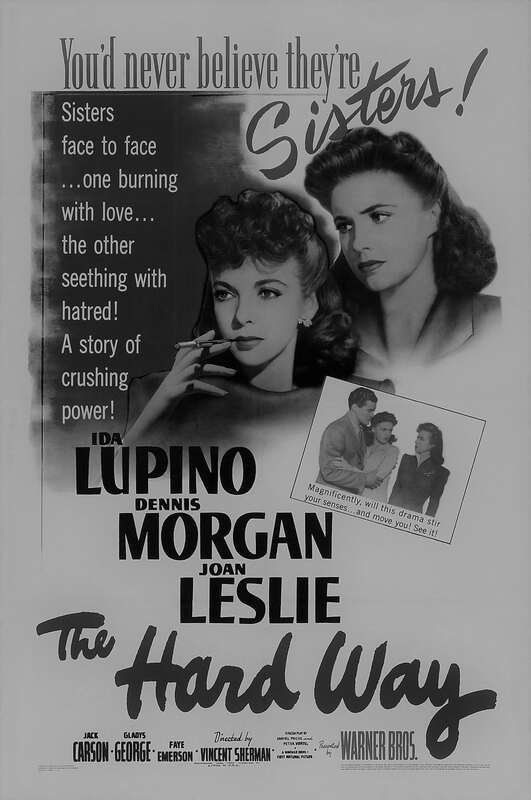 HARD WAY, THE (1942)
HARD WAY, THE (1942) (109 Min.) Genre: 1940 DRAMA, Transfer Quality: A
In this dark drama an iron-willed older sister forcibly thrusts her only modestly talented younger sister into a Broadway career. She does this to desperately try to keep her little sis from falling into the same small-town trap of marriage to a dull working-stiff and endless hours of taking care of babies and household drudgery. The bigger sister gets her chance when two handsome vaudevillians come to town. Seeing that one of the fellows eyes her younger sibling, the elder connives to get the two together. The scheme works and the smitten performer dumps his long-time partner in exchange for a career with his new love. That might have been hunky dory, but the ambitious big sister wants more for her sister and convinces her to become a solo act. So upset is the jilted partner that he commits suicide. Still the big sister refuses to stop pushing until finally the younger girl gets fed up and rebels in a bitter confrontation that only results in more tragedy. — Sandra Brennan
Starring: Ida Lupino, Dennis Morgan, Joan Leslie, Jack Carson, Faye Emerson | Directed by: Vincent Sherman
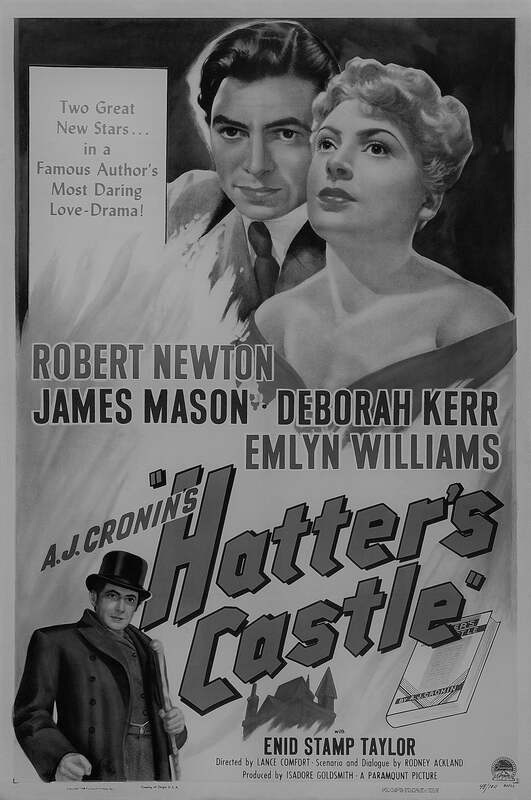 HATTER'S CASTLE (1941)
HATTER'S CASTLE (1941) (101 Min.) Genre: 1940 DRAMA, Transfer Quality: B
Paramount Pictures' British division was responsible for this adaptation of A.J. Cronin's novel Hatter's Castle. Robert Newton is appropriately mean-spirited as an 1890s hatter, James Brodie, who is anxious to claw his way up from poverty. Desperate to make himself socially acceptable as his income increases, Brodie proceeds to make life miserable for those closest to him: his wife (Beatrice Varley) and daughter (Deborah Kerr). For all his blinkered social climbing, Brodie can never truly escape his true station in life — a moral better suited to the class-conscious British audiences than the equal-opportunity Americans. Hatter's Castle was well distributed in the U.S. through Paramount's intimidatingly efficient studio-owned theater circuit.
Starring: Robert Newton, Deborah Kerr, James Mason, Emlyn Williams | Directed by: Lance Comfort
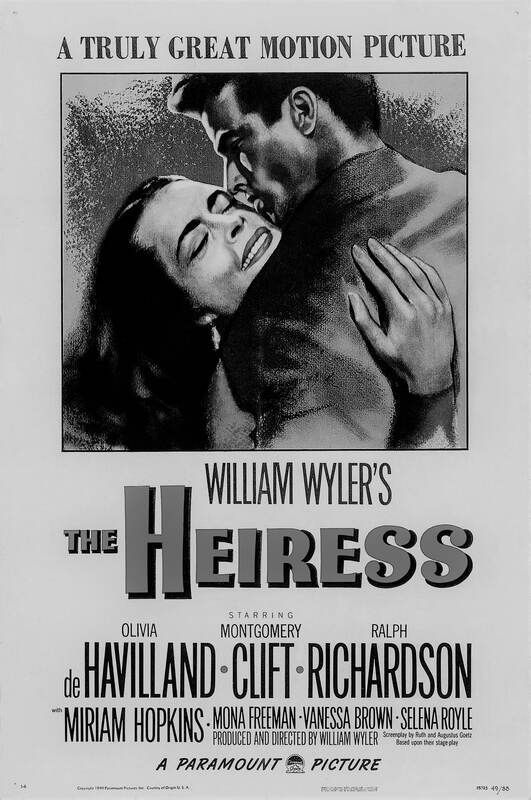 HEIRESS, THE (1949)
HEIRESS, THE (1949) (115 Min.) Genre: 1940 DRAMA, Transfer Quality: A
William Wyler's direction is careful and methodical in this version of the play adapted from Henry James's novella "Washington Square". De Havilland won a second Oscar for playing the homely girl who falls in love with a dashing fortune hunter Clift, but Richardson dominates the movie with his restrained portrayal of her ramrod father.
Starring: Olivia de Havilland, Montgomery Clift, Ralph Richardson, Miriam Hopkins | Directed by: William Wyler
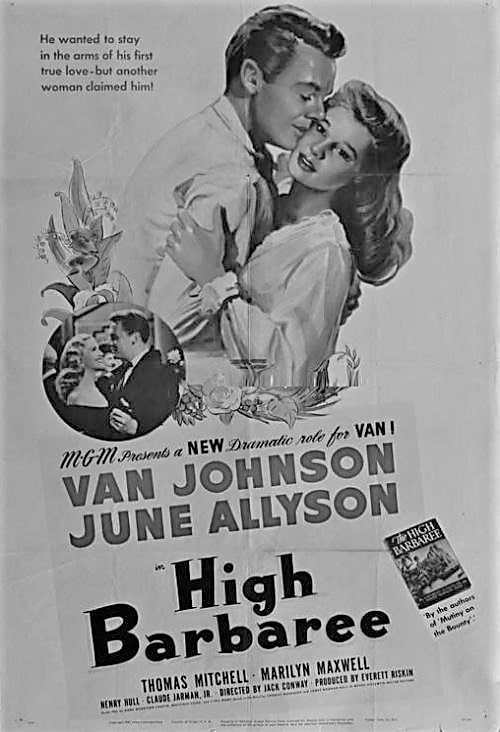 HIGH BARBAREE, THE (1947)
HIGH BARBAREE, THE (1947) (91 Min.) Genre: 1940 DRAMA, Transfer Quality: A
In this war movie, set during WW II, a pilot must crash land in the Pacific after he is shot down. As he floats upon the waves, he begins remembering the mythical island of Barbaree that his grandfather used to tell him about. To keep his wounded companion alive, he begins telling his life story. Via flashback, his youth, his love affairs, and his naval enlistment are chronicled. It is one of his lovers that talks her father into organizing a search party to find him. Meanwhile his companion dies. The pilot too, is half-dead by the time they find him. — Sandra Brennan
Starring: Van Johnson, June Allyson, Thomas Mitchell, Marilyn Maxwell | Directed by: Jack Conway
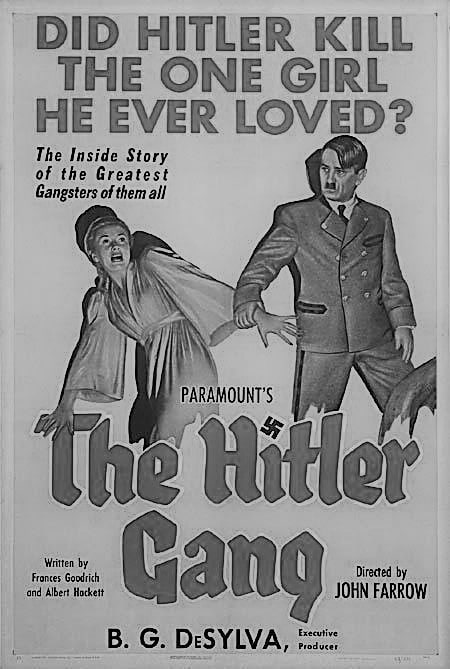 HITLER GANG, THE (1944)
HITLER GANG, THE (1944) (101 Min.) Genre: 1940 DRAMA, Transfer Quality: C
Though it takes several liberties with facts and motivations, The Hitler Gang is a reasonably absorbing chronicle of Hitler's rise to power. An obscure German corporal in WW1, Adolf Hitler (played by Robert Watson, better known for his comic portrayals of Der Fuhrer), embittered by the Versailles treaty, joins a minor-league politcal party called the National Socialists. With the help of some clever "spin doctors" like Joseph Goebbels (Martin Kosleck) and Heinrich Himmler (Luis van Rooten), Hitler takes the Nazis over from the ineffectual Captain Roehm (Roman Bohnen). Arrested for such political imbroglios as the 1923 Beer Hall Putsch, Hitler is sentenced to a short prison term, during which he writes his manifesto "Mein Kampf." Quickly enlisting the support of other disenfranchised losers, Hitler becomes a force to conjure with, finally winning political respectability when a senile General Von Hindenburg (Sig Ruman) appoints him to a choice political post. With the death of Hindenburg in 1933, Hitler is able to completely dominate the German government, whereupon he immediately embarks upon indoctrinating Germany's youth in the "glories" of Nazism, slaughtering his political enemies, and fomenting the second World War. Though the film was made in 1944, it ends on a note of hope, assuring the audience that Hitler and his minions could not long endure the Allied counterrattack (the filmmakers were far less certain of this than they would be some six months later). Understandably propagandistic, The Hitler Gang cannot be termed 100 percent accurate: For example, Hitler's persecution of the Jews is depicted as a cynical political tactic rather than the end result of deep-set European anti-semitism, while the death of his niece Geli Raubal (Pobly Dur) is misrepresented as a murder rather than a suicide. But considering the lies that were being spewed forth by the Nazis on a daily basis, the few factual gaffes in The Hitler Gang are eminently forgivable. The film's only real drawback is Robert Watson's two-dimensional portrayal of the title character, though even such accomplished actors as Alec Guinness and Derek Jacobi have found Hitler a virtually unplayable part.
Starring: Robert "Bobby" Watson, Martin Kosleck, Sig Rumann, Victor Varconi | Directed by: John Farrow
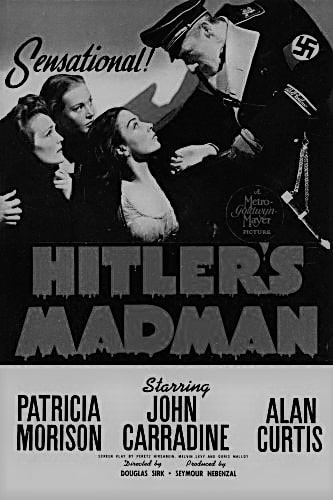 HITLER'S MADMAN (1943)
HITLER'S MADMAN (1943) (84 Min.) Genre: 1940 DRAMA, Transfer Quality: A
Hitler's Madman is based on an all-too-real wartime atrocity. John Carradine portrays Heydrich, the vicious SS officer put in charge of Nazi-occupied Czechoslovakia. Heydrich is killed by the Czech underground, prompting the Nazis to plan a horrible retaliation. The Gestapo selects the Czech village of Lidice for annihilation: They kill all the male villagers, throw the women and children into concentration camps, and torch Lidice into nonexistence. The victims of Nazi tyranny become martyrs to the underground cause, ending the film on a note of triumph. Based on a narrative poem by Edna St. Vincent Millay, Hitler's Madman was produced by the "poverty row" PRC studio, but was sold to MGM and given a class-A presentation at choice theatres throughout the U.S. — Hal Erickson
Starring: Patricia Morison, John Carradine, Alan Curtis, Howard Freeman, Ava Gardner | Directed by: Douglas Sirk
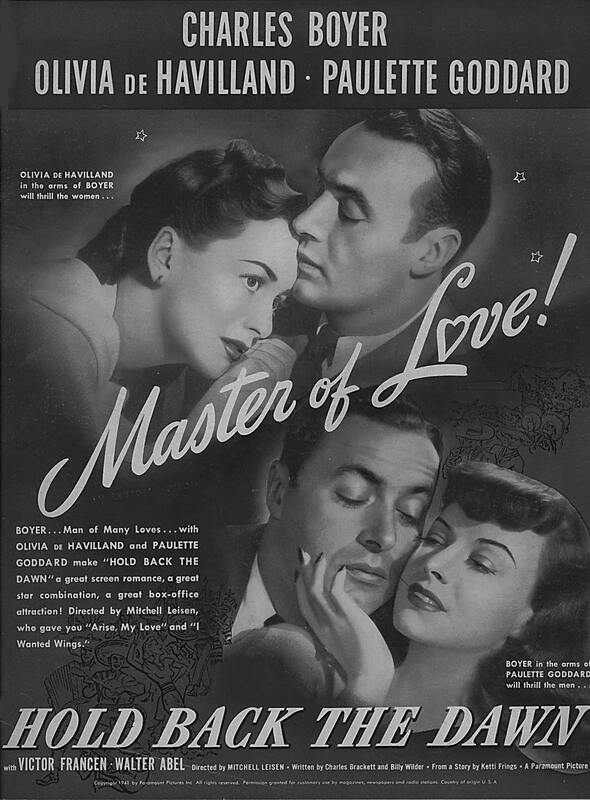 HOLD BACK THE DAWN (1941)
HOLD BACK THE DAWN (1941) (116 Min.) Genre: 1940 DRAMA, Transfer Quality: A
Hold Back the Dawn begins with a shabby immigrant (Charles Boyer) wandering onto a Paramount sound stage and telling his life story to director Mitchell Leisen (who actually directed this film). In flashback, we see that Boyer was once a conscienceless gigolo, desperate to flee Nazi-occupied Europe. He makes it to Mexico, where he pretends to fall in love with shy schoolteacher Olivia de Havilland. It is his plan to marry her, thus be able to enter the United States; then he intends to dump her and pursue the woman he really loves. Boyer's regeneration, and the price he pays for his previous callousness, brings Hold Back the Dawn to its tearful conclusion. — Hal Erickson
Starring: Charles Boyer, Olivia de Havilland, Paulette Goddard, Victor Francen | Directed by: Mitchell Leisen
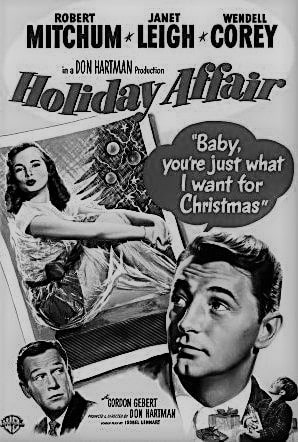 HOLIDAY AFFAIR (1949)
HOLIDAY AFFAIR (1949) (87 Min.) Genre: 1940 DRAMA, Transfer Quality: A
A disarming little trifle, Holiday Affair has in the years since its original release become a Yuletide perennial on television. War widow Janet Leigh hasn't the money to buy the model train that her son Gordon Gebert wants for Christmas. Robert Mitchum overhears the boy's plight, and offers to purchase the train for him, even though it will deplete his own money supply. This little gesture of kindness from Mitchum snowballs into a series of comic complications, thanks in part to the unwelcome intervention of Leigh's stuffed-shirt attorney boyfriend Wendell Corey. Harry Morgan shows up towards the end as a flustered night-court judge who helps tie some of the loose plot ends together. Based on a short story by John D. Weaver, A Holiday Affair didn't do too well at the box office, but its afterlife has been most satisfactory. — Hal Erickson
Starring: Robert Mitchum, Janet Leigh, Wendell Cory, Griff Barnett | Directed by: Don Hartman
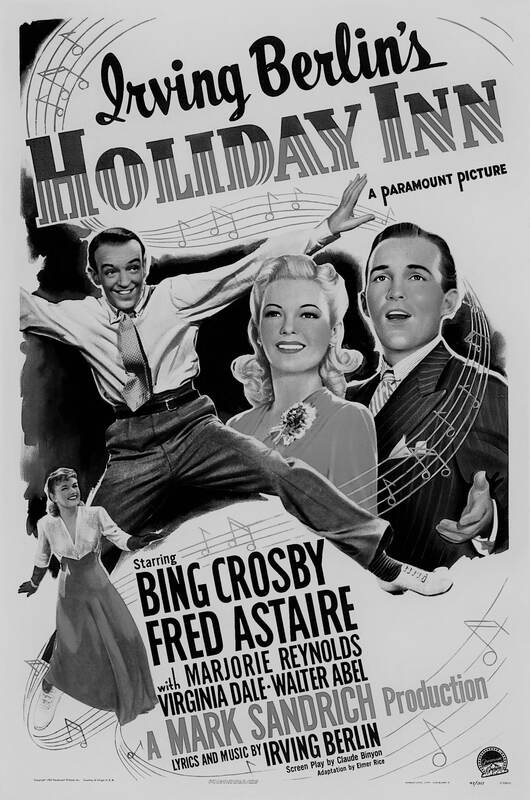 HOLIDAY INN (1942)
HOLIDAY INN (1942) (101 Min.) Genre: 1940 DRAMA, Transfer Quality: A
Bing Crosby and Fred Astaire star in Holiday Inn as a popular nightclub song-and-dance team. When his heart is broken by his girlfriend, Crosby decides to retire from the hustle-bustle of big city showbiz. He purchases a rustic New England farm and converts it to an inn, which he opens to the public (floor show and all) only on holidays. This barely logical plot device allows ample space for a steady flow of Irving Berlin holiday songs (including an incredible blackface number in honor of Lincoln's Birthday). Oddly enough, the most memorable song in the bunch, the Oscar-winning White Christmas, is not offered as a production number but as a simple ballad sung by Crosby to an audience of one: leading lady Marjorie Reynolds. Fred Astaire's best moment is his Fourth of July firecracker dance. Ah, but what about the plot? Well, it seems that Astaire wants to make a film about Crosby's inn, starring their mutual discovery Reynolds. Bing briefly loses Reynolds to Astaire, but wins her back during the filming of a musical number on a Hollywood soundstage (eleven years earlier, Bing enjoyed a final clinch with Marion Davies under surprisingly similar conditions in Going Hollywood). As with most of Irving Berlin's "portfolio" musicals of the 1940s, the song highlights of Holiday Inn are too numerous to mention. This delightful film is far superior to its unofficial 1954 remake, White Christmas. — Hal Erickson
Starring: Bing Crosby, Fred Astaire, Virginia Dale, Marjorie Reynolds | Directed by: Mark Sandrich
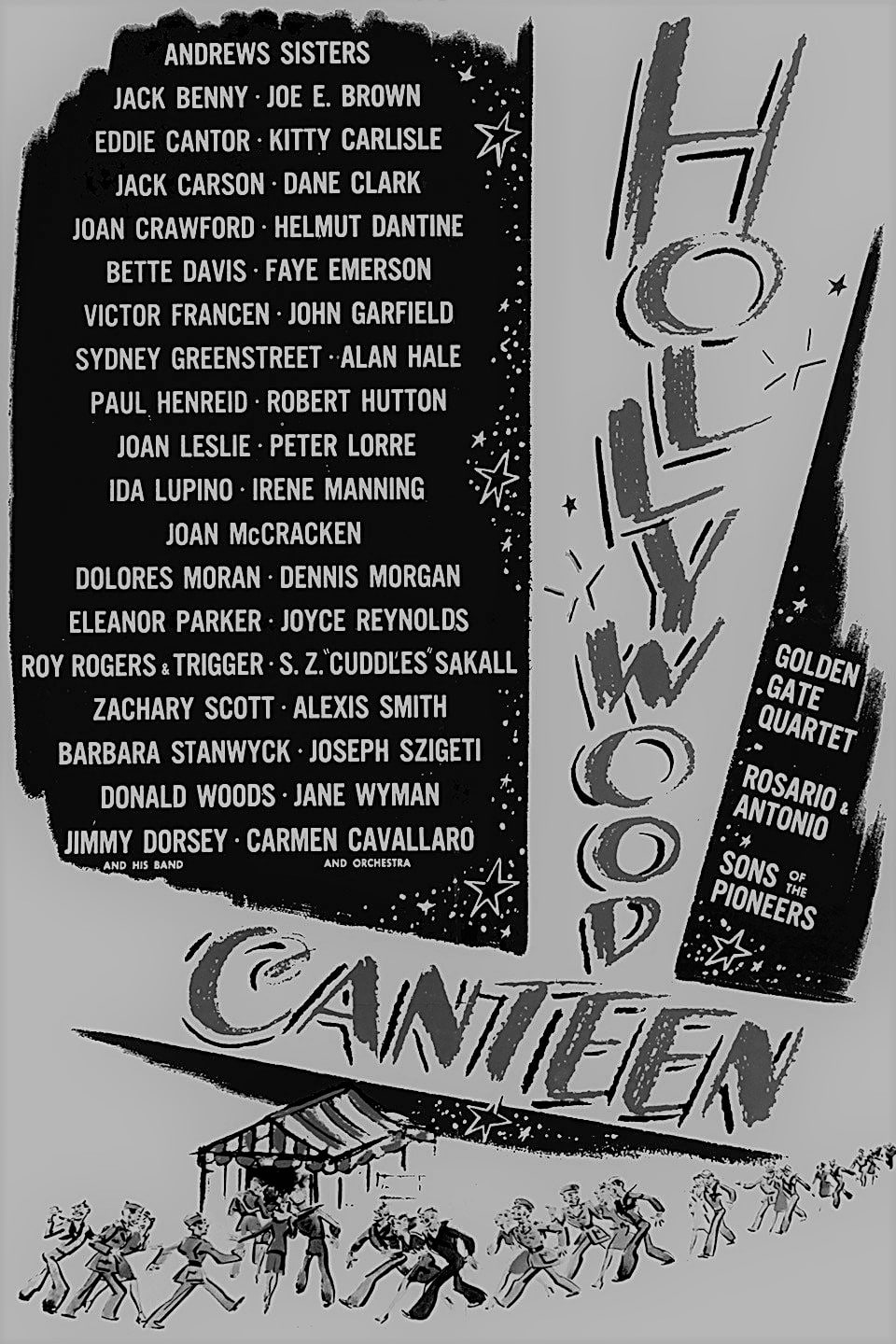 HOLLYWOOD CANTEEN (1944)
HOLLYWOOD CANTEEN (1944) (124 Min.) Genre: 1940 DRAMA, Transfer Quality: A
The West Coast's answer to Broadway's Stage Door Canteen, the Hollywood Canteen was created as a GI morale-booster by film stars Bette Davis and John Garfield. The Canteen was established so that Our Boys on leave in Tinseltown could have a good time with good food and good dancing — and, as a bonus, rub shoulders with their favorite movie personalities, who functioned as waiters, chefs, busboys and dancing partners. Since the 1944 all-star flick Hollywood Canteen was produced by Warner Bros., it was only to be expected that the celebrities seen herein would consist mostly of Warner Bros. contract players. The frail plot concerns a soldier on medical leave (played by Robert Hutton) who falls in love with lovely leading lady Joan Leslie (played by Joan Leslie) while visiting the Canteen. Bette Davis and John Garfield are on hand to emcee the Canteen's variety acts, and to act as cupids for the Hutton/Leslie romance. The "supporting cast" includes the likes of The Andrews Sisters, Jack Benny, Joe E. Brown, Eddie Cantor, Sidney Greenstreet, Paul Henreid, Peter Lorre, Ida Lupino, Dennis Morgan, Peter Lorre, Roy Rogers, S.Z. Sakall, Barbara Stanwyck, and the Jimmy Dorsey and Carmen Cavallaro musical aggregations. Virtually everyone involved donated their salaries to the Canteen fund—even Jack Benny. As with most of these patriotic wartime star rallies, the results are a mixed bag: the best sequences include Benny's violin "duel" with Joseph Szigeti and Roy Rogers and the Sons of the Pioneers introducing Cole Porter's Don't Fence Me In. Hollywood Canteen won three Oscar nominations, more for its good intentions than its inherent excellence. Still, don't pass up the opportunity when this "movie star salad" shows up on cable TV. — Hal Erickson
Starring: The Andrews Sisters, Jack Benny, Bette Davis, John Garfield, Sydney Greenstreet, Faye Emerson, Alexis Smith, Dane Clark, Ida Lupino | Directed by: Delmer Daves
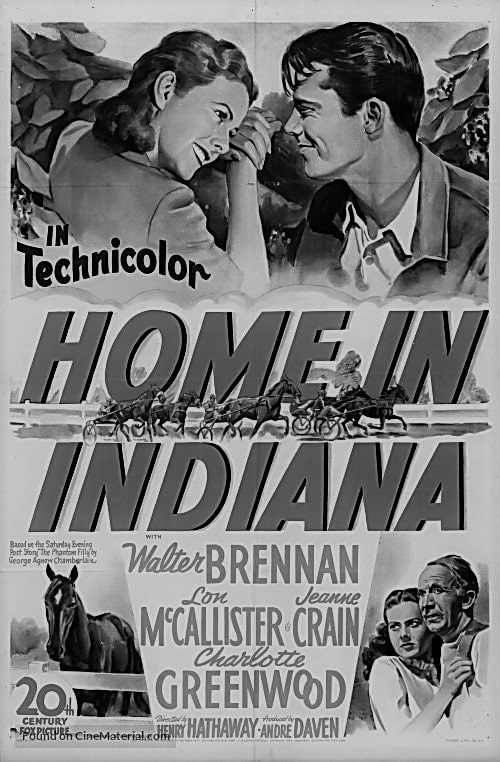 HOME IN INDIANA (1944)
HOME IN INDIANA (1944) (105 Min.) Genre: 1940 DRAMA, Transfer Quality: B
In this touching drama, city-slicker Sparke Thorton goes to live on his aunt and uncle's horse farm in the country. The couple have basically retired from horse-breeding and only have one trotter left. Sparks fly when the young man meets the lovely Char and Cri-Cri, the two farm girls who introduce him to the finer aspects of country life including the cool pleasures of the swimming hole. He soon decides that he wants to raise a filly and become a champion racer. His uncle and the handyman help him. Much of the film was shot on location on racetracks in Kentucky, Indiana, and Ohio. There is also a sequence depicting the filly's birth, but it is sensitively handled.
Starring: Walter Brennan, Lon McCallister, Jeanne Crain, June Haver | Directed by: Henry Hathaway
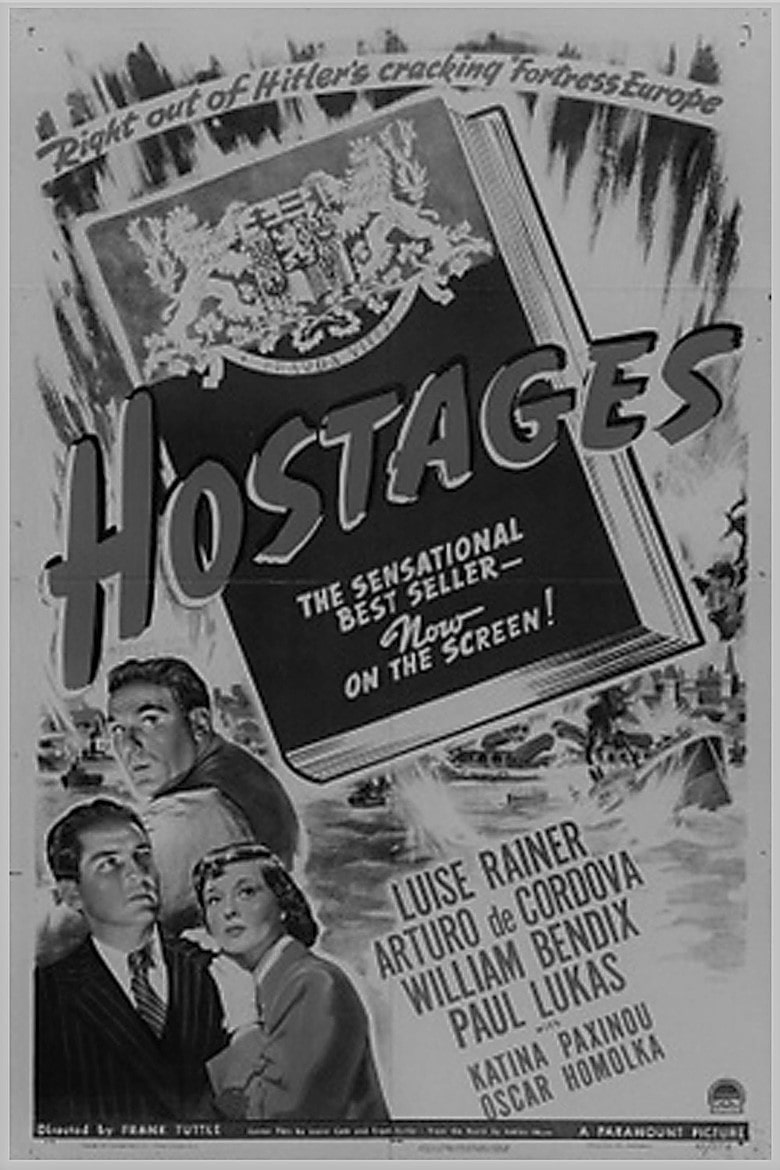 HOSTAGES (1943)
HOSTAGES (1943) (88 Min.) Genre: 1940 DRAMA, Transfer Quality: B
Luise Rainer's last Hollywood film was the economically produced wartime drama Hostages. Adapted from the novel by Stefan Heym, the story is set in a Nazi-occupied Czechoslovakian village. Rainer plays Milada, the daughter of collaborationist Lev Preissinger (Oscar Homolka). Totally apolitical herself, Milada is won over to the anti-Nazi cause by resistance leader Paul Breda (Arturo de Cordova). The drama intensifies when a Nazi officer commits suicide; the Gestapo, hoping to justify future outrages, claim that the officer was murdered, arresting 26 villagers as hostages. The ending could classify as tragic, but in 1943 it was considered inspirational. With so much plot and so many characters, poor Luise Rainer has very little to do; if the film has any real star, it is William Bendix, who is superb as a deceptively slow-witted resistance fighter.
Starring: Arturo de Cordova, Luise Rainer, William Bendix, Paul Lukas | Directed by: Frank Tuttle
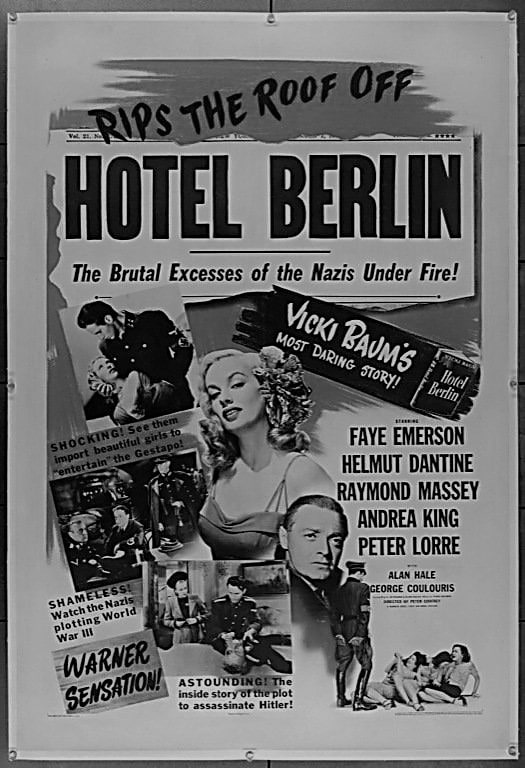 HOTEL BERLIN (1945)
HOTEL BERLIN (1945) (98 Min.) Genre: 1940 DRAMA, Transfer Quality: B
Vicki Baum, the author of the novel Grand Hotel, also wrote this similarly structured tale about a group of disparate characters brought together in a towering hotel in Germany as the nation teeters on the verge of collapse near the end of World War II. Martin Richter (Helmut Dantine), a member of Germany's anti-Nazi underground, has escaped from a prison camp and is now on the run from the Gestapo; he's hiding out at the Hotel Berlin, once a palace of luxury but now a shadow of it's former glory. Martin used to work with Johannes Koenig (Peter Lorre), once a renowned scientist before he was forced to use his gifts for his Nazi captors; he now lives under an assumed name and scrapes by as a waiter rather than support the Axis war machine. Arnim Von Dahnwitz (Raymond Massey) is a disgraced Nazi general on the outs with Gestapo leader Joachim Helm (George Coulouris), who has a lot on his mind — he's looking for Martin, he's riding herd over Arnim, and he has designs on Arnim's mistress, Lisa Dorn (Andrea King). Lisa, a stage actress of some success, is one of the few at the hotel who is able to live in some semblance of the glamour of Berlin's glory days; her wardrobe makes her the envy of Tillie Weiller (Faye Emerson), the hotel's concierge who pretends to be everyone's friend but is actually keeping tabs on the anti-Nazi activities of her tenants and is preparing to turn them in to the Gestapo. Hotel Berlin was completed in great haste, since midway through production it became obvious that Berlin would soon fall and the war in Europe would be over. Warner Bros. was so eager to get the film into theaters — before the war's end would make the film seem dated — that Hotel Berlin went through the studio's editing department in less than a week.
Starring: Helmut Dantine, Andrea King, Raymond Massey, Faye Emerson, Peter Lorre | Directed by: John Gage, Peter Godfrey
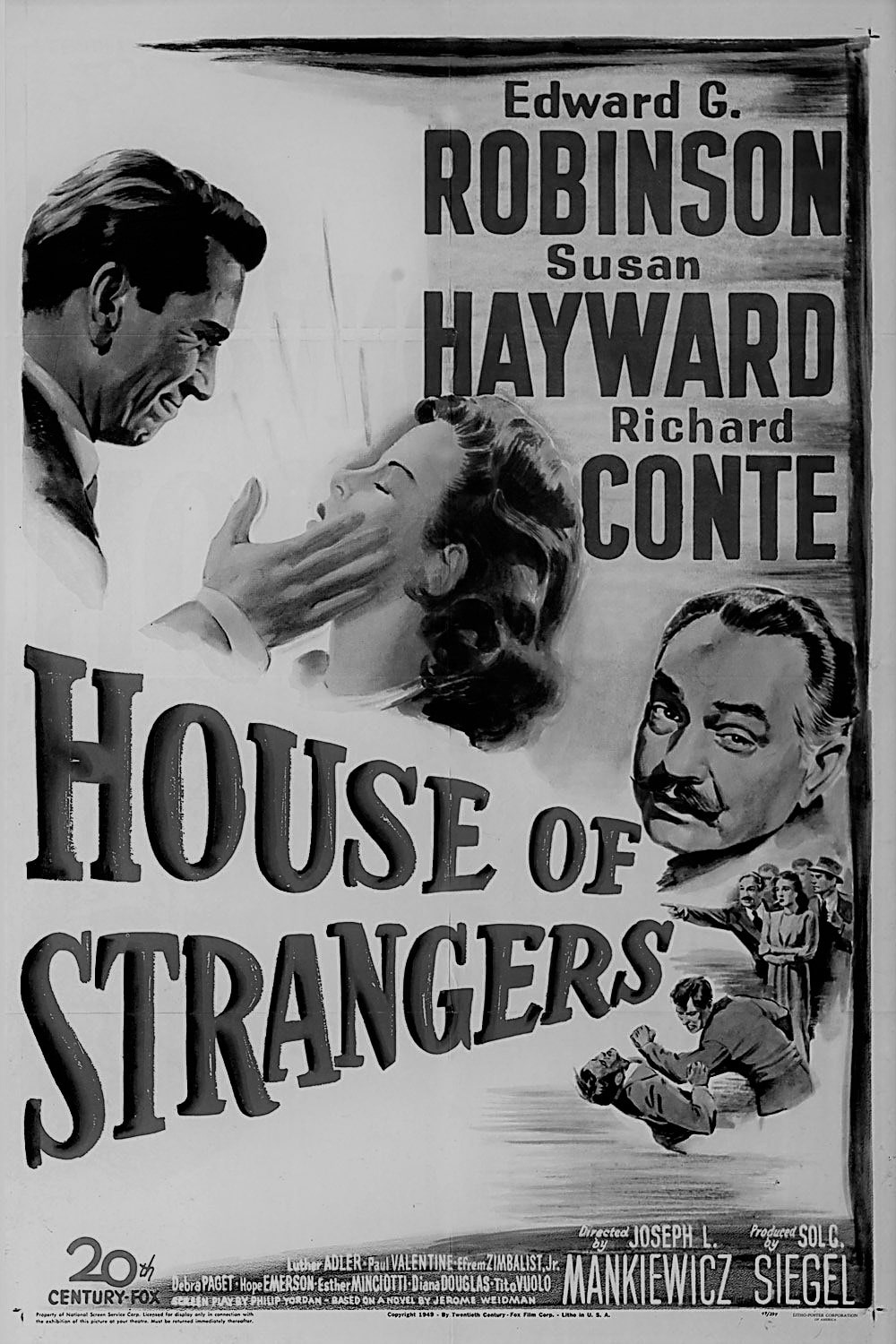 HOUSE OF STRANGERS (1949)
HOUSE OF STRANGERS (1949) (101 Min.) Genre: 1940 DRAMA, Transfer Quality: A
House of Strangers is the first of three film versions of Jerome Weidman's I'll Never Go Home Any More, each of which was scripted by Philip Yordan. Edward G. Robinson plays a Giannini-like Italian-American banker, Gino Monetti, who runs roughshod over his four grown sons. The ruthless Gino engages in several illegal activities to build up his business, and is arrested as a result. Though the sons have always been fully aware of their father's questionable business practices, they refuse to help him stay out of prison; led by oldest son Joe (Luther Adler), three of the sons take over the business and kick their father out. Only son Max (Richard Conte) remains loyal to his father, whereupon his three brothers conspire to have Max thrown into prison as well. Max promises the dying Gino that he'll exact vengeance on the treacherous sons; but when he is released, Max hasn't the stomach for revenge, not even after one of his brothers (Efrem Zimbalist Jr.) tries to kill him. Max leaves his brothers to stew in their own juices, and heads to California for a new life with his fiancée, Irene Bennett (Susan Hayward). Subsequent film versions of the Jerome Weidman novel included Broken Lance (1954) and The Big Circus (1961). — Hal Erickson
Starring: Edward G. Robinson, Susan Hayward, Richard Conte, Luther Adler | Directed by: Joseph L. Mankiewicz
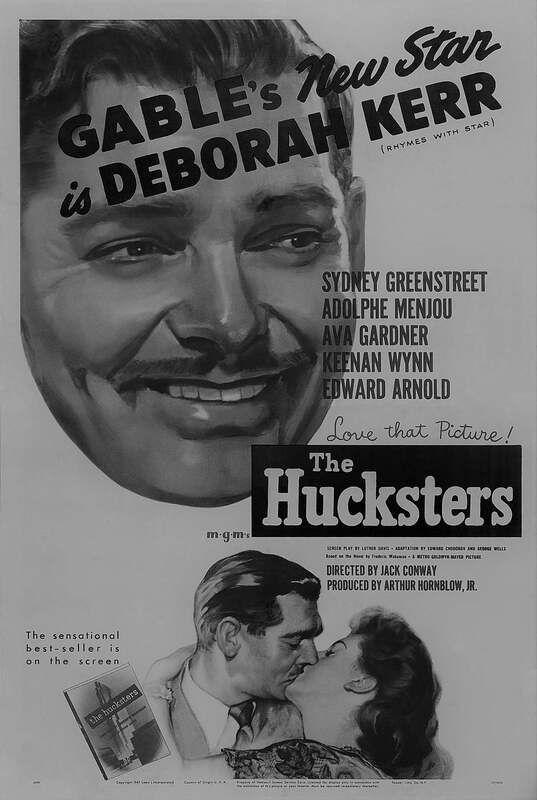 HUCKSTERS, THE (1947)
HUCKSTERS, THE (1947) (115 Min.) Genre: 1940 DRAMA, Transfer Quality: A
When he was first offered the film version of the best-selling Frederick Wakeman novel The Hucksters, Clark Gable turned it down, characterizing the book as "filthy and not entertainment." He finally agreed to star in the film after screenwriter Luther Davis' extensive laundering job. Gable plays Vic Norman, a radio advertising executive just returned from World War II. His wartime experiences have soured him on the phony aspects of his profession; nonetheless, he takes a job with the biggest and phoniest agency in town, headed by the glad-handing Kimberly (Adolphe Menjou). At Kimberly's recommendation, Vic takes over the Beautee Soap account, which brings him in close quarter's with Beautee's boorish head man Evans (Sidney Greenstreet). At their first meeting, Evans unexpectedly spits on his highly polished conference table. "Gentlemen," he growls, summing up his philosophy on advertising, "You have just seen me do a disgusting thing. But you will always remember it!" (Evans was based on George Washington Hill, the colorfully crude president of the American Tobacco Company). Vic's first assignment for Evans is to round up 25 high society women to sign testimonials for Beautee Soap. The least cooperative of the bunch is young widow Mrs. Dorrance (Deborah Kerr, in her American film debut), the stepdaughter of an American war hero. Attracted to Vic, Mrs. Dorrance signs the agreement, but breaks off her personal relationship with Vic when it appears as though he's making unsolicited advances towards her. The ever-demanding Evans then insists that Vic sign up two-bit comedian Buddy Hare (Keenan Wynn) for a radio program. Becoming more and more corrupt with each passing day, Vic obtains Hare's service at a rock-bottom price by blackmailing the comedian's agent (Edward Arnold), Vic's onetime close friend. A demo record is made of Hare and of nightclub singer Jean Ogilvie (Ava Gardner), who is in love with Vic but who eventually gives him up because of his apparent lack of scruples. Returning to the Beautee Soap headquarters, Vic watches dumbstruck as Evans smashes the demo record—then laughs uproariously, telling Vic that the contract is his, along with a $25,000 bonus. By this time, Vic is so disgusted with himself and with Evans' childish baiting tactics that he tells off the soap mogul in no uncertain terms, ending his tirade by dousing Evans with a pitcher of water. Having regained his integrity, Vic is now worthy of the love of Mrs. Dorrance, who has forgiven him his earlier misdeeds. As the film ends, she encourages Vic to use his advertising talents for something clean and honest (and, undoubtedly, starve to death in the process!) To mollify Madison Avenue, screenwriter Davis narrowed the attack on advertisers to one single radio sponsor; to please Gable, Mrs. Dorrance was changed from a still-married woman to a widow, while Vic Rodman is transformed from a "huckster" to an idealist who Does the Right Thing at the end. The Hucksters is one of Clark Gable's best postwar films, as well as one of the finest Hollywood satires of the rarefied world of advertising. — Hal Erickson
Starring: Edward Arnold, Clark Gable, Deborah Kerr, Sydney Greenstreet, Anne Nagel | Directed by: Jack Conway
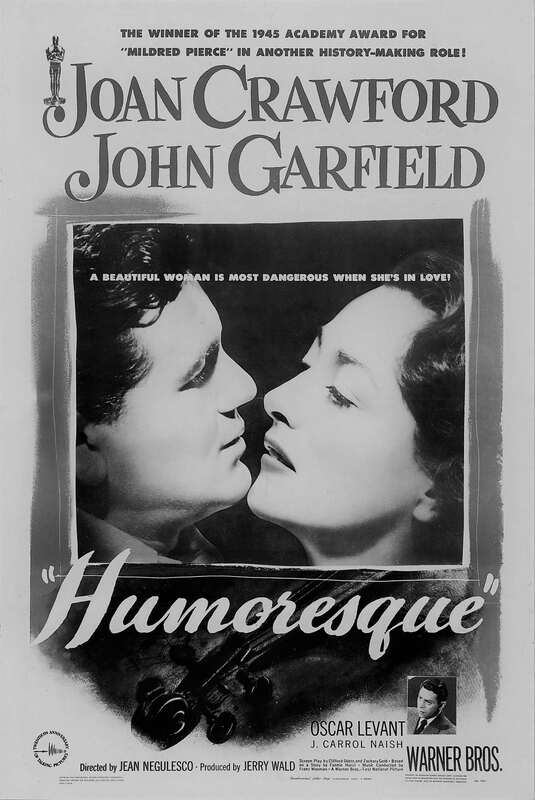 HUMORESQUE (1946)
HUMORESQUE (1946) (125 Min.) Genre: 1940 DRAMA, Transfer Quality: A
Fannie Hurst's novel Humoresque is the lachrymose tale of a famed Jewish-American violinist who forgets all about his friends and family in his rise to fame. Screenwriters Clifford Odets and Zachary Gold refashioned this timeworn material into a first-class, big-budget soap opera, completely dominated by the high-octane talents of Joan Crawford and John Garfield. A gifted musician, Garfield rises from the slums to the upper echelons of society, thanks to the patronage of wealthy, alcoholic Crawford. Virtually ignored by her husband Paul Cavanaugh, Crawford adopts Garfield as her lover as well as her protégé. He is only mildly offended by the setup; she, on the other hand, becomes jealous and possessive. It is not a woman who comes between Crawford and Garfield: it the intensity of his talent, not to mention the spectre of the great composers whose works he interprets so brilliantly. Garfield's virago of a mother (Ruth Nelson) feeds upon Crawford's jealousy, planting the seeds of guilt for (allegedly) holding her son back. Finally, Crawford is driven to suicide; in a brilliantly directed and photographed sequence, she walks into the ocean, as Garfield is heard over the radio, playing "Liebstod" from Wagner's Tristan und Isolde with full orchestral accompaniment. The ultrastylish suffering of Joan Crawford and the street-punk insouciance of John Garfield (who looks like a "Dead End Kid" even while wearing a tux) is counterpointed by the phlegmatic comedy relief of Oscar Levant. Together with Mildred Pierce, Humoresque is the best of the Warner Bros. Joan Crawford vehicles. — Hal Erickson
Starring: Joan Crawford, John Garfield, Oscar Levant, John Abbott, J. Carrol Naish | Directed by: Jean Negulesco
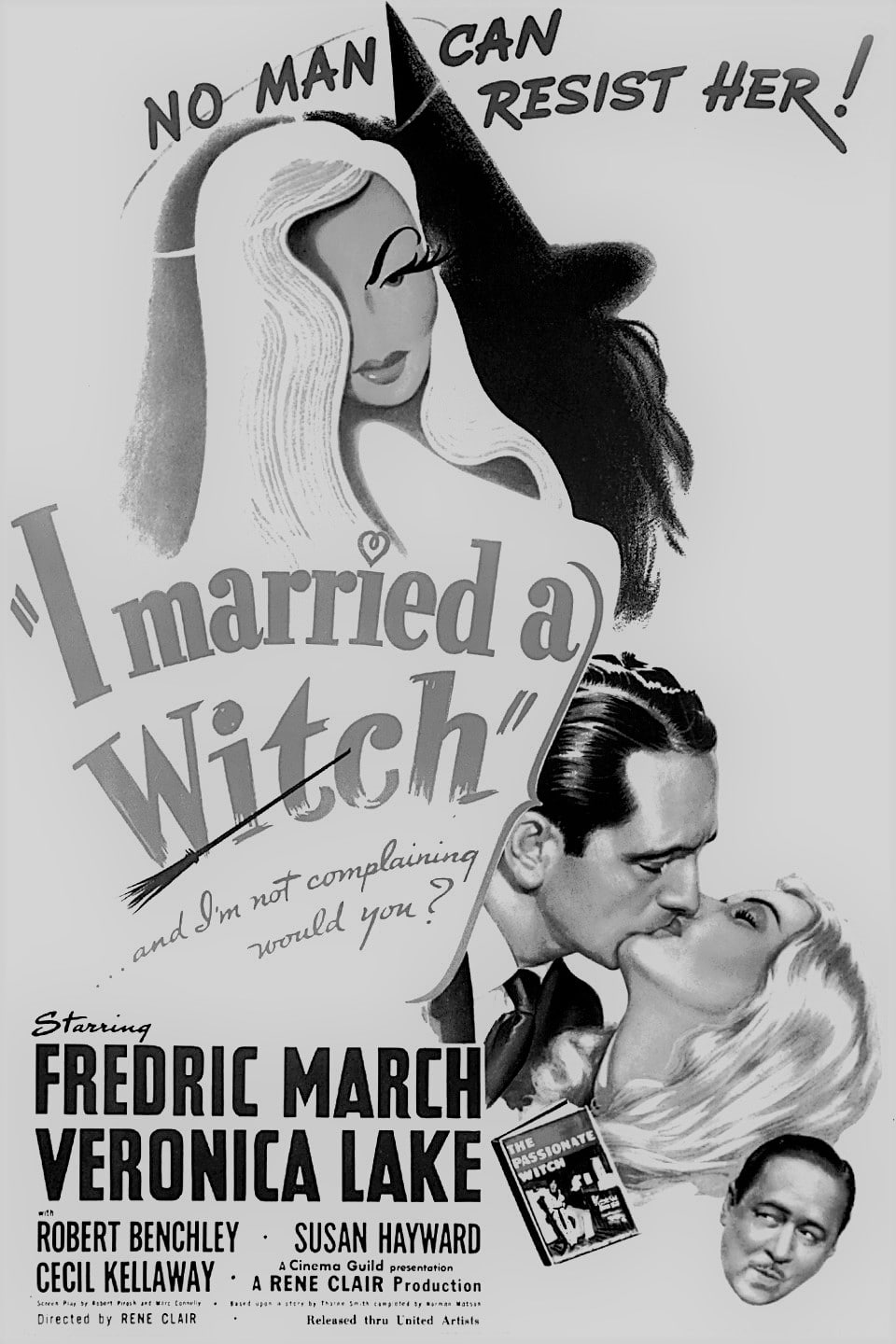 I MARRIED A WITCH (1942)
I MARRIED A WITCH (1942) (76 Min.) Genre: 1940 DRAMA, Transfer Quality: A
As she burns at the stake, 17th-century witch Veronica Lake places a curse on her accuser, Fredric March: from this day forward, all of March's descendants will be unhappy in marriage. After several hilarious through-the-years examples (the Civil War-era Fredric March runs off to battle rather than endure his wife's nagging), we are brought up to 1942. This year's edition of Fredric March is a gubernatorial candidate, preparing to wed snooty socialite Susan Hayward. A bolt of lightning strikes the tree where Veronica Lake had been barbecued three centuries earlier, thereby freeing the spirits of Lake and her warlock father Cecil Kellaway. March meets Lake when she materializes in a burning building, obliging him to save her life. The revivified sorceress does everything in her power to force March to fall in love with her, so that she can make his life miserable. Gradually, Lake falls in love with March, which rouses the ire of her ever-besotted uncle. Lake imprisons her uncle in a bottle, genie-style, then proceeds to try to win March's affections by arranging for him to win his election. Alas, this exposes March to accusations of fraud, and this, coupled with Kellaway's escape, threatens to send Lake back to oblivion. But at the last moment, March declares his love for Lake, which turns her into a mortal, albeit a very happy one. Still, when Lake and March have a daughter, the girl seems fascinated with the prospect of riding a broom....Based on the Thorne Smith novel The Passionate Witch, the rollicking I Married a Witch can be considered the forerunner of the TV series Bewitched, but only on a surface level. The film had been scheduled to be directed by Preston Sturges and to be released by its producing studio, Paramount; the end result was helmed by Rene Clair (his second Hollywood film), and was distributed by United Artists. — Hal Erickson
Starring: Fredric March, Veronica Lake, Robert Benchley, Susan Hayward | Directed by: Rene Clair
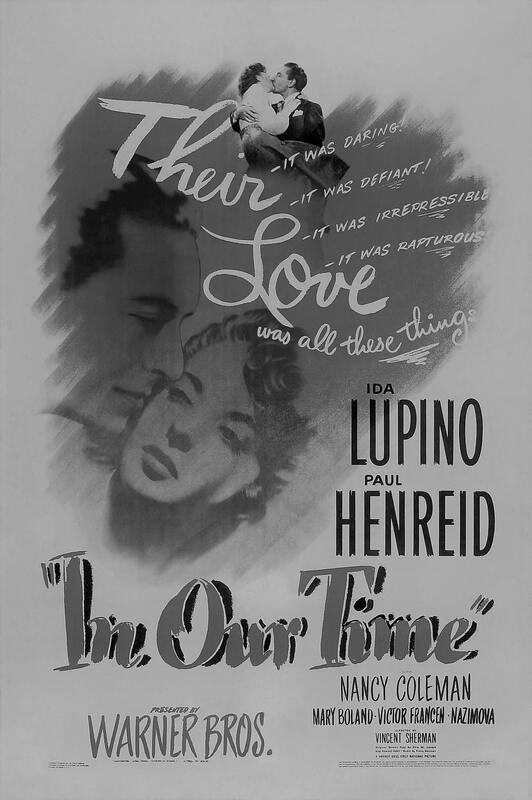 IN OUR TIME (1944)
IN OUR TIME (1944) (110 Min.) Genre: 1940 DRAMA, Transfer Quality: A
More a romantic melodrama than the uplifting propaganda piece the producers perhaps envisioned, In Our Time stars Ida Lupino as Jennifer Whittredge, a young antique buyer marrying a Polish count, Stephan Orvid (Paul Henried), after a whirlwind romance in a Warsaw at the brink of World War II. The count's old-fashioned family in general and his aristocratic uncle (Victor Francen) in particular resist the union, but Jennifer brings a breath of fresh air and a sense of good Anglo-Saxon values into the stagnant rooms of the Orvid estate and soon the farm is prosperous once again. When the German military might finally enters Poland, Jennifer and Stephan join the country's scorched earth defense by burning both their property and are soon among the refugees waiting for the day when Poland is once again free from Fascism.
Starring: Ida Lupino, Paul Henreid, Nancy Coleman, Mary Boland, Victor Francen | Directed by: Vincent Sherman
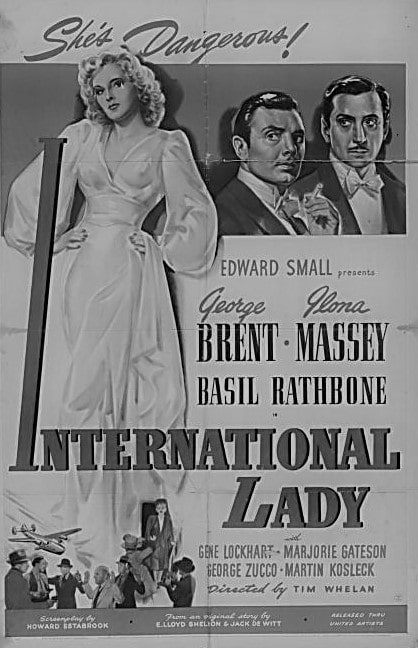 INTERNATIONAL LADY (1941)
INTERNATIONAL LADY (1941) (102 Min.) Genre: 1940 DRAMA, Transfer Quality: B
Hungarian actress Ilona Massey stars as an operative for the Axis in this slightly tongue-in-cheek wartime melodrama. She spends her working hours signalling secret messages to enemy U-boats. George Brent is the U.S. counterspy sent to track down the security leak. Brent's job is made doubly delicate when he falls in love with the seductive Massey. It is said that Ilona Massey never mastered the English language, and had to learn her lines phonetically; if true, why does she handle the funnier lines in International Lady so well?
Starring: George Brent, Ilona Massey, Basil Rathbone, Gene Lockhart, George Zucco | Directed by: Tim Whelan
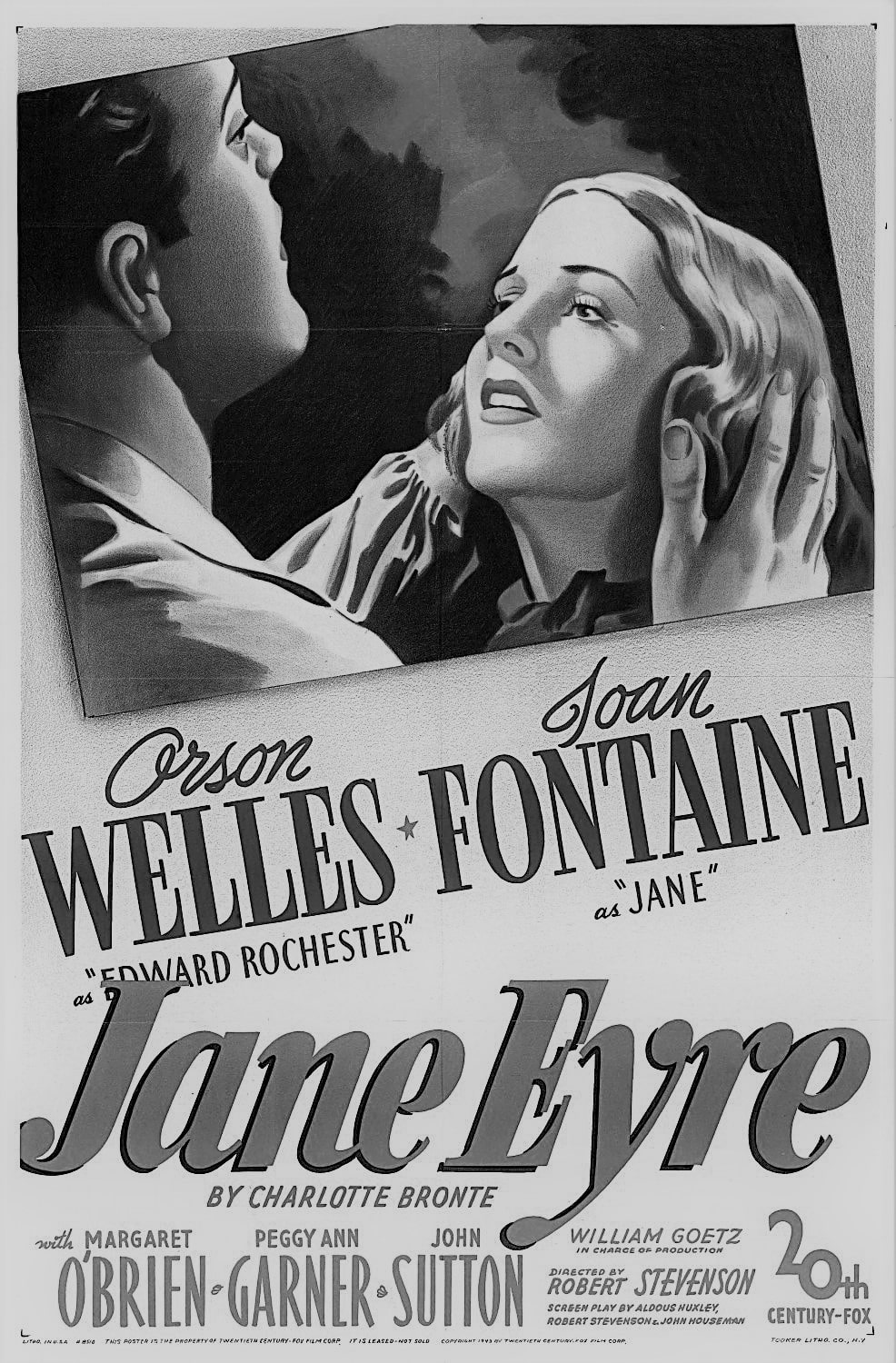 JANE EYRE (1944)
JANE EYRE (1944) (97 Min.) Genre: 1940 DRAMA, Transfer Quality: A
Director Robert Stevenson collaborated with novelist Aldous Huxley and theatrical-producer John Houseman on the screenplay for this 1944 adaptation of Charlotte Bronte's gothic romance Jane Eyre. After several harrowing years in an orphanage, where she was placed by a supercilious relative for exhibiting the forbidden trait of "willfulness," Jane Eyre (Joan Fontaine) secures work as a governess. Her little charge, French-accented Adele (Margaret O'Brien), is pleasant enough. But Jane's employer, the brooding, tormented Edward Rochester (Orson Welles), terrifies the prim young governess. Under Jane's gentle influence, Rochester drops his forbidding veneer, going so far as to propose marriage to Jane. But they are forbidden connubial happiness when it is revealed that Rochester is still married to a gibbering lunatic whom he is forced to keep locked in his attic. Rochester reluctantly sends Jane away, but she returns, only to find that the insane wife has burned down the mansion and rendered Rochester sightless. In the tradition of Victorian romances, this purges Rochester of any previous sins, making him a worthy mate for the loving Jane. The presence of Orson Welles in the cast (he receives top billing), coupled with the dark, Germanic style of the direction and photography, has led some impressionable cineasts to conclude that Welles, and not Stevenson, was the director. To be sure, Welles contributed ideas throughout the filming; also, the script was heavily influenced by the Mercury Theater on the Air radio version of Jane Eyre, on which Welles, John Houseman and musical director Bernard Herrmann all collaborated. But Jane Eyre was made at 20th Century-Fox, a studio disinclined to promote the auteur theory; like most Fox productions, this is a work by committee rather than the product of one man. This in no way detracts from the overall excellence of the film; of all adaptations of Jane Eyre (it had previously been filmed in 1913, 1915 and 1921, and has been remade several times since), this 1943 version is one of the bestt. Keep an eye out for an uncredited Elizabeth Taylor as the consumptive orphanage friend of young Jane Eyre (played as child by Peggy Ann Gardner). — Hal Erickson
Starring: Orson Wells, Joan Fontaine, Margaret O'Brien, John Sutton | Directed by: Robert Stevenson
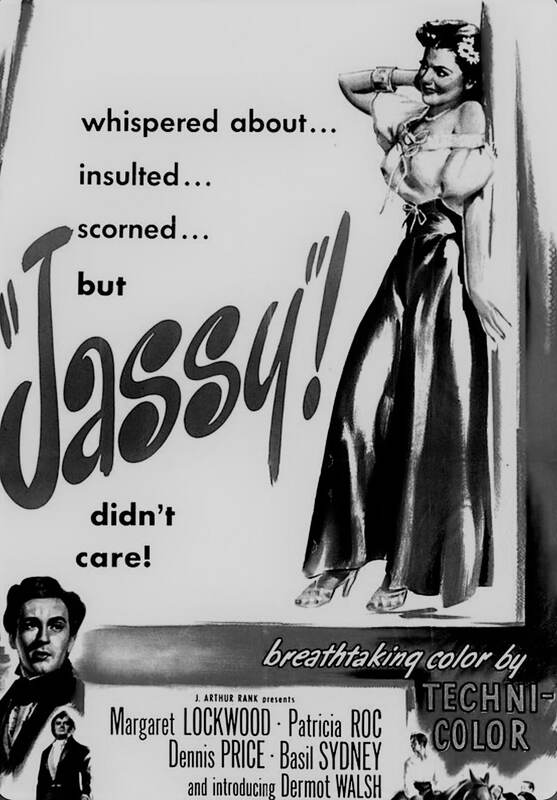 JASSY (1948)
JASSY (1948) (96 Min.) Genre: 1940 DRAMA, Transfer Quality: A
Low-hanging clouds and low-cut blouses dominate the brooding British melodrama Jassy. Margaret Lockwood is at her teeth-baring best as a tempestuous gypsy girl who is hired as a servant in an aristocratic 19th century household. Dennis Price is her handsome master, with whom she falls in love. They marry, and it comes to pass that the master comes to a violent end. The girl is accused of murder, but appearances are deceiving. An early arrival to American TV, Jassy received a new lease on life in the 1960s by virtue of its lush Technicolor photography. The film was based on a popular bodice-ripping novel by Norah Lofts.
Starring: Margaret Lockwood, Patricia Roc, Basil Sydney, Dermot Walsh | Directed by: Bernard Knowles
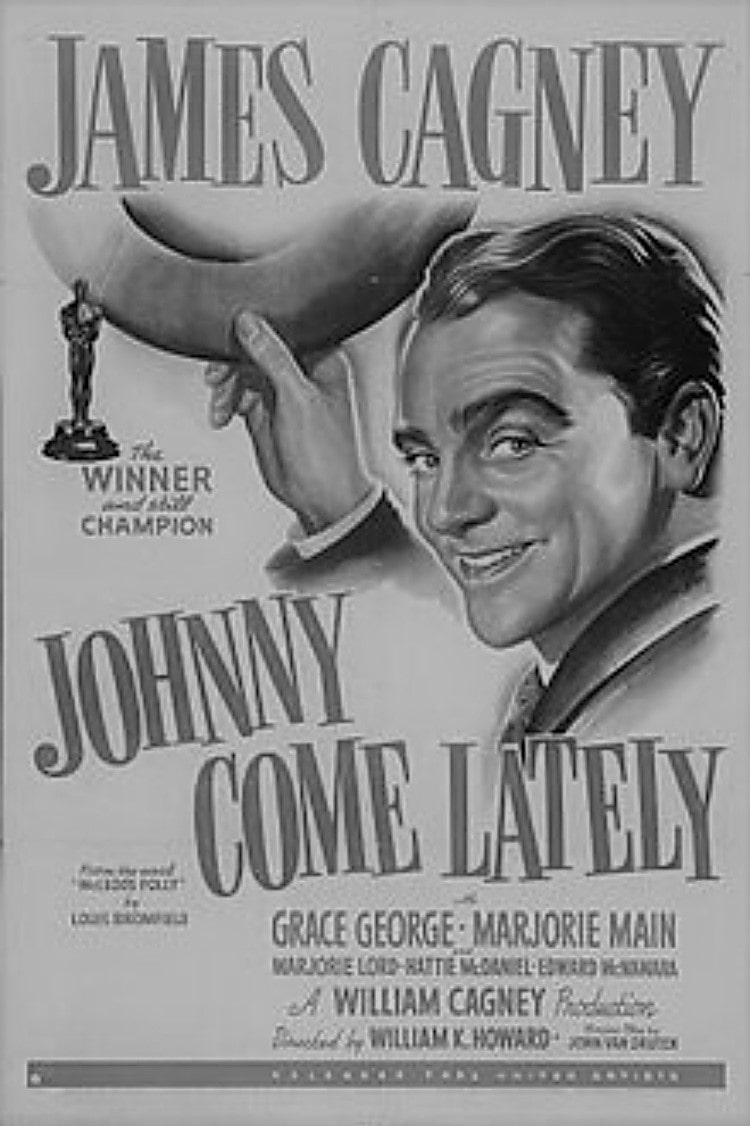 JOHNNY COME LATELY (1943)
JOHNNY COME LATELY (1943) (97 Min.) Genre: 1940 DRAMA, Transfer Quality: B
For his first independently-produced starring effort, James Cagney chose the sentimental drama Johnny Come Lately. Cagney plays itinerant newspaperman Tom Richards, who wanders into a small corruption-ridden town. Striking up a friendship with elderly Vinnie McLeod (Grace George in her only movie appearance), the editor of the local newspaper, Tom tries to help Vinnie exposed the community's crooked politicians. He is thwarted in his efforts until Gashouse Mary (Marjorie Main), a wealthy dowager with a shady past, exposes the machinations behind a phony Orphan's Fund. At the insistence of star Cagney, the cast of Johnny Come Lately was filled with familiar character actors (Hattie McDaniel, Edward McNamara, George Cleveland, Margaret Hamilton, Lucien Littlefield) who are herein offered a lot more screen time than was customary. Based on the Louis Bromfield novel McLeod's Folly, Johnny Come Lately was produced by Cagney's brother William; the film garnered an Oscar nomination for Leigh Harline's nostalgic musical score.
Starring: James Cagney, Grace George, Marjorie Main, Hattie McDaniel | Directed by: William Howard
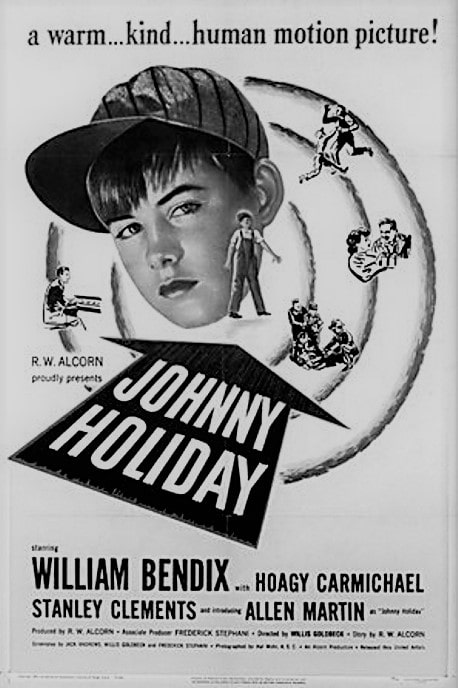 JOHNNY HOLIDAY (1949)
JOHNNY HOLIDAY (1949) (92 Min.) Genre: 1940 DRAMA, Transfer Quality: B
This drama tells about a juvenile delinquent that wavers between loyalty to a fellow crook and a kind-hearted reform school guard.
Starring: William Bendix, Allen Martin, Jr., Stanley Clements, Jack Hagen | Directed by: Willis Goldbeck
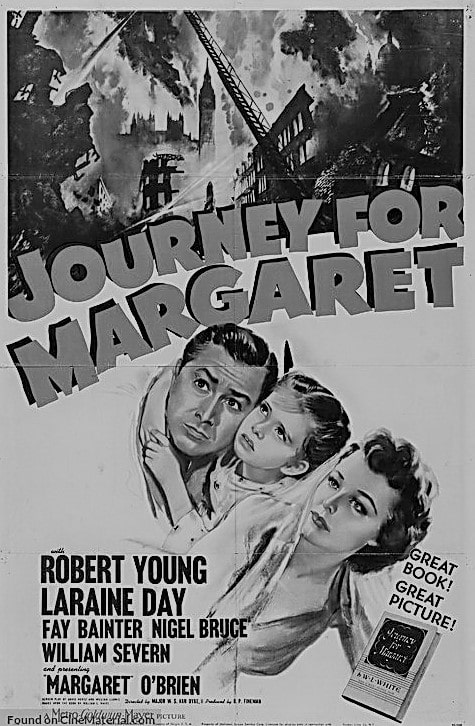 JOURNEY FOR MARGARET (1942)
JOURNEY FOR MARGARET (1942) (81 Min.) Genre: 1940 DRAMA, Transfer Quality: A
This wartime weeper could just as well have been titled Stardom for Margaret, inasmuch as it solidified the popularity of that remarkable child actress Margaret O'Brien. While visiting London, American married couple Robert Young and Laraine Day are caught in the middle of the 1940 blitz. Losing her unborn child during the bombing, Day sadly heads back to the U.S., while her journalist husband stays behind to cover late-breaking events. Young makes the acquaintance of O'Brien and Clifford Severn, children orphaned by the blitz. After pulling the shell-shocked O'Brien out of her near-catatonic state, Young decides to adopt both children and take them back to his wife in the States. There are some tense moments as Young tilts at the stepped-up immigration restrictions, but he is finally able to bring his new family home. Journey for Margaret stars Robert Young and Margaret O'Brien would be reunited two decades later on an episode of Young's TV series Marcus Welby MD, in which Ms. O'Brien played a patient suffering from obesity. — Hal Erickson
Starring: Margaret O'Brien, Robert Young, Laraine Day, Fay Bainter | Directed by: W.S. Van Dyke
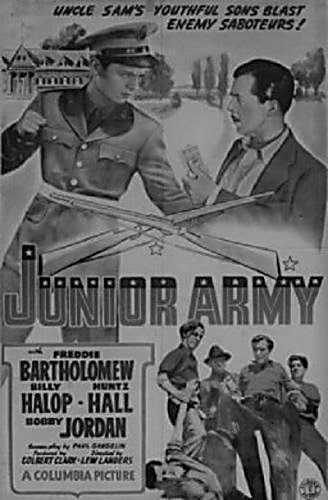 JUNIOR ARMY (1943)
JUNIOR ARMY (1943) (70 Min.) Genre: 1940 DRAMA, Transfer Quality: B
Several veterans of the "Dead End Kids" series are prominently featured in the Columbia programmer Junior Army. Grown-up child star Freddie Bartholomew acquits himself nicely as Freddy Hewlitt, newly arrived at a strict military academy. Freddy tries to set a good example for hell-raising cadet Jimmy Fletcher (Billy Halop), but Jimmy soons alienates everyone around him-even his old pals Cowboy (Bobby Jordan) and Bushy (Huntz Hall). Eventually, however, Jimmy comes through with flying colors when he helps Freddy and his buddies smash a gang of saboteurs. While Billy Halop, Bobby Jordan and Huntz Hall would continue appearing in films well into the next decade, Freddy Bartholomew eventually abandoned acting to become a successful advertising executive.
Starring: Freddie Bartholomew, Billy Halop, Bobby Jordan, Huntz Hall | Directed by: Lew Landers
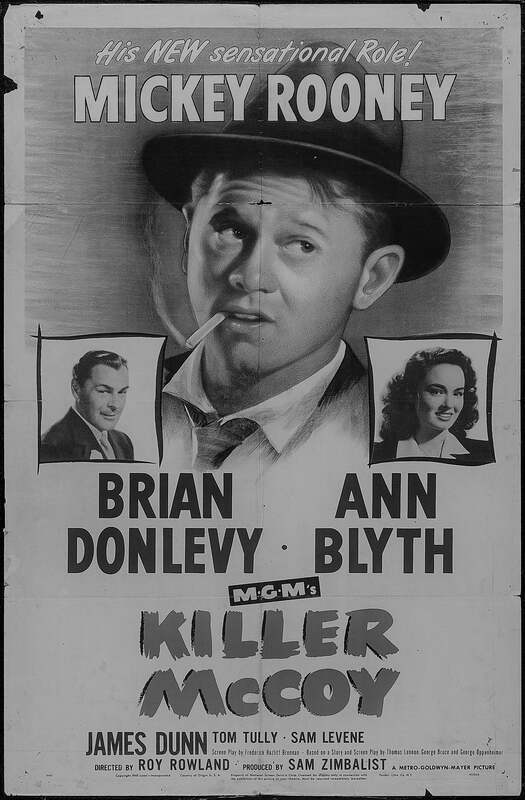 KILLER MCCOY (1947)
KILLER MCCOY (1947) (104 Min.) Genre: 1940 DRAMA, Transfer Quality: A
In one of his first "adult" roles (he made his last Andy Hardy vehicle only a year earlier), Mickey Rooney plays Tommy McCoy, a dancer who performs in a going-nowhere nightclub act with his alcoholic father, Brian (James Dunn). Johnny Martin (Mickey Knox), a lightweight boxing champ who is headlining the show that Tommy and his Dad are currently working, admires Tommy's footwork and tells him that he might have a future in the ring. Tommy gives the fight game a try, and he soon proves he's got the goods as a slugger. Before long, Tommy is fighting Johnny for the lightweight title, and after a hard-fought match, Tommy wins — and Johnny dies. Now dubbed "Killer" McCoy by the press and boxing fans, a distraught Tommy allows his career to be taken over by Jim Caighn (Brian Donlevy), an unscrupulous manager with a gambling problem. Jim drags Tommy through the dirtiest and most dishonest levels of the fight game, but Jim's daughter Sheila (Ann Blyth) sees Tommy's decent side and tries to rescue him. Killer McCoy was a remake of the 1938 Robert Taylor vehicle The Crowd Roars. — Mark Deming
Starring: Mickey Rooney, Brian Donlevy, Ann Blyth, James Dunn | Directed by: Roy Rowland
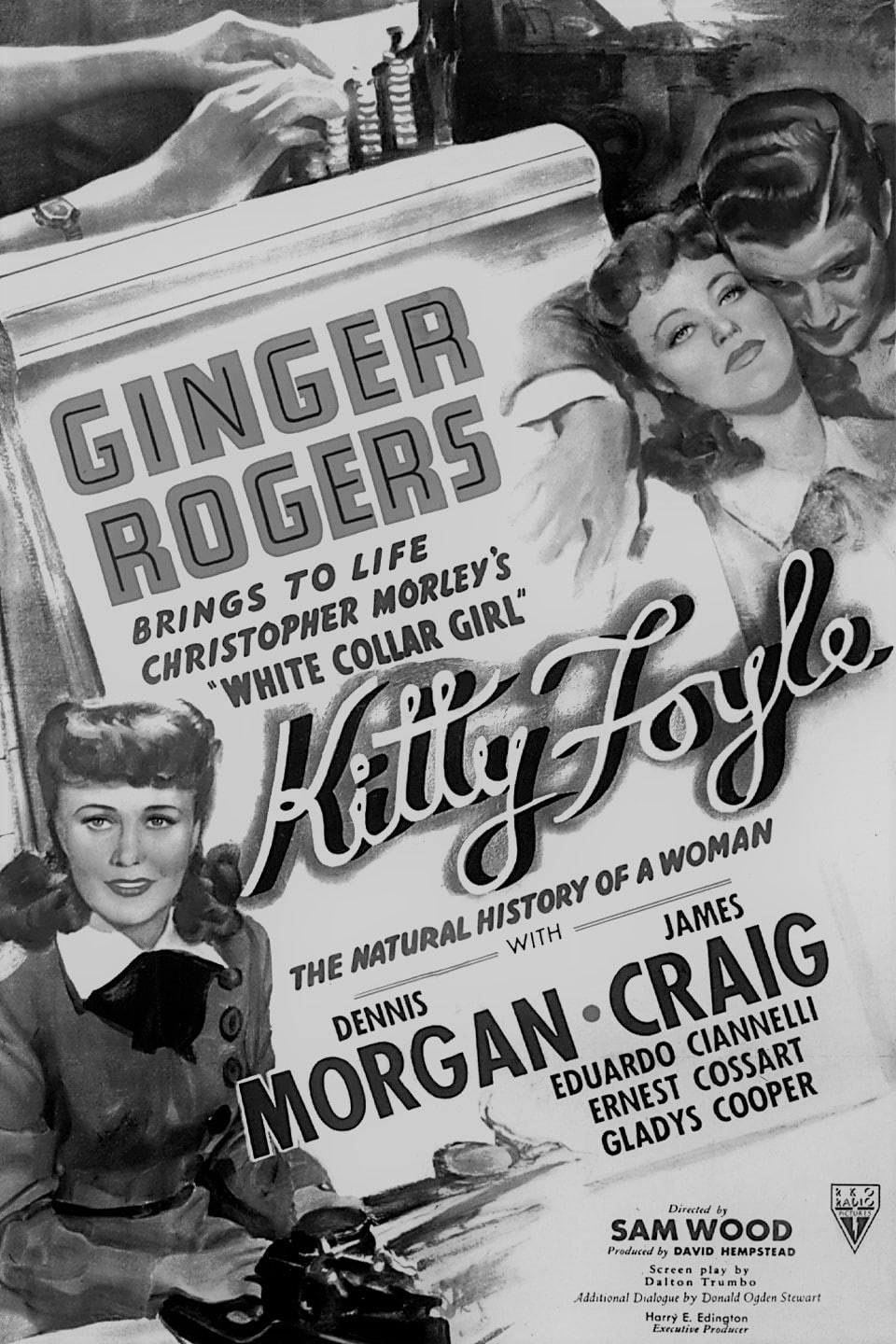 KITTY FOYLE (1940)
KITTY FOYLE (1940) (107 Min.) Genre: 1940 DRAMA, Transfer Quality: A
Though Ginger Rogers' starring vehicles always turned a profit for RKO Radio, many filmgoers thought of Rogers only in terms of "Fred Astaire's partner." Others considered her a delightful comedienne, but no great shakes as a dramatic actress. Thus it was both a personal and professional triumph when Ms. Rogers walked home with an Oscar for her performance in Kitty Foyle. Based on Christopher Morley's Story of an American Girl, the film, told in flashback, relates the progress of working-girl Kitty Foyle (Ginger Rogers) as she pursues her Cinderella dreams. While employed at a department store, Kitty is wooed by Dennis Morgan, scion of a wealthy Philadelphia family. She flirts with the notion of marrying Morgan for his money, but decides that he's a bit too weak-willed for her tastes. Kitty enters into a romance with poor-but-dedicated doctor James Craig, then does an about-face by accepting Morgan's proposal. She quickly runs afoul of Morgan's snobbish family, who are so tightly bound by centuries-old tradition that Kitty is moved to exclaim "You mean to say you let all those dead people tell you what do?" She walks out on Morgan, then discovers that she's pregnant. Even after the trauma of delivering a stillborn child, Kitty is too proud to go back to Morgan. When true-blue Craig comes back into her life, Kitty, repeating her favorite phrase "By Judas Priest!", decides to forego money for love. Though successful to the tune of an $860,000 profit in 1940, Kitty Foyle seems stilted and over-rehearsed when seen today, save for the refreshing spontaneity of Ginger Rogers' performance. The film's best scene is the opening montage of the American Woman's "progress" once she enters the workplace (an uncredited Heather Angel is the central character in this delightful pantomimic vignette). Featured in the cast of Kitty Foyle is director Sam Wood's daughter Katherine Stevens, better known as K.T. Stevens. — Hal Erickson
Starring: Ginger Rogers, Dennis Morgan, James Craig, Eduardo Ciannelli | Directed by: Sam Wood
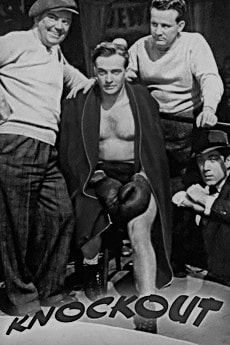 KNOCKOUT (1941)
KNOCKOUT (1941) (73 Min.) Genre: 1940 DRAMA, Transfer Quality: B
In this boxing drama, champion fighter Johnny Rocket decides to leave the ring to please his new bride. Unfortunately, his greedy manager, unwilling to get off the gravy train engineers things so that the fighter cannot find work and must return to the squared circle to make a living. His ploy works, and the fighter resumes his career. He also begins falling in love with a sexy female sports writer. This causes his marriage to disintegrate. The avaricious manager decides to make a lot of money fast and so sets his fighter up to take a dive and betting against him. The doped up fighter loses the fight. He also loses the sportswriter. Fortunately his true love is around to pick him up and help him start anew.
Starring: Arthur Kennedy, Olympe Bradna, Virginia Field, Anthony Quinn | Directed by:
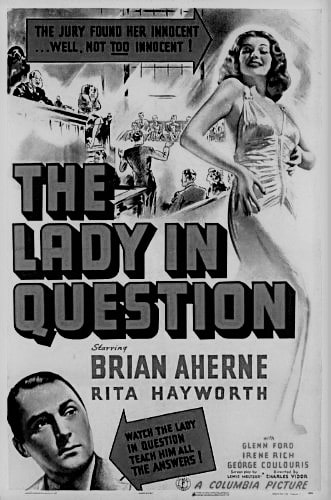 LADY IN QUESTION, THE (1940)
LADY IN QUESTION, THE (1940) (81 Min.) Genre: 1940 DRAMA, Transfer Quality: B
Columbia's The Lady in Question is a remake of the French Gribouille, a Raimu vehicle from 1939. Brian Aherne plays Andre Morestan, the seeming contently paterfamilias of a bourgeois Parisian family. Summoned for jury duty, Morestan at first believes that accused murderess Natalie Rougin (Rita Hayworth) is guilty, but eventually takes pity on the homeless girl and invites her to live with his family after her acquittal. Things get pretty dicey when Morestan's impressionable young son Pierre (Glenn Ford) falls in love with the enigmatic Natalie and begins committing petty crimes to finance their elopement-leading to a situation not unlike the one that got the girl arrested in the first place! In the original Gribouille, it was abundantly clear that both father and son had a yen for their pretty guest, but this menage a trois has been toned down in the Hollywood version, with Morestan remaining more or less faithful to his long-suffering wife Michelle (Irene Rich).
Starring: Glenn Ford, Rita Hayworth, Brian Aherne, George Coulouris, Evelyn Keyes | Directed by: Charles Vidor
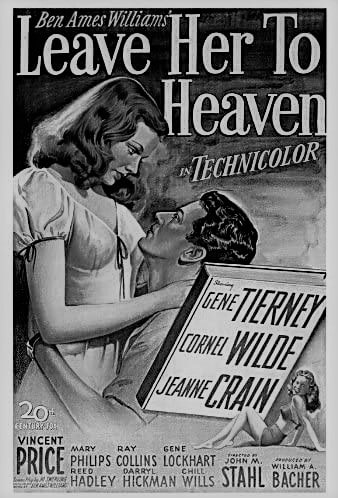 LEAVE HER TO HEAVEN (1945)
LEAVE HER TO HEAVEN (1945) (111 Min.) Genre: 1940 DRAMA, Transfer Quality: A
Gene Tierney portrays a beautiful but unstable woman who marries successful novelist Cornel Wilde. Tierney wants to spend all her time with her new husband, but finds it impossible to do so thanks to his work and the frequent visits of family and friends. When Wilde's crippled younger brother (Darryl Hickman) comes to the couple's summer house to stay, Ms. Tierney indirectly causes the boy to drown. Later, upon discovering that she's pregnant, Tierney deliberately falls down the stairs, choosing to miscarry rather than share her husband's affections with an infant. When it becomes clear that family friend Jeanne Crain is attracted to her husband, Ms. Tierney commits suicide, making her death appear to be murder and framing Crain for the "crime." In court, Ms. Crain is mercilessly grilled by prosecuting attorney Vincent Price, who happens to be Tierney's ex-lover! Filmed in lush Technicolor, Leave Her to Heaven is based on the best-selling novel by Ben Ames Williams. — Hal Erickson
Starring: Gene Tierney, Cornel Wilde, Jeanne Crain, Vincent Price | Directed by: John M. Stahl
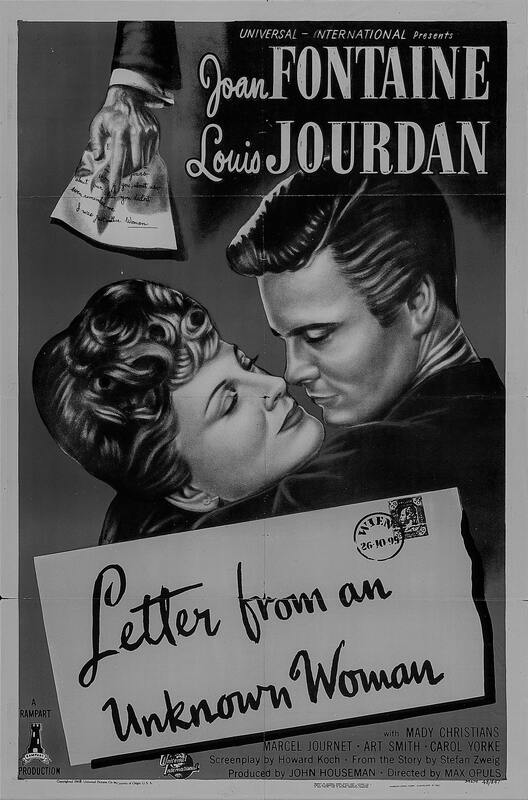 LETTER FROM AN UNKNOWN WOMAN, A (1948)
LETTER FROM AN UNKNOWN WOMAN, A (1948) (90 Min.) Genre: 1940 DRAMA, Transfer Quality: A
A lush story of unrequited love in turn-of-the-century Vienna, Max Ophüls's Letter From an Unknown Woman (1948) sumptuously visualizes the emotional power of one woman's life-long fixation on a selfish man. The title missive from Joan Fontaine's "unknown" Lisa to Louis Jourdan's flippant Stefan begins a series of flashbacks recounting her all-consuming love for him and his inability to remember her, even after he seduced her once and impregnated her. Ophüls's fluid shooting style communicates the passion that Lisa cannot articulate until it is too late, with lyrical camera movements that linger over Lisa's fascination with anything related to her one night with Stefan and evocative shots of the curved staircase leading to Stefan's apartment. The elegantly detailed period sets and costumes reveal the privileged life that Lisa abandons for Stefan, while subtly suggesting that she knows nothing about him beyond his entrancing surface. Though it was not initially a success, the gracefully romantic Letter From an Unknown Woman has since come to be considered Ophüls's best American film. — Lucia Bozzola
Starring: Joan Fontaine, Louis Jourdan, Mady Christians, Marcel Journet | Directed by: Max Ophüls
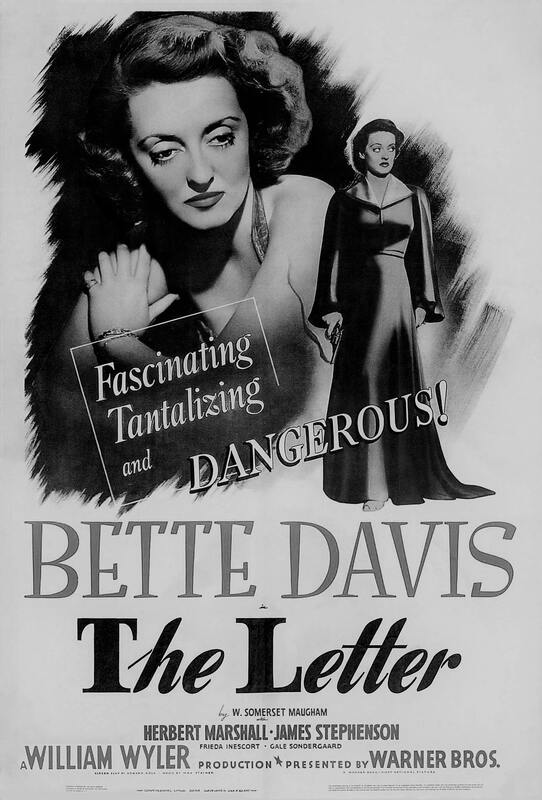 LETTER, THE (1940)
LETTER, THE (1940) (95 Min.) Genre: 1940 DRAMA, Transfer Quality: A
William Wyler's dark and poisonous melodrama, based on the W. Somerset Maugham novel, features Bette Davis in one of her nastiest roles. The story begins in the shimmering moonlight on a tropical Malayan rubber plantation. Shots ring out and a wounded man, Geoffrey Hammond (David Newell) staggers from a bungalow as Leslie Crosbie (Bette Davis) coldly follows him, pumping the remaining bullets into his body. She later tells her husband Robert (Herbert Marshall) that she shot Geoffrey, a mutual friend, because he was drunk and tried to take advantage of her. Robert, who owns the plantation, believes her story and hires high-powered lawyer Howard Joyce (James Stephenson) to defend her. But then a letter surfaces in which it is revealed that Leslie had invited Geoffrey to the plantation on the night of his murder. When Howard confronts her with the letter, Leslie admits writing it and implies that she and Geoffrey were lovers. Howard, nevertheless, agrees to continue defending her; he explains to Leslie, "I won't tell you what I personally thought when I read the letter. It's the duty of counsel to defend his client, not to convict her even in his own mind. I don't want you to tell me anything but what is needed to save your neck." Meanwhile, the letter becomes the object of a $10,000 blackmail scheme from Geoffrey's widow (Gale Sondergaard). — Paul Brenner
Starring: Bette Davis, Herbert Marshall, James Stephenson, Frieda Inescort, Gale Sondergaard | Directed by: William Wyler
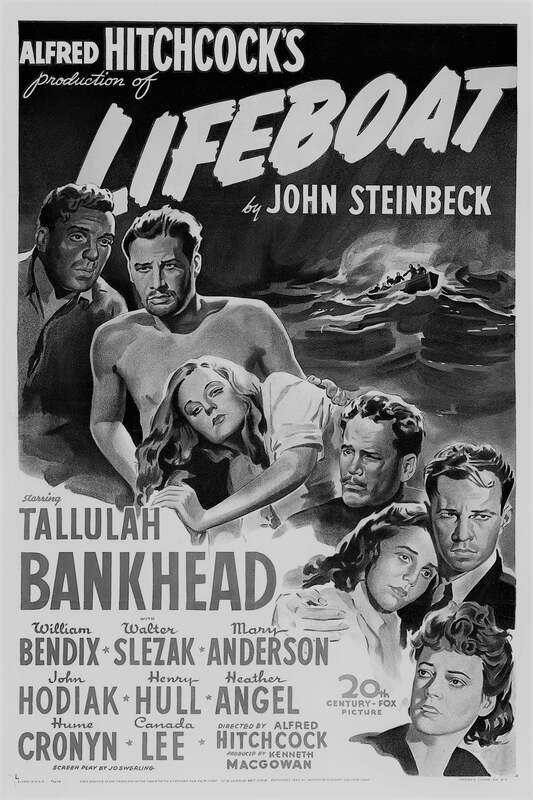 LIFEBOAT (1944)
LIFEBOAT (1944) (96 Min.) Genre: 1940 DRAMA, Transfer Quality: A
Seeking a creative challenge after several years' worth of fairly elaborate melodramas, director Alfred Hitchcock stages all of the action in Lifeboat in one tiny boat, adrift in the North Atlantic. The boat holds eight survivors of a Nazi torpedo attack: sophisticated magazine writer/photographer Tallulah Bankhead, communistic-seaman John Hodiak, nurse Mary Anderson, mild-mannered radio-operator Hume Cronyn, seriously wounded Brooklynese stoker William Bendix, insufferable-capitalist Henry Hull, black-steward Canada Lee and half-mad passenger Heather Angel, who carries the body of her dead baby. This adroitly calculated cross-section of humanity is reduced by one when Ms. Angel kills herself. After a day or so of floating aimlessly about, the castaways pick up another passenger, Walter Slezak, who is a survivor from the German U-boat. At first everyone assumes that Slezak cannot speak English, but when the necessity arises he reveals himself to be conversant in several languages and highly intelligent; in fact, he was the U-boat's captain. As the only one on board with any sense of seamanship, Slezak steers a course to his mother ship, while the others resign themselves to being prisoners of war. After it becomes necessary to amputate Bendix' s leg, Slezak decides that the burly stoker is excess weight; while the others sleep, he tosses Bendix overboard, watching dispassionately as the poor man drowns. When the rest of the passengers discover what he's done, all of them (with the significant exception of Lee) violently gang up on Slezak, and once more, the lifeboat drifts about sans navigation. If you're wondering how Hitchcock was able to make his characteristic cameo appearance in Lifeboat keep an eye on that newspaper in the closing scenes. — Hal Erickson
Starring: Tallulah Bankhead, William Bendix, Walter Slezak, John Hodiak | Directed by: Alfred Hitchcock
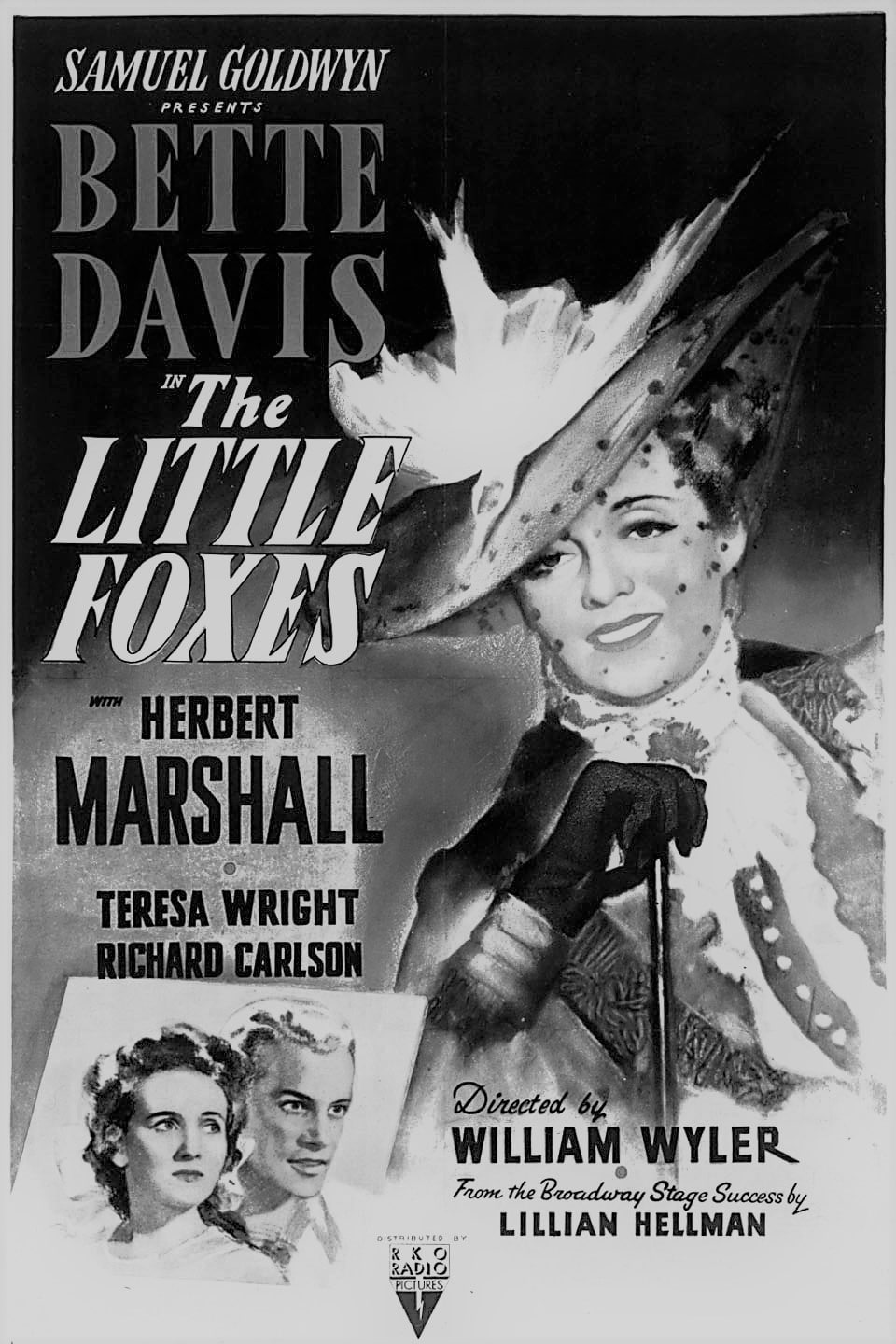 LITTLE FOXES, THE (1941)
LITTLE FOXES, THE (1941) (116 Min.) Genre: 1940 DRAMA, Transfer Quality: A
Playwright Lillian Hellman first wrote of the horrible Hubbard family in her 1939 play The Little Foxes. In this lavish 1941 film version, Bette Davis takes over for Broadway's Tallulah Bankhead in the role of conniving turn-of-the-century southern aristocrat Regina Hubbard Giddens. Regina's equally odious brothers (Charles Dingle and Carl Benton Reid) want her to lend them $75,000 to help build a cotton mill. To do this, she must make peace with her long-estranged husband Horace (Herbert Marshall)—and failing that, she tries to arrange a wealthy marriage between her daughter Alexandra (Teresa Wright) with her slimy nephew Leo (Dan Duryea). Horace refuses to give Regina the money, whereupon Leo is pressured by his father (Reid) to steal bonds from the family business. Regina uses this information as a means of blackmailing her brothers for a share in the new mill. In retaliation, Horace claims that he gave Leo the bonds as a loan, thereby cutting Regina out of the deal. When Horace suffers a heart attack, Regina makes no effort to give him his medicine, and he dies without revealing his willingness to loan the money to Leo. Regina is thus still able to strongarm her brothers into giving her a piece of the mill—but the price for her evil machinations is the loss of her daughter's love and respect. Little Foxes caused a censorship stir in 1941: by refusing to give Horace his medicine, Regina technically gets away with murder. However, the censors decided that Regina was punished enough when her daughter left her to marry an honest newspaperman (Richard Carlson). Given the usual Tiffany treatment by producer Sam Goldwyn, The Little Foxes was a success; several years later, Lillian Hellman wrote a "prequel" to Little Foxes, titled Another Part of the Forest. — Hal Erickson
Starring: Bette Davis, Herbert Marshall, Teresa Wright, Richard Carlson | Directed by: William Wyler
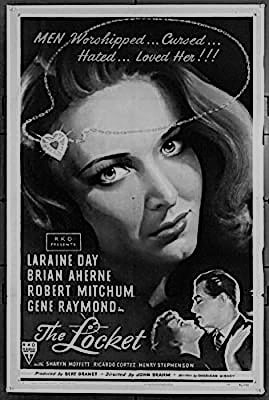 LOCKET, THE (1946)
LOCKET, THE (1946) (86 Min.) Genre: 1940 DRAMA, Transfer Quality: A
Setting something of a record for flashbacks within flashbacks, The Locket recounts the mental disintegration of bride-to-be Laraine Day. As a child, Day was accused of stealing a locket at a fancy party. She has spent her life getting even for this false accusation by becoming a kleptomaniac and ruining the lives of those around her. She drives one man (Robert Mitchum) to suicide, and stands by as another man is executed for a murder which she has committed. Assuming her revenge on the world is complete when she becomes engaged to the son of the woman who'd accused her of thievery, Day is overtaken by the demons within her and collapses on the altar. The Locket is difficult to follow at times, especially when seen in commercialized chunks on the Late Late Show. — Hal Erickson
Starring: Robert Mitchum, Laraine Day, Brian Aherne, Gene Raymond | Directed by: John Brahm
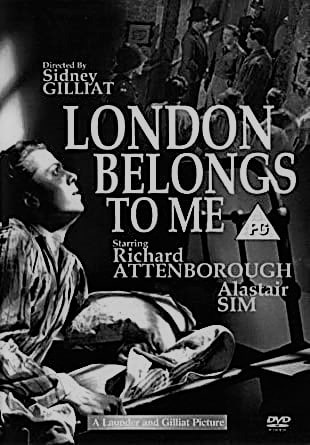 LONDON BELONGS TO ME (1948)
LONDON BELONGS TO ME (1948) (112 Min.) Genre: 1940 DRAMA, Transfer Quality: B
Assembled by the reliable team of Frank Launder and Sidney Gilliat, London Belongs to Me stars Richard Attenborough as a young, full-of-beans boy looking for fun. Bursting into a staid, wearisome London neighborhood, Attenborough exhorts the others to get some kicks out of life. Unfortunately, his search for thrills gets him involved in a murder. Just when you think that the film is a dour "slice of life" drama, a new comic element is introduced as the locals start up a petition to release Attenborough from jail. The presence of Alastair Sim in the cast should have tipped us off that London Belongs to Me wasn't meant to be taken entirely seriously. The film was released in the US as Dulcimer Street.
Starring: Richard Attenborough, Alastair Sim, Fay Compton, Stephen Murray | Directed by: Sidney Gilliat
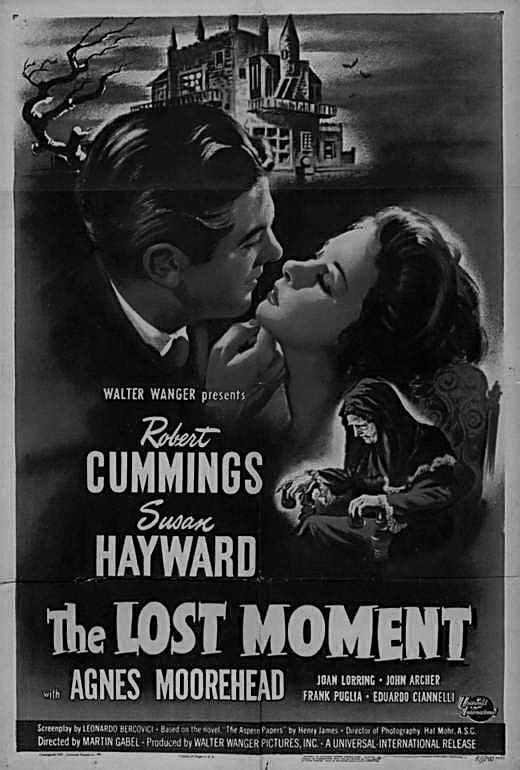 LOST MOMENT, THE (1947)
LOST MOMENT, THE (1947) (89 Min.) Genre: 1940 DRAMA, Transfer Quality: B
It is said that Henry James' The Aspern Papers were inspired by the romance between Lord Byron and his mistress Claire Claremont, who in her dotage jealously guarded the poems written by Byron in her honor. In the film version of James' novel, The Lost Moment, the Clairemont character, renamed Juliana, is a blind, 105-year-old recluse, played with an abundance of age makeup by Agnes Moorehead (whose amazing cosmetic makeover was the subject of several magazine articles back in 1947). The plot of the film concentrates on the efforts by a publisher named Lewis (Robert Cummings) to obtain the "lost" poems written by a legendary literary figure to the centenarian Juliana. The old lady is fiercely protected by her near-psychotic niece Tina (Susan Hayward), who nonetheless agrees to help Lewis get his hands on the precious documents. As the story unfolds, it becomes clear that the Venetian mansion where Juliana resides harbors a horrible secret, one that bodes ill for the troubled Tina and everyone with whom she comes in contact. Watching in bewildered silence is Father Rinaldo (Eduardo Cianelli), the film's "voice of conscience". Together with The Heiress, The Lost Moment is one of the few successful attempts to transfer the elusive prose of Henry James to the screen.
Starring: Robert Cummings, Susan Hayward, Agnes Moorehead, Joan Lorring | Directed by: Martin Gabel
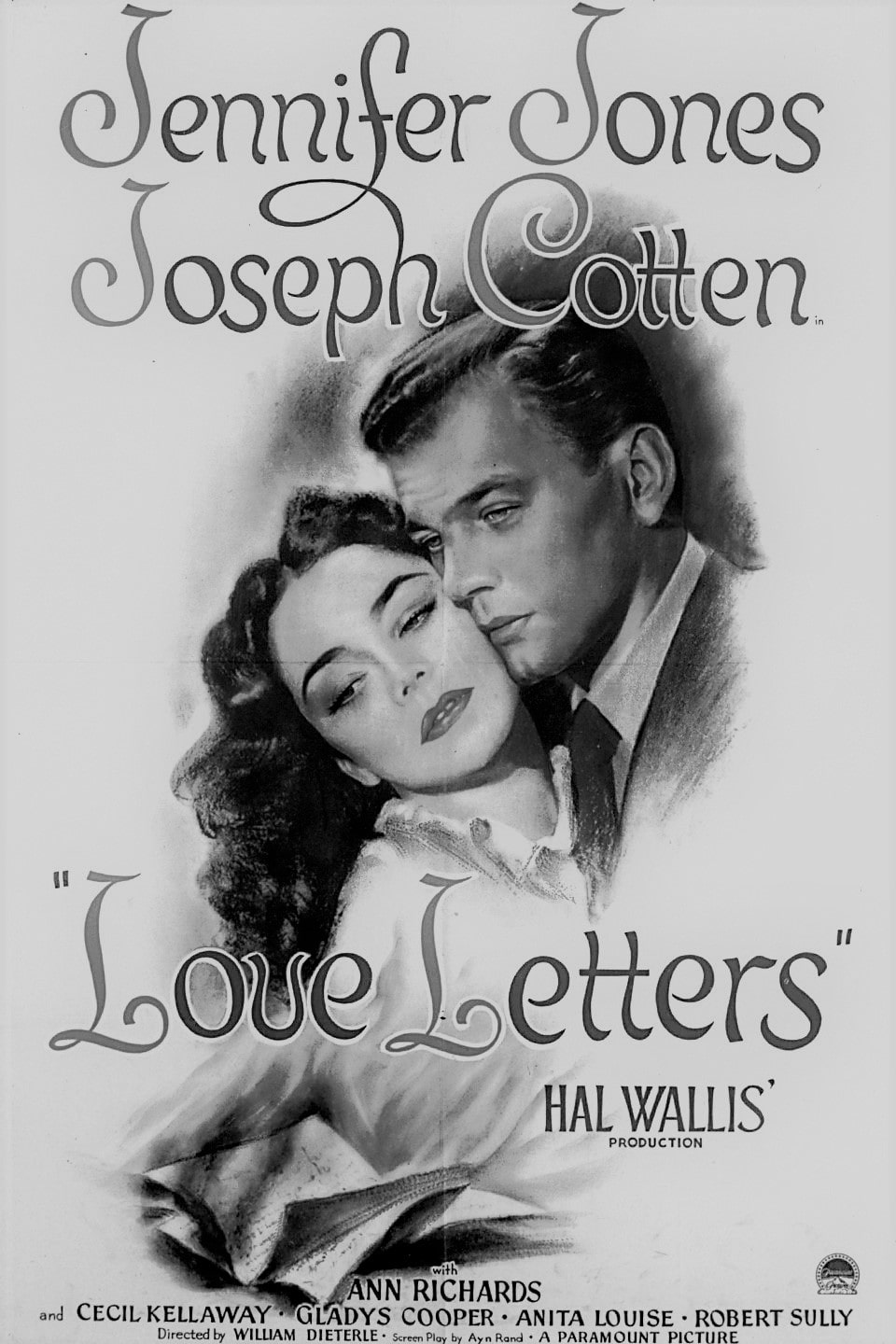 LOVE LETTERS (1945)
LOVE LETTERS (1945) (101 Min.) Genre: 1940 DRAMA, Transfer Quality: A
Ayn Rand wrote this adaptation of Chris Massie's book Pity Mr. Simplicity, about a soldier who falls in love with a former comrade's wife — an amnesiac who may have murdered her husband. The story begins in Italy when two soldiers, Allen Quinton (Joseph Cotton) and Roger Morland (Robert Sully), hatch a scheme concerning Singleton (Jennifer Jones), a girl back home. Roger is in love with her but can't write as well as his friend. Allen agrees to write love letters to Singleton for his friend and, based on the flowery sentiments, she falls in love his Roger. Returning home, Singleton and Roger marry, but Roger proves to be a drunken, abusive husband. One night, as Roger is beating Singleton, he is stabbed to death by her stepmother. Singleton goes in to shock, rendering her unable to recall the murder, while her stepmother has a stroke, making her unable to speak. Accused of murder, Singleton is sentenced to a year in jail. Allen, in the meantime, hears about the murder of his friend and comes to visit Singleton, and the two proceed to fall in love. — Paul Brenner
Starring: Jennifer Jones, Joseph Cotton, Ann Richards, Gladys Cooper | Directed by: William Dieterle
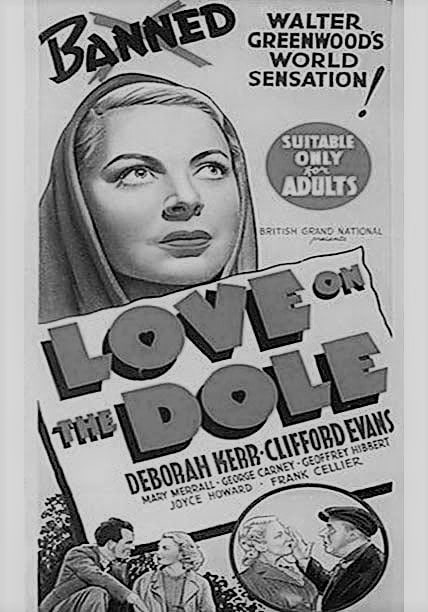 LOVE ON THE DOLE (1941)
LOVE ON THE DOLE (1941) (89 Min.) Genre: 1940 DRAMA, Transfer Quality: B
Filmed in the North Country of England, this is a film noir set in the 1930s as a family struggles with poverty and unemployment. Depressing and realistic, it portrays the lengths to which a family can go in order to survive., though there is some humor interlaced to keep the bleakness under control. The beautiful, sepia-tinted photography enhances the portrayals, which are excellent.
Starring: Deborah Kerr, Clifford Evans, Mary Merrall, Geoffrey Hibbert | Directed by: John Baxter
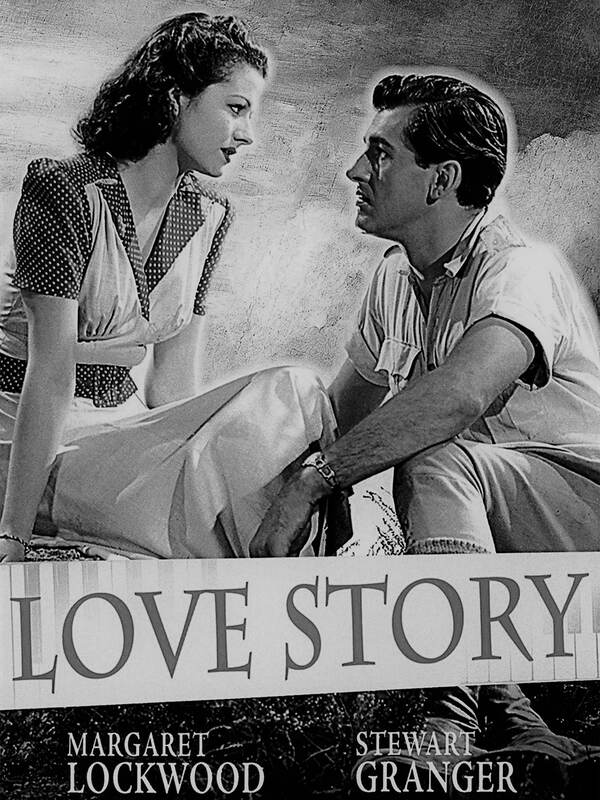 LOVE STORY (1944)
LOVE STORY (1944) (113 Min.) Genre: 1940 DRAMA, Transfer Quality: B
No relation to the 1970 box-office blockbuster of the same name, the 1944 British film Love Story was originally released in the US as The Lady Surrenders. Margaret Lockwood stars as one of those brilliant but troubled concert pianists, so beloved of British wartime filmgoers. Knowing that she suffers from a potentially fatal heart condition, Margaret has one last fling with RAF pilot Stewart Granger, who is slowly going blind. As in such earlier romantic dramas of the One Way Passage variety, Margaret and Stewart keep their afflictions secret from each other. When the truth comes out, Granger agrees to a dangerous and experimental operation to restore his sight. This sets the stage for a war of wills between Lockwood, who wants Granger to undergo the surgery, and Gragner's fiancee Patricia Roc, who, for reasons of her own, does not. Love Story was cowritten and directed by Leslie Arliss, son of eminent British stage star Sir George Arliss.
Starring: Margaret Lockwood, Stewart Granger, Patricia Roc, Tom Walls | Directed by: Leslie Arliss
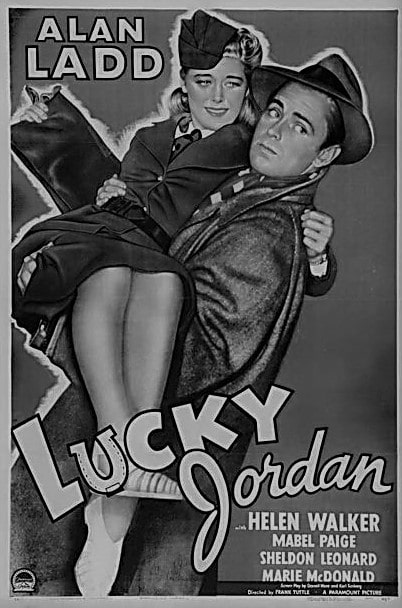 LUCKY JORDAN (1942)
LUCKY JORDAN (1942) (84 Min.) Genre: 1940 DRAMA, Transfer Quality: C
Lucky Jordan (Alan Ladd) is a tough but good-natured New York racketeer who tries to finagle his way out of Army service. Despite his efforts, Jordan is drafted, but soon goes AWOL, with a lovely USO worker (Helen Walker) dogging his heels. She tries to arouse Jordan's patriotism, but he is unmoved until a gang of enemy spies beat up an old lady con artist (Mabel Paige) whom Lucky regards as a surrogate mother. Using his underhanded "street smarts," Jordan rounds up the spies and agrees to complete his military servitude. Lucky Jordan was one of several wartime films in which otherwise larcenous individuals are redeemed by channelling their talents for the good of Uncle Sam. — Hal Erickson
Starring: Alan Ladd, Helen Walker, Sheldon Leonard, Mabel Paige | Directed by: Frank Tuttle
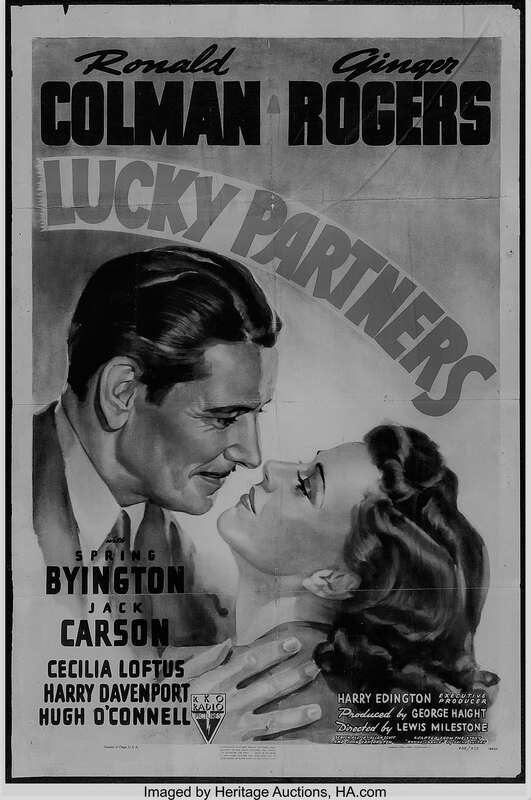 LUCKY PARTNERS (1940)
LUCKY PARTNERS (1940) (99 Min.) Genre: 1940 DRAMA, Transfer Quality: A
Lewis Milestone directs the lightweight romantic comedy Lucky Partners, based on a story by Sacha Guitry. David Grant (Ronald Colman) is an artist in New York's Greenwich Village. After he wishes good luck to passing ingenue Jean Newton (Ginger Rogers), she is immediately offered a beautiful dress. Thinking that David is lucky, she agrees to go in with him on a ticket for the Irish Sweepstakes. Their horse wins the race, and he asks her to accompany her to Niagara Falls to celebrate their winnings. Jean's fiancé, Freddie Harper (Jack Carson), is not pleased about the arrangement, so he follows them. Eventually Jean and David fall for each other and they end up in the courthouse, where the judge ($Harry Davenport) sorts everything out in favor of the new couple. Lucky Partners was released in 1940, the same year Rogers gave her Oscar-winning performance in Kitty Foyle: The Natural History of a Woman. — Andrea LeVasseur
Starring: Ronald Colman, Ginger Rogers, Jack Carson, Spring Byington | Directed by: Lewis Milestone
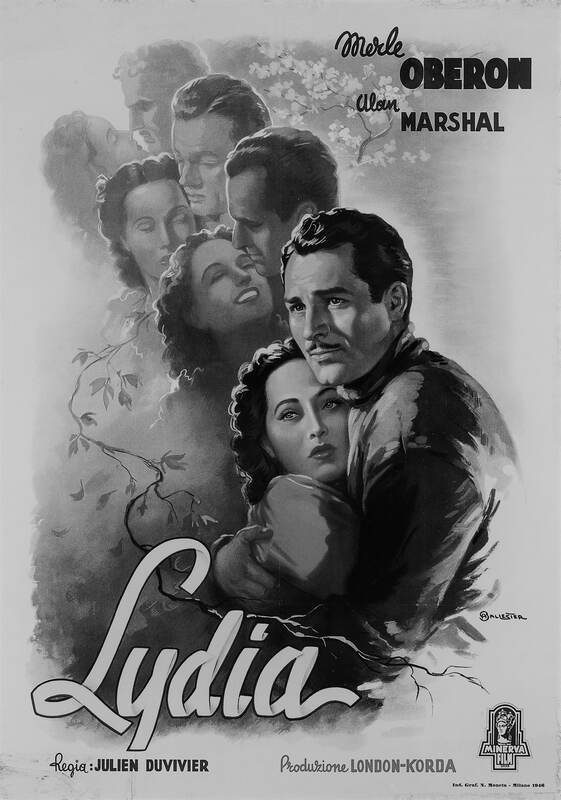 LYDIA (1941)
LYDIA (1941) (94 Min.) Genre: 1940 DRAMA, Transfer Quality: B
Adapted from a French movie entitled Un Carnet de Bal, this is a story of love unrequited. In one of her best performances, Merle Oberon portrays an elderly woman who has spent her life waiting for a man whom she had a brief liaison with but who never returned for her as he had promised. Casting aside three suitors over a forty year period, she has spent her life in solitude. When a party is arranged and all three of her spurned suitors show up, a surprise fourth is also present—her original true love. Denouement is somewhat of a surprise in this romantic love story.
Starring: Merle Oberon, Edna May Oliver, Alan Marshal, Joseph Cotton | Directed by: Julien Duvivier
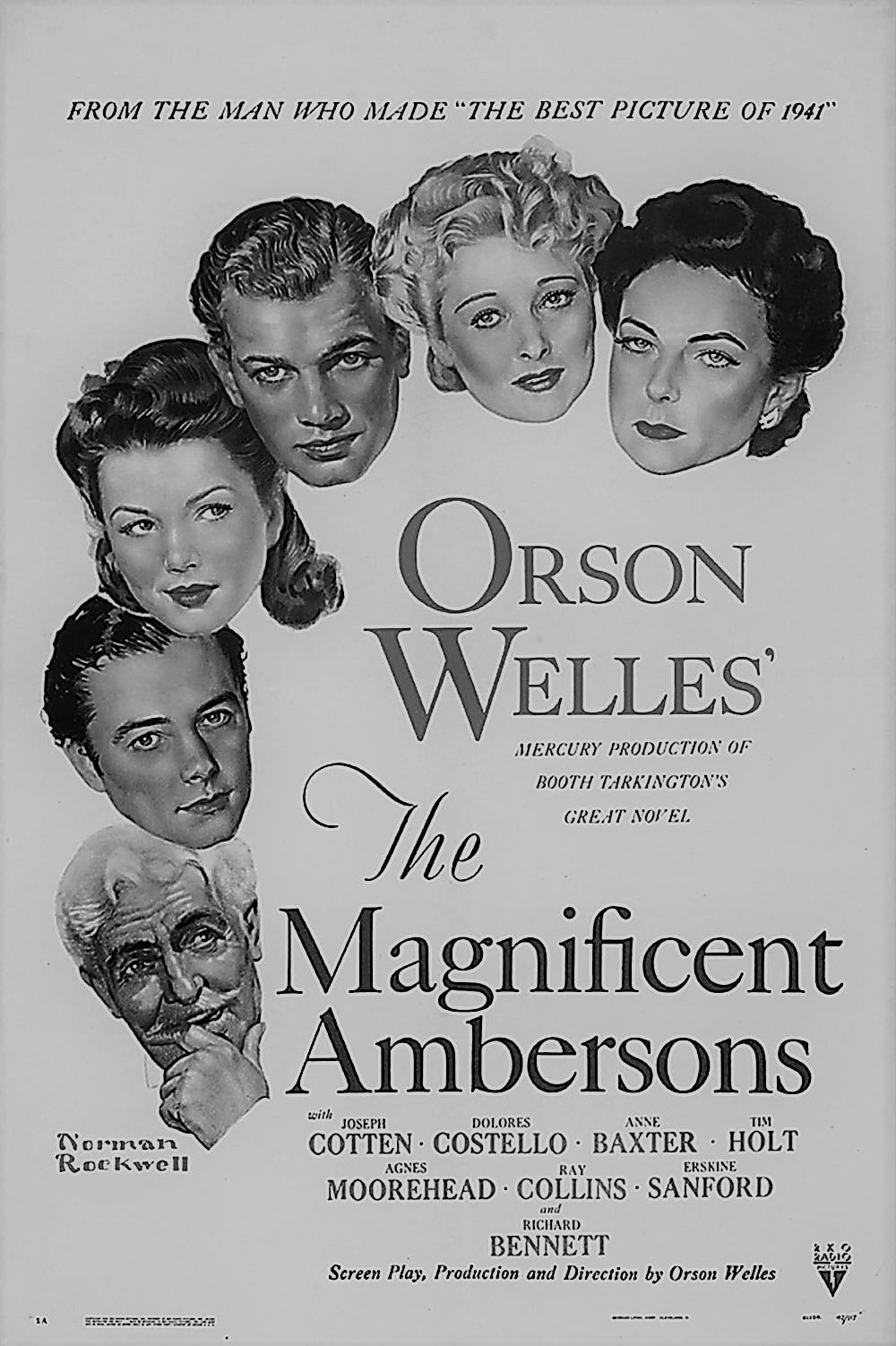 MAGNIFICENT AMBERSONS, THE (1942)
MAGNIFICENT AMBERSONS, THE (1942) (88 Min.) Genre: 1940 DRAMA, Transfer Quality: A
Orson Welles' followup to Citizen Kane (1941) was utterly different from Kane in style and texture, but just as brilliant in its own way. Writer/director Welles does not appear on camera, but his voiceover narration superbly sets the stage for the movie's action, which fades in valentine fashion on Amberson Mansion, the most ostentatious dwelling in all of turn-of-century Indianapolis. Its mistress is the haughtily beautiful Isabel Amberson (Dolores Costello). When Isabel's beau, erstwhile inventor Eugene Morgan (Joseph Cotten), inadvertently humiliates her in public, she breaks off the relationship and marries colorless Wilbur Minafer (Donald Dillaway). The neighbors are certain that, since Isabel can't possibly love Wilbur, she will spoil her children rotten. As it turns out, she has one child, George Minafer (Tim Holt), and that one is enough as far as the rest of Indianapolis is concerned. There are those who live for the day that the arrogant, insufferable George will get his comeuppance. When George returns home from college, his mother and grandfather (Richard Bennett) hold a gala reception in his honor. Among the guests is the older-and-wiser Eugene, now a prosperous automobile manufacturer, and his pretty daughter Lucy (Anne Baxter). George takes to Lucy immediately, but can't warm up to Eugene, especially after learning from his uncle Jack Amberson (Ray Collins) and his maiden aunt Fanny (Agnes Moorehead) that Eugene and Isabel had once been sweethearts. After the death of Wilbur Minafer, the widowed Eugene feels emboldened enough to propose to Isabel again. This time she is willing, but the obstreperous George refuses to allow his mother to see Eugene. His imperious bullheadedness will lead to tragedy for all concerned—and, at long last, a chastened George Minafer will indeed receive his comeuppance. The film's real villain is not George but that old intangible bugaboo called "Progress." As the automobile age comes to fruition, the elegant, cloistered lifestyle of the Ambersons fades from view, finally disappearing altogether. This is superbly foreshadowed in the "winter outing" sequence (filmed in an L.A. icehouse) in which George's two-horse sleigh is abandoned in favor of Eugene's clunky horseless carriage. Welles evokes performances that his actors seldom (if ever) matched in later years; even the very limited Tim Holt is wholly believable-and even a bit pitiable-as the blinkered George Amberson Minafer. The current version, however, is but a pale shadow of Welles' original concept. Out of time and overbudget, the movie previewed badly and was eventually sliced down to an abrupt 88 minutes (by, among others, editor Robert Wise, who would go on to direct such films as West Side Story and The Sound of Music). Even though the film therefore must be regarded as a marred masterpiece, the remaining two-thirds of Welles' original concept is still a thrilling cinematic experience, especially whenever Agnes Moorehead is on the screen. — Hal Erickson
Starring: Joseph Cotton, Tim Holt, Dolores Costello, Anne Baxter, Agnes Moorehead | Directed by: Orson Welles
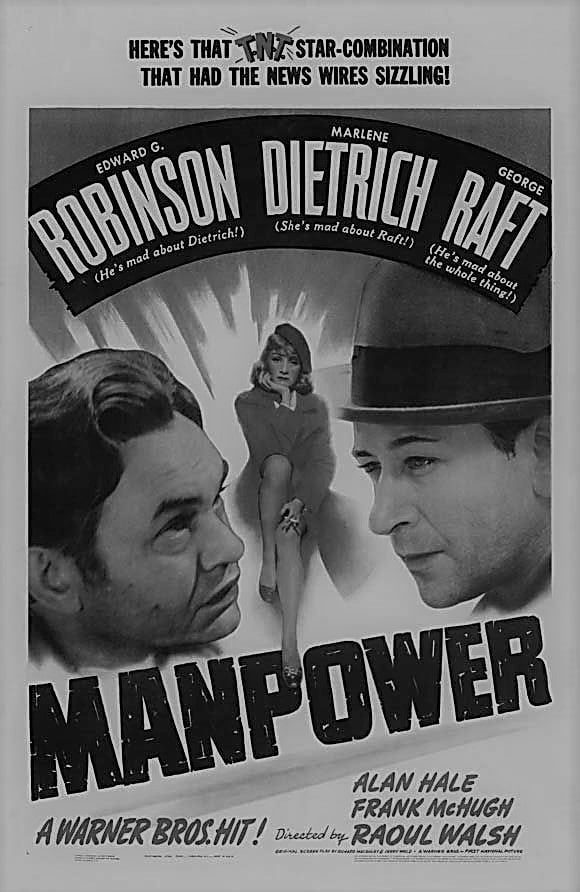 MANPOWER (1941)
MANPOWER (1941) (103 Min.) Genre: 1940 DRAMA, Transfer Quality: A
Manpower was Warner Bros' latest reworking of 1932's Tiger Shark, with power-company linemen substituting for tuna fisherman. While repair some downed lines in a heavy thunderstorm, Hank McHenry (Edward G. Robinson) saves the life of his best pal Johnny Marshall (George Raft). While Johnny emerges from the experience unscathed, Hank is permanently crippled. He takes this misfortune in stride, but Johnny vows to look after Hank's best interests for the rest of their lives. When Hank marries blowzy nightclub hostess Fay Duval (Marlene Dietrich), Johnny is disdainful, convinced that Fay is playing Hank for a sucker. While recuperating in Hank's home after a slight injury, Johnny confesses to Fay that he's in love with her, a feeling that turns out to be mutual. Out of loyalty to Hank, Johnny refuses to have anything to do with Fay, who finally decides to leave town rather than break up the men's friendship. But Fay cannot stay away from Johnny, forcing him to confront the ever-trusting Hank with the truth, leading inexorably to the film's violent conclusion on a precariously high utility pole. A few comic interludes aside, Manpower is virile, gutsy entertainment; the fact that Edward G. Robinson and George Raft did not get along at all during shooting-resulting in a well-publicized on-set fistfight-only adds to the film's crackling tension. — Hal Erickson
Starring: Marlene Dietrich, Edward G. Robinson, George Raft, Alan Hale, Jane Randolph, Faye Emerson | Directed by: Raoul Walsh
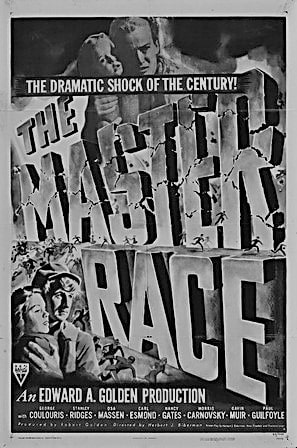 MASTER RACE, THE (1944)
MASTER RACE, THE (1944) (96 Min.) Genre: 1940 DRAMA, Transfer Quality: A
The Master Race argues persuasively that, although it appeared that the Nazis would lose WW2, it was foolish to assume that Hitler's legacy would not insinuate itself into the postwar era. Nazi bigwig Von Beck (George Coulouris) arrives in a small Belgian village on the eve of its liberation by the Allied troops. It is Von Beck's plan to foment disharmony and bigotry amongst the villagers, thereby laying the groundwork for a German victory in the next war. But Von Beck soon discovers that the populace isn't quite as gullible as the herrenvolk had been when Hitler rose to power. Still, the film ends with a warning: the only way to avoid future world conflict is to thoroughly crush the instigators of the present war. Ironically, after hostilities ceased, Herbert J. Biberman, cowriter-director of The Master Race, was castigated by the anti-Red brigades for being, among other things, a "premature anti-fascist." — Hal Erickson
Starring: George Coulouris, Lloyd Bridges, Stanley Ridges, Osa Massen, Nancy Gates | Directed by: Herbert J. Biberman
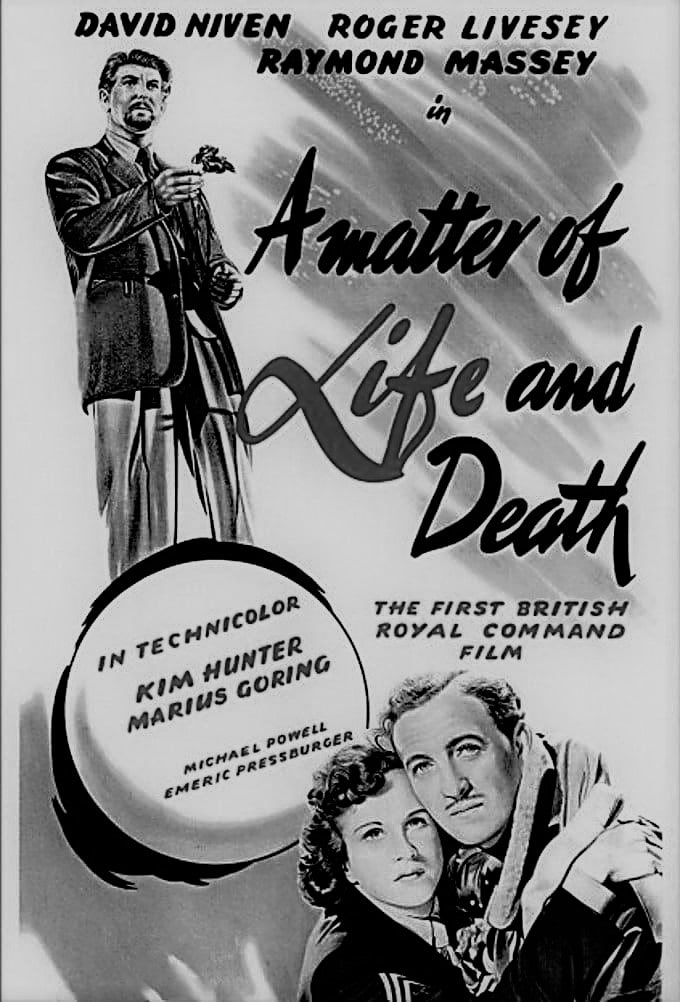 MATTER OF LIFE AND DEATH, A (1946)
MATTER OF LIFE AND DEATH, A (1946) (104 Min.) Genre: 1940 DRAMA, Transfer Quality: B
Also known as Stairway to Heaven, A Matter of Life and Death is the remarkable British fantasy film that became the surprise hit of 1946. David Niven stars as a World War II RAF pilot who is forced to bail out of his crippled plane without a parachute. He wakes up to find he has landed on Earth utterly unharmed...which wasn't supposed to happen according to the rules of Heaven. A celestial court argues over whether or not to claim Niven's life or to let him survive to wed his American sweetheart (Kim Hunter). During an operation, in which Niven hovers between life and death, he dreams that his spirit is on trial, with God (Abraham Sofaer) as judge and Niven's recently deceased best friend (Roger Livesey) as defense counsel. The film tries to have it both ways by suggesting that the Heavenly scenes are all a product of Niven's imagination, but the audience knows better. Among the curious but effective artistic choices in A Matter of Life and Death was the decision to film the Earthbound scenes in Technicolor and the Heaven sequences in black and white. The film was a product of the adventuresome team known as The Archers: Michael Powell and Emeric Pressburger.
Starring: David Niven, Kim Hunter, Marius Goring, Raymond Massey | Directed by: Michael Powell, Emeric Pressburger
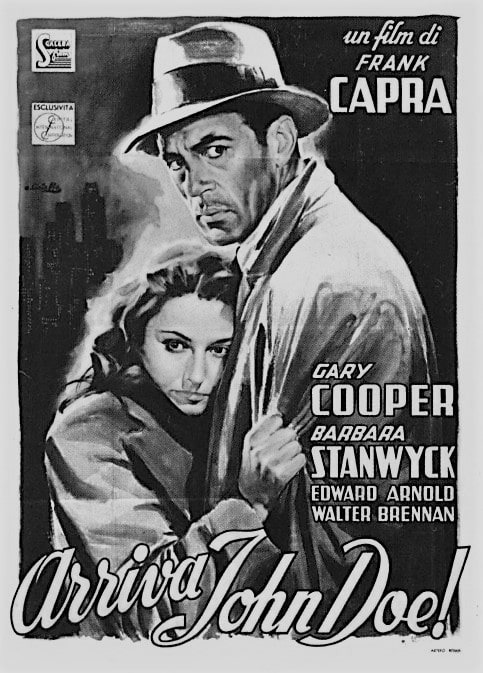 MEET JOHN DOE (1941)
MEET JOHN DOE (1941) (123 Min.) Genre: 1940 DRAMA, Transfer Quality: A
The first of director Frank Capra's independent productions (in partnership with Robert Riskin), Meet John Doe begins with the end of reporter Ann Mitchell's (Barbara Stanwyck) job. Fired as part of a downsizing move, she ends her last column with an imaginary letter written by "John Doe." Angered at the ill treatment of America's little people, the fabricated Doe announces that he's going to jump off City Hall on Christmas Eve. When the phony letter goes to press, it causes a public sensation. Seeking to secure her job, Mitchell talks her managing editor (James Gleason) into playing up the John Doe letter for all it's worth; but to ward off accusations from rival papers that the letter was bogus, they decide to hire someone to pose as John Doe: a ballplayer-turned-hobo (Gary Cooper), who'll do anything for three squares and a place to sleep. "John Doe" and his traveling companion The Colonel (Walter Brennan) are ensconced in a luxury hotel while Mitchell continues churning out chunks of John Doe philosophy. When newspaper publisher D.B. Norton (Edward Arnold), a fascistic type with presidential aspirations, decides to use Doe as his ticket to the White House, he puts Doe on the radio to deliver inspirational speeches to the masses — ghost-written by Mitchell, who, it is implied, has become the publisher's mistress. The central message of the Doe speeches is "Love Thy Neighbor," though, conceived in cynicism, the speeches strike so responsive a chord with the public that John Doe clubs pop up all over the country. Believing he is working for the good of America, Cooper agrees to front the National John Doe Movement — until he discovers that Norton plans to exploit Doe in order to create a third political party and impose a virtual dictatorship on the country. The last of Capra's "social statement" films, Meet John Doe posted a profit, although Capra and Riskin were forced to dissolve their corporation due to excessive taxes. — Hal Erickson
Starring: Gary Cooper, Barbara Stanwyck, Edward Arnold, Walter Brennan, Gene Lockhart | Directed by: Frank Capra
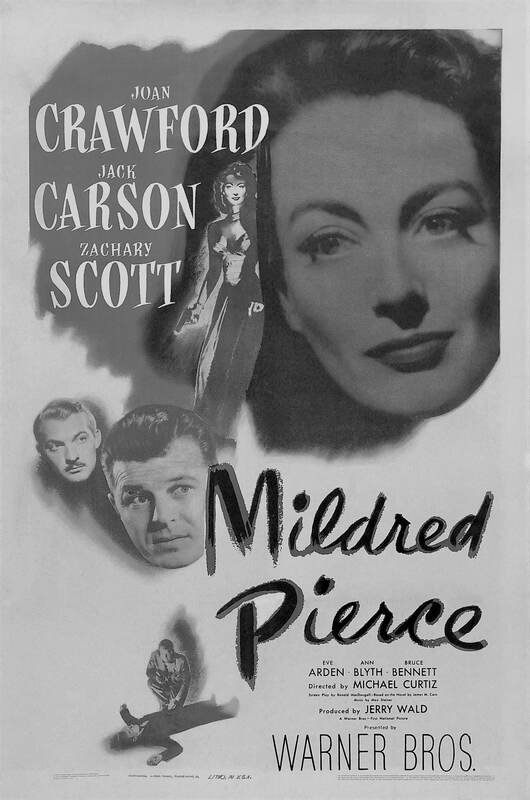 MILDRED PIERCE (1945)
MILDRED PIERCE (1945) (111 Min.) Genre: 1940 DRAMA, Transfer Quality: A
Joan Crawford won an Academy Award for her bravura portrayal of the titular heroine in Mildred Pierce. The original James M. Cain novel concerned a tawdry waitress who slept her way to financial security so as to provide a rosy future for her beloved daughter, only to be rewarded by having her true love stolen away by that selfsame daughter. Ranald McDougall's screenplay tones down the novel's sexual content, enhancing its cinematic value by adding a sordid murder. The film opens with oily lounge lizard Monte Beragon (Zachary Scott) being pumped full of bullets. Croaking out the name "Mildred", he collapses and dies. Both the police and the audience are led to believe that the murderer is chain-restaurant entrepreneur Mildred Pierce (Crawford), who not only confesses to the crime, but takes the time to relate her life story. As the flashback begins, we see Mildred unhappily married to philandering Bert Pierce (Bruce Bennett). She divorces him, keeping custody of her two beloved daughters, Veda (Ann Blyth) and Kay (Jo Anne Marlowe). To keep oldest daughter Veda in comparative luxury, Mildred takes a series of jobs, culminating with a waitressing position. With the help of her wisecracking coworker Ida (Eve Arden), Mildred turns the restaurant into a genuine moneyspinner. She seduces slimy real estate agent Wally Fay (Jack Carson) in order to afford her own establishment, which grows into a chain of "Mildred Pierce's" throughout Southern California. When youngest daughter Kay dies, Mildred smothers Veda in affection and creature comforts. She goes so far as to enter into a loveless marriage with wealthy Monty Beragon in order to improve her social standing. In return, the caddish Beragon enters into several shady business deals which bankrupt Mildred. He caps this misbehavior by carrying on an affair with stepdaughter Veda. — Hal Erickson
Starring: Joan Crawford, Jack Carson, Zachary Scott, Eve Arden, Ann Blyth | Directed by: Michael Curtiz
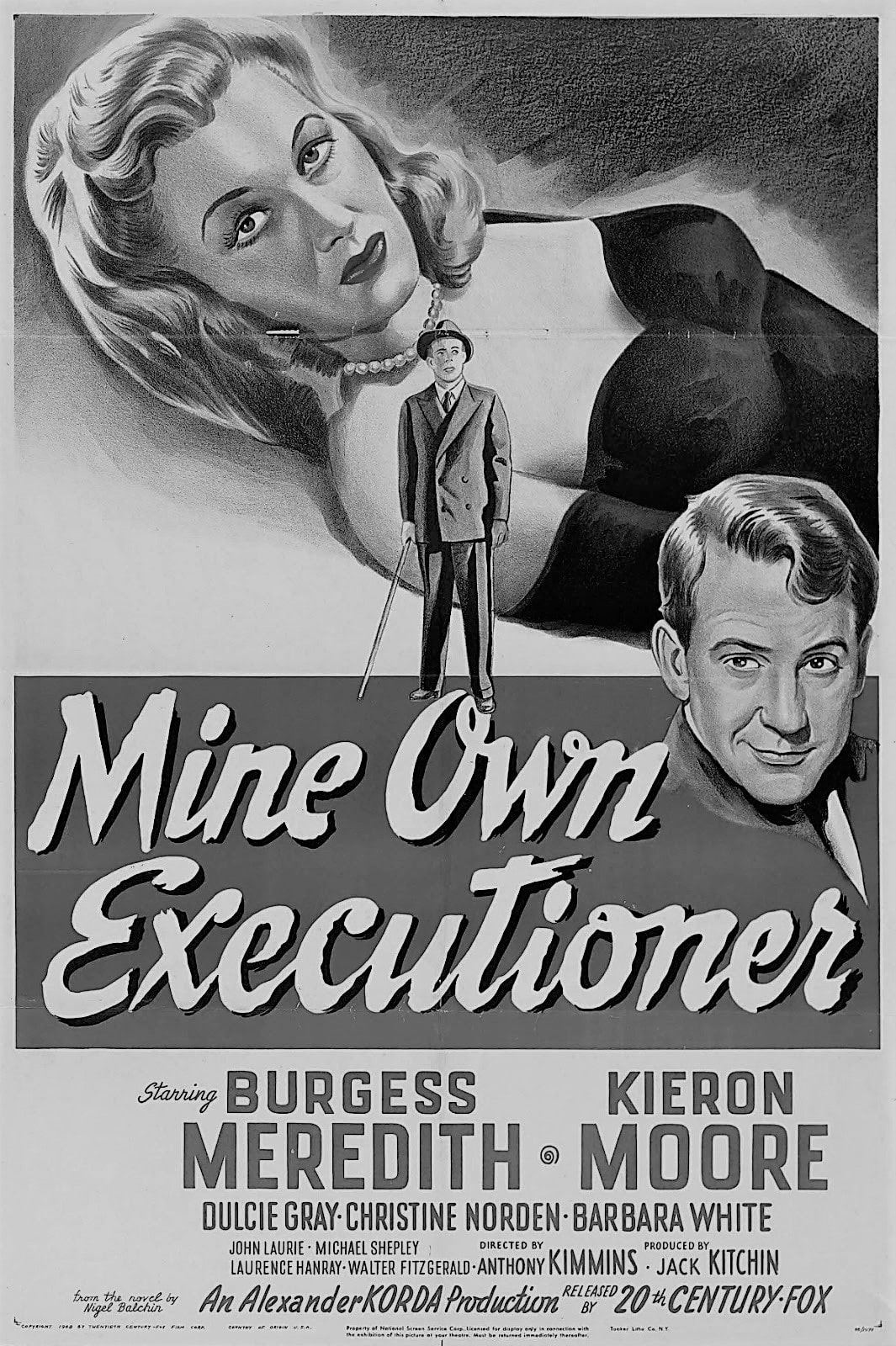 MINE OWN EXECUTIONER (1947)
MINE OWN EXECUTIONER (1947) (102 Min.) Genre: 1940 DRAMA, Transfer Quality: B
London psychiatrist Burgess Meredith takes on the case of schizophrenic ex-POW Kieron Moore. So long as Meredith is diligent in his approach, Moore shows signs of improvement, and a lessening of his more violent tendencies. But the moment Meredith takes too much for granted, Moore goes off the deep end, murdering his wife and committing suicide. Brought up on malpractice charges, Meredith is saved by the testimony of his loyal physician-friend John Laurie, though for a time the psychiatrist's own mental condition is as fragile as that of his late patient. While Burgess Meredith was fond of noting that he had to leave Hollywood for England to find a worthwhile film role, Mine Own Executioner suffered from a bout of Hollywood-style interference in delineating the shady background of its protagonist, which might have clarified several confusing plot points. Still, the film has a lot of "guts," especially for a late-1940s effort.
Starring: Burgess Meredith, Dulcie Gray, Michael Shepley, Christine Norden | Directed by: Anthony Kimmins
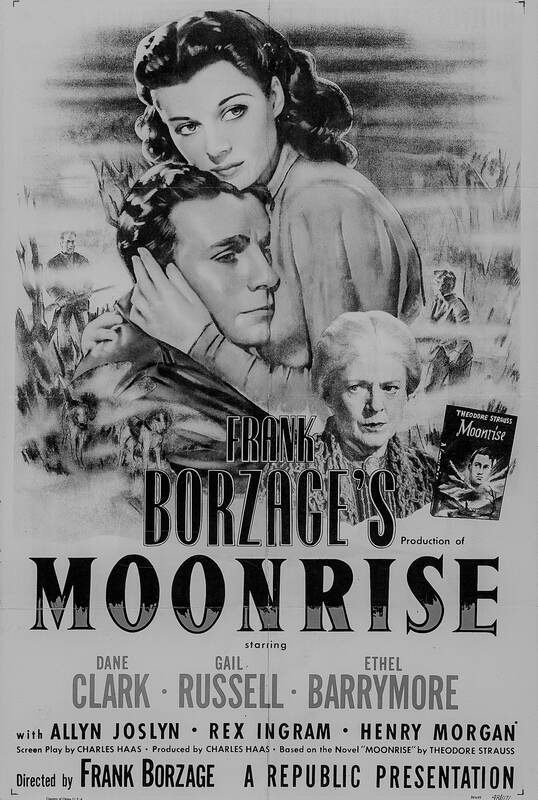 MOONRISE (1948)
MOONRISE (1948) (90 Min.) Genre: 1940 DRAMA, Transfer Quality: B
All of his life, Danny Hawkins (Dane Clark) has been taunted and mistreated by most of the people around him, enduring innumerable beatings and other humiliations as a boy because his father was a murderer who died on the gallows. He finds it not much better as an adult, living with his aunt in the small Virginia town of Woodville — especially when he is contending for the attentions of young schoolteacher Gilly Johnson (Gail Russell) with his boyhood tormentor Jerry Sykes (Lloyd Bridges), whose bullying and arrogance are made worse (and more galling) by the fact that he's the son of the town banker (and its richest man). Sykes picks a fight with Danny and loses for the first time, but he dies in the process. Knowing how the town thinks of him because of his father, Danny tries to hide the body. But for all of his bitterness over how he's been treated, he can't truly escape the feelings of guilt over what he's done — nor can he escape his fear of what people will probably think. For a time, his new romance with Gilly distracts him, but he's unable to put it out of his mind for long, especially when he's forced to join his good friend Mose (Rex Ingram) on a raccoon hunt that takes them right to the pond where the body is hidden. Soon the sheriff (Allyn Joslyn) is investigating, and he can't help but confer with the one man in town whose judgment he respects nearly as much as his own — Danny. And when Danny's deaf-mute friend, Billy (Harry Morgan), unknowingly uncovers a key piece of evidence, Danny is pushed almost to the breaking point. He's driven by his own instincts to run away, and invite almost certain capture or death, but Gilly and the sheriff see this as a chance for Danny not only to free himself of the torment over what he's done but from the past that has haunted him and blighted his life — if only they can reach him and make him understand.
Starring: Dane Clark, Gail Russell, Ethel Barrymore, Allyn Joslyn | Directed by: Frank Borzage
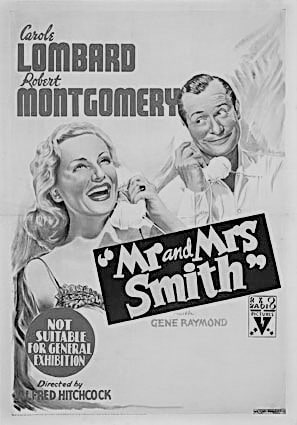 MR. & MRS. SMITH (1941)
MR. & MRS. SMITH (1941) (95 Min.) Genre: 1940 DRAMA, Transfer Quality: A
In Hitchcock's rare foray into comedy (courtesy of a wittily risque script by Norman Krasna), Mr. Smith (Robert Montgomery) makes the mistake of telling Mrs. Smith (Carole Lombard) that if he had it to do all over again, he might not have married her. Shortly thereafter, Mr. Smith discovers that his marriage is invalid. Rather than say goodbye, the newly aroused Mr. Smith attempts to entice Mrs. Smith into the bedroom, thrilled at the prospect of an "illicit" romance. But Mrs. Smith has also been apprised that her marriage is no more—and, remembering Mr. Smith's "second thoughts", she kicks him out of the house. This comedy of misunderstanding rolls merrily along from this point onward, accommodating an uproarious scene at a fancy restaurant, a near-liaison between Mrs. Smith and new beau Gene Raymond on the World's Fair parachute jump, and a farcical denouement at a ski lodge, with Mrs. Smith's conjugally crossed skis symbolizing the carnal pleasures ahead for both Mr. and Mrs. Smith. — Hal Erickson
Starring: Carole Lombard, Robert Montgomery, Gene Raymond, Jack Carson | Directed by: Alfred Hitchcock
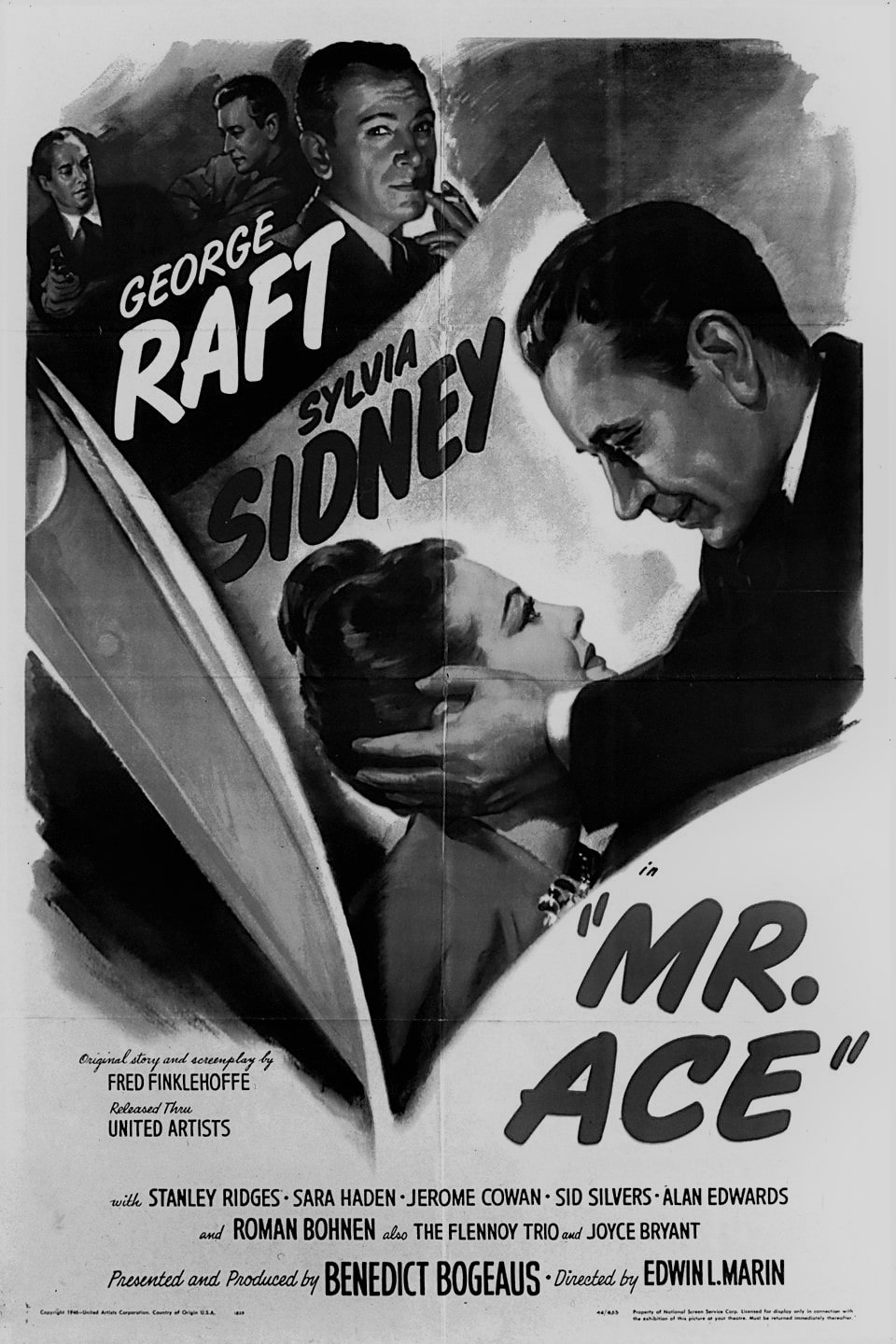 MR. ACE (1946)
MR. ACE (1946) (85 Min.) Genre: 1940 DRAMA, Transfer Quality: B
His movie career on a roll since the surprise success of 1946's Johnny Angel, George Raft was starred in the Benedict Bogeaus production Mister Ace. Raft plays Eddie Ace, the head man of a crooked political machine who intends to scuttle the gubernatorial campaign of female senator Margaret Wyndham Chase (Sylvia Sidney). He uses every dirty trick in the book to destroy Margaret, but she perserveres on the strength of sheer honesty and integrity. Through her example, Ace mends his own ways, earning Margaret's love as a bonus. Though consummately produced, Mr. Ace failed to match the box-office performance of Raft's earlier films.
Starring: George Raft, Sylvia Sidney, Stanley Ridges, Sara Haden, Jerome Cowan | Directed by: Edwin L. Marin
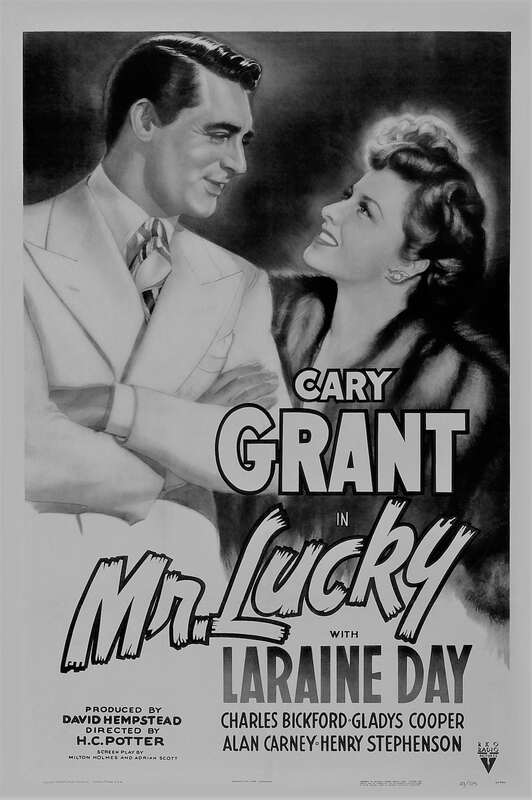 MR. LUCKY (1943)
MR. LUCKY (1943) (100 Min.) Genre: 1940 DRAMA, Transfer Quality: A
One of Cary Grant's most financially successful 1940s vehicles, Mr. Lucky finds Grant atypically cast as a shifty, out-for-number-one gambler. Having dodged the draft by adopting the identity of a dead man, Grant sets his sights on purchasing a fancy gambling ship. To raise the necessary funds, he pretends to be working hand in glove with the American War Relief society. Once he meets Laraine Day, however, Grant is seized by an uncontrollable bout of honesty. It takes him awhile, but he finally does the right thing. The film is framed in flashback, as old seaman Charles Bickford explains why a tearful Laraine Day waits at the dock each evening for a certain ship to come in. Also in the cast is Paul Stewart as a cold-eyed but nonetheless semi-comic hoodlum, and Kay Johnson and Gladys Cooper as elegant but gullible society women. The best aspect of this breezy comedy-drama is Grant's cockney propensity for "rhyming slang," a running gag better heard than described. Mr. Lucky was later adapted into a TV series in 1959, with John Vivyan in the Cary Grant part and with Blake Edwards at the production controls. — Hal Erickson
Starring: Cary Grant, Laraine Day, Charles Bickford, Gladys Cooper | Directed by: H.C.Potter
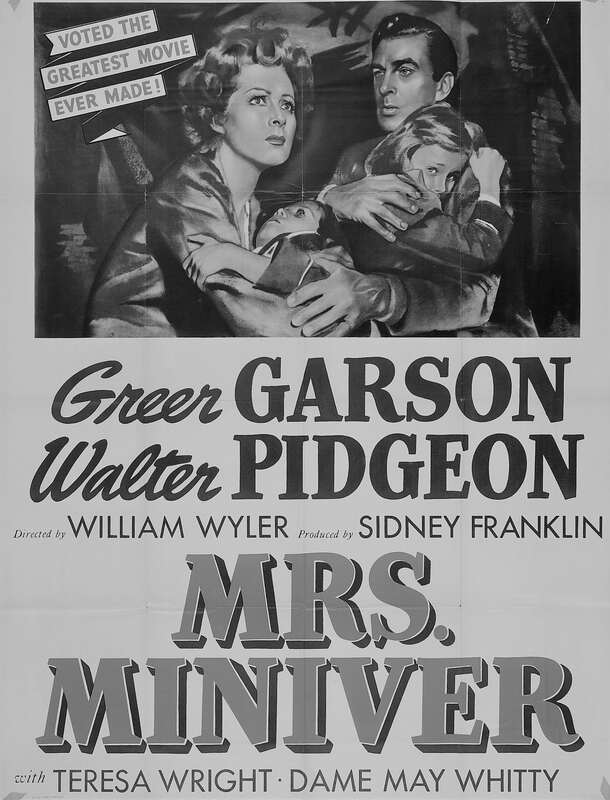 MRS. MINIVER (1942)
MRS. MINIVER (1942) (134 Min.) Genre: 1940 DRAMA, Transfer Quality: A
As Academy Award-winning films go, Mrs. Miniver has not weathered the years all that well. This prettified, idealized view of the upper-class British home front during World War II sometimes seems over-calculated and contrived when seen today. In particular, Greer Garson's Oscar-winning performance in the title role often comes off as artificial, especially when she nobly tends her rose garden while her stalwart husband (Walter Pidgeon) participates in the evacuation at Dunkirk. However, even if the film has lost a good portion of its ability to move and inspire audiences, it is easy to see why it was so popular in 1942-and why Winston Churchill was moved to comment that its propaganda value was worth a dozen battleships. Everyone in the audience-even English audiences, closer to the events depicted in the film than American filmgoers-liked to believe that he or she was capable of behaving with as much grace under pressure as the Miniver family. The film's setpieces-the Minivers huddling in their bomb shelter during a Luftwaffe attack, Mrs. Miniver confronting a downed Nazi paratrooper in her kitchen, an annual flower show being staged despite the exigencies of bombing raids, cleric Henry Wilcoxon's climactic call to arms from the pulpit of his ruined church-are masterfully staged and acted, allowing one to ever so briefly forget that this is, after all, slick propagandizing. In addition to Best Picture and Best Actress, Mrs. Miniver garnered Oscars for best supporting actress (Teresa Wright), best director (William Wyler), best script (Arthur Wimperis, George Froschel, James Hilton, Claudine West), best cinematography (Joseph Ruttenberg) and best producer (Sidney Franklin). Sidebar: Richard Ney, who plays Greer Garson's son, later married the actress-and still later became a successful Wall Street financier. Mrs. Miniver was followed by a 1951 sequel, The Miniver Story, but without the wartime setting the bloom was off the rose. — Hal Erickson
Starring: Greer Garson, Walter Pidgeon, Teresa Wright, Dame May Whitty | Directed by: William Wyler
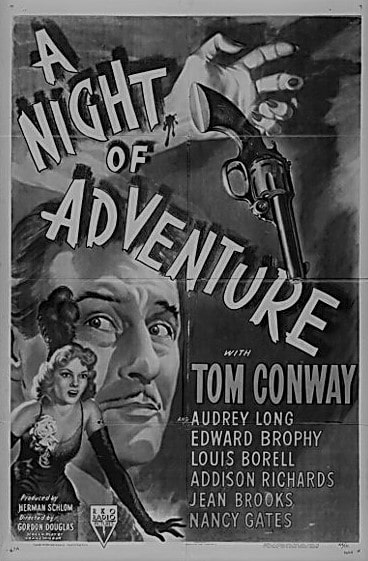 NIGHT OF ADVENTURE, A (1944)
NIGHT OF ADVENTURE, A (1944) (65 Min.) Genre: 1940 DRAMA, Transfer Quality: A
In this drama, a remake of Hat, Coat and Glove (1934), a hard working attorney is upset when he learns that his long-suffering, neglected wife is having an affair with an accused murderer. This does not prevent the highly principled lawyer from representing the man and his wife in court. Not only does he get them acquitted, he also manages to keep the whole mess out of the newspaper. — Sandra Brennan
Starring: Tom Conway, Audrey Long, Edward S. Brophy, Louis Borell | Directed by: Gordon M. Douglas
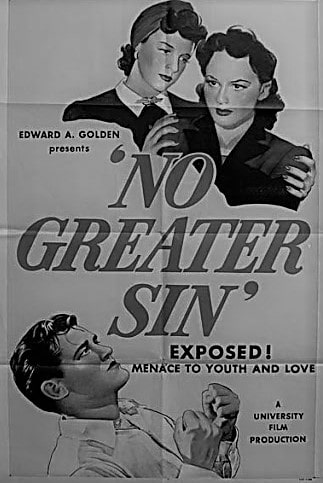 NO GREATER SIN (1941)
NO GREATER SIN (1941) (85 Min.) Genre: 1940 DRAMA, Transfer Quality: B
The dangers of the dread venereal disease syphilis are depicted in this earnest drama from the 1940s. The story centers upon an intrepid health commissioner who is out to get rid of the tawdry hookers responsible for spreading the disease. He is assisted by a reporter. In a different subplot a young philanderer contracts the disease and gives it to his pregnant wife. Later a rotten doctor claims that he is cured, but it is not so and the young man returns, picks a fight, and accidentally kills the doctor. Later the young fellow is persuaded into giving his reasons for the killing; he does, and his name is cleared. At the same time, the reporter and health commissioner have fallen in love, and the town council finally gives the go ahead for the commissioner to clean up the streets.
Starring: Leon Ames, Luana Walters, John Gallaudet, Adele Pearce [Pamela Blake] | Directed by: William Nigh
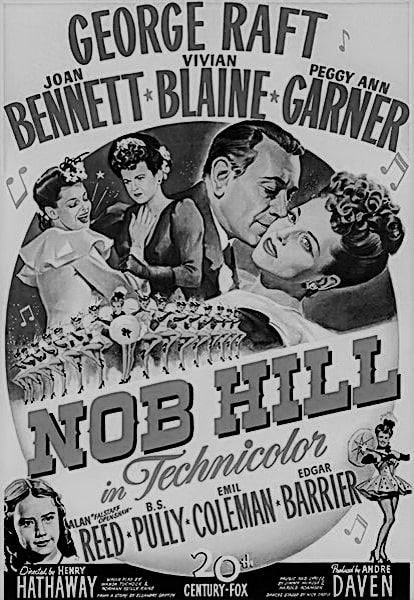 NOB HILL (1945)
NOB HILL (1945) (95 Min.) Genre: 1940 DRAMA, Transfer Quality: B
The bland performance of star George Raft is the only drawback of this splashy 20th Century-Fox musical. Set in turn-of-the-century San Francisco, the film casts Raft as Barbary Coast saloonkeeper Tony Angel, who endears himself to patrons and pedestrians alike by tossing out silver dollars at the slightest provocation. Though Tony is loved by saloon singer Sally Templeton (Vivian Blaine), he only has eyes for Nob Hill socialite Harriet Carruthers (Joan Bennett). Upon marrying Harriet, Tony realizes he is sorely outclassed, and turns to the bottle as the result. It's up to "Little Miss Fixit" Katie Flanagan (Peggy Ann Garner) to bring Tony and Sally back together. Ample comedy relief is provided by Alan Reed and B. S. Pully, while the largely uncredited supporting cast includes such familiar faces as J. Farrell McDonald, Nestor Paiva, Bud Jamieson, and Frank McCown, who rose to fame under the new moniker of Rory Calhoun.
Starring: George Raft, Joan Bennett, Vivian Blaine, Peggy Ann Garner, Rory Calhoun | Directed by: Henry Hathaway
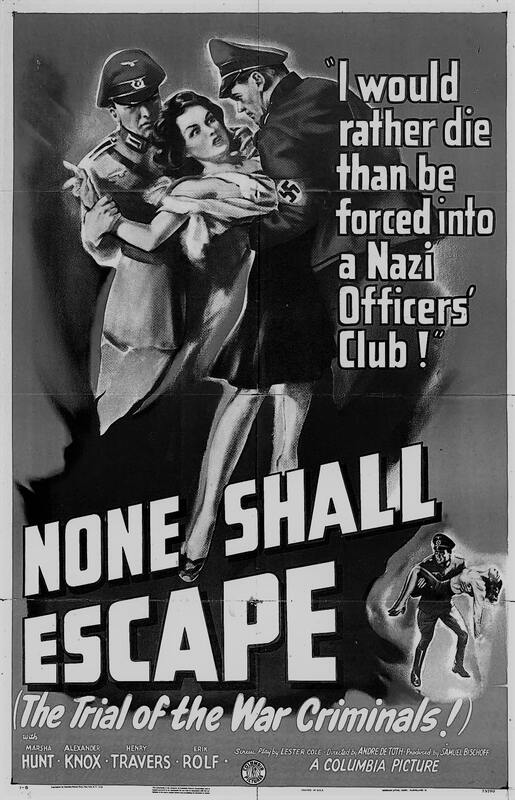 NONE SHALL ESCAPE (1944)
NONE SHALL ESCAPE (1944) (85 Min.) Genre: 1940 DRAMA, Transfer Quality: A
In this drama, a crippled German veteran of WW I attempts to reconcile his recent experiences with his former ideologies in this drama. After the war he goes back to his hometown on the German-Polish border to his old teaching job. Time passes and he becomes increasingly cynical and bitter; he then finds himself increasingly drawn to dark, oppressive ideologies that cause his fiancee to abandon him. He then rapes a female student and finds himself thrown out of his village. It is not long before he joins the Nazi party where he quickly rises in the ranks. By the time he returns to his village, he has become a terrifying Nazi commandant.
Starring: Marsha Hunt, Alexander Knox, Henry Travers, Erik Rolf | Directed by: André De Toth
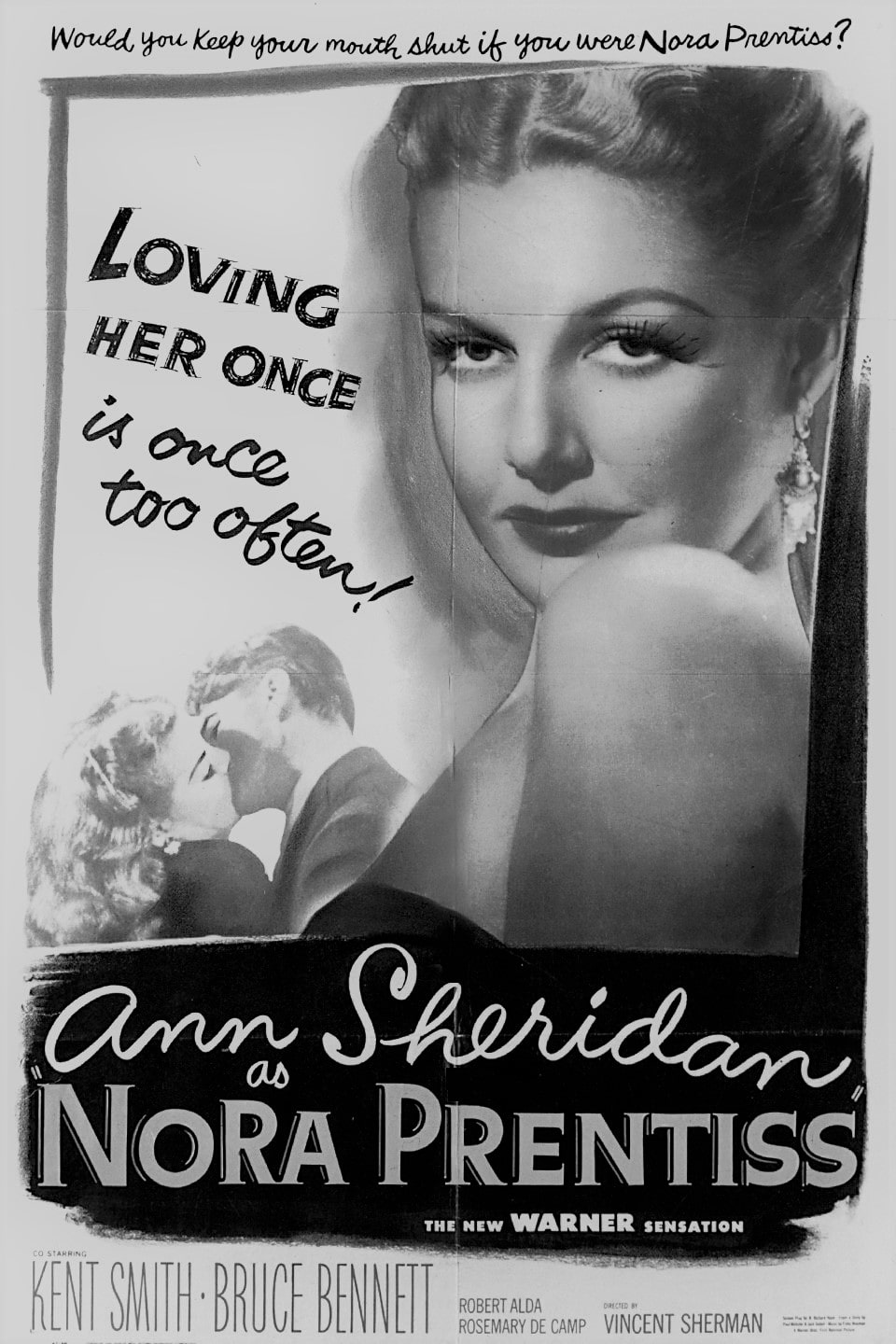 NORA PRENTISS (1947)
NORA PRENTISS (1947) (111 Min.) Genre: 1940 DRAMA, Transfer Quality: A
In this slick melodrama, a sort of film-noir for women, a nightclub singer has an affair with an unhappily married San Francisco doctor. Though the physician desperately wants to leave his wife, he lacks the courage to ask for a divorce. In retaliation, the singer accepts an offer to move East and start up a new club in New York. Lost without the singer, the doctor is without option until his partner suddenly dies. With a burst of inspiration, he fakes his own death and flees to New York. Later, he is horrified to learn that his death has been officially declared a homicide, and so he goes into hiding in the singer's apartment. To cope with his fear and the increasing success of his lover, the physician begins drinking heavily. This only makes him paranoid and more depressed and he begins to suspect his lover is having an affair. Upon confronting the "lover," a fight ensues, the doctor wins, and thinking he killed his rival, he takes off — only to end up in a horrible traffic accident that leaves his face unrecognizable. Though plastic surgery gives him a new identity, it is at that time that he is arrested and sent back to California to stand trial for his own murder. Rather than burden his family with the shock that he is still alive, the doctor insists that his lover keep mum, and he stoically goes to trial where he is sentenced to Death Row. Beautifully photographed by James Wong Howe in typically expressionistic style, the film focuses on the desperation and entrapment of the characters and expresses a true bleak, fatalistic film-noir sensibility which makes this film unique in the genre. — Sandra Brennan
Starring: Ann Sheridan, Kent Smith, Bruce Bennett, Robert Alda | Directed by: Vincent Sherman
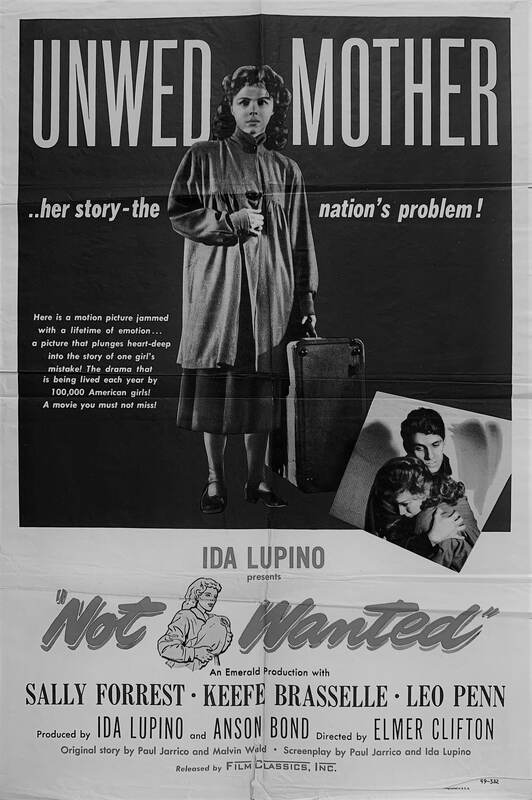 NOT WANTED (1949)
NOT WANTED (1949) (91 Min.) Genre: 1940 DRAMA, Transfer Quality: B
(AKA: Streets of Sin) First love leads to unexpected responsibilities and difficult decisions in this well-crafted drama. Sally Kelton (Sally Forrest) is a free-spirited young woman who is chafing at the restrictions of living at home with her folks and wants to make something of herself. One evening after work, she stops for a drink with some friends and meets Steve Ryan (Leo Penn), a charming but cynical piano player. Sally falls for Steve in a big way and they embark on a brief romance, but Steve regards Sally as a passing fancy and soon moves on to another town. While Sally follows him, Steve makes it clear things are over between them and he takes a gig in South America. Heartbroken Sally takes a new job at a filling station and general store run by Drew Baxter (Keefe Brasselle), a war veteran with a bad leg and a serious crush on Sally. Sally is still getting over Steve and isn't interested in Drew when she learns that she's carrying Steve's child. The disgraced Sally decides to give her child up for adoption, but finds her maternal instincts are stronger than she expected and her desire to have her baby back leads her on a desperate and dangerous path. While Streets of Sin (aka Not Wanted) is credited to director Elmer Clifton, most of the picture was actually shot under the aegis of co-producer Ida Lupino after Clifton fell ill during production; it was the actress' first film as a director. In the '60s, Streets of Sin was reissued as The Wrong Rut, with the addition of footage of a Caesarian birth "borrowed" from an educational film, and booked into drive-ins and grindhouses on the exploitation circuit.
Starring: Sally Forrest, Keefe Brasselle, Leo Penn, Dorothy Adams, Rita Lupino | Directed by: Elmer Clifton / Ida Lupino
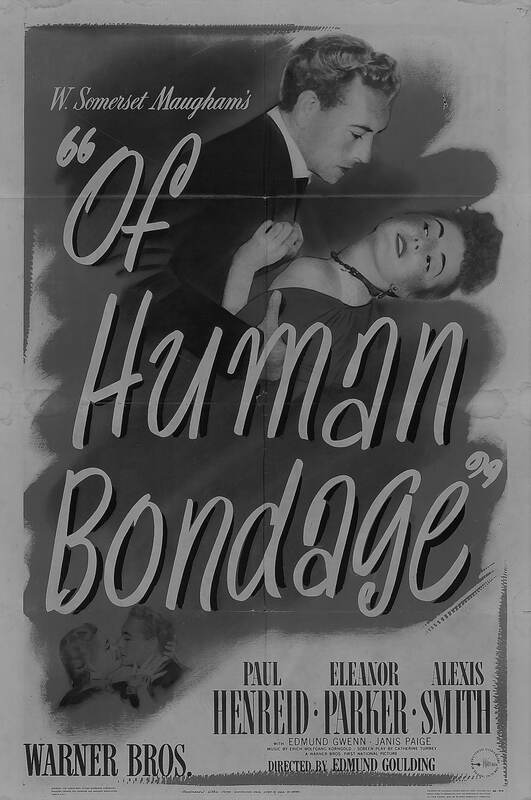 OF HUMAN BONDAGE (1946)
OF HUMAN BONDAGE (1946) (105 Min.) Genre: 1940 DRAMA, Transfer Quality: A
This second film version of Somerset Maugham's classic novel stars Paul Henreid as a clubfooted, introverted medical student--an Englishman in the novel, but not in the hands of the mittel-European Mr. Henried. Eleanor Parker is featured as Mildred, the vulgar, brassy cockney waitress in whom Henreid is foolishly enamored. The role of Mildred had made Bette Davis a star in the 1934 version of Bondage; the magic didn't happen for poor Ms. Parker, who'd spend several years in variable parts before achieving full stardom. The subject matter of the original Maugham novel, which explored how sexual obsession can ruin an otherwise rational man, was missing in the 1946 version thanks to timorous studio censors. To quote Alexis Smith, who played the second female lead, "The remake of Of Human Bondage shouldn't have been made." This 1946 version would disappear completely from view upon the occasion of the third filmization of Of Human Bondage in 1964, wherein Kim Novak was pathetically miscast as Mildred.
Starring: Eleanor Parker, Paul Henreid, Alexis Smith, Edmund Gwenn, Janis Paige, Patric Knowles | Directed by: Edmund Goulding
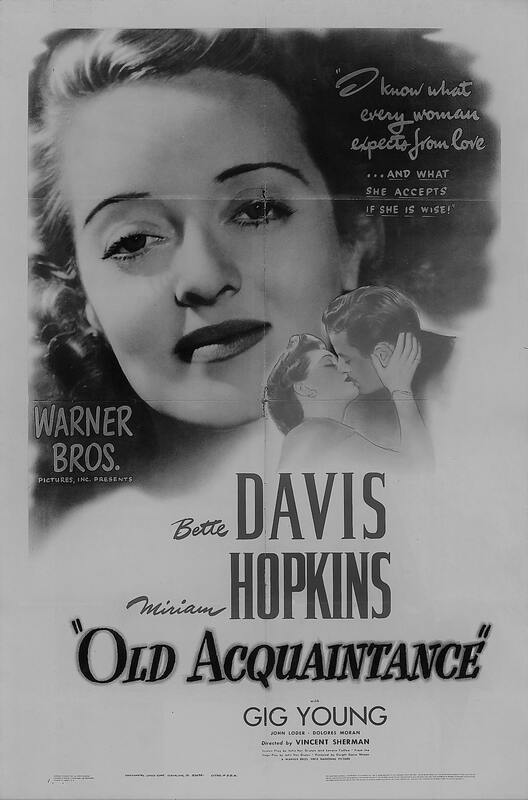 OLD ACQUAINTANCE (1943)
OLD ACQUAINTANCE (1943) (110 Min.) Genre: 1940 DRAMA, Transfer Quality: A
After the box office success of The Old Maid, Bette Davis and Miriam Hopkins were reunited for this catty drama. Kitty Marlowe (Davis) is a well-respected author who returns to the small town of her birth, where she becomes reacquainted with her childhood friend Millie Drake (Hopkins). While Millie is happy as a wife and mother and loves her husband Preston (John Loder), she's envious of Kitty's success, and Kitty's visit prompts Millie to sit down at the typewriter herself. Millie turns out a sexy potboiler that, with Kitty's help, attracts the attention of a publisher. To the surprise of them both, Millie's book is a runaway bestseller, and a decade later she's one of the most successful authors in America, easily eclipsing Kitty's more highbrow work. Preston finds himself growing disenchanted with Millie once success begins to go to her head, and he finds himself attracted to Kitty; while Kitty tries to dissuade Preston's advances, a scorned Millie believes that her old friend has been trying to steal her husband away from her. Old Acquaintance was remade in 1981 as Rich and Famous.
Starring: Bette Davis, Miriam Hopkins, Gig Young, John Loder, Ann Doran | Directed by: Vincent Sherman
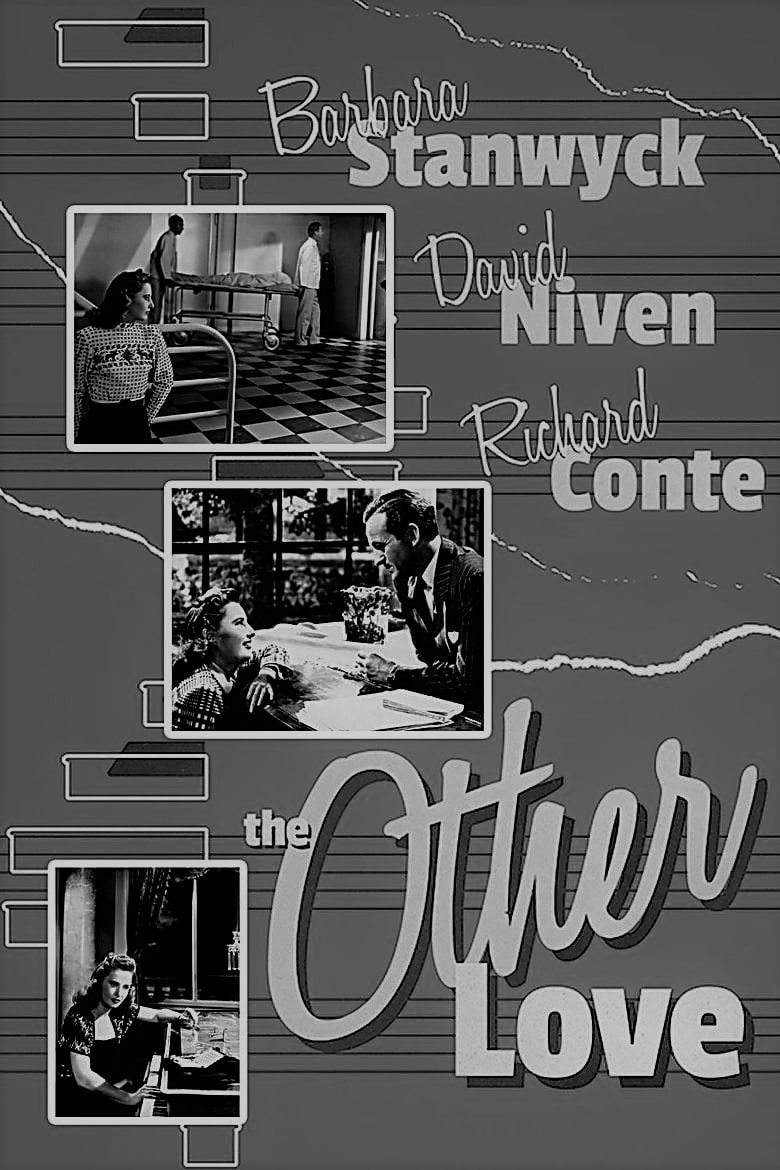 OTHER LOVE, THE (1947)
OTHER LOVE, THE (1947) (95 Min.) Genre: 1940 DRAMA, Transfer Quality: B
Barbara Stanwyck headlines this romantic tearjerker as a free-spirited concert pianist dying of tuberculosis. She checks into a posh Alpine sanitarium and there falls in love with her suave and gentle doctor (David Niven). The poor physician has his hands full trying to keep the energetic Stanwyck quiet so her body can rest. She tries, but when the fellow patient she befriended dies, she becomes afraid of her own death and flees to have a crazy affair with a race car driver. Together they tear across Europe until she becomes weak and must return to the sanitarium for the tragic conclusion.
Starring: Barbara Stanwyck, David Niven, Maria Palmer, Joan Lorring, Richard Conte, Gilbert Roland | Directed by: André De Toth
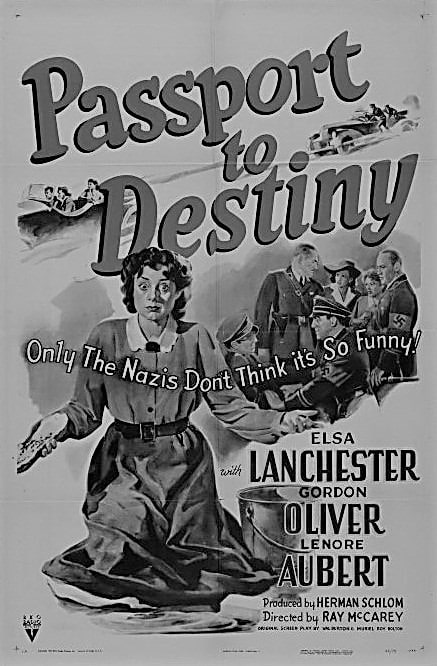 PASSPORT TO DESTINY (1944)
PASSPORT TO DESTINY (1944) (65 Min.) Genre: 1940 DRAMA, Transfer Quality: B
Originally titled Passport to Destiny, RKO's Passport to Adventure manages to be both whimsical and melodramatic all at once. Elsa Lanchester stars as a Cockney charwoman who sneaks into wartime Berlin, fully intending to kill Adolf Hitler. Lanchester is convinced that a snake-eyed charm left to her by her late military-officer husband will protect her from harm-and, given the ease with which she obtains a domestic job in the Berlin chancellory by posing as a deaf-mute, who's to say that the charm doesn't work? Once the Nazis catch on to Lanchester's mission, she is rescued by German officer Gordon Oliver, who happens to be a member of the underground resistance. One of the best bits in Passport to Adventure occurs at the beginning, when Elsa Lanchester gazes reverently upon a photo of her dear departed husband-whom we immediately recognize as Lanchester's real-life hubby Charles Laughton.
Starring: Elsa Lanchester, Gordon Oliver, Lenore Aubert, Lionel Royce | Directed by: Ray McCarey
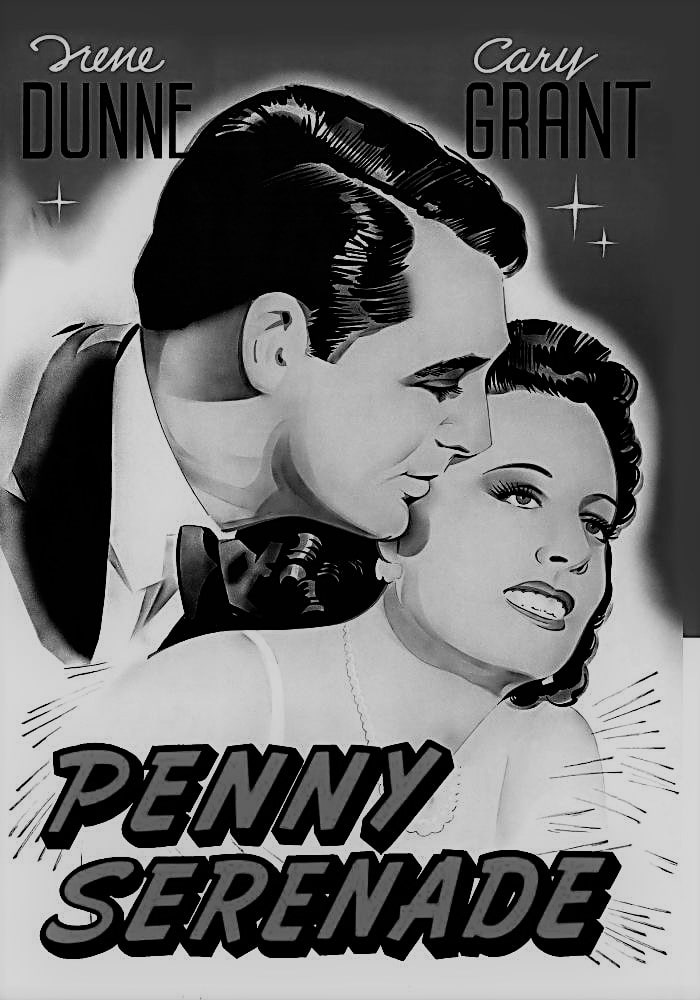 PENNY SERENADE (1941)
PENNY SERENADE (1941) (125 Min.) Genre: 1940 DRAMA, Transfer Quality: A
While listening to a recording of "Penny Serenade", Irene Dunne begins reflecting on her past. She recalls her near-impulsive marriage to newspaper reporter Cary Grant, which begins on a deliriously happy note but which turns out to be fraught with tragedy. While honeymooning in Japan, Dunne and Grant are trapped in the 1923 earthquake, which results in her miscarriage and subsequent incapability to bear children. Upon their return to America, Grant becomes editor of a small-town newspaper, just scraping by financially. Despite their depleted resources, Dunne and Grant want desperately to adopt a child. It seems hopeless until kindly adoptation agency head Beulah Bondi helps smooth their path. Alas, their happiness is once more shortlived: their new daughter, Eva Lee Kuney, succumbs to a sudden illness at the age of 6. Reduced to hopelessness, Dunne and Grant decide to dissolve their marriage, but Bondi once more comes to the rescue. Sentimental in the extreme, Penny Serenade is also enormously effective, balancing moments of heartbreaking pathos with uproarious laughter. Only director George Stevens could have handled a scene with a copiously weeping Cary Grant without inducing discomfort or embarrassment in the audience. Since lapsing into public domain in 1968 (though released by Columbia, the film was owned by Stevens' production firm), Penny Serenade has become almost as ubiquitous a cable-TV presence as It's a Wonderful Life. — Hal Erickson
Starring: Cary Grant, Irene Dunne, Beulah Bondi, Edgar Buchanan | Directed by: George Stevens
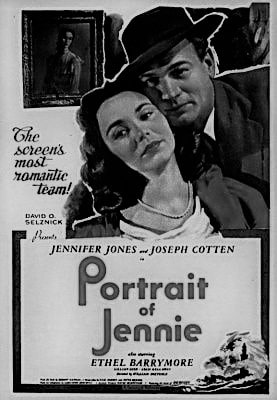 PORTRAIT OF JENNIE (1948)
PORTRAIT OF JENNIE (1948) (86 Min.) Genre: 1940 DRAMA, Transfer Quality: A
Joseph Cotten plays an artist who is unable to bring any true feeling to his work. While painting in Central Park one morning, Cotten makes the acquaintance of a schoolgirl named Jennie (Jennifer Jones), who prattles on about things that happened years ago. Intrigued at her thorough knowledge of the past, Cotten is about to converse with her further, but Jennie has vanished. Over the next few months Cotten meets Jennie again and again-and each time she seems to have aged by several years. He paints her portrait, which turns out to be more full of expression and emotion than anything he's previously done. His curiosity peaked by Jennie's enigmatic nature, Cotten uncovers evidence that he has been conversing—and falling in love—with the ghost of a girl who died years earlier in a hurricane. On the eve of the hurricane's anniversary, Cotten rushes to meet Jennie at the site where she was supposedly killed. As a new storm rages, Jennie vanishes for good, but not before declaring that the love she and Cotten have shared will live forever. Rescued from the storm, Cotten convinces himself that Jennie was a mere figment of his imagination. Then he notices that he stills clutches her scarf in his hand. He looks at his portrait of Jennie (the only Technicolor shot in this otherwise black-and-white film) and understands what she meant when she said that their love would endure throughout eternity: it will do so through Cotten's art, both the portrait at hand and all future portraits. Based on the novel by Robert Nathan, Portrait of Jennie is one of the most beautifully assembled fantasies ever presented on screen. Producer David O. Selznick's unerring eye for "rightness" enabled him to select the perfect stars, supporting cast (Lillian Gish, Ethel Barrymore, David Wayne, Cecil Kellaway et. al.), director, cinematographer (Joseph August) and composer (Dmitri Tiomkin, who based his themes on the works of Debussy), and blend everything into one ideally balanced package. — Hal Erickson
Starring: Joseph Cotton, Jennifer Jones, Ethel Barrymore, David Wayne | Directed by: William Dieterle
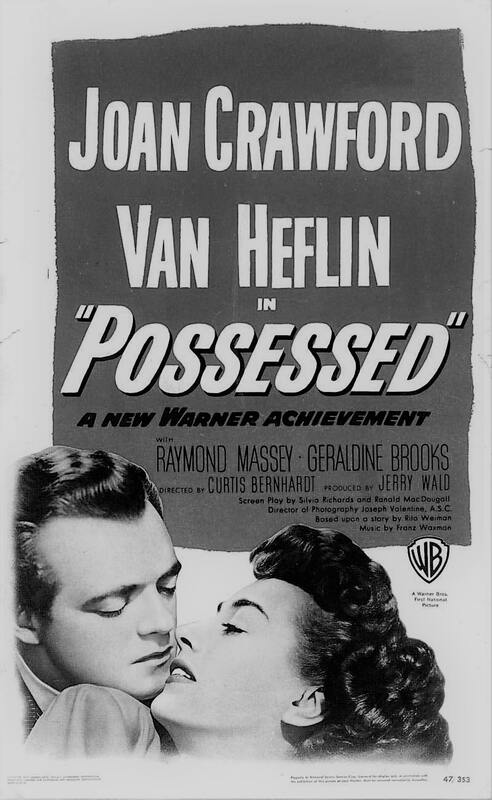 POSSESSED (1947)
POSSESSED (1947) (108 Min.) Genre: 1940 DRAMA, Transfer Quality: A
We first meet Joan Crawford, star of the moody flashbackfest Possessed, wandering aimlessly through the city streets, moaning "David....David." She goes to pieces in public and is rushed to the mental ward, where a team of psychiatrists try to find out who she is and where she's been. Who she is is a practical nurse, hired by Raymond Massey to care for Massey's invalid wife. While going about her duties, Crawford renews her acquaintance with an old flame, architect Van Heflin. Though Heflin is indifferent, Crawford is still crazy for the man. She remains so even after marrying her employer Massey, whose wife has committed suicide. Any further details would give away the ending, but we can note that Van Heflin's character name is David. Best scene: Crawford, descending into schizophrenia, imagining that she's killed Massey's vitriolic daughter Geraldine Brooks. While the psycho-babble delivered in the asylum scenes is laughable, Possessed still holds up well as one of the best of Joan Crawford's Warner Bros. soap operas. This black-and-white film is also available in a colorized version, but don't blame us. — Hal Erickson
Starring: Joan Crawford, Van Heflin, Raymond Massey, Griff Barnett | Directed by: Curtis Bernhardt
 RAGE IN HEAVEN (1941)
RAGE IN HEAVEN (1941) (83 Min.) Genre: 1940 DRAMA, Transfer Quality: A
A Rage in Heaven was based on a novel by James Hilton, who thanks to Lost Horizon and Goodbye Mr. Chips was a "hot property" in 1941. Going through many of the same paces he'd trod in Night Must Fall, Robert Montgomery stars as British steel mill owner Philip Monrell, whose outward charm and insouciance disguises the fact that he suffers from hereditary insanity. Throughout his life, Monrell has successfully sidestepped responsibility by hiding behind the accomplishments of his best friend, Ward Andrews (George Sanders). When he marries Stella Bergen (Ingrid Bergman), his mother's pretty travelling companion, the neurotic Monrell becomes obsessed with the belief that Andrews is trying to steal Stella away from him-and thanks to his paranoia, Andrews and Stella do indeed fall in love. Unsuccessful in his efforts to murder Andrews, Monrell decides to exact a bizarre revenge by committing suicide and planting enough clues so that Andrews will be charged with his murder! Though absent from the final half-hour of A Rage in Heaven, Robert Montgomery continues to dominate the proceedings; indeed, for a while it looks as though he will "win" in the end after all. Making her third Hollywood film appearance, Ingrid Bergman felt that the role of Stella Bergen was inadequately suited to her and did her best to drop out of the picture; reportedly, she was mollified when MGM promised to let her play against type as the "bad" girl in Dr. Jekyll and Mr. Hyde. — Hal Erickson
Starring: Robert Montgomery, Ingrid Bergman, George Sanders, Lucile Watson | Directed by: W.S. Van Dyke
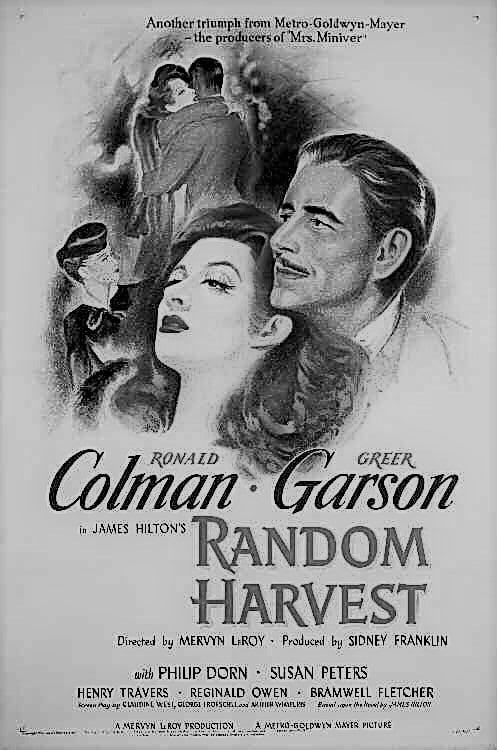 RANDOM HARVEST (1942)
RANDOM HARVEST (1942) (126 Min.) Genre: 1940 DRAMA, Transfer Quality: A
At the close of World War I, shell-shocked amnesia victim Ronald Colman is sequestered in a London sanitarium; with no identity and no next of kin, he has nowhere else to go. Unable to stand the loneliness, Colman wanders into the streets, then stumbles into a music hall, where he is befriended by good-natured entertainer Greer Garson. That Colman and Garson fall in love and marry should surprise no one; what is surprising, at least to Colman, is that he discovers that he has a talent for writing. Three years pass: while in Liverpool to sell one of his stories, Colman is struck down by a speeding car. When he comes to, he has gained full memory of his true identity; alas, he has completely forgotten both Garson and their child. Returning to his well-to-do relatives, Colman takes over the family business. Having lost her child, the distraught Garson seeks out the missing Colman. Psychiatrist Philip Dorn helps Garson, advising her that to reveal her identity may prove a fatal shock for her husband. To stay near him all the same, Garson takes a job as Colman's secretary. "Strangely" attracted to Garson, Colman falls in love with her all over again. Will there be yet another memory lapse? Under normal circumstances, we wouldn't believe a minute of Random Harvest, but the magic spell woven by the stars and by author James Hilton (Lost Horizon, Goodbye Mr. Chips etc.) transforms the wildly incredible into the wholly credible (just one quibble: isn't Colman a bit long in tooth as a "young" World War I veteran?) The film was one of MGM's biggest hits in 1942—indeed, one of the biggest in the studio's history.
Starring: Ronald Colman, Greer Garson, Philip Dorn, Susan Peters, Reginald Owen | Directed by: Mervyn LeRoy
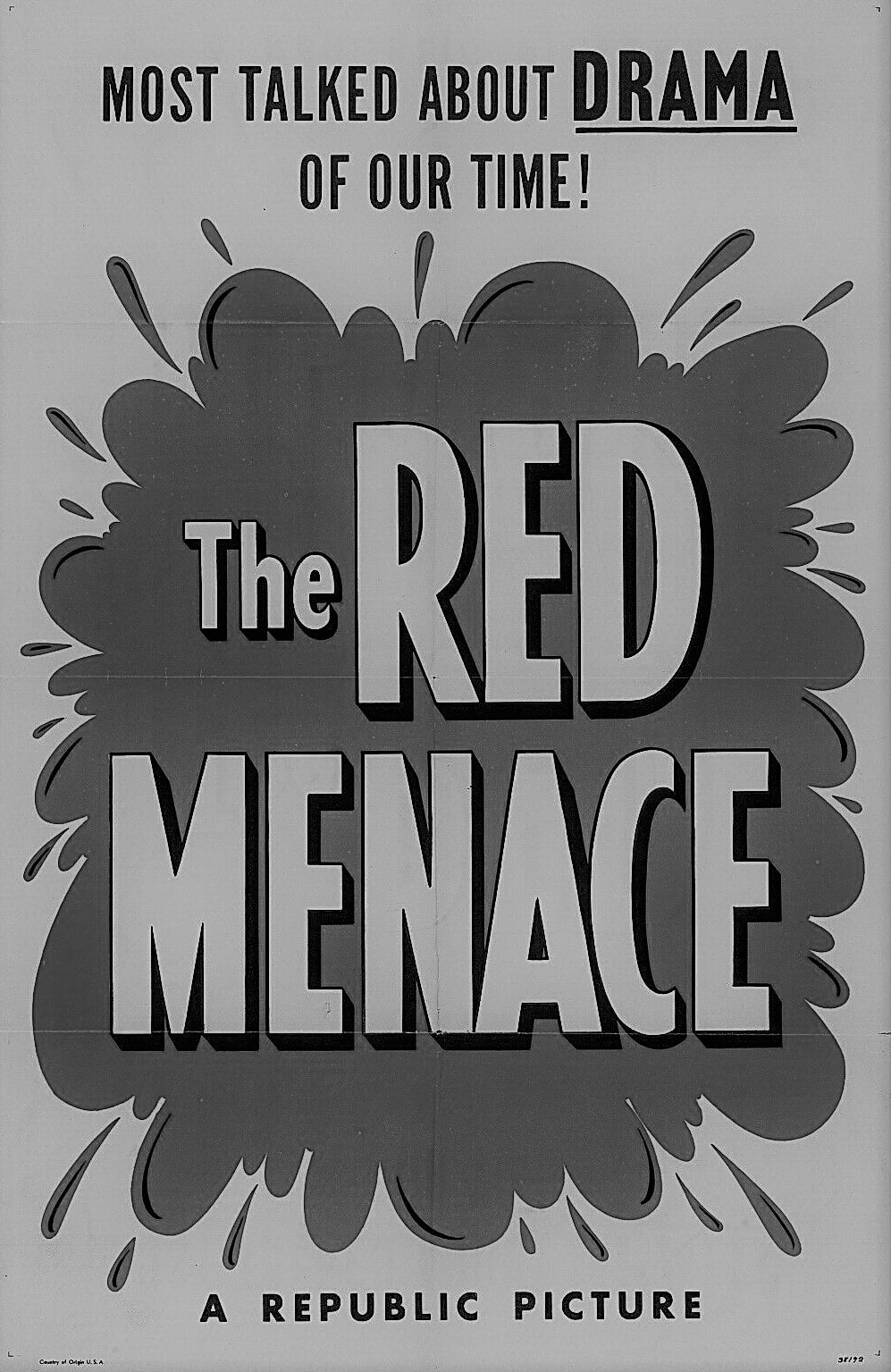 RED MENACE, THE (1949)
RED MENACE, THE (1949) (87 Min.) Genre: 1950 DRAMA, Transfer Quality: B
One of the most famous of the anti-communist tracts of the late 1940s, Republic's The Red Menace plays like a merciless lampoon of the genre when seen today. After a portentous introduction by one Lloyd G. Davies, described as a member of the Los Angeles City Council, the film concentrates on disgruntled ex-GI Bill Jones (Robert Rockwell). Having been victimized by crooked real estate agents, Jones turns to the government for help, only to come away empty-handed and mad as a wet hen. Obviously, the susceptible Jones is ripe for plucking by the American Communist Party. Using slogans, bribes and even sex to recruit disenfranchised souls like Jones, the dirty Reds hope to spread their poison to the entire U.S. of A. Fortunately, Jones and another commie dupe, schoolteacher Nina Petrovka (Hanne Axman), smarten up just in time. The HUAC and Joe McCarthy needn't have searched so diligently for subversives: according to The Red Menace, all they would have had to do was arrest anyone wearing a baggy suit or sporting a bad haircut. Some modern-day viewers begin laughing the moment the opening title of Red Menace, wherein an animated octopus wraps its tentacles around the Free World, fades into view.
Starring: Robert Rockwell, Hannelore Axman, Shepard Menken, Barbara Fuller | Directed by: R. G. Springsteen
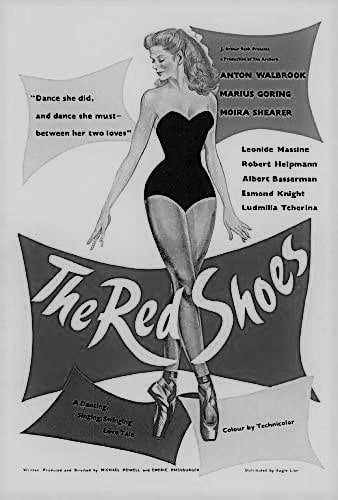 RED SHOES, THE (1948)
RED SHOES, THE (1948) (136 Min.) Genre: 1940 DRAMA, Transfer Quality: A
Michael Powell and Emeric Pressburger's influential musical tragedy set the stage for the climactic dance ballets that became a staple of the Arthur Freed-MGM musicals (An American in Paris, Singin' in the Rain and The Band Wagon) of the early 1950s. Hans Christian Andersen's tragic fairy tale forms the basis of this film about betrayal, love and art. The story begins as struggling composer Julian Craster (Marius Goring) attends a performance of the Lermontov Ballet Company and recognizes his own score in the production of "Hearts of Fire." Julian protests to ballet company director Boris Lermontov (Anton Walbrook) about the unauthorized use of his music. Impressed by Julian's talent, Boris hires him to compose the score for his next ballet — a dance version of "The Red Shoes." Boris also hires an attractive young dancer, Victoria Page (Moira Shearer), to perform in the ballet. When the lead ballerina announces that she plans to get married, Boris, in a pique over being abandoned, casts Victoria in the starring role. As Julian works on the score and Victoria struggles to perfect her dance technique, the two fall in love. When "The Red Shoes" ballet is premiered — seen in a stunning and glorious fifteen-minute sequence — it is a raging success and it makes Victoria a star. But when Boris learns that Julian and Victoria have fallen in love, Boris, who is secretly in love with Victoria, in a fit of rage forces Julian to leave the ballet company; Victoria leaves with him. Since Boris owns the rights to "The Red Shoes" ballet, he forbids Victoria to perform the dance and she becomes unemployable. Time passes and Julian and Victoria are now happily married. Julian's compositions have made him an international success. One day, with Victoria disembarking from a train in Paris, she meets Boris, who implores her to do one performance of "The Red Shoes" in Monaco. Victoria agrees as Julian cancels an engagement in London to travel to Monte Carlo in order to convince his wife not to perform the ballet. But Victoria goes on with the performance, with tragic results. — Paul Brenner
Starring: Anton Walbrook, Marius Goring, Moira Shearer, Albert Basserman | Directed by: Michael Powell, Emeric Pressburger
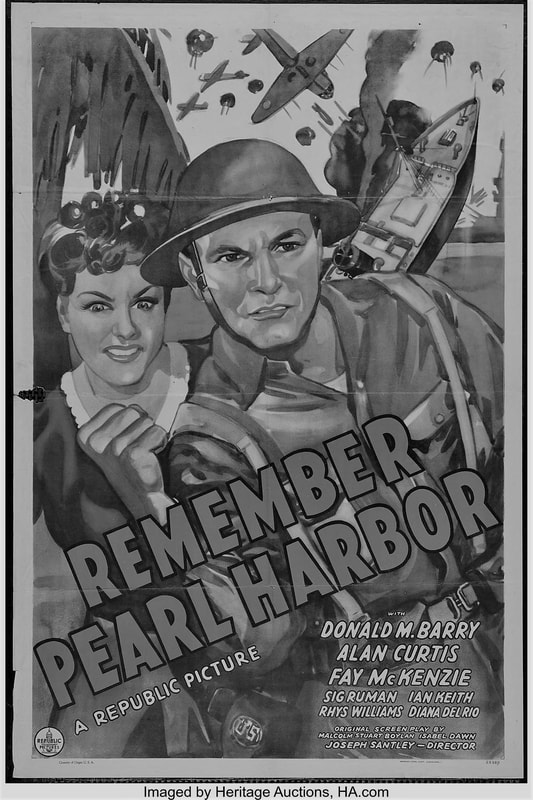 REMEMBER PEARL HARBOR (1942)
REMEMBER PEARL HARBOR (1942) (75 Min.) Genre: 1940 DRAMA, Transfer Quality: B
No sooner had the Japanese bombed Pearl Harbor on December 7, 1941 than Republic Pictures managed to register the title Remember Pearl Harbor for copyright, beating out all the "major" studios in the process. The title was far more dramatic than the film attached to it, which has something to do with pugnacious American GI Lucky Smith (a rare non-western appearance by Don \"Red\" Barry). Our hero spends the first few reels being tossed in the stockade, often accompanied by his buddies Bruce Gordon (Alan Curtis) and Portly Potter (Maynard Holmes). Shortly after the demolition of Pearl Harbor, Lucky and Bruce uncover a gang of Fifth Columnists, operating in the Philippines. Shaping up in a hurry, Lucky volunteers to lead a suicidal air mission against a Japanese troop ship, thereby redeeming himself for inadvertently causing the death of his pal Portly in an earlier scene. Under closer scrutiny, Remember Pearl Harbor turns out to be a remake of 1940's Girl from Havana, itself a remake of the 1939 Roy Rogers western Rough Riders' Roundup, which was a remake of another 1939 effort, Forged Passport, which was first filmed in 1936 as The Leathernecks Have Landed!
Starring: Don "Red" Barry, Alan Curtis, Fay McKenzie, Sig Rumann | Directed by: Joseph Santley
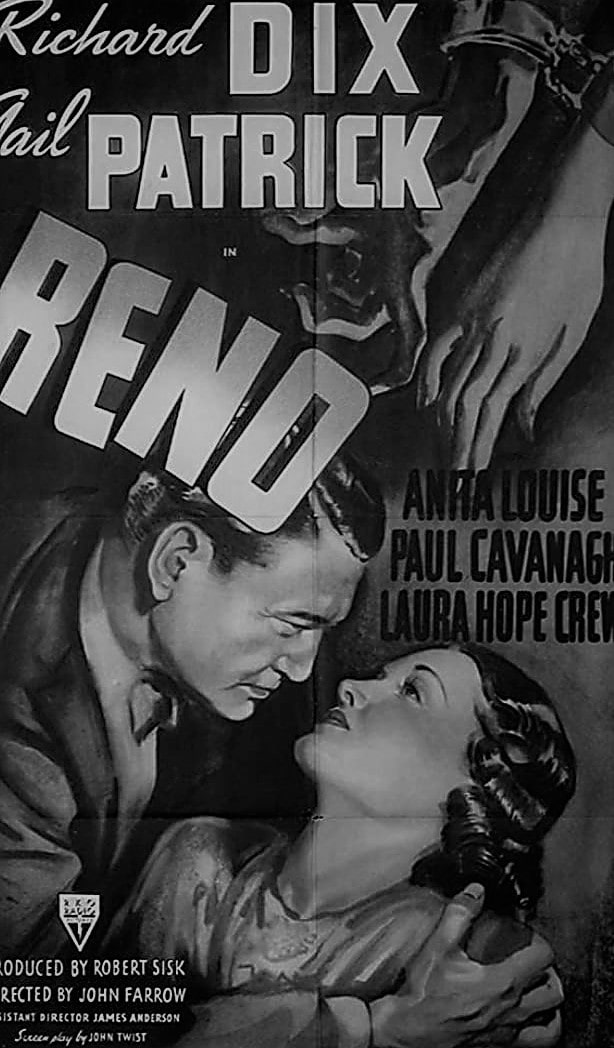 RENO (1940)
RENO (1940) (73 Min.) Genre: 1940 DRAMA, Transfer Quality: A
The rise of the popular Nevada city is chronicled in this epic drama that begins when Reno was a tiny silver-mining town and ends when it becomes a divorce center and garishly lit gambling town. The film also follows the exploits of a young attorney who comes to town to build a thriving divorce practice. He becomes so involved in his work, that he ignores his own loving wife who leaves him. As a result, the city fathers get on his case about his virtue. The lawyer is subsequently disbarred; he then opens a gambling casino. Years pass and his estranged daughter comes to Reno for a quickie divorce. Father and daughter do not recognize each other as he tries to talk her out of the divorce. When she realizes who he is, she leaves Reno. — Sandra Brennan
Starring: Richard Dix, Gail Patrick, Anita Louise, Paul Cavanagh, Carole Landis | Directed by: John Farrow
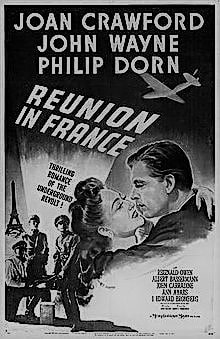 REUNION IN FRANCE (1942)
REUNION IN FRANCE (1942) (104 Min.) Genre: 1940 DRAMA, Transfer Quality: A
Better known as Reunion in France, this women's-magazine-style romantic melodrama was the first major production for director Jules Dassin — who was promptly demoted back to the MGM "B" department when the picture tanked at the box office. Joan Crawford stars as Frenchwoman Michele de la Becque, who comes to believe that her fiancé, wealthy munitions manufacturer Robert Cortot (Philip Dorn) is a Nazi collaborator. When her suspicions are apparently corroborated, Michelle falls in love with Pat Talbot (John Wayne), a downed American aviator stranded in occupied Paris. Only then does Michelle discover that she's been all wrong about Cortot — but what to do about Talbot, who has been marked for death by the Gestapo? Ava Gardner has a tiny role as a Parisian shopgirl.
Starring: Joan Crawford, John Wayne, Philip Dorn, Reginald Owen, John Carradine | Directed by: Jules Dassin
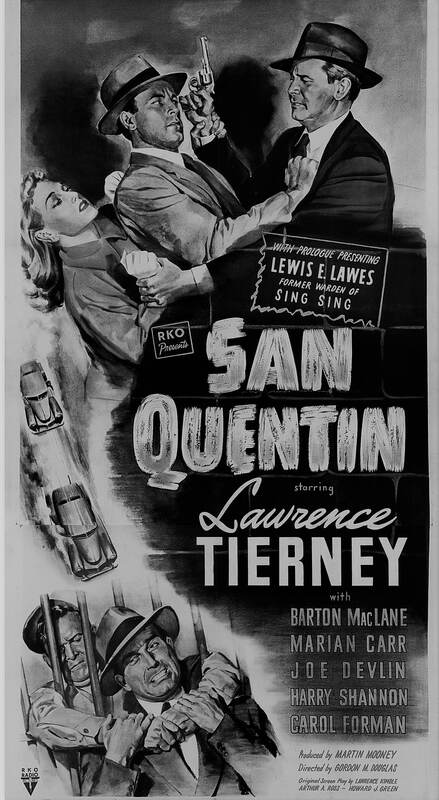 SAN QUENTIN (1946)
SAN QUENTIN (1946) (66 Min.) Genre: 1940 DRAMA, Transfer Quality: A
This prison reform-minded melodrama from B-movie director Gordon Douglas opens with an introduction from Lewis F. Lawes, the real-life prison warden turned author of 20,000 Years in Sing Sing (1932). Lawrence Tierney stars as Jim Roland, one of the founding members of the Inmate's Welfare League, a prisoners' rehabilitation group operating inside the California state prison San Quentin. The League keeps internal peace at the prison and helps career criminals go straight, training them for a law-abiding life on the outside. Upon his parole, Jim became one of the program's first success stories, but the same can't be said for Nick Taylor (Barton McLane). Once a model prisoner, Taylor has broken out of the facility and gone on a violent crime spree. When San Quentin officials, including Warden Kelly (Harry T. Shannon), consider shutting down the program, the membership feels responsible and appeals to Jim for help. The ex-con, now a responsible citizen, sets out to bring Taylor to justice and save the League, putting his own life at risk. Douglas employs a brisk pace in San Quentin (1946), which is also the feature film debut of actor Raymond Burr, who appears in the supporting role of Jeff Torrance.
Starring: Lawrence Tierney, Barton MacLane, Harry Shannon, Raymond Burr | Directed by: Gordon M. Douglas
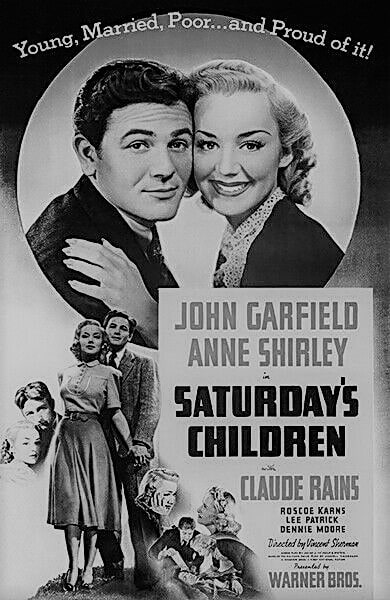 SATURDAY'S CHILDREN (1940)
SATURDAY'S CHILDREN (1940) (110 Min.) Genre: 1940 DRAMA, Transfer Quality: A
This third film version of Maxwell Anderson's play Saturday's Children stars Claude Rains as the impecunious but proud father of a large brood. Rains' daughter Anne Shirley marries idealistic John Garfield, a would-be inventor who works for Shirley's father. Feeling that he's been tricked into marriage, Garfield gives every indication of turning out to be as much "failure" as Rains. Only when Garfield and Shirley are on the verge of breaking up do they realize that material gain is not the only barometer of success in life. Previous filmizations of this story include Saturday's Children (29), starring Corinne Griffith, and Maybe It's Love (35), costarring Ross Alexander and Gloria Stuart. - Hal Erickson *** Originally a play starring Humphrey Bogart, Saturday's Children was filmed twice before this version. The Epstein Brothers have done a commendable job of adapting and improving upon the Maxwell Anderson original. While there's still a certain amount of "sudsiness" to the screenplay and dialogue, and while some of the structure is a bit too pat and schematic, the story is involving and the characters have an undeniable appeal and attraction. Vincent Sherman's direction is smooth, if a trifle slick in places, and keeps the story moving without seeming rushed and hurried. The film's biggest asset, however, is its cast. Claude Rains turns in a sterling performance, creating a sympathetic character out of the plodding and often bumbling father, and Anne Shirley (in a role turned down by Olivia de Havilland) is touching and endearing. John Garfield is especially fine, taking a character that could come across as annoying and whiny and making him likable without betraying his more unattractive qualities; his shyness in particular becomes endearing. Saturday sometimes plays rather shamelessly with the viewer's emotions, but it somehow does so in an inoffensive way. - Craig Butler
Starring: John Garfield, Claude Rains, Anne Shirlee, Roscoe Karns, George Tobias, John Ridgely | Directed by: Vincent Sherman
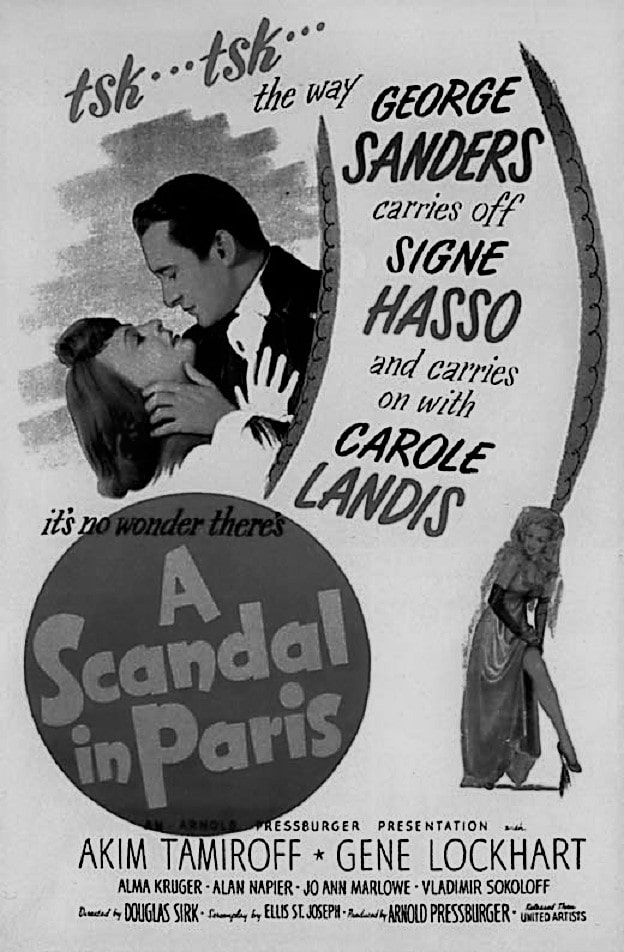 SCANDAL IN PARIS, A (1946)
SCANDAL IN PARIS, A (1946) (100 Min.) Genre: 1940 DRAMA, Transfer Quality: B
A Scandal in Paris is a liberal adaptation of the life story of Eugène François Vidocq, who was French prefect of police during the Napoleonic era. George Sanders stars as Vidocq, who spends most of the film as an aimless rogue willing to lie, cheat, and steal for his own comfort. The women who affect Vidocq's life include a saucy cabaret entertainer (Carole Landis) for whom Vidocq steals, and a good woman (Signe Hasso) for whom he straightens himself out. Fledgling director Douglas Sirk displayed his love of the Baroque (both in decor and characterizations) that would distinguish his later high-budget Universal soap operas. Most prints of A Scandal in Paris bear the film's alternate title, Thieves' Holiday.
Starring: George Sanders, Signe Hasso, Carole Landis, Akim Tamiroff, Gene Lockhart | Directed by: Douglas Sirk
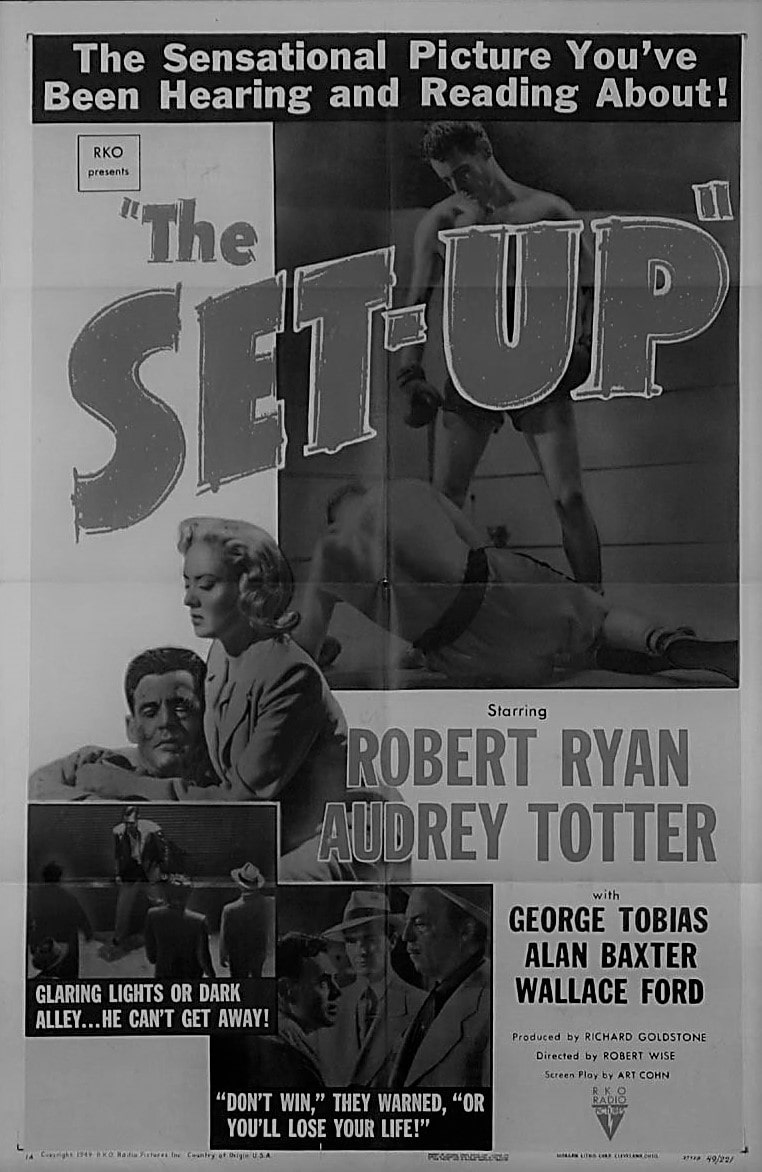 SET-UP, THE (1949)
SET-UP, THE (1949) (72 Min.) Genre: 1940 DRAMA, Transfer Quality: A
As shown by the clock face that opens and closes the film, The Set-Up takes place within a compact 72 minutes, with the action played out in "real time." Robert Ryan plays Bill "Stoker" Thompson, a washed-up boxer who refuses to give up his career despite the pleas of his wife Julie (Audrey Totter). There's little chance that he's going to win this evening's bout; still, Stoker's manager Tiny (George Tobias) has secretly made a deal with a crooked gambler (Alan Baxter). Stoker is to take a dive, a fact withheld from him until the fight is well under way. His last vestige of pride is aroused in the ring, but the story doesn't end there. The fight sequence is one of the most brutal ever filmed, with close ups of Ryan's pummeled face intercut with shots of screaming spectators in the throes of bloodlust. Adapted by Art Cohn from a narrative poem by Joseph Moncure March, The Set-Up is arguably Robert Ryan's finest starring film. — Hal Erickson
Starring: Robert Ryan, Audrey Totter, George Tobias, Alan Baxter, Wallace Ford, Helen Brown | Directed by: Robert Wise
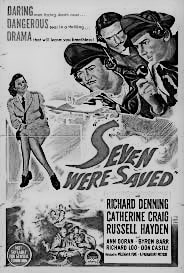 SEVEN WERE SAVED (1947)
SEVEN WERE SAVED (1947) (72 Min.) Genre: 1940 DRAMA, Transfer Quality: B
A plane crash over the Pacific leaves seven survivors stranded in a life raft in this war-time disaster movie. One of the passengers is a captured Japanese official en route to stand trial for war crimes. Two of the survivors spent time in a Japanese prison camp. Both pilots survived as did a pretty nurse. The rescue sequences are comprised of documentary footage of an actual rescue by the Air-Sea Rescue Service.
Starring: Richard Denning, Catherine Craig, Russell Hayden, Ann Doran | Directed by: William Pine
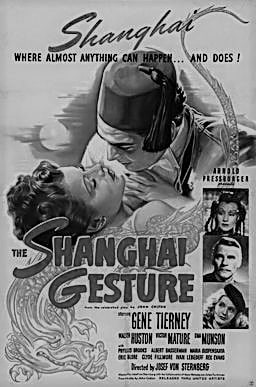 SHANGHAI GESTURE, THE (1941)
SHANGHAI GESTURE, THE (1941) (106 Min.) Genre: 1940 DRAMA, Transfer Quality: A
Josef von Sternberg made his first return to exotic Shanghai since 1932's Shanghai Express in this baroque conflagration, based on a 1925 play by John Colton that required 30 revisions before it was sufficiently sanitized to pass muster with Hays Office censors. The film takes place in the gambling den of Mother Gin Sling (Ona Munson), who finds her casino threatened with closing by stuffed shirt English financier Sir Guy Charteris (Walter Huston). Gin Sling knows that the key to keeping her casino open is to dig up some dirt on Sir Guy, and it's quick in coming. She finds that Sir Guy was compelled to leave China in a hurry some time in the past, stealing his wife's money and plotting to kill her. Sir Guy ended up abandoning his wife in China and leaving her with an infant daughter. She also finds out that Sir Guy's grown-up daughter, Poppy (Gene Tierney, is a frequent and deeply indebted guest of Gin Sling's casino. Gin Sling is now ready to blackmail Sir Guy into keeping her casino open. He tracks down his daughter and tries to convince her to leave town. But Poppy refuses to budge, having fallen in love with Doctor Omar (Victor Mature). — Paul Brenner
Starring: Gene Tierney, Walter Huston, Ona Munson, Eric Blore, Victure Mature | Directed by: Josef Von Sternberg
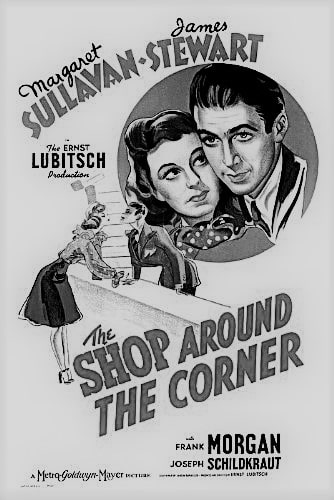 SHOP AROUND THE CORNER, THE (1940)
SHOP AROUND THE CORNER, THE (1940) (99 Min.) Genre: 1940 DRAMA, Transfer Quality: A
Shop Around the Corner is adapted from the Hungarian play by Nikolaus (Miklos) Laszlo. Budapest gift-shop clerk James Stewart and newly hired shopgirl Margaret Sullavan hate each other almost at first sight. Stewart would prefer the company of the woman with whom he is corresponding by mail but has never met. Sullavan likewise carries a torch for her male pen-pal, whom she also has never laid eyes on. It doesn't take a PhD degree to figure out that Stewart and Sullavan have been writing letters to each other. The film's many subplots are carried by Frank Morgan as the kindhearted shopkeeper and by Joseph Schildkraut as a backstabbing employee whose comeuppance is sure to result in spontaneous applause from the audience. Directed with comic delicacy by Ernst Lubitsch, this was later remade in 1949 as In the Good Old Summertime, and in 1998 as You've Got Mail. It was also musicalized as the 1963 Broadway production She Loves Me. — Hal Erickson
Starring: Margaret Sullavan, James Stewart, Frank Morgan, Joseph Schildkraut | Directed by: Ernst Lubitsch
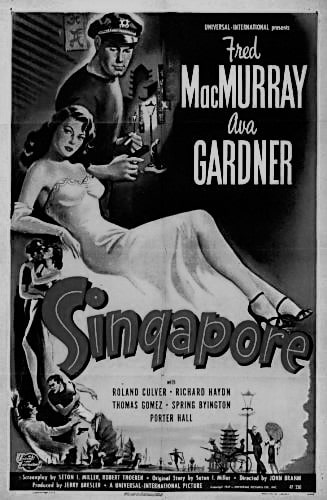 SINGAPORE (1947)
SINGAPORE (1947) (79 Min.) Genre: 1940 DRAMA, Transfer Quality: B
Returning to Singapore after a five-year absence, WWII veteran Matt Gordon (Fred MacMurray) mournfully recalls his romance with, and marriage to, a girl named Linda (Ava Gardner), whom he assumes was killed in a bombing raid on their wedding night. Resuming his prewar profession as a pearl smuggler, Matt gets mixed up with gangsters who are seeking a cache of pearls that he hid somewhere in Singapore during the war. He also meets wealthy Michael Van Leyden (Roland Culver), who is married to a woman who closely resembles the lamented Linda. In point of fact, she is Linda, but has been suffering from amnesia ever since the wartime bombing. Upon being reunited with his lost love, Matt does his best to ditch his unsavory companions and to rescue Linda from her "new" life. Clearly inspired by Casablanca, Singapore was remade as the 1957 Errol Flynn vehicle Istanbul.
Starring: Ava Gardner, Fred MacMurray, Richard Haydn, Thomas Gomez | Directed by: John Brahm
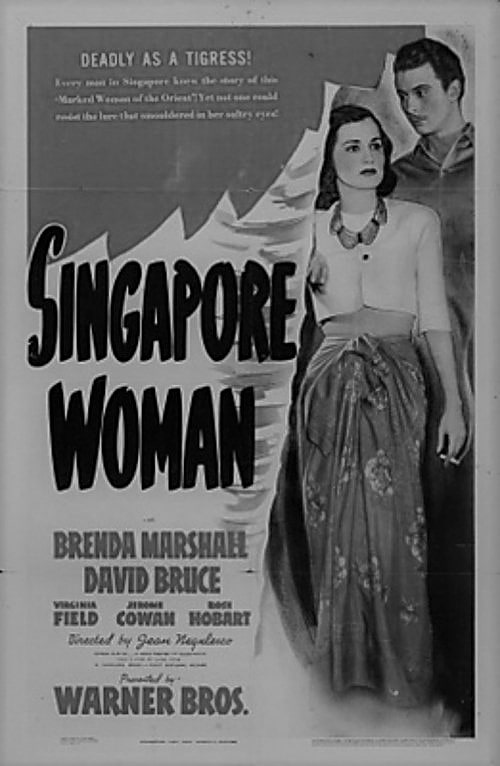 SINGAPORE WOMAN (1941)
SINGAPORE WOMAN (1941) (64 Min.) Genre: 1940 DRAMA, Transfer Quality: A
This remake of Dangerous is set in Singapore and chronicles the exploits of a woman who believes herself cursed. To recover, she is taken to the rubber plantation of a handsome young man. There she finds true happiness and love. Suddenly, her abusive ex-husband shows up. She had thought him dead, and his presence terrifies her. Fortunately an auto accident takes care of him and she can resume her happy life. — Sandra Brennan
Starring: Brenda Marshall, David Bruce, Virginia Field, Jerome Cowan, Alexis Smith | Directed by: Jean Negulesco
 SLIGHTLY DANGEROUS (1943)
SLIGHTLY DANGEROUS (1943) (94 Min.) Genre: 1940 DRAMA, Transfer Quality: A
This airy bit of MGM fluff stars Lana Turner as small-town soda clerk Peggy Evans. After telling off the self-important new drugstore manager Bob Stuart (Robert Young), Peggy, convinced that there's no future for her in her hometown, fakes her suicide and heads for the big city. After a series of dizzying comic complications, she successfully poses as the long-lost daughter of millionaire Cornelius Burden (Walter Brennan). Meanwhile, poor Bob, held responsible for Peggy's "death," comes to town determined to clear his name by exposing Peggy as an impostor. How this all works itself out is as hard to swallow as the rest of the picture, but the stars are attractive and the production values first-rate. — Hal Erickson
Starring: Lana Turner, Robert Young, Walter Brennan, Dame May Whitty | Directed by: Wesley Ruggles
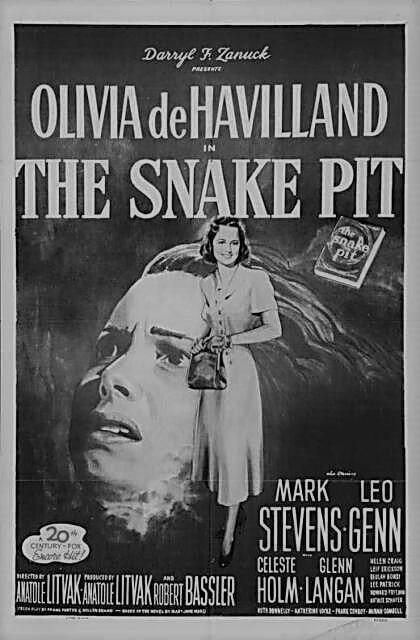 SNAKE PIT, THE (1948)
SNAKE PIT, THE (1948) (108 Min.) Genre: 1940 DRAMA, Transfer Quality: A
A woman loses her mind and is confined to a mental institution. That's the usual TV-listing encapsulation of The Snake Pit — and like most such encapsulations, it only scratches the film's surface. Olivia de Havilland stars as an outwardly normal young woman, married to loyal, kindly Mark Stevens. As de Havilland's behavior becomes more and more erratic, however, Stevens comes to the sad conclusion that she needs professional help. She is sent to an overcrowded state hospital for treatment — a curious set-up, in that, while de Havilland is treated with compassion by soft-spoken psychiatrist Leo Genn, she is sorely abused by resentful matrons and profoundly disturbed patients. Throughout the film, she is threatened with being clapped into "the snake pit" — an open room where the most severe cases are permitted to roam about and jabber incoherently — if she doesn't realign her thinking. In retrospect, it seems that de Havilland's biggest "crime" is that she wants to do her own thinking, and that she isn't satisfied with merely being a loving wife. While this subtext may not have been intentional, it's worth noting that de Havilland escapes permanent confinement only when she agrees to march to everyone else's beat. Amazingly, Olivia de Havilland didn't win an Academy Award for her harrowing performance in The Snake Pit (the only Oscar won by the film was for sound recording). While some of the psychological verbiage in this adaptation of Mary Jane Ward's autobiographical novel seems antiquated and overly simplistic today, The Snake Pit was rightly hosannahed as a breakthrough film in 1948. — Hal Erickson
Starring: Olivia de Havilland, Mark Stevens, Leo Genn, Celeste Holm, Leif Erickson, Beulah Bondi, Ann Doran | Directed by: Anatole Litvak
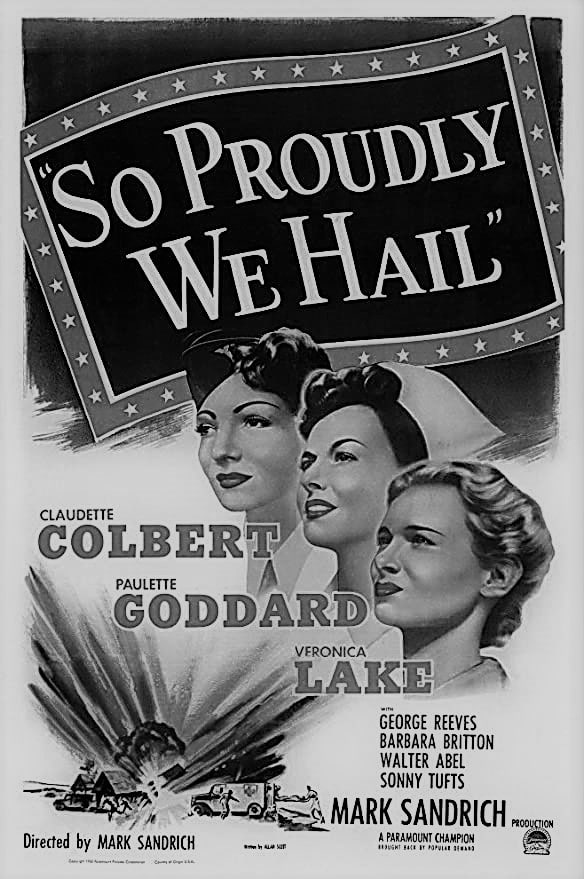 SO PROUDLY WE HAIL (1943)
SO PROUDLY WE HAIL (1943) (126 Min.) Genre: 1940 DRAMA, Transfer Quality: A
Paramount's So Proudly We Hail, like MGM's Cry Havoc, is a tribute to the Red Cross nurses trapped behind enemy lines in the early days of the Pacific war. Claudette Colbert is the self-sacrificing head nurse, struggling to minister to the wounded and to keep her staff (including Paulette Goddard, Veronica Lake and Barbara Britton, all of them giving better than usual performances) from buckling under the pressure. Taking into consideration the regular fans of the film's female cast, the producers thoughtfully include several scenes in which the ladies pursue their romantic lives. The story culminates with the fall of Bataan, ending on a resigned but optimistic note; this finale was designed to lift the spirits of the audience, which in 1943 wasn't so certain as Hollywood of final victory. So Proudly We Hail was not only effective propaganda (though not as effective as Cry Havoc), but it also enabled Paramount to introduce its new crop of male hunks—including the estimable Sonny Tufts. — Hal Erickson
Starring: Claudette Colbert, Paulette Goddard, Veronica Lake, George Reeves | Directed by: Mark Sandrich
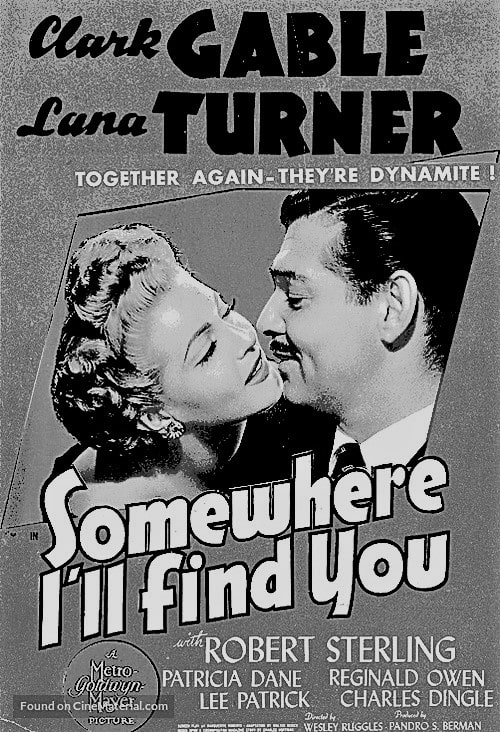 SOMEWHERE I'LL FIND YOU (1942)
SOMEWHERE I'LL FIND YOU (1942) (108 Min.) Genre: 1940 DRAMA, Transfer Quality: A
Unable to convince their isolationist New York editor (Charles Dingle) that America must be alerted to the threat of encroaching Nazism, pugnacious war correspondents Johnny and Kirk Davis (Clark Gable and Robert Sterling) are relieved of their European assignments. Back in the USA, Johnny inagurates a rogueish flirtation with Paula Lane (Lana Turner), an aspiring reporter who has harbored a long-standing crush on Johnny. Even so, Paula enters into a romantic relationship with Kirk, prompting Johnny to break up the affair-for Kirk's own good, of course. Paula's hopes for a lasting romance with Johnny are crushed when he refuses to discourage her from accepting an assignment in IndoChina. Later on, both Johnny and Kirk are sent off to cover the war in the Far East, where they are reunited with Paula, now busily shepherding Chinese war orphans to safety. The action moves to Bataan, where Kirk is killed in service of his country, leaving Johnny to write a passionate tribute to his brother-and, by extention, everyone else who has lain down his or her life for the cause of Democracy. During production of Somewhere I'll Find You, Clark Gable's actress-wife Carole Lombard was killed in a plane crash while participating in a war-loan drive; the impact of the tragedy is painfully obvious in Gable's performance, which becomes abruptly less playful and more somber in the final reels. New MGM recruits Van Johnson and Keenan Wynn make impressive appearances in uncredited roles. — Hal Erickson
Starring: Clark Gable, Lana Turner, Robert Sterling, Patricia Dane | Directed by: Wesley Ruggles
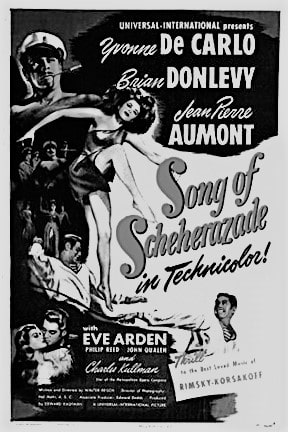 SONG OF SCHEHERAZADE (1947)
SONG OF SCHEHERAZADE (1947) (105 Min.) Genre: 1940 DRAMA, Transfer Quality: B
Bearing little resemblance to reality, this musical biography of 19th century Russian composer Nikolai Rimsky-Korsakov takes liberal poetic license with the truth. Jeanne-Pierre Aumont stars as Nicky, a Naval Academy cadet assigned to a vessel undergoing a world cruise. On shore leave in Morocco, Nicky goes in search of a piano intending to pursue his true passion, music. Accompanied by the ship's singing doctor, Klin (Charles Kullmann), Nicky makes the acquaintance of a cabaret dancer named Cara de Talavera (Yvonne De Carlo). The daughter of a Spanish colonial family that was once prominent but has fallen upon difficult times, Cara now dances in secret as Scheherazade in a revue at the nightclub. Inspired by her, Nicky sets about composing his most famous song for inclusion in a ballet. Although fate conspires to keep Cara and Nicky apart for a time, his piece is a success and is scheduled for a performance at the St. Petersburg Opera House, where none other than Cara turns up as the lead dancer.
Starring: Patricia Alphin, Yvonne De Carlo, Brian Donlevy, Eve Arden | Directed by: Walter Reisch
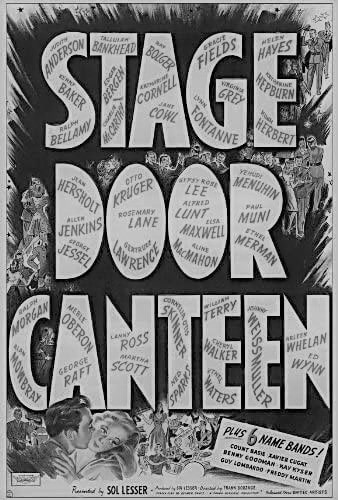 STAGE DOOR CANTEEN (1943)
STAGE DOOR CANTEEN (1943) (132 Min.) Genre: 1940 DRAMA, Transfer Quality: A
This literally star-studded musical drama was largely financed by Theatre Guild, with all proceeds going to various wartime fundraising concerns. Most of the story takes place at the Stage Door Canteen, a Manhattan-based home away from home for soldiers, sailors and marines (the real-life Canteen on 44th street was too busy to lend itself to filming, thus the interiors were recreated in Hollywood). Within the walls of this non-profit establishment, servicemen are entertained by top musical, comedy and dramatic acts, and waited on by such Broadway luminaries as Lunt and Fontanne, Katharine Hepburn, Jane Cowl, Katherine Cornell, Tallulah Bankhead, Helen Hayes, Cornelia Otis Skinner, Sam Jaffe and Paul Muni. Though the plotline-one of the Canteen servers, a girl named Eileen (Cheryl Walker) falls in love with one of the visiting soldiers (William Terry), despite the establishment's strict "no dating" rules-is merely an excuse to link together a series of specialty acts, it is superbly and touchingly directed by Frank Borzage. Not all of the film has weathered the years too well: particularly hard to take is Gracie Fields' cheery ditty about "killing Japs!" For the most part, however, the film works, and the guest performers-including bandleaders Kay Kyser, Guy Lombardo and Xavier Cugat, comedians Ray Bolger, Harpo Marx, George Jessel and Ed Wynn, and singers Ethel Waters and Kenny Baker-are in fine fettle. If nothing else, Stage Door Canteen offers the only appearance on film of the great Katherine Cornell, who offers a vignette of the balcony scene from Romeo and Juliet. Incidentally, the actor playing "Texas", Michael Harrison, later gained fame as cowboy star Sunset Carson. Originally released at 132 minutes, Stage Door Canteen is now generally available in the 93-minute TV version. — Hal Erickson
Starring: Cheryl Walker, William Terry, Marjorie Riordan, Lon McCallister | Directed by: Frank Borzage
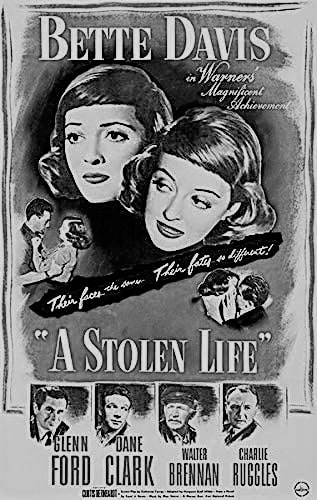 STOLEN LIFE, A (1946)
STOLEN LIFE, A (1946) (107 Min.) Genre: 1940 DRAMA, Transfer Quality: A
In this romantic melodrama, Bette Davis plays twin sisters for the first time (she would do so again in 1964's Dead Ringer). Kate Bosworth (Davis) is a sincere, demure girl and talented artist. Her twin sister Pat (also Davis) is a flamboyant, man-hungry manipulator. Orphans, the girls' guardian is their cousin, Freddie Lindley (Charles Ruggles), with whom Kate elects to spend a summer on Martha's Vineyard. There, she meets Bill Emerson (Glenn Ford), a handsome engineer spending a summer vacation as a lighthouse inspector. Kate falls deeply in love with Bill, but when Pat shows up, he goes for the more exciting sister, eventually marrying her. Devastated, Kate throws herself into her art, but she becomes discouraged under the tutelage of an abusive master, Karnock (Dane Clark). A sailing accident gives Kate the chance to take her sister's place — but can she fool Bill into believing that this sweet, innocent woman is his philandering, scheming wife? A Stolen Life (1946), a remake of an earlier picture by the same name that had been produced by Paramount only seven years earlier starring Elisabeth Bergner in the twins role, was nominated for a Best Special Effects Oscar. — Karl Williams
Starring: Bette Davis, Glenn Ford, Dane Clark, Walter Brennan, Charlie Ruggles | Directed by: Curtis Bernhardt
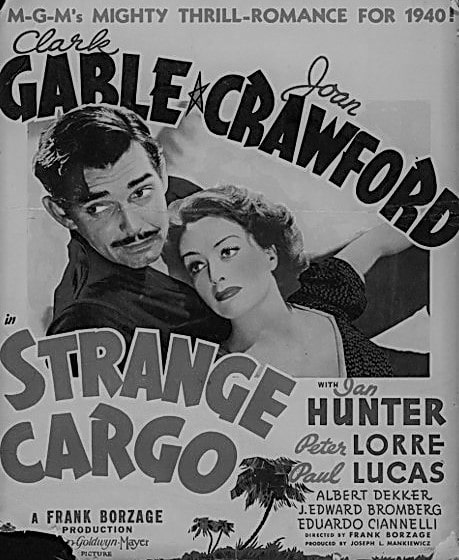 STRANGE CARGO (1940)
STRANGE CARGO (1940) (105 Min.) Genre: 1940 DRAMA, Transfer Quality: A
Strange is right: this mystical MGM melodrama has to be the oddest of the studio's Clark Gable-Joan Crawford vehicles. When eight prisoners escape from a New Guinea penal colony, they are picked up by a sloop commandeered by another escapee named Verne (Gable) and his trollop girl friend Julie (Joan Crawford). Among the fugitives is Cambreau (Ian Keith), a soft-spoken, messianic character who has a profound effect on his comrades. One by one, the escapees abandon their evil purposes and find God-and a peaceful death—through the auspices of the Christlike Cambreau. The last to succumb to Cambreau's ministrations is Verne, who agrees to return to return to the prison colony serve out his sentence if Julie will wait for him (which she does). A superb Franz Waxman scores provides a touch of show-biz grandeur to this haunting fable. — Hal Erickson
Starring: Clark Gable, Joan Crawford, Ian Hunter, Peter Lorre, Paul Lukas, Albert Dekker, Eduardo Ciannelli | Directed by: Frank Borzage
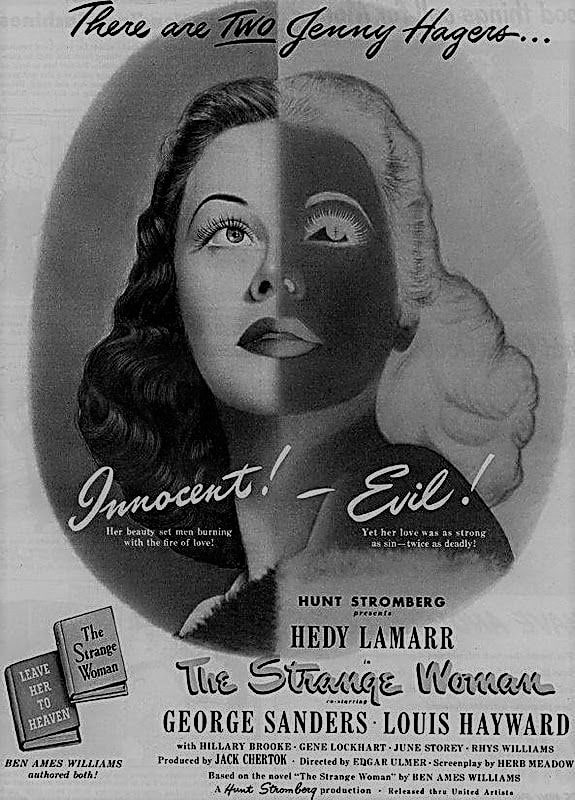 STRANGE WOMAN, THE (1946)
STRANGE WOMAN, THE (1946) (99 Min.) Genre: 1940 DRAMA, Transfer Quality: A
B-movie auteur Edgar G. Ulmer managed to direct a few A-pictures during his long career; he was personally selected by Hedy Lamarr to helm this big-budget thriller, a project she put together to change her image as a starlet whose sex appeal outweighed her acting abilities. Set in the early 19th century, The Strange Woman takes place in Bangor, Maine, where logging and lumber mills have made the town prosperous. Jenny Hager (Lamarr) has grown up in Bangor, not far from the watchful eye of wealthy Isaiah Poster (Gene Lockhart). The fact that Jenny is twenty years Isaiah's junior does not stem his amorous intentions, and when she's finally out of her teens, Jenny accepts his proposal of marriage. But beneath her sweet exterior, Jenny is a shrewd, conniving women, and while she makes a fine life for herself with Isaiah's money, she obviously doesn't care for him. When Isaiah's son Ephraim (Louis Hayward) visits from college, Jenny is immediately attracted to him, and she tells him that she'll marry him if he murders his father. But, unknown to Ephraim, Jenny is already scheming to win the affections of businessman John Evered (George Sanders), even though he's pledged to marry her best friend Meg (Hillary Brooke). Based on a novel by Ben Ames Williams, The Strange Woman was generally considered one of Hedy Lamarr's best performances, although her best-known performance would continue to be in Ecstasy (1933), largely because of her then-daring nude scenes. — Mark Deming
Starring: Hedy Lamarr, George Sanders, Louis Hayward, Gene Lockhart | Directed by: Edgar G. Ulmer
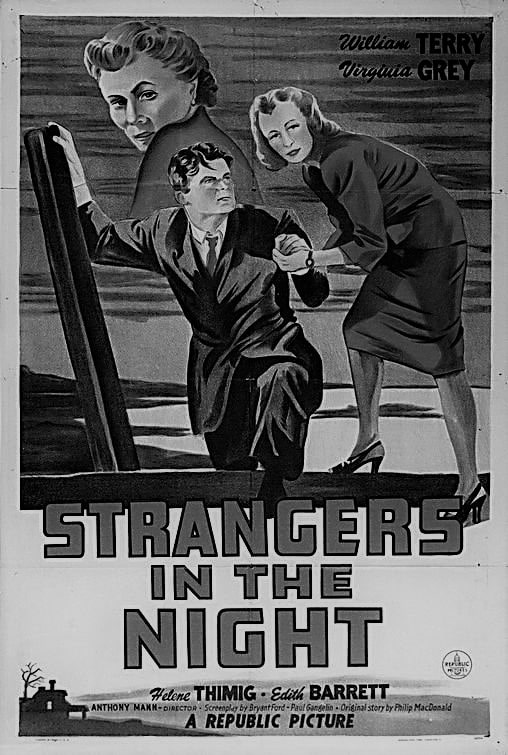 STRANGERS IN THE NIGHT (1944)
STRANGERS IN THE NIGHT (1944) (56 Min.) Genre: 1940 DRAMA, Transfer Quality: B
A bizarre love affair forms the basis of this drama. It all begins with a few love letters between a Marine sergeant stationed overseas and a young woman back in the States. As soon as his tour is finished, the sergeant begins looking for the woman back home. He finds the girl's mother and she informs him that her daughter has gone away. The man is heartbroken until a friend of the mother tells him that the mother never had a daughter; the whole affair was manufactured by the lonely woman. When the mother learns of her friend's betrayal, she kills her. She then tries to kill the Marine, but during the scuffle, a gigantic painting of her "daughter" slips off the wall and crushes her.
Starring: George E. Stone, Edith Barrett, Virginia Grey, Anne O'Neal, William Terry | Directed by: Anthony Mann
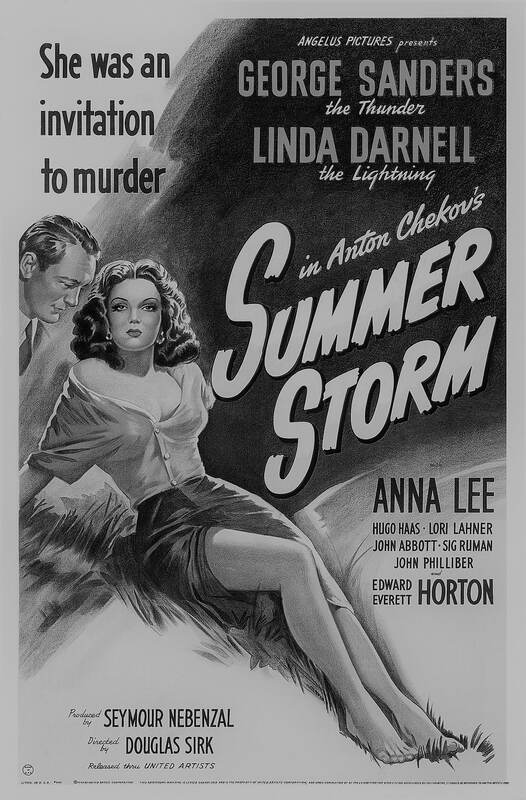 SUMMER STORM (1944)
SUMMER STORM (1944) (105 Min.) Genre: 1940 DRAMA, Transfer Quality: B
Summer Storm is a remarkably effective Hollywood filmization of Anton Chekhov's The Shooting Party. Linda Darnell stars as the young and beautiful wife of a middle-aged Russian civil servant (Hugo Haas). Darnell becomes the object of the affections of her husband's employer, a lecherous count (Edward Everett Horton). The girl in turn is enamored of a provincial judge (George Sanders). At first, all flirtations are playful and harmless, but the judge takes Darnell so seriously that he ends up killing her in a jealous rage. Her husband is blamed for the crime, but the Count gets his comeuppance during the 1917 Bolshevik revolution (which didn't figure into the original Chekhov story, inasmuch as the author died in 1904). The big surprise in this is not that it works as well as it does, but that it features comic actor Edward Everett Horton in a straight, almost unsympathetic role, which he underplays beautifully. — Hal Erickson
Starring: George Sanders, Linda Darnell, Anna Lee, Edward Everett Horton | Directed by: Douglas Sirk
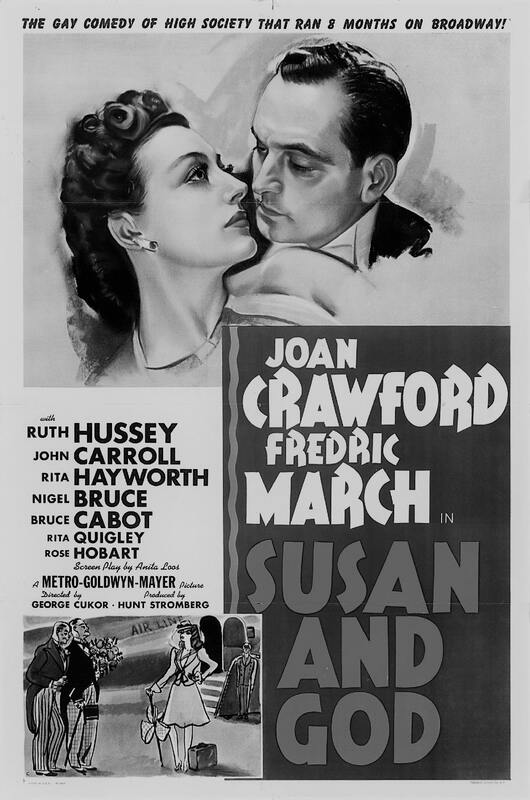 SUSAN AND GOD (1940)
SUSAN AND GOD (1940) (115 Min.) Genre: 1940 DRAMA, Transfer Quality: A
Rachel Crothers' thoughtful stage play Susan and God was tastefully adapted for the screen by Anita Loos. Joan Crawford stars as Susan, whose unquestioning devotion to various religious organizations causes a great deal of strain between herself and her family. When Susan embraces a "New Thought" theological movement, she decides to apply the tenets of this new philosophy to patch up the unhappy marriages within her own social circles. She succeeds only in making things worse, and in further harming her own relationship with husband Barrie (Fredric March) and daughter Blossom (Rita Quigley). But it is the unadorned, unpretentious religious faith of little Blossom that ultimately brings Susan and Barrie together again. When Susan and God was first released in 1940, Joan Crawford's performance was occasionally compared unfavorably to that of Gertrude Lawrence, who created the role of Susan on Broadway; it was suggested by some that Crawford patterned her portrayal exactly on Lawrence's, right down to the line delivery. Modern audiences, denied the opportunity to see Lawrence's interpretation, are less inclined to downgrade Crawford's work, which rates among her best. — Hal Erickson
Starring: Joan Crawford, Fredric March, Ruth Hussey, John Carroll, Rita Hayworth | Directed by: George Cukor
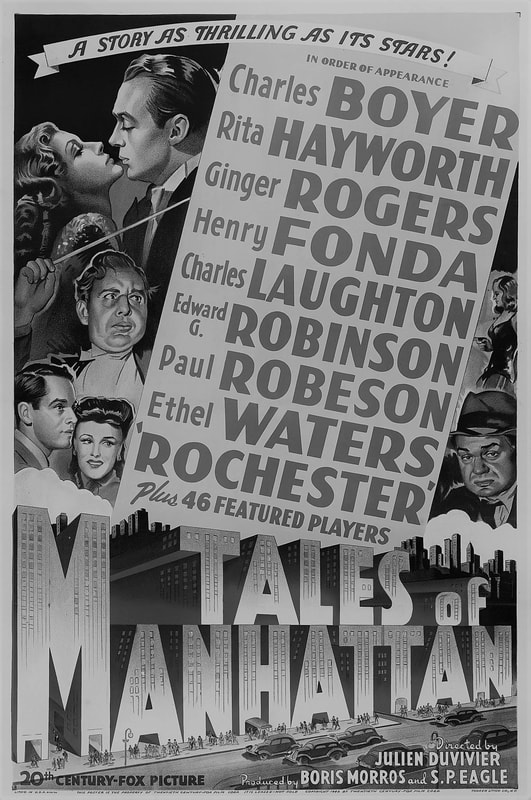 TALES OF MANHATTAN (1942)
TALES OF MANHATTAN (1942) (118 Min.) Genre: 1940 DRAMA, Transfer Quality: A
Tales of Manhattan is a sumptuous multipart film centered around a formal tailcoat. The coat is specially designed for stage actor Charles Boyer, who wears it during a rendezvous with his lady friend (Rita Hayworth). The lady's husband (Thomas Mitchell) shoots Boyer, thus the tailcoat is damaged merchandise and sold at a discount to a bridegroom (Cesar Romero). When the groom's peccadillos catch up to him, the bride (Ginger Rogers) chooses to marry the best man (Henry Fonda) instead, and the coat is shipped off to a second hand store. It is purchased by a would-be composer (Charles Laughton), who wears it the night that he is to conduct his first symphony; alas, the coat is too tight and tears apart, nearly ruining the conductor's debut. Stitched back together, the coat is donated to a skid row mission, wherein the kindly proprietor gives the coat to a down and out drunkard (Edward G. Robinson) so that the shabby gentleman can attend his 25th college reunion. Later on, the coat is stolen by a crook (J. Carroll Naish) in order to gain entrance to a fancy charity ball. The crook holds up the ball and stuffs the loot in the pockets of the coat, but while escaping in an airplane he loses the outer garment. The coat floats down to an impoverished African American shanty community; a farmer (Paul Robeson) decides to distribute the "money from heaven" amongst his needy neighbors. At the end, the tattered coat adorns the shoulders of a scarecrow. Tales of Manhattan is one of the best "portmanteau" dramas turned out by Hollywood; it was directed by French expatriate Julien Duvivier, a past master of the multi-story technique.
Starring: Charles Boyer, Rita Hayworth, Ginger Rogers, Henry Fonda, Charles Laughton, Edward G. Robinson, J. Carrol Naish | Directed by: Julien Duvivier
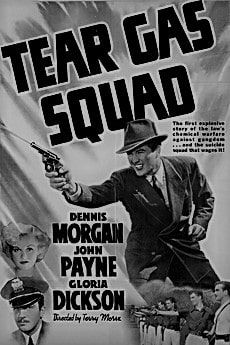 TEAR GAS SQUAD (1940)
TEAR GAS SQUAD (1940) (55 Min.) Genre: 1940 DRAMA, Transfer Quality: B
Warner Bros. Tear Gas Squad manages to pack thrills, comedy, romance and songs into a neat 55-minute package. Dennis Morgan plays cocky nightclub entertainer Tommy McCabe, who gets his jollies out of making fun of the local police force. This does not prove amusing to pretty Jerry Sullivan (Gloria Dickson), the daughter of a police lieutenant (Harry Shannon), nor to Jerry's flatfoot boyfriend Bill Morrissey (John Payne). Falling in love with Jerry himself, Tommy tries to prove his worth by joining the Boys in Blue, where he is subject to the rigorous training program applied by Morrissey. Thrown off the force because of his insouciance, Tommy gets back into everyone's good graces by saving Morrisey's life. Fans of TV's Superman series will get a special kick out of seeing George (Clark Kent) Reeves and John (Perry White) Hamilton in key supporting roles.
Starring: Dennis Morgan, John Payne, Gloria Dickson, George Reeves | Directed by: Terrell O. Morse
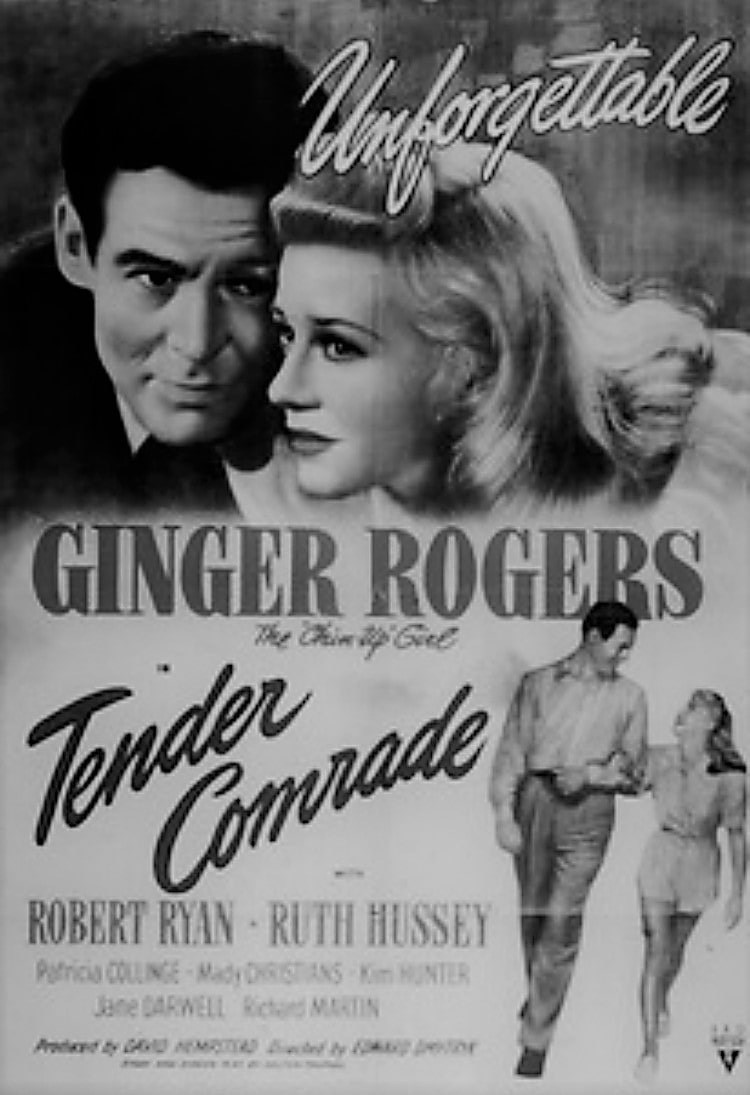 TENDER COMRADE (1943)
TENDER COMRADE (1943) (101 Min.) Genre: 1940 DRAMA, Transfer Quality: A
A bit treacly at times, Tender Comrade is nonetheless a fascinating distillation of the American mindset during WW2. Ginger Rogers is at her noblest and most self-sacrificial as Jo, whose husband Chris (Robert Ryan) is off fighting the war. Though pregnant, Jo finds a job at Douglas Aircraft, saving her money by living in a group home with several of her female co-workers. Delivering lines like "Share and share alike, that's democracy", Jo and her friends pool their salaries and divvy up responsibilities, as wait for news from the Front about their husbands and sweethearts. When news arrives that Chris has been killed, Jo delivers an impassioned cheer-up speech to her infant son, which will either leave the viewer in tears or in giggles, depending upon one's frame of mind. The "collectivism" implicit in Tender Comrade (not to mention its politically chancy title!) would later cause a lot of trouble for screenwriter Dalton Trumbo and director Edward Dmytrk during the HUAC "Communist witchhunt" era. In 1943, however, audiences didn't worry about such things, and the film posted a huge profit for RKO Radio. — Hal Erickson
Starring: Ginger Rogers, Robert Ryan, Ruth Hussey, Patricia Collinge | Directed by: Edward Dmytryk
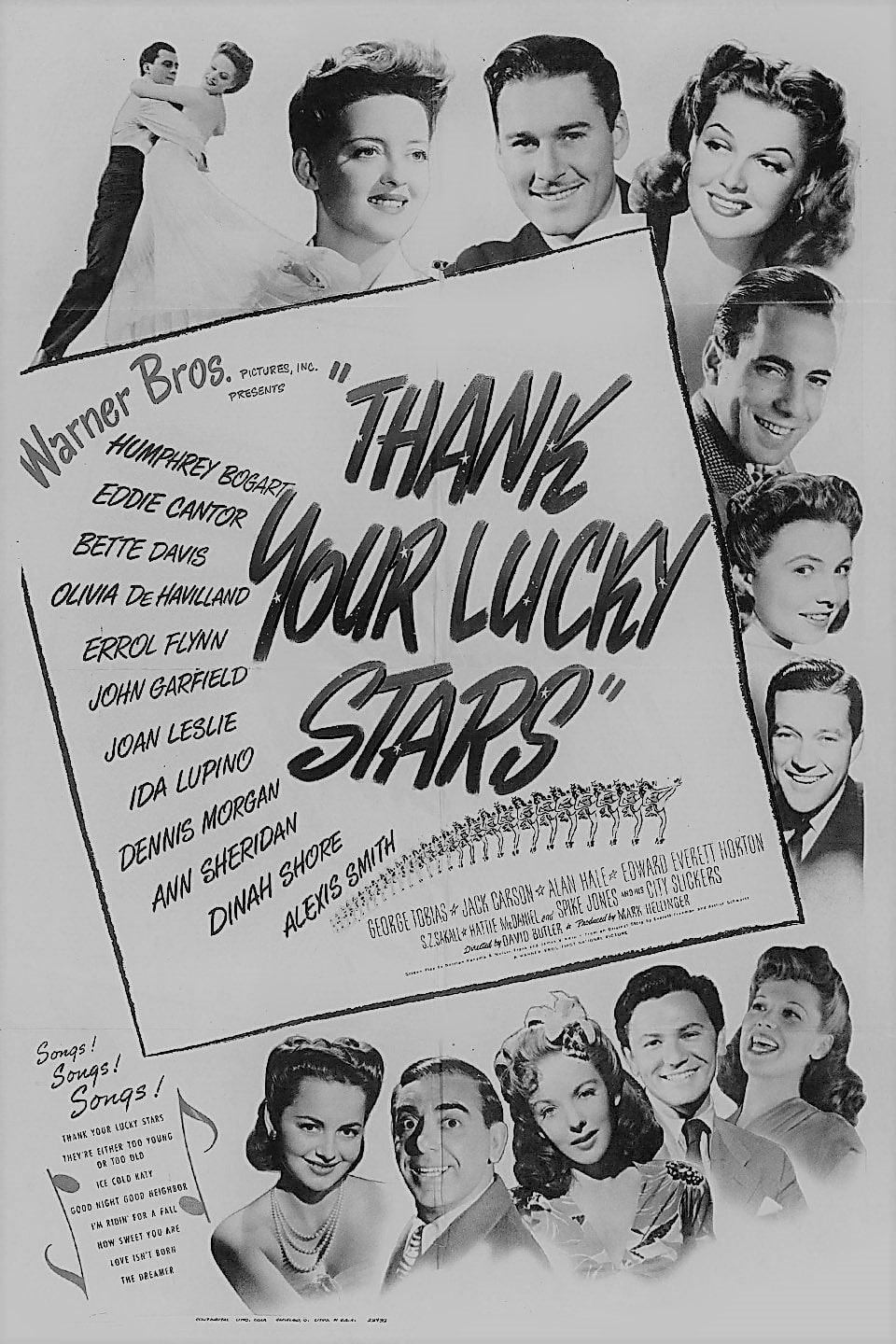 THANK YOUR LUCKY STARS (1943)
THANK YOUR LUCKY STARS (1943) (127 Min.) Genre: 1940 DRAMA, Transfer Quality: A
Practically everybody on the Warner Bros. lot shows up in the wartime morale-boosting musical extravaganza Thank Your Lucky Stars. Believe it or not, this one has a wisp of a plot. A pair of enterprising producers, played by S.Z. Sakall and Edward Everett Horton, want to hire singer Dinah Shore for their upcoming Cavalcade of Stars. Unfortunately, this means they must deal with Shore's boss, radio comedian Eddie Cantor. The egotistical Cantor insists upon joining the show himself, driving everyone crazy with his take-charge attitude. Meanwhile, singer Dennis Morgan, hoodwinked by a crooked agent into thinking he's signed a contract with Cantor, shows up backstage at Sakall and Horton's rehearsal, only to be given the boot. While all this is going on, aspiring actress Joan Leslie has befriended a bus driver named Joe Simpson—who happens to be a dead ringer for Eddie Cantor (and why not? Ol' "Banjo Eyes" plays both parts). Turns out that Joe is another showbiz wannabe, but he has been denied a break because he looks too much like Cantor. You see what's comin' now, right, folks? Morgan and Leslie will get their big breaks when Joe Simpson impersonates Eddie Cantor, who's been kidnapped by Indians (bet you didn't see that one coming!) All of this expository nonsense is merely an excuse to show off Warners' talent roster in a series of engaging specialty numbers: John Garfield talk-sings Blues in the Night, Jack Carson and Alan Hale do a buck-and-wing, a jitterbug number is performed by Ida Lupino, Olivia de Havilland and George Tobias, Hattie McDaniel and Willie Best strut their stuff in Ice Cold Katie, and so on. Highlights include Errol Flynn's That's What You Jolly Well Get, an English music hall-style sendup of Flynn's movie heroics, and Bette Davis' peerless (and endearingly off-key) rendition of They're Either too Young or Too Old. As a bonus, Humphrey Bogart shows up long enough to be browbeaten and intimidated by S.Z. Sakall ("Gee, I hope none of my movie fans see this!" moans Bogart as the soundtrack plays a mocking rendition of Who's Afraid of the Big Bad Wolf?) Subtle and sophisticated it isn't, but Thank Your Lucky Stars is so entertaining that you'll forget all about its multitude of flaws. — Hal Erickson
Starring: Eddie Cantor, Dinah Shore, Bette Davis, John Garfield, Olivia de Havilland, Ida Lupino, Alexis Smith | Directed by: David Butler
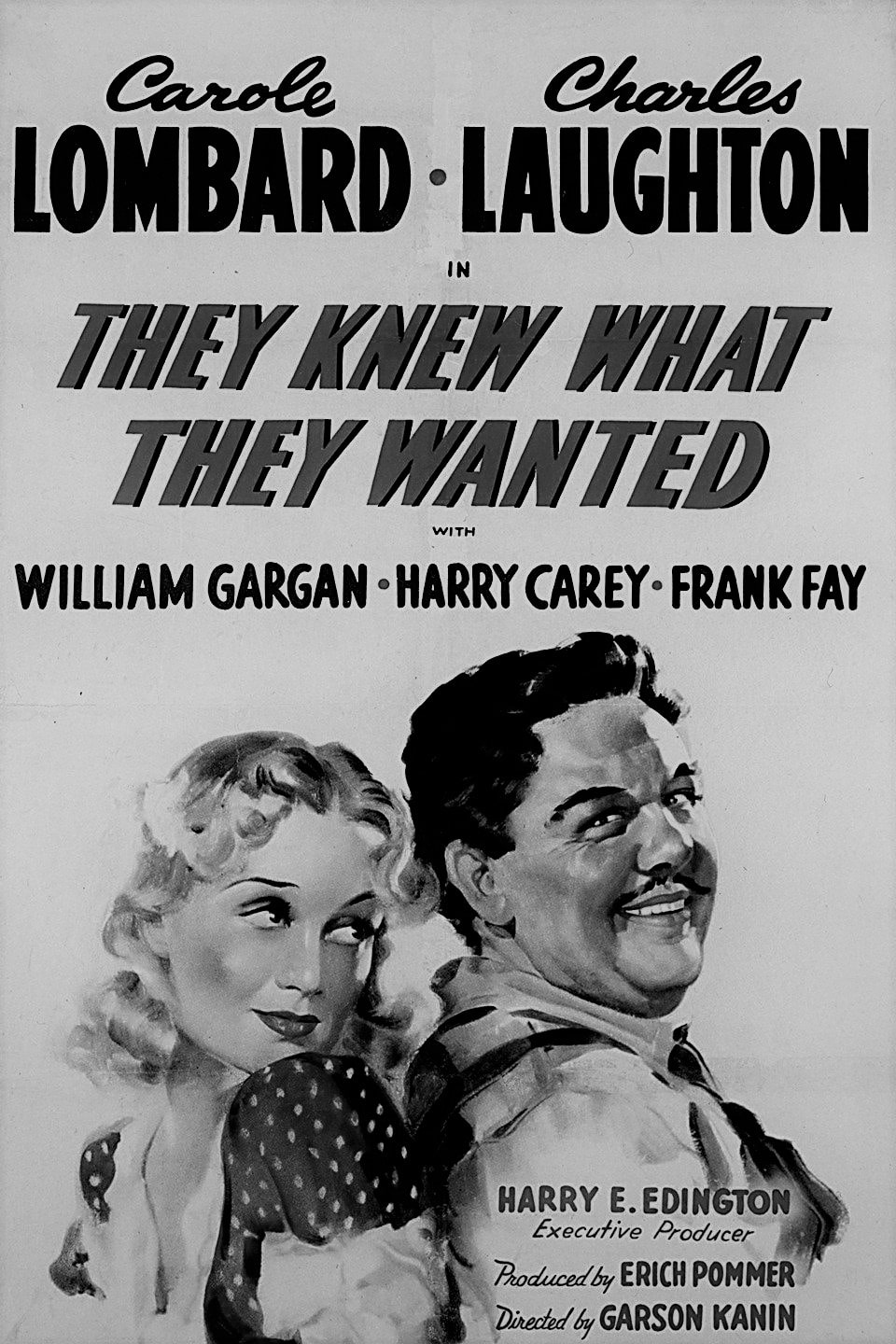 THEY KNEW WHAT THEY WANTED (1940)
THEY KNEW WHAT THEY WANTED (1940) (96 Min.) Genre: 1940 DRAMA, Transfer Quality: A
Like its predecessors, this third cinema version of Sidney Hoiward's Pulitzer Prize-winning play They Knew What They Wanted suffers from Hollywood censorship. Still, this story of the grim consequence of a misbegotten mail-order marriage has much to offer. Carole Lombard is superb as the waitress who lies about herself while carrying on a romance by correspondence with the Italian-born owner of a Napa Valley vineyard. Equally fine (if a shade too effusively hammy) is Charles Laughton as the grape grower, who also misrepresents himself in his letters, going so far as to pass off a photograph of handsome hired hand William Gargan as a picture of himself. Vowing to be loyal to her new husband Laughton, despite her distaste for him, Lombard nonetheless enters into an affair with Gargan. For the most part, the film moves along harmoniously. It falters only in the censor-dictated alterations (why is Lombard crying at the end?) and the horrendous performance by Frank Fay as a sanctimonious priest. Keep an eye peeled during the engagement party for a young, unbilled Karl Malden and Tom Ewell. Previous versions of They Knew What They Wanted included The Secret Hour (1928) and A Lady in Love (1930).
Starring: Carole Lombard, Charles Laughton, William Gargan, Harry Carey, Frank Fay, Karl Malden | Directed by: Garson Kanin
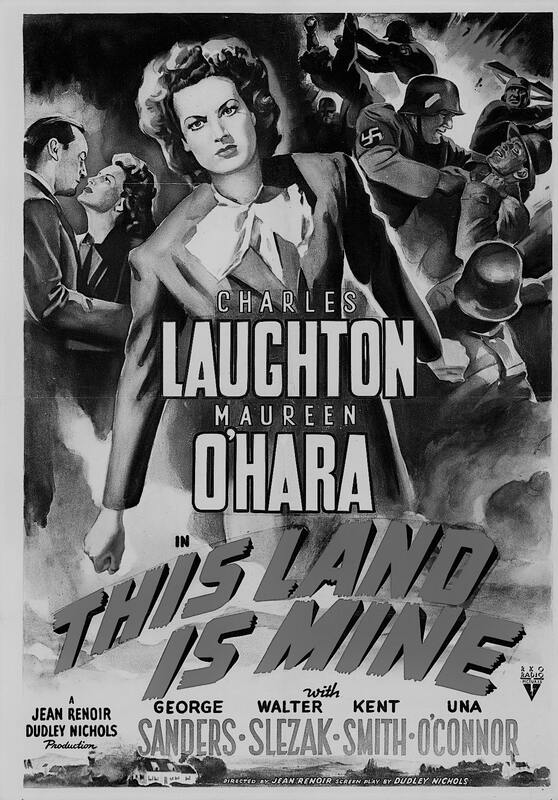 THIS LAND IS MINE (1943)
THIS LAND IS MINE (1943) (103 Min.) Genre: 1940 DRAMA, Transfer Quality: A
Written by Dudley Nichols and directed by French expatriate director Jean Renoir, This Land is Mine is one of those "inspirational" wartime dramas that just don't hold up too well when seen today. The scene is an unnamed European country, recently overrun by the Nazis (this takes place during a "silent" opening sequence that's the best thing in the film). Charles Laughton plays Albert Lory, a mama's-boy schoolmaster who is the object of his students' ridicule. A craven coward, Lory is held responsible when resistance fighter Paul Martin (Kent Smith), the brother of beauteous teacher Louise Martin (Maureen O'Hara), is executed by the Nazis, though in fact it was Lory's panic-stricken mother (Una O'Connor) who betrayed Paul. — Hal Erickson
Starring: Charles Laughton, Maureen O'Hara, Walter Slezak, George Sanders, George Coulouris | Directed by: Jean Renoir
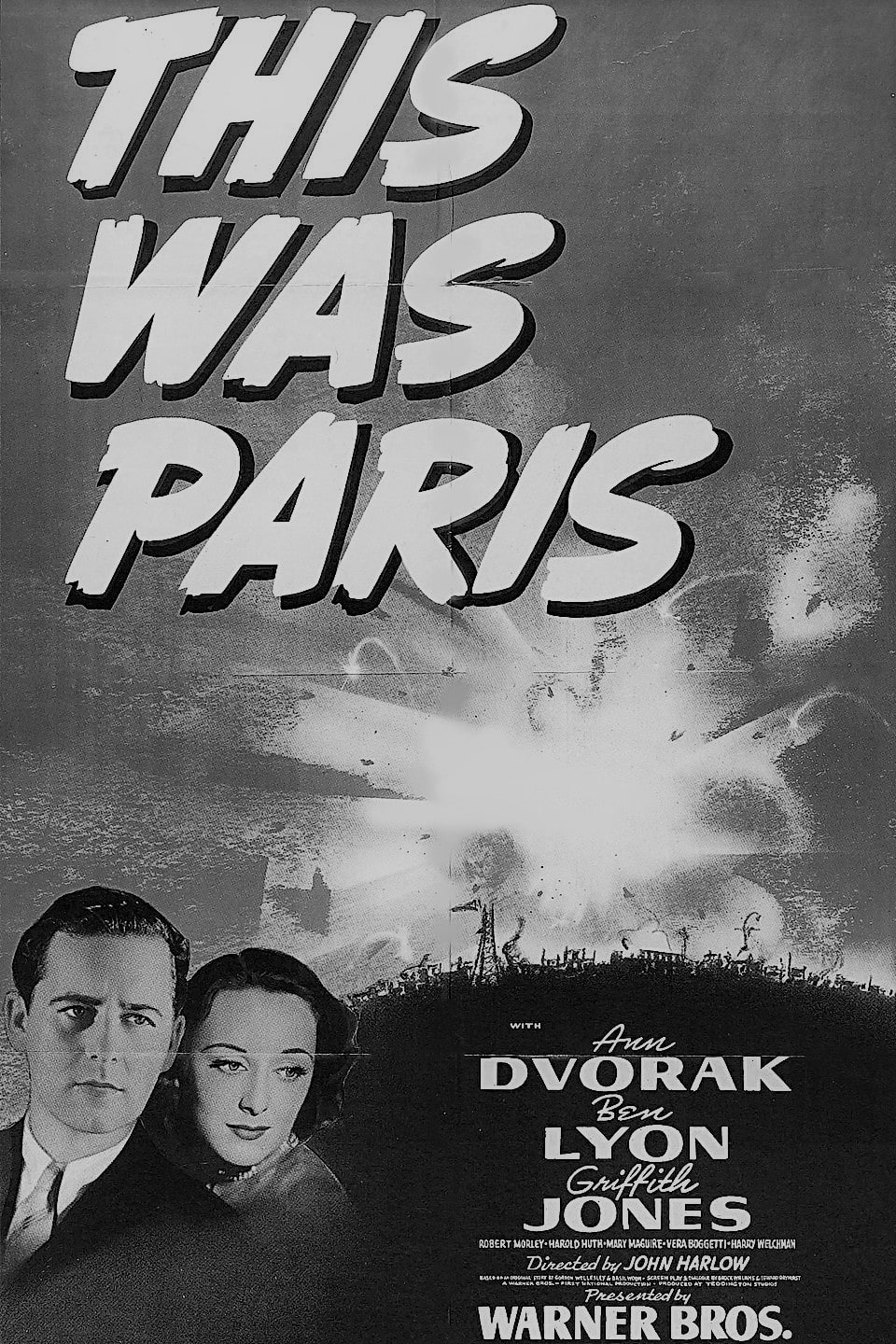 THIS WAS PARIS (1941)
THIS WAS PARIS (1941) (77 Min.) Genre: 1940 DRAMA, Transfer Quality: B
Filmed in England at Warner Bros.' Teddington Studios facilities, This Was Paris stars American actors (and current British residents) Ann Dvorak and Ben Lyon. She is cast as Ann Morgan, a female ambulance driver in the early days of WWII. He is cast as bibulous American newspaperman Butch, who likes to throw his weight around Paris because he knows he can get away with it. As the clouds of war gather all over Europe, Ann finds romance in the form of British Intelligence agent Bill Hamilton, while Butch sobers up and begins taking his responsibilities seriously. Oddly enough, This Was Paris didn't receive an American release until several years after its production.
Starring: Ann Dvorak, Ben Lyon, Griffith Jones, Robert Morley | Directed by: John Harlow
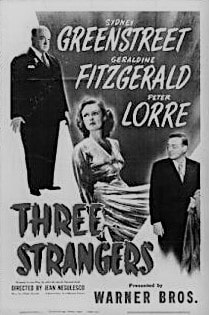 THREE STRANGERS (1946)
THREE STRANGERS (1946) (92 Min.) Genre: 1940 DRAMA, Transfer Quality: A
On the eve of the Chinese New Year, three strangers make a pact before a small statue of the Chinese goddess of Destiny. The strangers are Geraldine Fitzgerald, married to a wealthy philanderer; Sidney Greenstreet, an outwardly respectable judge; and Peter Lorre, a seedy sneak thief. The threesome agree to purchase a sweepstakes ticket and share whatever winnings might accrue. Alas, the pact brings little more than misfortune for all concerned. Greenstreet steals funds from a client, then kills Fitzgerald (with the goddess statue!) when she refuses to hand over her sweepstakes winnings. Lorre's fate is less bleak—he and his girlfriend (Joan Lorring) decide to abandon their life of crime—but even he ends up penniless when he inadvertently sets fire to the winning ticket. If it seems strange that Peter Lorre ends up the romantic lead in Three Strangers, remember that the film's director, Jean Negulesco, thought Lorre was the finest actor who ever lived—and as a result, he fought tooth and nail with Warner Bros. to cast Lorre in this film. — Hal Erickson
Starring: Sydney Greenstreet, Peter Lorre, Geraldine Fitzgerald, Joan Lorring | Directed by: Jean Negulesco
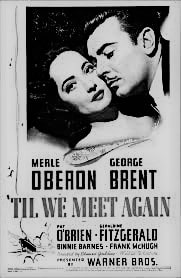 TIL WE MEET AGAIN (1940)
TIL WE MEET AGAIN (1940) (99 Min.) Genre: 1940 DRAMA, Transfer Quality: B
'Til We Meet Again is an inflated remake of 1932's One Way Passage. As in the original, the hero is a convicted murderer en route to the death house by way of a merchant ship; the heroine is suffering from a terminal illness. Once more, hero and heroine fall in love, each keeping the facts of his or her imminent doom from the other. The principal difference this time is that instead of William Powell and Kay Francis, the stars are George Brent and Merle Oberon. This cast change does no damage to the basic storyline, but the decision in 'Til We Meet Again to expand upon the secondary romance between the arresting detective (Pat O'Brien) and an accomplice of the condemned man (Geraldine Fitzgerald) throws the focus of the film completely out of kilter. One decided benefit to both One Way Passage and 'Til We Meet Again is the comic presence of Frank McHugh, who plays the same role—a tipsy pickpocket—in both pictures. — Hal Erickson
Starring: Merle Oberon, George Brent, Pat O'Brien, Geraldine Fitzgerald, Frank McHugh | Directed by: Edmund Goulding
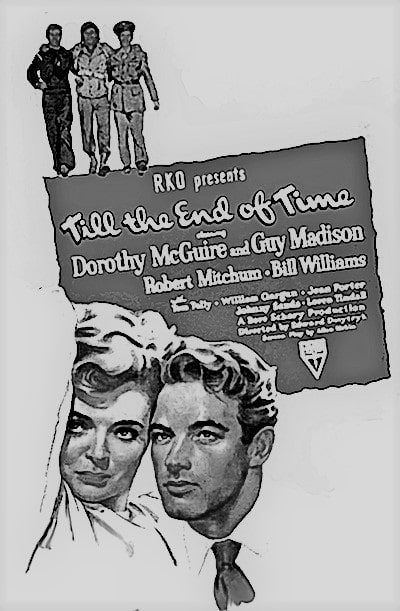 TILL THE END OF TIME (1946)
TILL THE END OF TIME (1946) (105 Min.) Genre: 1940 DRAMA, Transfer Quality: B
Sometimes dismissed as a derivation of Samuel Goldwyn's The Best Years of Our Lives, RKO Radio's superb Till the End of Time was actually based on Niven Busch's novel They Dream of Home, and was completed and released several months before the Goldwyn film. The story concentrates on three ex-marines: Cliff Harper (Guy Madison), Bill Tabeshaw (Robert Mitchum) and Perry Kincheloe (Bill Williams). Harper falls in love with emotionally distraught war widow Pat Ruscomb (Dorothy McGuire); Tabeshaw endures one disappointment after another as he tries to buy his own ranch; and Kincheloe, rendered legless by the war, intends to spend the rest of his life wallowing in self-pity. All three men find a new lease on life when they engage in a cathartic barroom brawl against a bigoted group of self-styled patriots led by hate-spouting Ray Teal (forever typecast as rabid racists during the postwar years). It was this climactic scene, which remains the most memorable aspect of Till the End of Time (outside of its Chopin-inspired theme song) that caused a lot of headaches for producer Dore Schary, screenwriter Allen Rivkin and director Edward Dmytryk during the House Unamerican Activities hearings a few years later: what was accepted as pro-American in 1946 would soon be labelled "Pinko" by the anti-Red zealots. — Hal Erickson
Starring: Dorothy McGuire, Guy Madison, Robert Mitchum, Bill Williams | Directed by: Edward Dmytryk
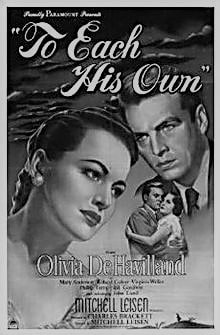 TO EACH HIS OWN (1946)
TO EACH HIS OWN (1946) (122 Min.) Genre: 1940 DRAMA, Transfer Quality: A
Olivia de Havilland won the first of her two Academy Awards for To Each His Own. During World War I, De Havilland falls in love with a young soldier (John Lund). He is killed in battle before they can marry, leaving de Havilland to raise their child alone. She gives the baby up for adoption, then goes to work in the cosmetic business, working her way up to an executive post. While in London on business during World War II, Olivia comes face to face with her grown son (John Lund again), now a military officer himself. Though she resists revealing her true identity, mother and son are brought together by a wise old British peer (Roland Culver). Olivia de Havilland's Oscar win was doubly sweet in that To Each His Own was her first film after an enforced two-year absence, brought about when she sued Warner Bros. to get out of her restrictive contract.
Starring: Olivia de Havilland, John Lund, Mary Anderson, Roland Culver, Phillip Terry | Directed by: Michael Leisen
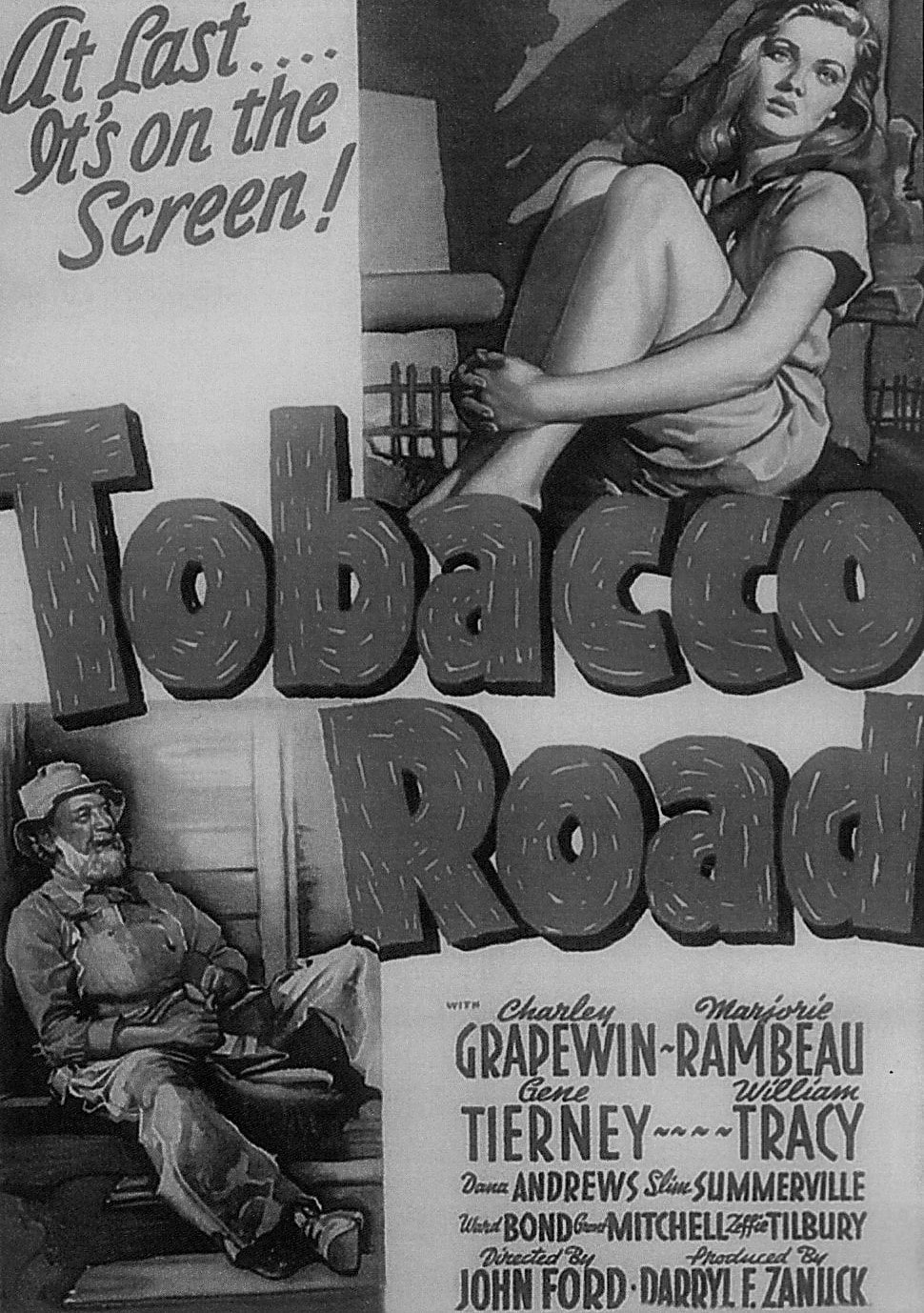 TOBACCO ROAD (1941)
TOBACCO ROAD (1941) (84 Min.) Genre: 1940 DRAMA, Transfer Quality: B
Erskine Caldwell's once-scandalous novel Tobacco Road resulted in an equally steamy stage play by Jack Kirkland, which became one of the longest-running productions in Broadway history. This story of indigence and amorality amongst inbred "poor whites" (based on people Caldwell had known while growing up in Georgia) had to be heavily expurgated for movie consumption, put there was plenty of comedy and colorful characterizations to suit the purposes of director John Ford. Charley Grapewin stars as Jeeter Lester, shiftless patriarch of a large backwoods clan. The Lesters are about to be thrown off their land for nonpayment of rent, but anyone who tries to help them—or to alter their lifestyle—is chased away by the poverty-stricken but intensely proud Jeeter. Tobacco Road succeeded on the basis of its title alone, even though no one expected the film to be anywhere near as earthy as the stage version (it would have been impossible under prevailing censorship to include the play's famous opening scene, in which the family watches intently while a teenage girl masturbates!)
Starring: Charles Grapewin, Marjorie Rambeau, Gene Tierney, William Tracy | Directed by: John Ford
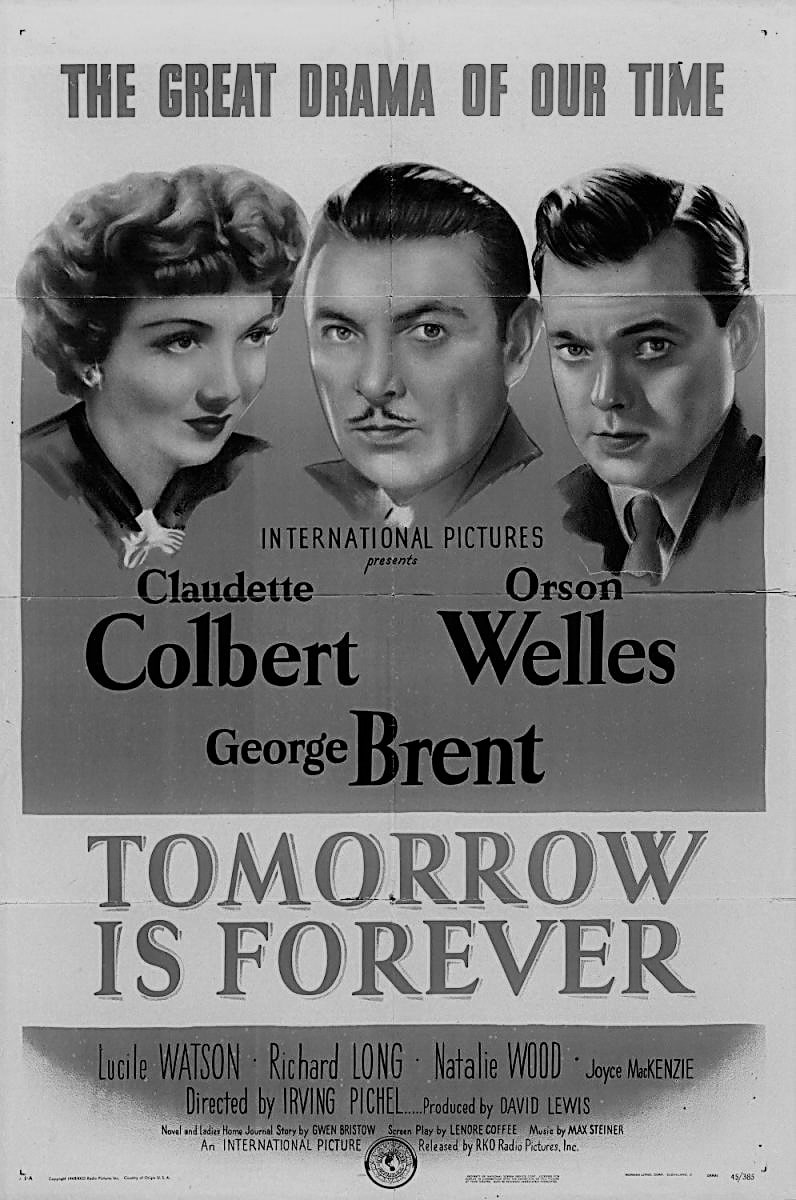 TOMORROW IS FOREVER (1946)
TOMORROW IS FOREVER (1946) (105 Min.) Genre: 1940 DRAMA, Transfer Quality: A
The blissful marriage between John (Orson Welles) and Elizabeth (Claudette Colbert) comes to an abrupt end when John is listed as missing and presumed dead in WWI. After a respectable period of mourning, Elizabeth, now a single mother, marries chemical-plant executive Larry Hamilton (George Brent), by whom she has a daughter, Margaret (Natalie Wood, in her first major film role). Twenty years later, a refugee Austrian chemist named Erich Kessler is hired by Hamilton. Kessler turns out to be the long-missing John, now suffering from amnesia, his face completely reconstructed by plastic surgery. Upon ascertaining Kessler's true identity, Elizabeth is faced with the sort of devastating dilemma indigenous to glossy soap operas of this nature. The film's central conflict arises from John/Erich's opposition to his grown son Drew's (Richard Long) participation in WW2. At the time of the film's release, publicists for Tomorrow is Forever paid more attention to Claudette Colbert's 18 costume changes than to Orson Welles' virtuoso performance in what amounted to a dual role.
Starring: Claudette Colbert, Orson Welles, George Brent, Lucile Watson, Richard Long, Natalie Wood | Directed by: Irving Pichel
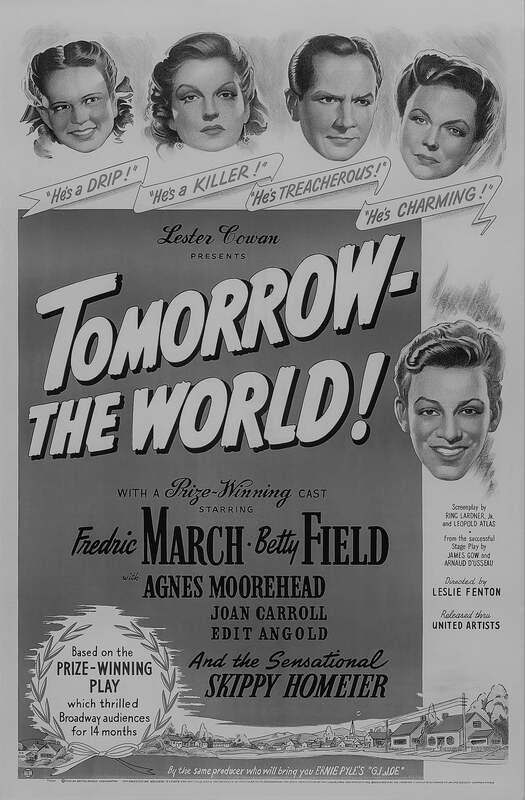 TOMORROW THE WORLD (1944)
TOMORROW THE WORLD (1944) (82 Min.) Genre: 1940 DRAMA, Transfer Quality: A
14-year-old Skip Homeier repeats his stage role as an unreconstructed Hitler Jugend in the film version of the James Gow/Arnaud D'Usseau stage play Tomorrow the World. A German orphan, Homeier is taken into the home of his American uncle (Fredric March), a gently liberal university professor. Though the son of an anti-Nazi, little robot-like Skip has become a parrot for the Third Reich, denouncing his late father as a traitor and being as nasty as possible to the professor's Jewish fiancee (Betty Field). Homeier accepts democracy only when the professor forgets his fuzzy-headedness and applies a little "physical culture." The moral really shouldn't be "Love America or We'll Break Every Bone in Your Body," but given the times in which it was made, Tomorrow the World can be forgiven its excesses. — Hal Erickson
Starring: Fredric March, Betty Field, Agnes Moorehead, Skippy Homeier, Joan Carroll. | Directed by: Leslie Fenton
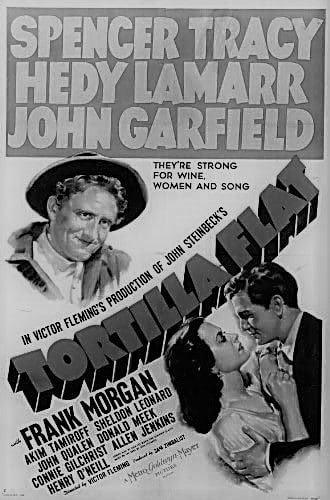 TORTILLA FLAT (1942)
TORTILLA FLAT (1942) (105 Min.) Genre: 1940 DRAMA, Transfer Quality: A
Like the John Steinbeck novel on which it is based, Tortilla Flat is not so much a movie as a series of warm-hearted anecdotes, all linked to a small California fishing village populated by poor-but-happy immigrants. The focus is upon Pilon (Spencer Tracy), a good-natured, charismatic freeloader, and Danny (John Garfield), a hot-headed fisherman who is dragged kicking and screaming into the world of personal responsibility when he inherits two small houses. As Pilon toys with the notion of stealing the nest egg saved up by an old man known as "The Pirate" (Frank Morgan), Danny tries to spark a romance with sexy cannery worker Dolores "Sweets" Ramirez (Hedy Lamarr). Abandoning the robbery plans when he learns that The Pirate intends to use his money to purchase a candlestick for St. Francis, Pilon turns his attentions to stealing Sweets away from Danny. But when Danny is injured in a drunken fight, the mercurial Pilon switches gears again, devoting his energies to bringing Danny and Sweets back together. Of the film's many highlights, standouts include the surprisingly effective "straight" performance by comic actor Frank Morgan (for which he received an Oscar nomination), and the seemingly improvised songfest between Spencer Tracy and John Garfield. — Hal Erickson
Starring: Spencer Tracy, Hedy Lamarr, John Garfield, Frank Morgan | Directed by: Victor Fleming
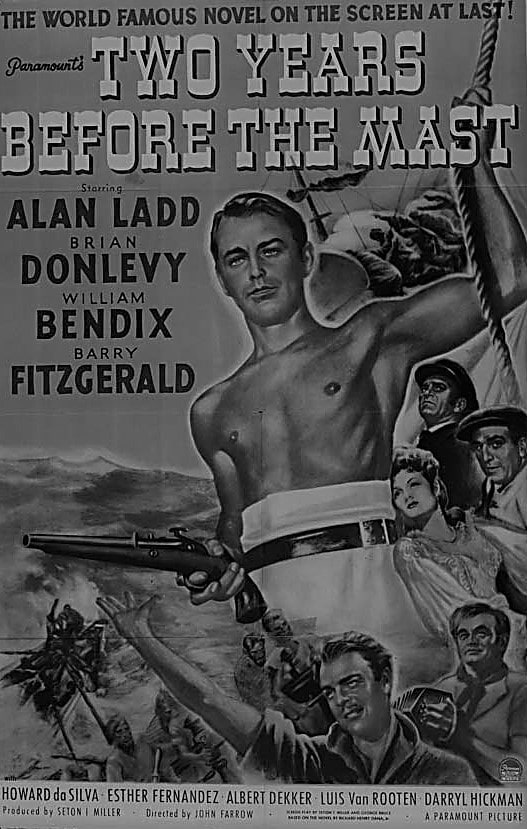 TWO YEARS BEFORE THE MAST (1946)
TWO YEARS BEFORE THE MAST (1946) (98 Min.) Genre: 1940 DRAMA, Transfer Quality: A
Based on a famous book by Richard Henry Dana, Jr., this grueling saga of shipboard oppression is set in the mid-19th century. Charles Stewart (Alan Ladd), the wealthy son of a Boston shipowner, is hijacked by Amazeen (William Bendix), the first mate on a ship bound for California. Francis Thompson (Howard Da Silva) is the tyrannical captain of the Pilgrim who was booted out of the U.S. Navy for mistreating his sailors. Now he wants to set a record sailing time, and he and Amazeen mete out severe punishment for the slightest of infractions. They even deny the men permission to go ashore and pick fruit when they stop in California and pick up the beautiful Maria Dominguez (Esther Fitzgerald). Without fruit, the men develop scurvy and begin to mutiny. Stewart allies himself with the author Dana (Brian Donlevy), whose brother died on one of Captain Thompson's previous voyages. Dana wants to write an expose of Thompson. Stewart steals guns and tries to take over the ship, but Amazeen subdues and imprisons him. The film was shot on a Hollywood set, but with devices on the set that simulate rolling waves so effectively that much of the cast got seasick.
Starring: Alan Ladd, Brian Donlevy, William Bendix, Roman Bohnen | Directed by: John Farrow
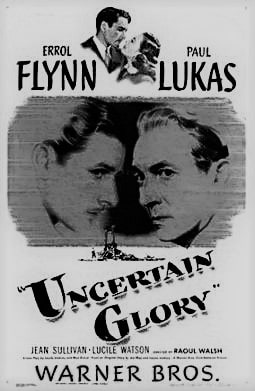 UNCERTAIN GLORY (1944)
UNCERTAIN GLORY (1944) (102 Min.) Genre: 1940 DRAMA, Transfer Quality: A
Uncertain Glory finds Errol Flynn atypically cast as French criminal Jean Picard, a craven coward whose many misdeeds have earned him a date with the guillotine. Detective Marcel Bonet (Paul Lukas) intends to see that Picard keeps his appointment with the executioner, despite the fact that there's a war on. When the Nazis capture 100 French hostages to force a resistance saboteur to surrender himself, Picard offers to pose as the saboteur and thereby save the lives of the innocent villagers. In truth, he plans to escape once he's turned himself over to the Nazis, leaving the villagers in the lurch, but at the last moment his latent patriotism overcomes his sense of self-preservation. Errol Flynn's character is almost as inconsistent as the script, but war films invariably made money in 1944. — Hal Erickson
Starring: Errol Flynn, Paul Lukas, Faye Emerson, Jean Sullivan, Faye Emerson | Directed by: Raoul Walsh
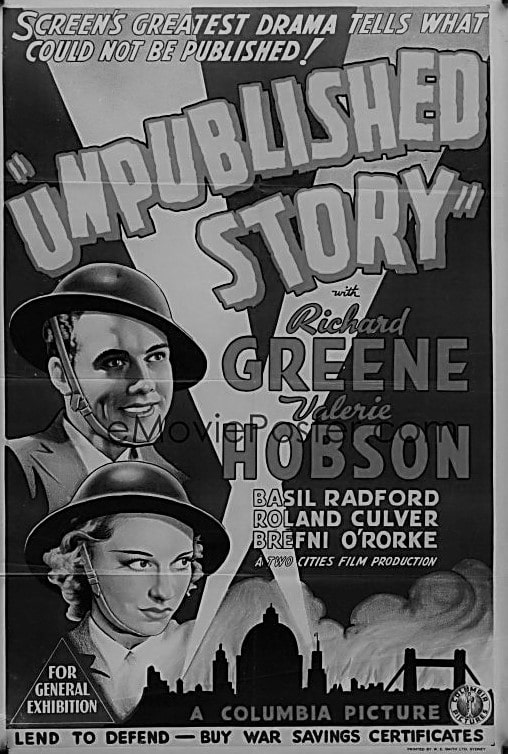 UNPUBLISHED STORY (1942)
UNPUBLISHED STORY (1942) (91 Min.) Genre: 1940 DRAMA, Transfer Quality: A
Produced by Britain's Two Cities Productions and released in the US by Columbia, Unpublished Story is a curious melange of newspaper melodrama and espionage intrigue. Richard Greene and Valerie Hobson star as rival reporters Bob Randall and Carol Bennett, both of whom are interested in a hush-hush story involving the British Secret service. Warned off the story, our hero and heroine persevere, only to find themselves up to their neck in Nazi spies. Eventually wriggling out of their predicament, Bob and Carol find themselves with a "swell scoop" on their hands-one which cannot be published, lest national security be imperiled. According to Columbia's publicity mill, Richard Greene was given a brief leave of absence from the Army to star in Unpublished Story; it is up to the viewer to determine whether this "working furlough" was worth it. — Hal Erickson
Starring: Richard Greene, Valerie Hobson, Basil Radford, Roland Culver | Directed by: Harold French
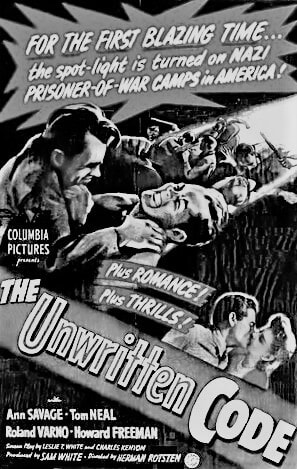 UNWRITTEN CODE, THE (1944)
UNWRITTEN CODE, THE (1944) (56 Min.) Genre: 1940 DRAMA, Transfer Quality: C
The Unwritten Code is an offbeat, better-than-average Columbia wartime "B" picture. Though Ann Savage and Tom Neal are top-billed, the central character is supporting-actor Roland Varno. He plays a Nazi spy who sneaks into the U.S., hoping to release hundreds of German prisoners. He fails, but not until plenty of bullets have been spent. The most interesting aspect of The Unwritten Code is the casting of Savage and Neal as the "good" characters: in 1945, these two cult favorites would play the decidedly unsavory protagonists of the film noir classic Detour.
Starring: Ann Savage, Tom Neal, Roland Varno, Howard Freeman | Directed by: Herman Rotsten
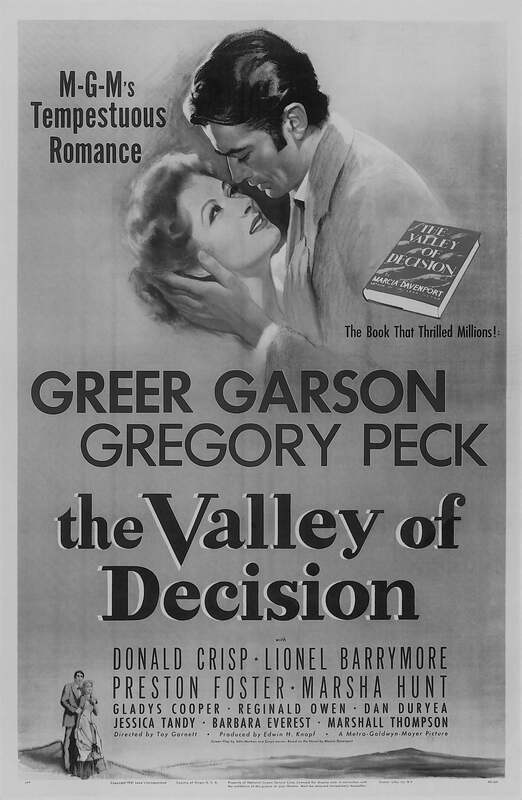 VALLEY OF DECISION,THE (1945)
VALLEY OF DECISION,THE (1945) (111 Min.) Genre: 1940 DRAMA, Transfer Quality: A
Based on Marcia Davenport's novel and set in 1870, Valley of Decision details the romance between a housemaid named Mary Rafferty (Greer Garson) and her employer's son, Paul Scott (Gregory Peck). Paul's father, William (Donald Crisp), owns a Pittsburgh steel mill where Mary's father, Pat (Lionel Barrymore), was crippled; Pat believes he wouldn't have suffered his accident if William had taken more safety precautions. Once Mary and Paul fall in love, both fathers fight against their relationship, and soon their romance is plagued by not only familial tensions, but also a worker's strike at the steel mill. — Stephen Thomas Erlewine
Starring: Greer Garson, Gregory Peck, Donald Crisp, Lionel Barrymore | Directed by: Tay Garnett
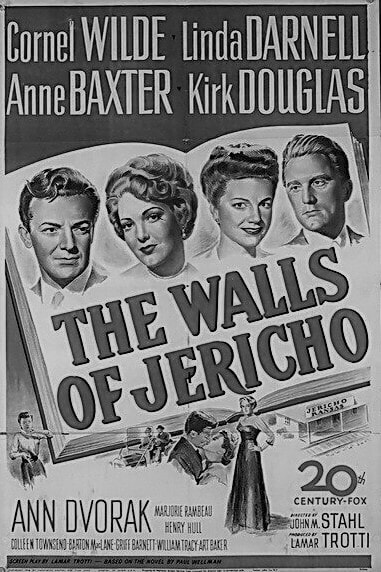 WALLS OF JERICHO, THE (1948)
WALLS OF JERICHO, THE (1948) (106 Min.) Genre: 1940 DRAMA, Transfer Quality: B
The year is 1908 and the setting Jericho, Kansas, a veritable cesspool of sin and vice. Dave Connors is a politically ambitious lawyer married to Belle, the town lush, and is in love with beautiful colleague Julia Norman. Matters are worsened when Algeria Wedge, his best friend's wife, makes a pass at him. When Dave rejects her advances, she retaliates by printing vile things about him in the town paper. This effectively destroys his political career and causes him to leave town. Algeria then successfully helps to launch her husband's career so she can remain in town and cause even more trouble.
Starring: Anne Baxter, Linda Darnell, Kirk Douglas, Ann Dvorak, Barton MacLane, Cornel Wilde | Directed by: John M. Stahl
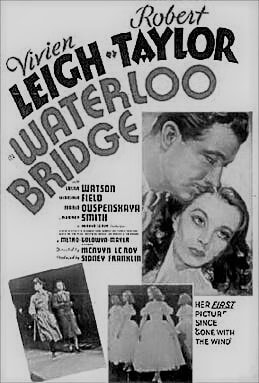 WATERLOO BRIDGE (1940)
WATERLOO BRIDGE (1940) (109 Min.) Genre: 1940 DRAMA, Transfer Quality: A
Given the omnipresence of the Motion Picture Production Code in 1940, the second film version of Robert E. Sherwood's Waterloo Bridge would have to be laundered and softened to pass muster. In the original, made in 1931, the heroine is nothing more or less than a streetwalker, patrolling London's Waterloo Bridge during World War I in hopes of picking up the occasional soldier. She falls in love with one of her clients, a young officer from an aristocratic family. Gently informed by the young man's mother that any marriage would be absolutely impossible, the streetwalker tearfully agrees, letting her beau down gently before ending her own life by walking directly into the path of an enemy bomb. In the remake, told in flashback as a means of "distancing" the audience from what few unsavory story elements were left, the heroine, Vivien Leigh, starts out as a virginal ballerina. Robert Taylor, a British officer from a wealthy family, falls in love with Vivien and brings her home to his folks. This time around, Taylor's uncle (C. Aubrey Smith), impressed by Vivien's sincerity, reluctantly agrees to the upcoming marriage. When Taylor marches off to war, Vivien abandons an important dance recital to bid her fiance goodbye, losing her job as a result. Later, she is led to believe that Taylor has been killed in battle. Thus impoverished and aggrieved, she is given a motivation for turning to prostitution, a plot element deemed unecessary in the original-which indeed it was. Now the stage is set for her final sacrifice, though the suicidal elements are carefully weeded out. Waterloo Bridge was remade for a second time in 1956 as Gaby, with Leslie Caron and John Kerr. — Hal Erickson
Starring: Robert Taylor, Vivian Leigh, Lucile Watson, Virginia Field, Maria Ouspenskaya | Directed by: Mervyn LeRoy
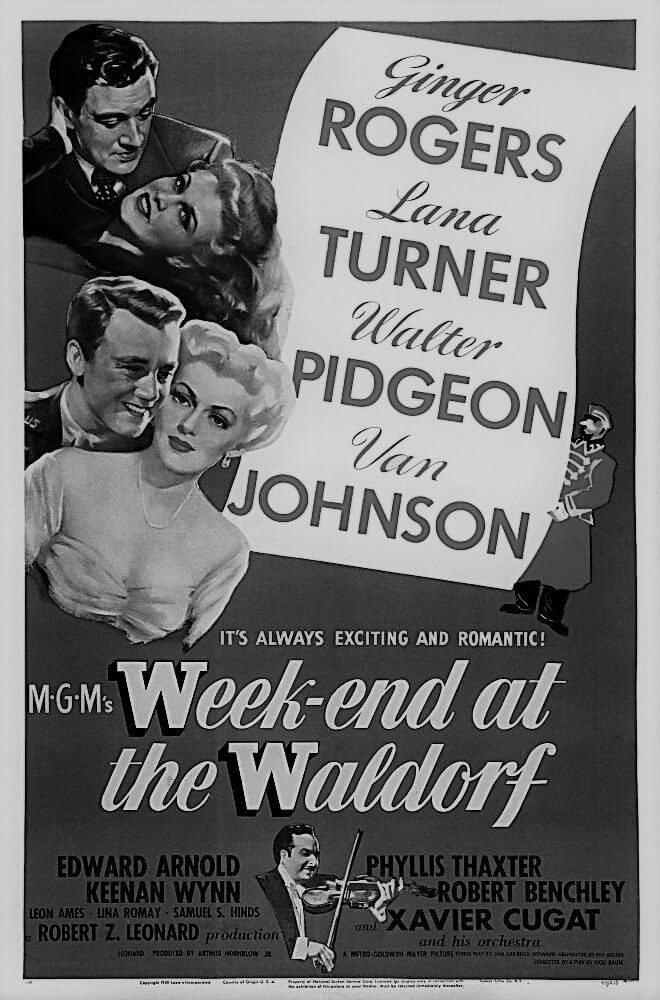 WEEKEND AT THE WALDORF (1945)
WEEKEND AT THE WALDORF (1945) (130 Min.) Genre: 1940 DRAMA, Transfer Quality: A
Weekend at the Waldorf is an unabashed remake of MGM's 1932 Oscar-winner Grand Hotel: in fact, at several points in the story, the cast makes pointed references to the earlier film. The posh Waldorf Hotel in the heart of New York is the setting for several plots and subplots. Ginger Rogers plays the Garbo counterpart, a successful but severely depressed movie star who wants to be alone. Walter Pigeon steps into John Barrymore's role, sort of; whereas Barrymore was a thief posing as nobility, Pigeon is a war correspondent posing as a thief. Hotel stenographer Lana Turner (originally Joan Crawford) latches onto tycoon Edward Arnold (originally Wallace Beery) in hopes of a life of luxury. And, in the film's biggest adaptation stretch, Van Johnson is cast as a war hero who, about to undergo life-threatening surgery, wants to thoroughly enjoy what may be his last days on earth. It takes a while to figure this out, but Johnson is supposed to be the character played in Grand Hotel by Lionel Barrymore: the meek clerk who, upon discovering that he's dying, blows his life savings on one last fling. On the whole, Weekend at the Waldorf is a lot more light-hearted than Grand Hotel, as indicated by the expository character played by humorist Robert Benchley, not to mention the presence of Xavier Cugat as the Waldorf's orchestra leader.
Starring: Ginger Rogers, Lana Turner, Walter Pidgeon, Van Johnson, Edward Arnold, Phyllis Thaxter | Directed by: Robert Z. Leonard
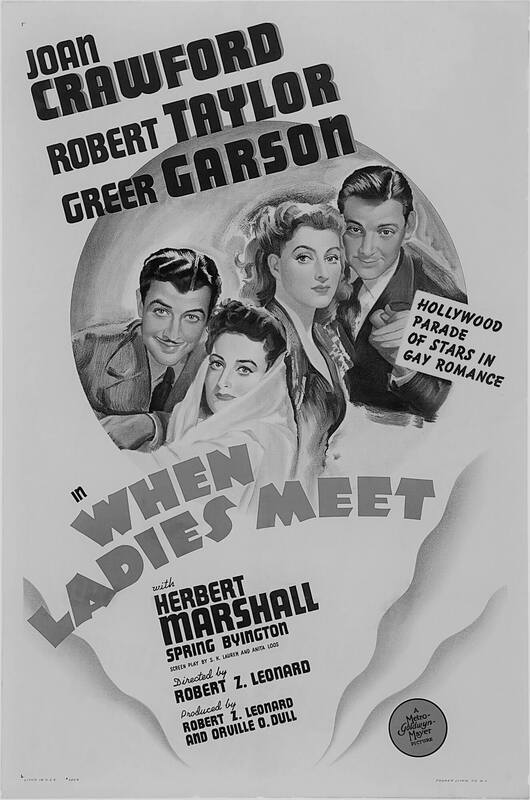 WHEN LADIES MEET (1941)
WHEN LADIES MEET (1941) (105 Min.) Genre: 1940 DRAMA, Transfer Quality: A
Strange Skirts is the TV title of the 1941 MGM film When Ladies Meet. The film was a remake of a 1933 production of the same name, which starred Ann Harding, Myrna Loy and Spring Byington; their roles were taken over in the remake by Greer Garson, Joan Crawford and Spring Byington. Both films are based on a Rachel Crothers play about a lady novelist who falls in love with a married publisher. The novelist (Crawford) meets the publisher's wife (Garson) at the home of a chatterbox society matron (Byington). The fact that the 1941 version was forced to undergo the censor's scissors to a greater extent than the 1933 film was compensated by the later version's lusher production values, which earned an Academy Award nomination for MGM art director Cedric Gibbons and Randall Duell. Under both its original title When Ladies Meet and its TV-dictated cognomen Strange Skirts, this dated but enjoyable film has become a "standard" on the various cable TV services of Ted Turner. — Hal Erickson
Starring: Joan Crawford, Robert Taylor, Greer Garson, Herbert Marshall | Directed by: S.K. Lauren, Robert Z. Leonard, Anita Loos
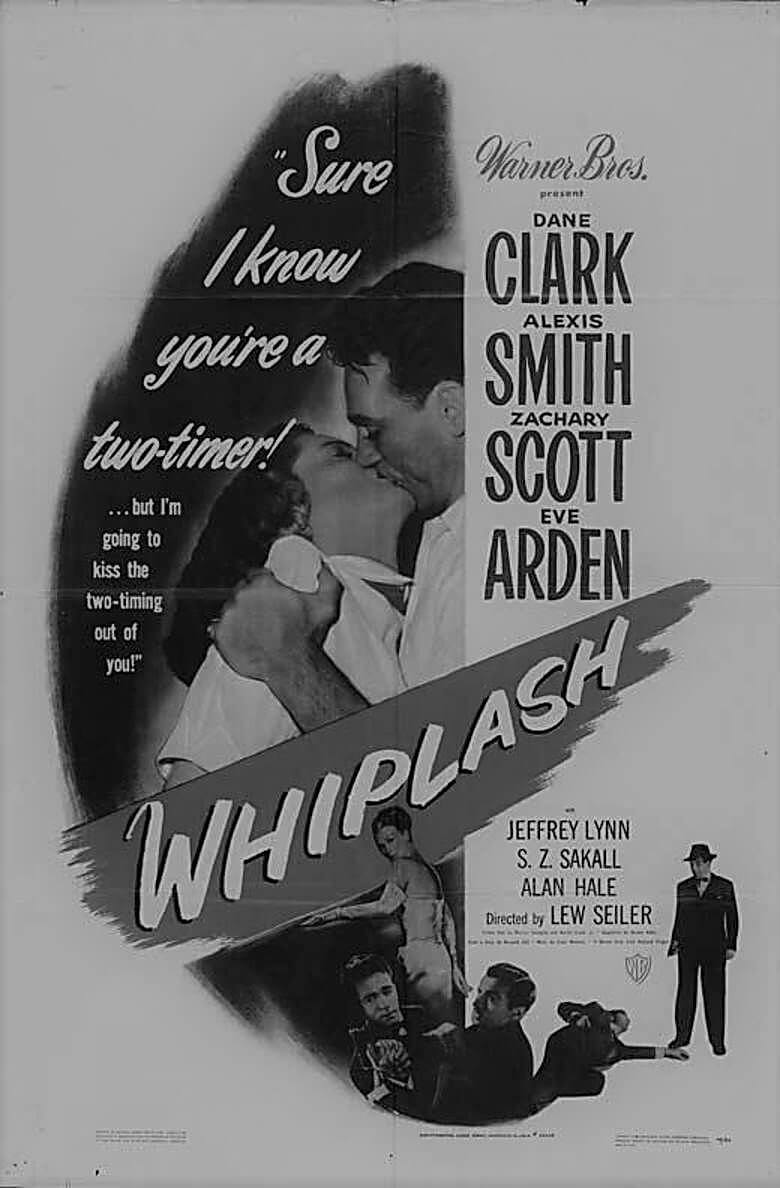 WHIPLASH (1948)
WHIPLASH (1948) (91 Min.) Genre: 1940 DRAMA, Transfer Quality: A
In this drama, a California artist abandons his work to become a New York prizefighter after he falls in love with a married nightclub singer. Her husband was a fighter, but suffered a crippling accident in the ring and was unable to fulfill his lifelong dream of becoming the world champion. The husband decides to live out his dream through the artist and begins tutoring him. Things go well until the hubby discovers that the artist has been sleeping with his wife. He then begins giving the artist bad advice so he will get creamed in the ring. Fortunately for the artist, he wins the Big Fight.
Starring: Dane Clark, Alexis Smith, Zachary Scott, Eve Arden | Directed by: Lewis Seiler
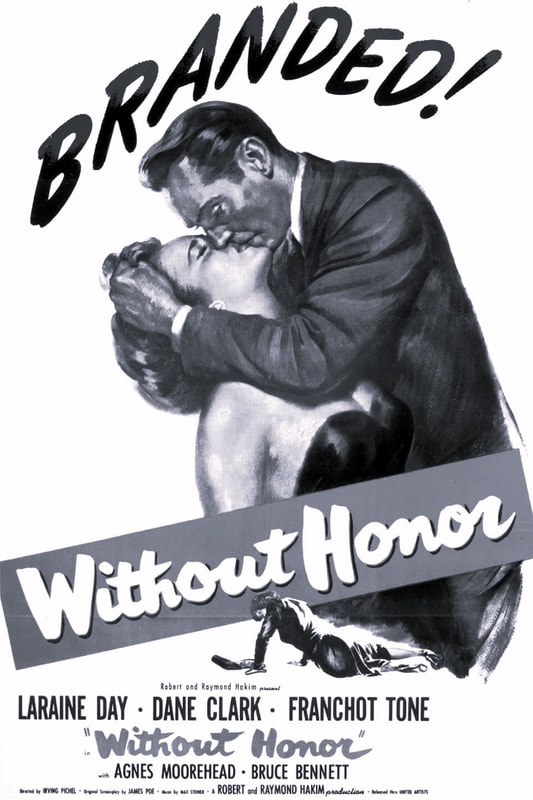 WITHOUT HONOR (1949)
WITHOUT HONOR (1949) (69 Min.) Genre: 1940 DRAMA, Transfer Quality: B
Also known as Twilight, Without Honor is a tour de force for leading-lady Laraine Day. During a quarrel with her lover Dennis Williams (Franchot Tone), Mrs. Jane Bandle (Day) attacks him with an ice pick. Believing she has killed Williams, she hurriedly hides the body in her laundry room when her husband Fred (Bruce Bennett) comes home. As Jane's nasty brother-in-law Bill Bandle (Dane Clark) reveals her romantic peccadilloes to Jane's husband and to Williams's wife Katherine (Agnes Moorehead), the "dead" man recovers and drags himself to a nearby hospital. Amazingly, the only one to suffer long-term consequences from this whole mess is the obnoxious Bill! As always, composer Max Steiner's musical score dutifully clues the viewer in as to what's about to happen next in any given scene.
Starring: Laraine Day, Franchot Tone, Dane Clark, Agnes Moorehead, Bruce Bennett | Directed by: Irving Pichel
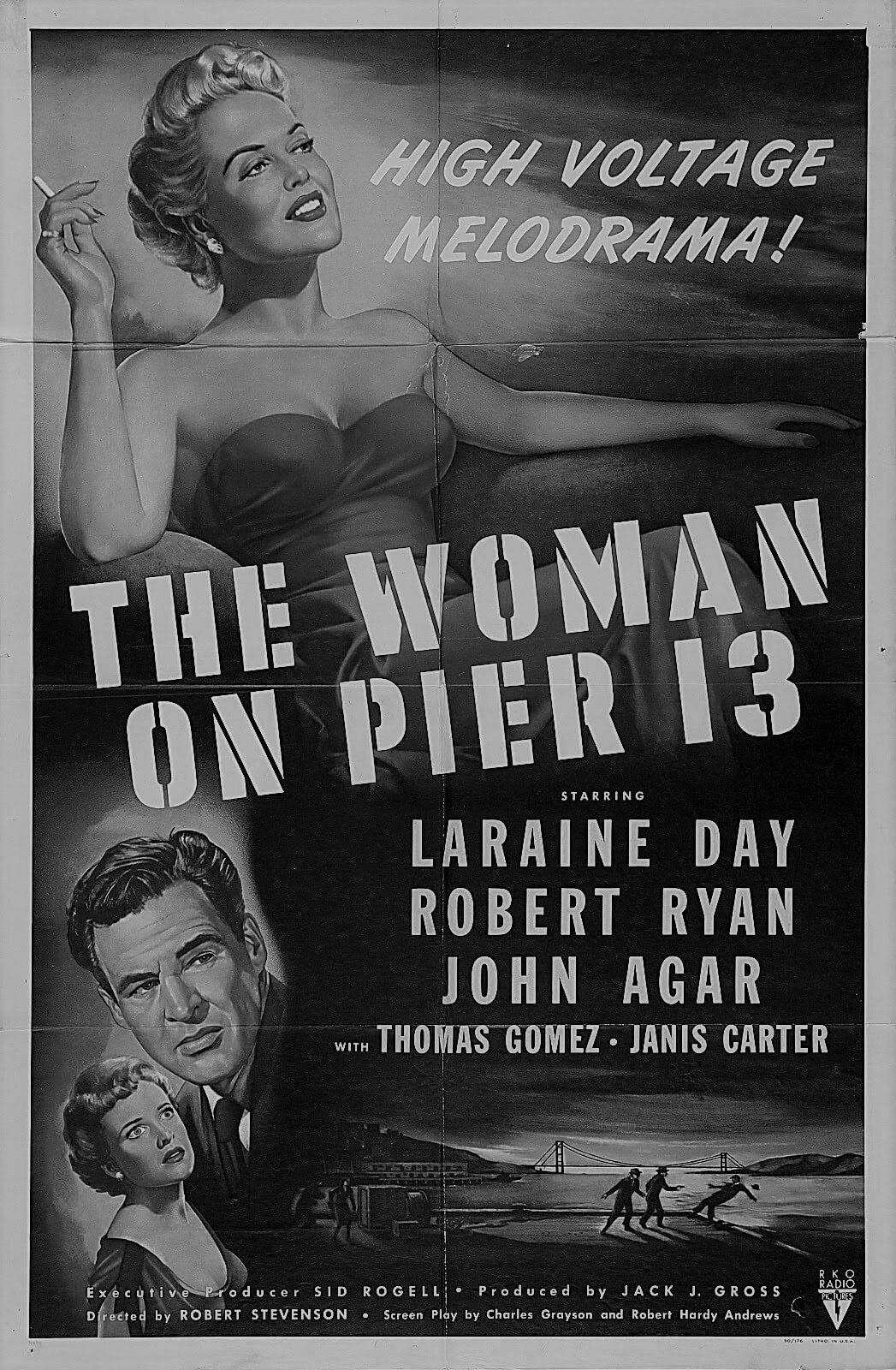 WOMAN ON PIER 13, THE (1949)
WOMAN ON PIER 13, THE (1949) (73 Min.) Genre: 1940 DRAMA, Transfer Quality: A
There's propaganda aplenty in RKO's I Married a Communist, the first of producer Howard R. Hughes' many anti-Red broadsides. Robert Ryan plays shipping executive Brad Collins, whose youthful flirtations with certain left-wing causes have made him ripe for plucking by Commie cell leader Vanning (Thomas Gomez). Threatening to reveal Collins' "pinko" past, Vanning orders the executive to deliberately sabotage the shipping industry in the Frisco Bay area. Other characters essential to the plotline are Collins' wife Nan (Laraine Day), who knows nothing of her husband's politics, and his idealistic brother-in-law Don (John Agar) who spouts Marxist dogma at the drop of a hat. Apparently at a loss as to how to depict communist villainy, the screenwriters hark back on the gangster films of the 1930s, notably in the scene where a hapless stoolie (the inevitable Paul Guilfoyle) is taken for a ride. When the title I Married a Communist proved an audience turn-off during previews, the film was rechristened The Woman on Pier 13. — Hal Erickson
Starring: Laraine Day, Robert Ryan, John Agar, Thomas Gomez, William Talman | Directed by: Robert Stevenson
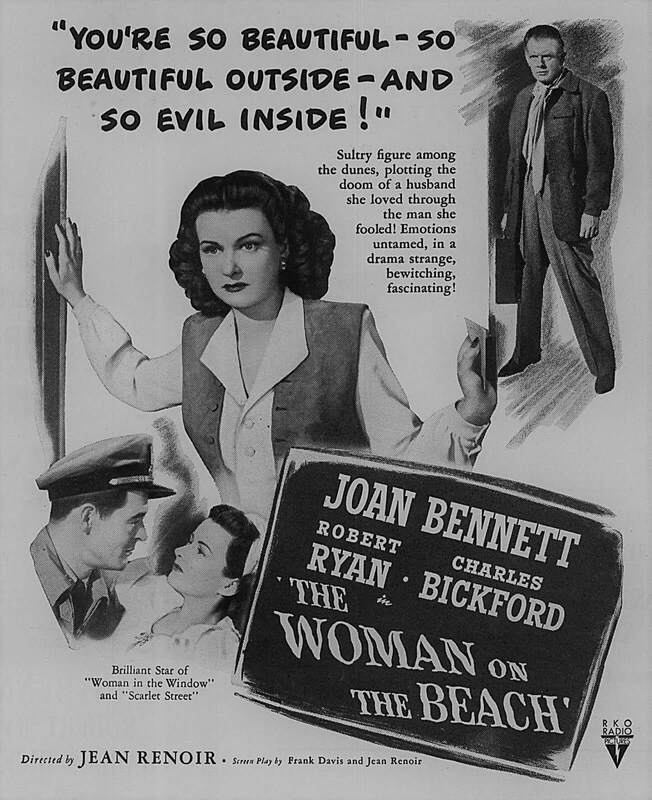 WOMAN ON THE BEACH, THE (1947)
WOMAN ON THE BEACH, THE (1947) (71 Min.) Genre: 1940 DRAMA, Transfer Quality: A
A WWII Coast Guard veteran, Lt. Scott Burnett (Robert Ryan), is plagued by nightmares of his combat days. One day, he meets a woman, Peggy Butler (Joan Bennett), walking on a beach, picking up pieces of wood. Butler is married to a grumpy, blind painter, Ted Butler (Charles Bickford). Despite his affections for his wife Eve (Nan Leslie), whose father is a boat builder, Scott falls in love with Peggy. Peggy reveals that she blinded her husband years earlier by throwing a glass at him during an ugly spat, ruining his career and her own ambitions to be an upper-class socialite. Scott fears that Ted is suspicious that he is having an affair with Peggy and becomes so paranoid that he begins to believe that Ted is faking his blindness — and sets out to prove it. This was the fifth and final American film by the great French writer-director Jean Renoir. — Michael Betzold
Starring: Joan Bennett, Robert Ryan, Charles Bickford, Nan Leslie, Walter Sande | Directed by: Jean Renoir
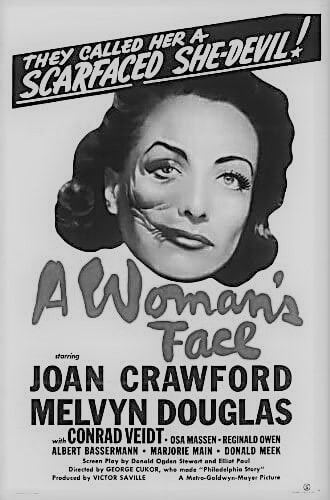 WOMAN'S FACE, A (1941)
WOMAN'S FACE, A (1941) (107 Min.) Genre: 1940 DRAMA, Transfer Quality: A
A remake of the Swedish film of the same name (see entry 55092), MGM's A Woman's Face was reshaped into one of Joan Crawford's best vehicles. Told in flashback from the vantage point of a murder trial, the story concerns a female criminal whose face is disfigured by a hideous scar. The plastic-surgery removal of this disfigurement has profound repercussions, both positive and tragically negative. The film's multitude of subplots converge when Conrad Veidt, Joan's lover and onetime partner in crime, is murdered. Melvyn Douglas costars as the beneficent cosmetic surgeon who becomes Joan's lover, while Osa Massen appears as Douglas' vituperative wife. Making his American screen debut in the role of Veidt's father is Albert Basserman, who spoke no English and had to learn his lines phonetically. Both A Woman's Face and its Swedish predecessor were based on Il Etait Une Fois, a play by Francis de Croiset. — Hal Erickson
Starring: Joan Crawford, Melvyn Douglas, Conrad Veidt, Osa Massen, George Zucco | Directed by: George Cukor
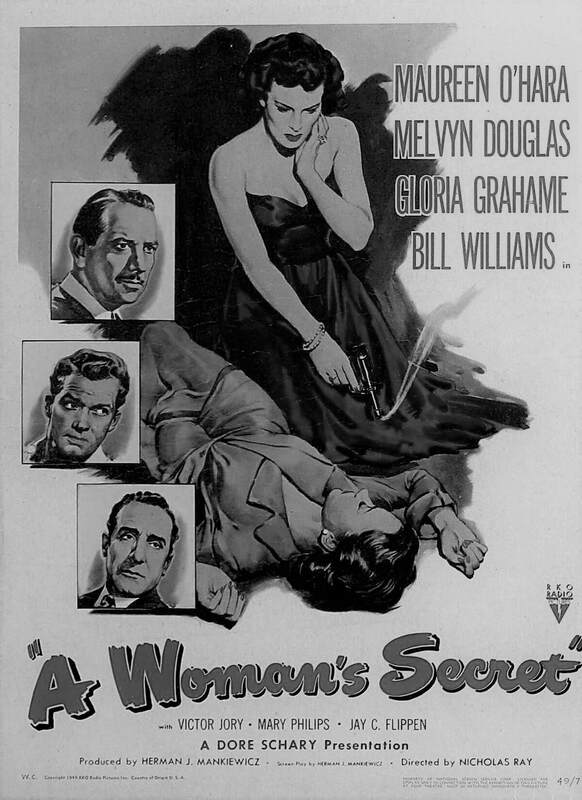 WOMAN'S SECRET, A (1949)
WOMAN'S SECRET, A (1949) (85 Min.) Genre: 1940 DRAMA, Transfer Quality: B
Screenwriter Herman J. Mankiewicz adopts the same prismatic-flashback technique he'd used so well in Citizen Kane for the 1949 filmic soap opera A Woman's Secret. Based on a novel by Vicki (Grand Hotel) Baum, the film begins with the shooting of nightclub singer Susan Caldwell (Gloria Grahame). Marian Washburn (Maureen O'Hara), who'd coached Susan into the Big Time, confesses to the shooting. Neither Marian's piano-player friend Luke Jordan (Melvyn Douglas) nor police inspector Fowler (Jay C. Flippen) completely buy her story, and it is their probing investigation of the facts that sparks the flashback parade. The film details in sometimes clever, sometimes maudlin fashion the perils of living one's life vicariously through the accomplishments of others. Though filmed before director Nicholas Ray's "official" debut feature They Live by Night, A Woman's Secret was released afterward.
Starring: Maureen O'Hara, Melvyn Douglas, Gloria Grahame, Victor Jory | Directed by: Nicholas Ray
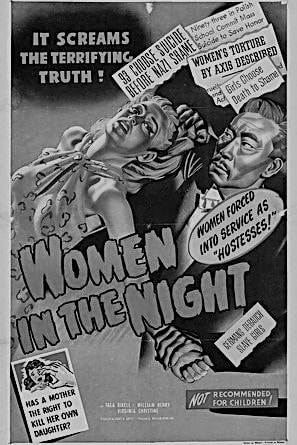 WOMEN IN THE NIGHT (1948)
WOMEN IN THE NIGHT (1948) (90 Min.) Genre: 1940 DRAMA, Transfer Quality: B
The scene is Shanghai: the time, WW II. An international group of women left stranded during the Japanese invasion are rounded up by the local authorities to act as "comfort girls" for high-ranking Nazi and Japanese officials. Bridling at this degrading treatment, the ladies secretly work on behalf of the Chinese Underground, relaying vital information to the Allies and, at one point, committing murder in the name of Democracy. The plot thickens with the introduction of a Nazi "cosmic ray" device, which OSS operative Van Arnheim (William Henry) hopes to destroy before it can be used in battle. Van Arnheim's courageous wife is played by Virginia Christine, light-years removed from her stint as "Mrs. Olsen" in the Folger's Coffee TV commercials.
Starring: Tala Birell, William Henry, Virginia Christine, Richard Loo | Directed by: William Rowland
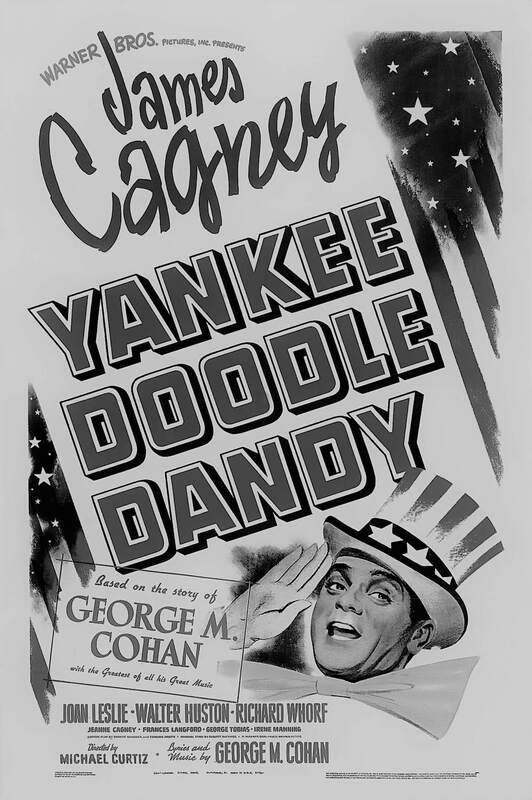 YANKEE DOODLE DANDY (1942)
YANKEE DOODLE DANDY (1942) (126 Min.) Genre: 1940 DRAMA, Transfer Quality: A
Yankee Doodle Dandy was one of the best World War II-era patriotic propaganda films, and it has proven itself enduringly popular in the decades following its release. The film succeeds almost entirely on the performance of James Cagney as legendary song-and-dance performer George M. Cohan, although significant credit should also be given to director Michael Curtiz, who expertly stages each scene to display the talents of his star. The film features an over-the-top framing device in which Cohan tells his life's story in flashback to U.S. President Franklin Roosevelt. The story is effectively fiction, using only the outline of Cohan's life and some of his songs as reference points. The musical sequences are among the best in any film of the era. The film was nominated for 8 Oscars, including Best Picture and Best Director, and won three, including Best Actor for Cagney. The real-life Cohan died shortly after the film's release, living long enough to see it and like it despite, or perhaps because of, its lack of accuracy about his life. — Richard Gilliam
Starring: James Cagney, Joan Leslie, Walter Huston, Richard Whorf | Directed by: Michael Curtiz, Hugh MacMullan

